|
Written And Compiled By E.W. Cole (1832-1918) |
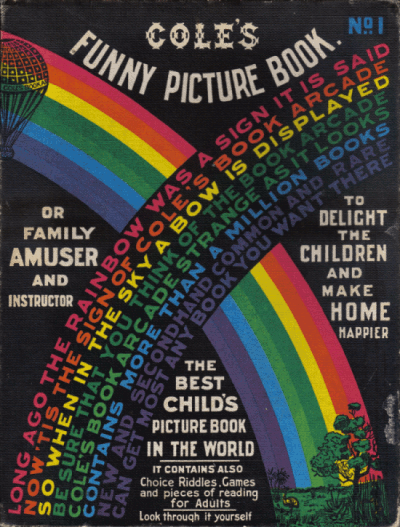
|
COLE'S Funny Picture Book No. 1
Or Family Amuser And Instructor;
It Contains Also Choice Riddles, Games
Long ago the Rainbow was a Sign it is said, |
|
[*] BIBLIOGRAPHICAL NOTE: The reprintings of this book since Cole's death in 1918 have involved very few changes, and in most cases it has been bibliographically misleading to term them "editions". Undoubtedly, somewhere in the past, the distinction between a "printing" and an "edition" has not been understood. However, with due cognisance of the irregularity, the practice of giving each reprint a new edition number accompanied by a running sales total is being maintained for statistical interest. |
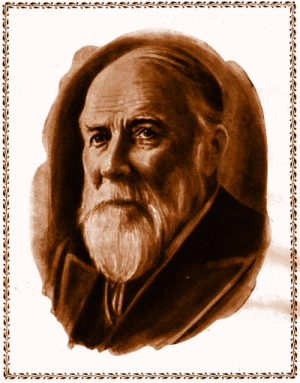
|
Born Woodchurch, Kent, England
Died Essendon, Victoria, Australia
|
Page 1—Australia
|
I think that Australia, for it's size, is, all-round, the best country in the world. It's climate is pleasant and health-giving. It has no desolating blizzards, no frost bites, and few sunstrokes. In edible produce, for both size and quality, it stands very high, if not the highest. I have been in many lands, but never saw a country supply such a variety of products as Australia does—potatoes, onions, cabbages, carrots, peas, beans and scores of other vegetables in abundance. In fruits it produces apples, pears, plums, peaches, oranges, grapes, and Northern Australia also produces all the tropical fruits in abundance wherever cultivated. In corn Australia produces superior wheat, oats, barley, maize and all other kinds in abundance, especially when scientifically irrigated. As a milk, butter and meat country, it is one of the best in the world. It is the largest and best wool-producing country in the world. It contains the largest area in the world especially suitable for growing cotton, the most extensively-used clothing material. Flowers grow luxuriantly and beautifully whenever cultivated and watered. A few years ago when writing on the "White Australia" question, I stated that with high culture, water irrigation, and scientific irrigation, Australia was capable of supporting 400 millions of inhabitants. A high literary authority, in reviewing the book, remarked that this seemed like a "gross exaggeration"; but probably he had not thought so much on the subject as I had. I will here concisely state the principle reasons for my opinion. The great want of Australia, to make it amazingly fruitful, is the complete conservation of water and it's scientific application to the soil. Water, warmth, and soil will grow anything in Australia, if rationally managed. Australia has abundance of water now running to waste. On thousands of house-roofs water enough is caught for the domestic use of the respective families. Over large areas of the country there are 30 inches of rainfall, and the average rainfall over vast areas is 24 inches, and could be made much greater by cultivation. Four-fifths of this water now runs to waste. Again surface-parched Australia has vast areas of underground water which only require to be tapped and brought to the surface, to irrigate and fertilise the soil. Australia is also a country where timber grows well and fast, if planted in trenched ground and slightly irrigated. Hundreds of straight trees can be grown upon an acre of land if they are first planted thickly and some gradually thinned out. Many kinds of trees will grow upon very poor soil if they are properly planted and irrigated, as the bulk of their sustenance is derived from the air. One more remark about trees and their possibilities as food providers. Wherever any kind of tree will grow some kind of fruit tree will grow. There are hundreds of millions of gum trees growing in Australia. Where every one of these trees is, some kind of fruit tree would grow if properly planted and looked after. Again, to utilise Australia to it's full extent the whole world should be sought through for the best plants and trees of every kind, and only the very best grown, and those in situations and soil best adapted for them. One argument against Australia is that much of its surface is sandy, but experiments and developments in various countries show that the planting of marram grass, lupins, and other plants ties even the drifting sand together and gradually, through their decay, turns the sandy wastes into fertile soil. Besides, science can, in many other ways, utilise the elements in the air to enrich the soil.
|
|
It has been objected that in the above epitome no mention is made of the great mineral wealth of Australia. The reason is that minerals, exceedingly useful as they are in the arts, are not absolutely necessary (with the exception perhaps of iron) to the feeding, clothing, and housing of mankind. Vast multitudes have lived without them; but it may be remarked that Australia is a country very rich in minerals; some hold it the richest in the world. It possesses immense deposits of iron not yet utilised, and the most extensive gold-fields yet discovered. Australia and Tasmania have, according to the latest estimate of our Commonwealth Statistician, produced minerals to the value of £660,252,694—comprising in round numbers, Gold £474,000,000; Tin £24,000,000; and other kinds £8,000,000. The bulk of the above has been produced during the last 60 years, in a population rising from about 300,000 to 4,000,000 and it forecasts how vast the mineral-producing future of Australia is likely to be. Altogether Australia is a country as highly favoured by nature as any other of equal size upon earth, for the bountiful production of useful animals, vegetables, minerals, and men.
|
|
"'If we Australians took as much trouble to prepare for our summer as the Canadians take to forestall their winter, Australia would be THE MOST PROSPEROUS COUNTRY ON EARTH.' The speaker was the Rev. A. R. Edgar, head of the Central Mission, Melbourne. "'After circling the globe, then, you are still satisfied that Australia is not a bad country to live in?' "'The best,' said Mr Edgar, emphatically. 'I have no hesitation in saying that Canada and America are not to be compared with Australia. Unfortunately, England doesn't know it. Australia herself doesn't half realise it, and as for America and Canada, they haven't the remotest ghost of a notion of it. In England they learn with regrettable slowness, and their knowledge is scanty indeed; but across the Atlantic the ignorance is deplorable. "Australia?" says the Canadian. "Oh yes! Let's see, that's the place where it's always droughty—yes, yes, to be sure, the place where y' can't get a drink of water." He laughs at the idea of Australia producing as much wool and wheat as Canada, and bluntly tells you there's no country on the face of the planet can grow wheat and wool like his. But the fact is, there isn't a bit of territory fit to compare with the Western District of Victoria, for example, and conditions are infinitely harder for the agriculturist than in Australia. Canada's western district is icebound in winter, and her eastern lands are strewn over with great boulders, between which the plough works laboriously in and out'."—From the "New Idea." I often feel for the dweller in Canada; for notwithstanding his beautiful spring and autumn he has six months of ice and snow and freezing winds, and I feel selfishly grateful that my lot is cast in more genial Australia. Let us well ponder Mr. Edgar's concise and forcible statement: "If we Australians took as much trouble to prepare for our summer as the Canadians take to forestall their winter, Australia would be the most prosperous country on earth." This is quite true. The Canadian must thoughtfully and rationally prepare for his winter, or he would freeze and starve. We have no frigid climate to prepare against, but we have possible drought, and our first and greatest consideration should be the conservation of water for irrigation. This water conservation is exceedingly important thing. Men do not think, and the waste is enormous. When the rain falls it runs into the gully, from the gully to the creek, from the creek to the river, from the river into the sea; and then in the dry season water is deplorably scarce. I once asked a young squatter from the New South Wales side of the Murray "Have you got a garden?" He answered: "No: it is too dry up our way!" I said, "How do you get water for domestic purposes?" He answered, "We catch it off the roof; we catch it in 11 tanks and are never out of a supply." I asked, "How large an area have all your roofs put together?" He answered, "I think about 20 feet by 100 feet." This would be about a twentieth of an acre. Now just reflect! One acre of rainfall would supply, if caught, 20 establishments like that squatter's home, for the rain would fall fairly alike over that part of the country. A rainfall of 30 inches over an acre of ground measures about 680,000 gallons and weighs about 3000 tons, the bulk of which is allowed to run away every year! A gentleman said to me the other day, "Since the water was brought to Coolgardie and Kalgoorlie, under Sir John Forrest's great scheme, they have very beautiful gardens right along the line of supply. Wherever the water touches the land the vegetation is splendid, and, what is more, the evaporation is bringing heavier rainfall." Of course, wherever cultivation and irrigation are carried on, more evaporation takes place, and, in most cases, causes additional rainfall. When I affirmed that Australia was capable of supporting 400 millions of people I did not mean Australia as we now have it, but as it might be, and probably will be, when water is carefully conserved and its soil scientifically irrigated and cultivated.
E.W. Cole
|
Page 2—Cole's Funny Picture Book
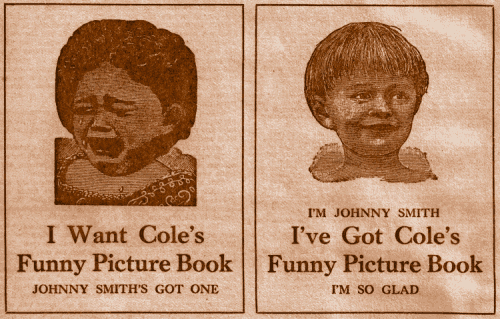
Page 3—Index
|
If you search through the World you will not get a book that will so please a child, if you pay £100 or even £1000 for it. To parents, Grandparents, Uncles, Aunts, and Friends—Every Good Child should be given one of these Books for being Good. Every Bad Child should be given one to try to make it Good.
|
|
BABY RHYMES Baby Going to Bed 4 Baby, Getting up 5 This Pig Went to Market 6 Baby Riding 6 Naughty Baby 7 LITTLE CHILDREN'S STORIES Tom Thumb's Alphabet 8 Sing a Song-a-Sixpence 8 A Apple Pie 8 Captain Duck 8 Hey-Diddle-Diddle 9 GIRL LAND Cry-Baby Belle 10 A Naughty Little Girl 10 Paulina Pry 10 Tearful Annie 10 Hattie's Birthday 11 Youth and Age 11 A Lost Child 11 Little Mary 11 Girl and Angel 11 Girl Who Wouldn't go to Bed 12 Girl That Beat Her Sister 12 The Sulky Girl 12 Girl Who Sucked Her Fingers 12 The Greedy Little Girl 12 Girl Who Played With Fire 12 The Vulgar Little Lady 12 Peggy Won't 13 The Wonderful Shadows 13 Little Bo-Peep 14 Pammy Was A Pretty Girl 14 The Little Husband 14 I'm Governess 14 Meddlesome Matty 15 Girl Who Spilled the Ink 15 Girl Who Was Always Tasting 15 Sally the Lazy Girl 15 Girl Who Wouldn't Comb Her Hair 15 The Nasty Cross Girls 15 Little Red Riding Hood 16 I'm Grandmama 16 The Babes in the Wood 16 Cinderella 17 The Three Bears 17 Bluebeard 17 My Girl 18 My Little Daughter's Shoes 18 The Old Cradle 18 A Little Goose 18 Girls 19 Girls Names 19 Vain Sarah 19 Several Kinds of Girls 19 Jumping Jennie 20 I Don't Care 20 Little Miss Meddlesome 20 Careless Matilda 20 Forty Little School Girls 21 Funny Monkeys 21 Tangle Pate 22 A Careless Girl 22 The Naughty Girl 22 Mopy Maria 22 Disobedient May 22 Sluttishness 22 Jane Who Bit Her Nails 22 Poking Fun 22 The Pin 23 Stupid Jane 23 Pouting Polly 23 Untidy Emily 23 Maidenhood 24 Girls That Are in Demand 24 Girls' Names 24 Name of Kate 24 Girl-Scolding Machine 25 Jenny Lee 26 Work Before Play 26 Lucy Grey 26 Mary Had a Little Lamb 26 We Are Seven 27 The poor But Blind Girl 27 Grace Darling 27 The Tidy Girl 27 Ruby Cole 28 BOY LAND Vally Cole 29 Tom The Piper's Son 30 House That Jack Built 31 Simple Simon 31 Ten Little Niggers 31 Jack the Giant Killer 32 Jack and the Beanstalk 32 Hop-o-my-Thumb 33 Tom Thumb 33 Naughty Boys 34 Dirty Jack 35 Mischievous Fingers 35 Boy Stealing Apples 35 Playing With Fire 35 Wicked Willie 36 Rude, Bad, Naughty Boy 36 Little Chinky Chow 37 That Nice Boy 38 A Wicked Joking Boy 38 Jack the Glutton 39 Tom the Dainty Boy 39 A birds Nest Robber 39 A Cruel Boy 39 Boy Whipping Machine 40 - 41 DOLLY LAND Puss's Doll 42 Pretty Doll 42 Dolly and I 43 Dolly's Broken Arm 43 Polly and Her Dolly 43 Singing to Dolly 44 My Dolly 44 Dolly's Asleep 44 Lost Dolly 45 Talking To Dolly 45 Darling Dolly 45 Ten Little Dollies 46 Washing-Day Troubles 47 New Tea Things 47 Doll Dress Making 48 Dolly Town 48 The Lost Doll 48 Dolly's Counterpane 48 Sewing For Dolly 48 My Little Doll Rose 48 The Wooden Doll 48 Buy My Dolls 48 Dolly's Doctor 49 Dolly's Broken Nose 49 The Dead Dolly 49 The Soldier Dolly 49 Christening Dolly 50 Maggie's Talk to Dolly 50 Minnie's Talk to Dolly 50 |
My Dolly
50
Dolly's Wedding 50 Grandmamma's Visit 51 Lucy's Dolls 51 The Doll Show 52 A Doll's Adventures 53 Story of a Doll 53 I'm Homesick Dolly Dear 54 A Thousand Names For Dollies and Babies 55 , 56 , 57 NAUGHTINESS LAND Good Mamma 58 How They Made Up 58 Cross Patch 58 Sulky Sarah 58 A New Year's Gift 59 Angry Words 59 Love One Another 59 Anger 60 Girl That Beat Her Sister 60 Little Dick Snappy 60 Where Do You Live 61 Govern Your Temper 61 The Ragged Girl's Sunday 62 Foolish Fanny 62 Pride 63 Finery 63 A Fop 63 Greedy Ned 64 Greedy Girl 64 Greedy Richard 64 Story Of an Apple 64 The Plum Cake 65 The Glutton 65 Hoggish Henry 65 Selfishness 65 Truthful Dottie 66 False Alarms 66 Girl That Told A Lie 66 Idle Mary 67 Lazy Sal 67 The Work Bag 67 The Two Gardens 67 Doing Nothing 67 Lazy Sam 68 The Beggar Man 68 Lazyland 68 The Lazy Boy 69 The Sluggard 69 Idle Dicky and the Goat 69 Come and Go 69 The Cruel Boy 70 Story of Cruel Fred 70 The Worm 70 No One Will See Me 71 Boy and His Mother 71 Boys and the Apple Tree 72 Thou Shalt Not Steal 72 The Thief 72 The Thieves' Ladder 73 SANTA CLAUS LAND Santa Claus Land 74 A Visit From St. Nicholas 75 What Santa Claus Brings 75 Little Mary 75 Christmas 75 Christmas Eve Adventure 76 Little Bennie 76 Old Santa Claus 77 Night Before Christmas 77 Annie and Willie's Prayer 78 Budd's Stocking 79 Christmas Morning 79 Nellie And Santa Claus 80 Hang Up Baby's Stocking 80 PLAY LAND Rabbit on the Wall 81 Little Romp 81 Tired of Play 82 The Lost Playmate 82 In The Toy Shop 83 Playing Store 83 Neat Little Clara 83 Hide and Seek 83 Little Sailors 84 Come Out to Play 84 Mud Pies 84 Hay Making 84 Johnny the Stout 85 Training Time 86 Playtime 87 Romping 87 Nurse's Song 87 Swinging 88 Skating 88 The skipping Rope 88 The Baby's Debut 89 READING LAND Reading 90 Mrs Grammar's Ball 90 Grammar in Rhyme 90 Reading Land 91 WRITING LAND Little Flo's Letter 92 The First Letter 92 Baby's Letter to Uncle 92 Nell's Letter 92 Two Letters 92 Going to Write to Papa 93 Papa's Letter 93 Polly's Letter to Ben 94 The Sunday Fisherman 95 Essay on Pictures 96 DRAWING LAND The New Slate 97 Learning to Draw 98 A Lesson in Drawing 99 OLD MEN TALES Old Man and His Wife 100 John Ball Shot Them All 100 Funny Old Man 100 Strange Men 100 Jack Sprat 101 Cross Old Man 101 Very Funny Men 101 Utter Nonsense 102 History Of John Gilpin 103 Australian Native Choir 104 OLD WOMEN TALES Woman Who Lived in a Shoe 106 Mother Goose 107 Old Women of Stepney 107 Funny Old Women 108 Old Woman Who Went Up in a Basket 108 Twenty-six Funny Women 109 |
TRAVELLING LAND Forty Ways of Travelling 110 - 113 Flying Machines 114 - 117 NAME LAND Boys' Names 118 Girls' Names 119 GAME LAND Cole's Game of Hats and Bonnets 120 - 123 Riddles and Catches 124 - 127 Picture Puzzles 128 - 143 Shadows on the Wall 144 Deaf and Dumb Alphabet 145 Language of Flowers 146 Kindness to Animals 147 Funny Australian Natives 148 - 149 PUSSY LAND My Pussy 150 Pussy-Cat and Mousey 150 Puss and the Monkey 150 Mary's Puss Drowned 150 Dame Trot's Puss 151 Daddy Hubbard's Cat 152 Story of a Little Mouse 153 Tom, Puss, and the Rats 154 Puss in Boots 155 Monkey and the Cats 155 Dick Whittington 155 More Pussy Land 156 The White Kitten 157 Little Pussy 158 Puss and the Crab 158 Puss in the Corner 159 Tabby 159 Old Puss 159 Dead Kitten 160 My Own Puss 161 Putting Kitty to Bed 161 DOGGY LAND Mother Hubbard and Dog 162 Puss and Rover 163 No Breakfast for Growler 163 Poor Old Tray 163 GOAT LAND O'Grady's Goat 164 The Goat and the Swing 164 MONKEY LAND Meddlesome Jacko 165 A Fruitless Sorrow 165 GEE-GEE LAND The Wonderful Horse 166 The Horse 166 Good Dobbin 166 Horse Sentenced to Die 167 The Arab and His Horse 167 Farmer John 168 DONKEY LAND The Cottager's Donkey 169 Old Jack the Donkey 169 Poor Donkey's Epitaph 169 MOO-MOO LAND The Cow and the Ass 170 The Cowboy's Song 171 That Calf 171 BA-BA LAND The Lost Lamb 172 The Pet Lamb 172 - 173 PIGGY LAND The Pig is a Gentleman 174 Five Little Pigs 174 The Self-willed pig 174 Three Naughty Pigs 175 The Spectre Pig 175 The Chinese Pig 176 Dame Crump and Her Pig 176 Old Woman and Her Pig 177 The Three Little Pigs 177 BUNNY LAND Disobedient Bunny 178 The Wild Rabbits 178 The Pet Rabbit 178 The Little Hare 179 The Poor Hunted Hare 179 Epitaph on a Hare 179 RAT LAND Pied Piper of Hamelin 180 Wicked Bishop Hatto 181 MOUSEY LAND The Three Mice 182 The Foolish Mouse 182 Run, Mousey, Run! 182 The Gingerbread Cat 182 A Clever Mother Mouse 183 The Mouse's Call 183 The Foolish Mouse 183 FROGGY LAND The Foolish Frogs 184 Marriage of Mr. Froggie 184 Frogs at School 184 Frog That Went a Wooing 185 Mixed Animal Land 186 - 187 The Squirrel 188 Wonderful Bird Nests 189 Cole's Poems on Books 190 COMIC ADVERTISER Serious Sambo 191 Laughter as a Medicine 191 Man Made to Laugh 191 Josh Billings' Prayer 191 Fun Better Than Physic 192 Fun About Music 193 Going to Coles' Book Arcade 194 - 195 Wonderful Sea Serpent 196 Funny, Foolish and Useful Fashions 197 - 201 Boy Smoking 202 - 203 Narcotics and Intoxicants 204 Pipes of the World 205 |
|
READER—There are only 365 pieces mentioned in this index, but
the
Book contains 2,000 pieces and pictures, large and small. It is a
complete cyclopoedia of child-lore, and first-class kindergarten
book—to amuse and teach at the same time. No child's book
ever published
has been, nor is now, so great a favourite as this one.
|
Page 4—Baby Rhymes
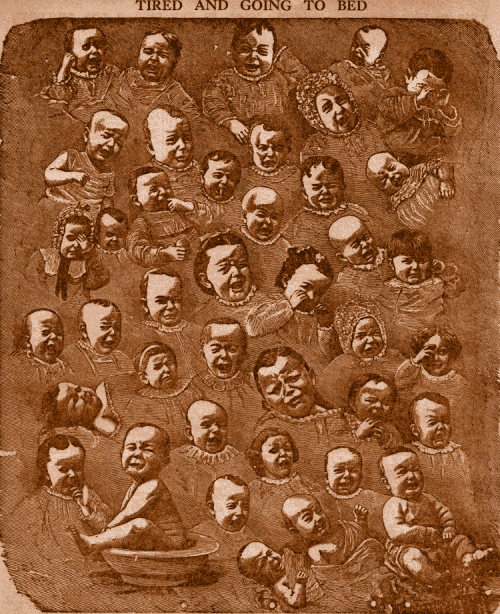
A Piece of Poetry for Mother and Father to
Read
|
I suppose if all the children, Who have lived through ages long, Were collected and inspected They would make a wondrous throng.
Oh the babble of the Babel!
Some have never laughed nor spoken,
And indeed, I wonder whether,
Think of all the men and women
And of all of them not any
|
Page 5—Baby Rhymes
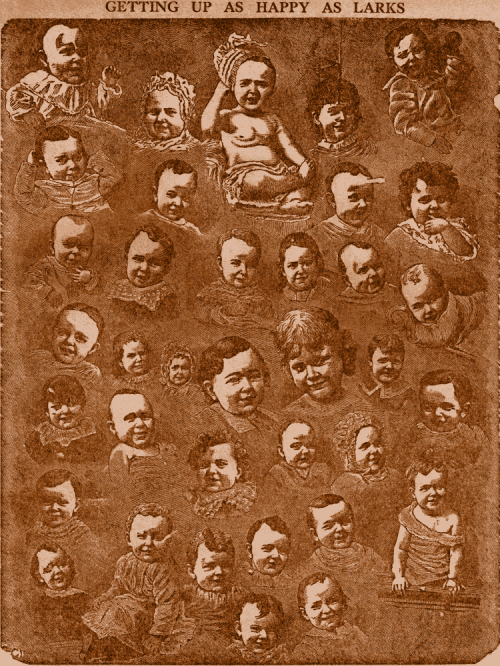
|
Who will wash their smiling faces? Who their saucy ears will box? Who will dress them and caress them? Who will darn their little socks?
Where are arms enough to hold them?
Little happy Christian children,
Little princes and princesses,
Only think of the confusion
Oh the babble of the Babel!
|
Page 6—Children's Rhymes
|
|
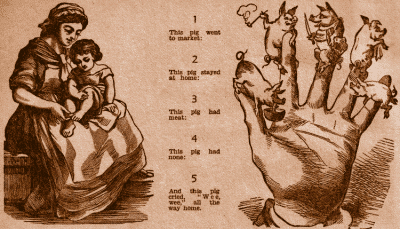
|
1. This pig went to market: 2. This pig stayed at home: 3. This pig had meat: 4. This pig had none: 5. And this pig cried, "Wee, wee," all the way home.
|
|
Here sits the Lord Mayor! (forehead)
|
|
Ring the bell! (giving its hair a pull)
|
|
(Eye) Bo Peeper! (Nose) Nose dreeper!
|
|
1. Let us go to the wood, says this pig;
|
|
To market, to market, to buy a fat pig;
|
|
Ride baby, ride, pretty baby shall ride,
|
|
Ride a cock-horse to banbury-cross,
|
|
This is the way the ladies ride;
|
|
Clap hands, clap hands,
|
|
You shall have an apple,
|
|
Pat-a-cake, pat-a-cake, baker's man!
|
|
Churn, butter, churn! come, butter, come!
|
|
When Jacky's a very good boy,
|
Page 7—Children's Rhymes
|
Hickup, hickup, go away!
|
|
Dance, little baby, dance up high,
|
|
Dance to your daddy,
|
|
Danty baby diddy,
|
|
Hush-a-bye, a baa lamb,
|
|
Bye, baby bunting,
|
|
Hush-a-bye baby, on the tree top,
|
|
Rock-a-bye baby, thy cradle is green;
|
|
My dear cockadoodle, my jewel, my joy,
|
|
Baby, baby, lay your head
|
|
Hush thee, my babby,
|
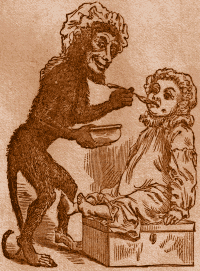
|
Oh, my lady! my lady! my lady!
|
|
Baby, baby ope your eye,
|
|
Wash hands, wash,
|
|
Comb hair, comb,
|
|
My pretty baby-brother
Whenever I come near,
|
|
He opens his mouth when he kisses you;
|
|
Come, my darling, come away,
|
|
See-saw sacradown,
|
|
Baby, baby Charlie,
Patting with his soft hands,
Do not cry, dear Annie,
Or his little hands will
Kiss the baby, darling,
|
Page 8—Little Children's Stories
|
A was an archer, who shot at a frog;
|
|
Sing a song-a-sixpence,
|
|
If I'd as much money as I could spend,
|
|
Cock-a-doodle-doo,
|
|
Hot-cross buns! Hot-cross buns!
|
|
Rabbit, rabbit, rabbit-pie!
|
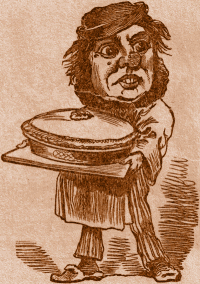
|
A apple pie;
|
|
Rub a dub, dub,
|
|
Hey ding a ding, what shall I sing?
|
|
Barber, barber, shave a pig,
|
|
Punch and Judy fought for a pie;
|
|
Pease pudding hot,
|
|
A little bit of powdered beef,
|
|
The barber shaved the mason,
|
|
I saw a ship a-sailing,
|
|
Little Tee Wee' he went to sea
|
Page 9—Children's Rhymes
|
Jack be nimble, and Jack be quick;
|
|
Jack Sprat had a cat,
|
|
Little Jack Horner sat in the corner,
|
|
Little Tom Tucker
|
|
Georgie Porgie, pudding and pie,
|
|
See-saw, Margery Daw,
|
|
Little lad, little lad, where wast thou born?
|
|
Handy Spandy, Jack-a-dandy,
|
|
Deedle, deedle, dumpling, my son John
|
|
Jack and Jill went up the hill,
|
|
Willie drew a little pig,
|
|
Baa, baa, black sheep,
|
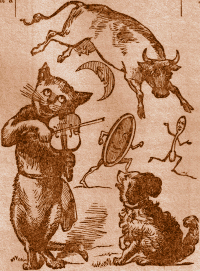
|
Hey diddle diddle, the cat and the fiddle,
|
|
"Hey! diddle diddle, |
|
[*]
Our friend, the Quaker, holds that the last verse is the proper
one, as it is the truest; but the wonderful is taken out of it, and
children, accordingly, prefer the first. There is nothing wonderful
in the cow jumping "under" the moon, but there is in the cow jumping
"over" the moon, so with the black-birds baked in a pie. It is the
fact of their singing when the pie is opened that pleases the
children—'twas the wonder of the thing; so with the freaks of
Mother Hubbard's Dog, etc. In nearly all nursery rhymes it is the
ludicrous and wonderful that arrests the attention and pleases. E. W. Cole
|
|
There was a little boy, went into a barn,
|
|
Tweedle-dum and tweedle-dee
|
|
Baby and I
|
|
High diddle doubt, my candle's out,
|
|
Rowsty dowt, my fire's all out,
|
|
We're all in the dumps,
|
|
Blow, wind, blow! and go, mill, go!
|
|
Come, let's to bed, says Sleepy-head
|
|
Go to bed first,
|
Page 10—Girl Land
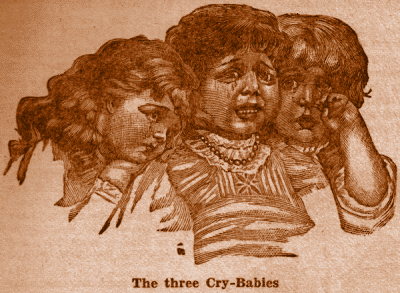
|
Cry-baby Belle
She'll cry if she happens
If the food set before her
If she wants to go out
She screams in the morning
She cries when she's sick,
She always is fretful,
|
|
My sweet little girl should be careful and mild,
That dear little face, which I like so to kiss,
Remember, tho' God is in heaven, my love,
If I am not with you, or if it be dark,
Then dry up your tears, and look smiling again
|
|
Paulina Pry
She would not eat
They heard her cry
|
|
Poor little Annie, you will find,
The other day when Ferdinand—
Her father grieved, said: "This must cease
He set to work that very day,
It was in truth a great success;
With every relative who came,
Annie not long could this endure;
|
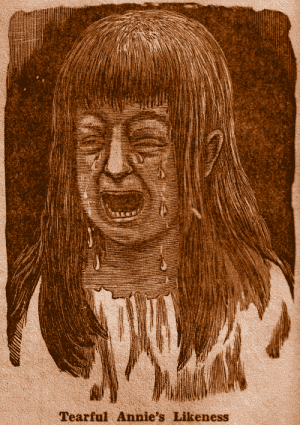
Page 11—Girl Land
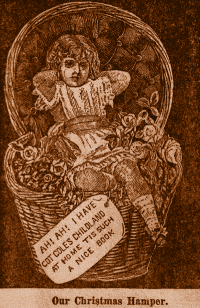
|
Oh! This is a happy, beautiful world!
Yes, six, and father has bought me a book,
My kitty sat quietly near the fire
Ah me! if Kit could only talk,
I dressed all up in grandma's cap,
My mother softly kissed my cheek,
My birthday song is a merry one,
|
|
A funny thing I heard to-day,
And, through the open play-room door,
And Lillie said—(and I agreed
"But, Lillie," urged the elder one,
|
|
"I would not be a girl," said Jack,
"I would not be a boy," said May,
|
|
"I'm losted! Could you find me, please?"
"Tell me your name, my little maid:
"But, dear," I said, "what is your name?"
"My mamma never scolds," she moans,
Anna E. Burnham
|
|
Here stands little, little Mary,
Who so gay as Mary?
Household pet is Mary—
Mischief-loving Mary,
|
|
As Peter sat at Heaven's gate
"What claim hast thou to enter here?"
"Enough," the hoary guardian said,
|
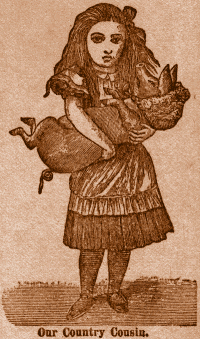
Page 12—Naughty Girls
|
Once I knew a little girl,
At night she'd stop upon the stairs,
The bed at last they tuck'd her in,
|
|
Go, go, my naughty girl, and kiss
What! little children scold and fight
I can't imagine for my part,
|
|
Let dogs delight to bark an bite,
But children you should never let
|
|
Why is Mary standing there,
Come here, my dear, and tell me true,
When, then, indeed, I'm grieved to see
Oh! how much better it appears,
|
|
What! cry when I wash you! not love to be clean?
|
|
A little girl, named Mary Kate,
A silly habit she's acquired
Her play-companions used to laugh,
|
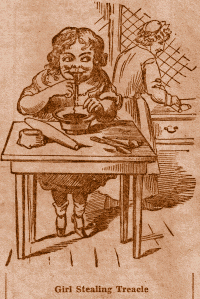
|
This is Nelly Pilfer;
They caught the greedy Nelly
|
|
Little Polly Flinders,
|
|
I knew a greedy little girl,
Five dolls she had—one was black,
Now this was wicked of the child,
|
|
Mamma, a little girl I met,
Poor little girl! and don't you know
For once, when nobody was by her,
In vain she tried to put it out,
For many months before 'twas cured,
|
|
Little Miss Consequence strutted about,
|
|
"But, mamma, now," said Charlotte, "pray don't you believe
"I ride in my coach, and have nothing to do.
"Then servants are vulgar and I am genteel;
"Gentility, Charlotte," her mother replied,
"Not all the fine things that fine ladies possess
|
Page 13—Naughty Girls
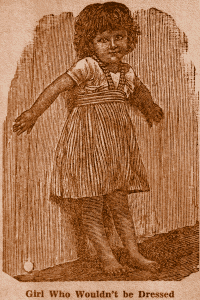
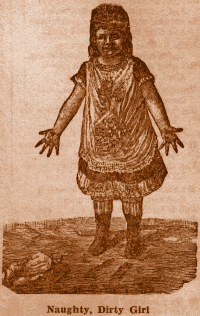
|
"I won't be dressed, I won't, I won't!"
Peggy then frowned and set her lips
The minutes passed, and Peggy sighed,
Then mother came, and firmly said,
"So now to bed, my little maid,
Oh, for the tears that Peggy shed!
|
|
"Mamma! I see something
"It is Mamma's shadow
"These wonderful shadows
"And when you are out
"Now hold up your mouth,
Mary Lundie
|
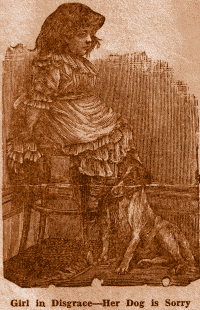
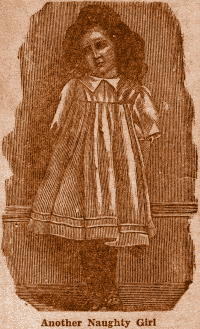
Page 14—Naughty Girls
|
Little Bo-Peep has lost her sheep,
Little Bo-Peep fell fast asleep,
Then up she took her little crook,
It happened one day, as Bo-Peep did stray
She heaved a sigh, and gave by-and-by
|
|
Mary had a little lamb
So Mary took that little Lamb
|
|
Pemmy was a pretty girl,
Pemmy had a pretty nose,
Pemmy had a pretty song,
|
|
I had a little husband,
I bought a little horse,
I gave him some garters,
|
|
Now children dear, you all come near
For now I'm Governess you'll find,
And Sarah White sit down at once,
And find your thimble Maggie More,
|
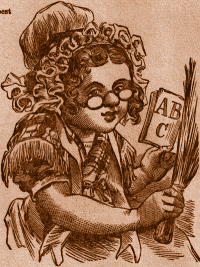
|
And you Kate Ross, stop pinching there, Don't scratch! nor pull your sister's hair; And you, you naughty Lucy Moyes, Must not be talking to the boys.
And Bridget Mace don't make that face;
Now I want all good children in my school,
Yes all be good and learn your lessons well,
|
|
Little Nellie Nipkin, brisk, and clean, and neat,
|
|
Dingty diddledy, My mamma's maid,
|
|
I have a little doll, I take care of her clothes;
|
|
As Tommy Snooks and Bessy Brooks
|
|
Little Betty Blue, lost her left shoe,
|
|
Cross patch, draw the latch,
|
|
Hinx, minx! the old witch winks,
|
|
Doodle, doodle, doo,
|
|
The girl in the lane that couldn't speak plain,
|
|
Mary, Kate, and Maria went down as agreed,
A young rabbit also, tho' seeming to dose,
|
Page 15—Naughty Girls
|
One ugly trick has often spoiled
Sometimes she'd lift the teapot lid
Her grandma went out one day,
Forthwith she placed upon her nose
"I know grandmamma would say,
So thumb and finger went to work
Poor eyes, and nose, and mouth beside,
She dashed the spectacles away,
Matilda, smarting with the pain,
|
|
"Oh! Lucy! Fanny! Make haste here!
And Lucy cries, with open eyes,
Mamma comes in: "Heyday! what's this?
|
|
A naughty girl had got no toy,
|
|
Little Miss Baster, of Sunnyside,
|
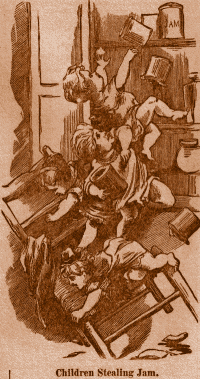
|
Four naughty little children thought
Their mother who was just next door,
|
|
Her sister would come to the bedside and call,
"The water is boiling, the table is spread,
Then Sally sat up and half opened her eyes,
But though she was lazy, she always could eat,
Her frock was all crumpled and twisted away,
She sauntered about till the old village clock
But soon as she came to the little cake shop,
Again she went on, and she loitered again
The governess frowned as she went to her place,
She hated her reading, and never would write,
|
|
I tell you of a little girl, who would herself have been, |
|
She would have been a pretty child, But, oh! she was a fright— She looked just like a girl that's wild, Yes, quite as ugly, quite; She looked just like a girl that's wild— A frightful ugly sight.
|
|
The school was closed one afternoon,
Some plucked the flowers upon the banks,
And if, perchance, a girl came near,
As Nelly White ran home from school,
"We don't want you," said Lucy Bell,
Then both girls cried, "Tell-tale-tit,"
|
Page 16—Girl's Stories
|
Once upon a time there was a dear little girl whose mother made her a scarlet cloak with a hood to tie over her pretty head; so people called her (as a pet name) "Little Red Riding-Hood." One day her mother tied on her cloak and hood and said, "I wish you to go to-day, my darling, to see your grandmamma, and take her a present of some butter, fresh eggs, a pot of honey, and a little cake with my love." Little Red Riding-Hood loved her grandmother, and was very glad to go. So she ran gaily through the wood, gathering wild flowers and gambolling among the ferns as she went; and the birds all sang their sweetest songs to her, and the bluebells nodded their pretty heads, for everything loved the gentle child. By and by a great hungry Wolf came up to her. He wished to eat her up, but as he heard the woodman Hugh's axe at work close by, he was afraid to touch her, for fear she should cry out and he should get killed. So he only asked her where she was going. Little Red Riding-Hood innocently told him (for she did not know he was a wicked Wolf) that she was going to visit her grandmother, who lived in a cottage on the other side of the wood. Then the Wolf made haste, and ran through the wood, and came to the cottage of which the child had told him. He tapped at the door.
"Who's there?" asked the old woman, who lay sick in bed.
The cruel Wolf did so, and, jumping on the bed, ate the poor grandmother up. Then he put on her night-cap and got into bed. By and by Little Red Riding-Hood, who had lingered gathering flowers as she came along, and so was much later than the Wolf, knocked at the door.
"Who's there?" asked the Wolf, mimicking her grandmother's
voice. So Red Riding-Hood came in, and the Wolf told her to put down her basket, and come and sit on the bed. When Little Red Riding-Hood drew back the curtain and saw the Wolf, she began to be rather frightened and said,
"Dear Grandmamma, what great eyes you have got!"
Alas! she reminded the greedy Wolf of eating.
"All the better to eat you with!" he growled; and, jumping
out of bed, sprang at Red Riding-Hood. But just at that moment Hugh the woodman, who had seen the sweet child go by, and had followed her, because he knew there was a Wolf prowling about the forest, burst the door open, and killed the wicked animal with his good axe. Little Red Riding-Hood clung round his neck and thanked him, and cried for joy; and Hugh took her home to her mother; and after that she was never allowed to walk in the greenwood by herself. It was said at first that the Wolf had eaten the child, but that was not the case; and everybody was glad to hear that the first report was not correct, and that the Wolf had not really killed Little Red Riding-Hood.
|
|
Little Miss Jewel
|
|
Little girl, little girl, where have you been;
|
|
Little Betty Blue lost her pretty shoe;
|
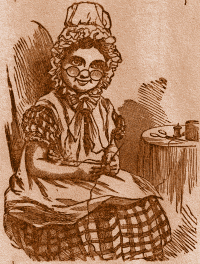
|
Last night when I was in bed,
But she was such a tiny girl,
An I went walking up the street,
And after tea I washed her face;
|
|
A long time ago there lived in an old mansion in the country a rich gentleman and his wife, who had two dear little children, of whom they were very fond. Sad to relate, the gentleman and lady were both taken ill, and, feeling they were about to die, sent for the uncle of the children, and begged him to take care of them till they were old enough to inherit the estates. Now this uncle was a bad and cruel man, who wanted to take the house, the estates, and the money for himself,—so after the death of the parents he began to think how he could best get rid of the children. For some time he kept them till he claimed for them all the goods that should have been theirs. At last he sent for two robbers, who had once been his companions, and showing them the boy and girl, who were at play, offered them a large sum of money to carry them away and never let him see them more. One of the two robbers began coaxing the little boy and girl, and asking them if they would not like to go out for a nice ride in the woods, each of them on a big horse. The boy said he should if his sister might go too, and the girl said she should not be afraid if her brother went with her. So the two robbers enticed them away from the house, and, mounting their horses, went off into the woods, much to the delight of the children, who were pleased with the great trees, the bright flowers, and the singing of the birds. Now, one of these men was not so bad and cruel as the other, and he would not consent to kill the poor little creatures, as the other had threatened he would do. He said that they should be left in the woods to stray about, and perhaps they might then escape. This led to a great quarrel between the two, and at last the cruel one jumped off his horse, saying he would kill them, let who would stand in the way. Upon this the other drew his sword to protect the children, and after a fierce fight succeeded in killing his companion. But though he had saved them from being murdered, he was afraid to take them back or convey them out of the wood, so he pointed out a path, telling them to walk straight on and he would come back to them when he had bought some bread for their supper; he rode away and left them there all alone, with only the trees, and birds and flowers. They loved each other so dearly, and were so bold and happy, that they were not much afraid though they were both very hungry. The two children soon got out of the path, which led into the thickest part of the wood, and then they wandered farther and farther into the thicket till they were both sadly tired, but they found some wild berries, nuts and fruits, and began to eat them to satisfy their hunger. The dark night came on and the robber did not return. They were cold, and still very hungry, and the boy went about looking for fresh fruit for his sister, and tried to comfort her as they lay down to sleep on the soft moss under the trees. The next day, and the next, they roamed about, but there was nothing to eat but wild fruits; and they lived on them till they grew so weak that they could not go far from the tree where they had made a little bed of grass and weeds. There they laid down as the shades of night fell upon them, and in the morning they were both in heaven, for they died there in the forest, and as the sun shone upon their little pale faces, the robins and other birds came and covered their bodies with leaves, and so died and were buried the poor Babes in the Wood.
|
Page 17—Girl's Stories
|
Cinderella's mother died while she was a very little child, leaving her to the care of her father and her step-sisters, who were very much older than herself; for Cinderella's father had been twice married, and her mother was his second wife. Now, Cinderella's sisters did not love her, and were very unkind to her. As she grew older they made her work as a servant, and even sift the cinders: on which account they used to call her in mockery "Cinderella." It was not her real name, but she became afterwards so well known by it that her proper one has been forgotten. She was a sweet tempered, good girl, however, and everybody except her cruel sisters loved her. It happened, when Cinderella was about seventeen years old, that the King of that country gave a ball, to which all the ladies of the land, and among the rest the young girl's sisters were invited. So they made her dress them for this ball, but never thought of allowing her to go.
"I wish you would take me to the ball with you, sisters,"
said Cinderella, meekly.
"Take you, indeed!" answered the elder sister with a sneer,
"it is no place for a cinder-sifter: stay at home and do your work." When they were gone, Cinderella, whose heart was sad, sat down and cried; but as she sorrowful, thinking of the unkindness of her sisters, a voice called to her from the garden, and she went to see who was there. It was her godmother, a good old Fairy. "Do not cry, Cinderella," she said; "you also shall go to the ball, because you are a kind, good girl. Bring me a large pumpkin." Cinderella obeyed, and the fairy touched it with her wand, turned it into a grand coach. Then she turned a rat into a coach-man, and some mice into footmen; and touching Cinderella with her wand, the poor girl's rags became a rich dress trimmed with costly lace and jewels, and her old shoes became a charming pair of glass slippers, which looked like diamonds. The fairy told her to go to the ball and enjoy herself, but to be sure and leave the ball-room before the clock struck eleven. "If you do not," she said, "your fine clothes will all turn to rags again. So Cinderella got into the coach, and drove off with her six footmen behind, very splendid to behold, and arrived at the King's Court, where she was received with delight. She was the most beautiful young lady at the ball, and the Prince would dance with no one else. But she made haste to leave before the hour fixed and had time to undress before her sisters came home. They told her a beautiful Princess had been at the ball, with whom the Prince was delighted. They did not know it was Cinderella herself. Three times Cinderella went to royal balls in this manner, but the third time she forgot the Fairy's command, and heard eleven o'clock strike. She darted out of the ball-room and ran down stairs in a great hurry. But her dress all turned to rags before she left the palace and she lost one of her glass slippers. The Prince sought for her everywhere, but the guard said no one had passed the gate but a poor beggar girl. However, the prince found the slipper, and in order to discover where Cinderella was gone, he had it proclaimed that he would marry the lady who could put on the glass slipper. All the ladies tried to wear the glass slipper in vain, Cinderella's sisters also, but when their young sister begged to be allowed to try it also, it was found to fit her exactly, and to the Prince's delight, she drew the fellow slipper from her pocket, and he knew at once that she was his beautiful partner at the ball. So she was married to the Prince, and the children strewed roses in their path as they came out of church. Cinderella forgave her sisters, and was so kind to them that she made them truly sorry for their past cruelty and injustice.
|
|
Once upon a time three bears lived in a nice little house in a great forest. There was Father Bear, Mother Bear, and Baby Bear. They had each a bed to sleep in, a chair to sit on, and a basin and a spoon for eating porridge, which was their favourite food. One morning the three bears went to take a walk before breakfast; but before they went out they poured the hot porridge into their basins, that it might get cool by the time they came back. Mr and Mrs Bear walked arm-in-arm, and Baby Bear ran by their side. Now, there lived in that same forest a sweet little girl who was called Golden Hair. She, also, was walking that morning in the wood, and happening to pass by the bear's house, and seeing the window open, she peeped in.
|
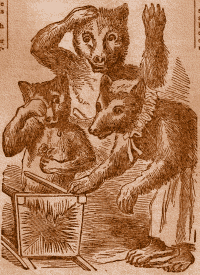
|
There was no one to be seen, but three basins of steaming hot
porridge all ready to be eaten, seemed to say "Come in and have some
breakfast." So Golden Hair went in and tasted the porridge in all the
basins, then she sat down in Baby Bear's chair, and took up his
spoon, and ate up all his porridge. Now this was very wrong. A tiny
bear is only a tiny bear, still he has the right to keep his own
things. But Golden Hair didn't know any better.
Unluckily, Baby Bear's chair was too small for her, and she broke the seat and fell through, basin and all. Then Golden Hair went upstairs, and there she saw three beds all in a row. Golden Hair lay down on Father Bear's bed first, but that was too long for her, then she lay down on Mother Bear's bed, and that was too wide for her, last of all she lay down on Baby Bear's bed, and there she fell asleep, for she was tired. By-and-by the bears came home, and Old Father Bear looked at his chair, and growled:
"Somebody has been here!" Baby Bear, seeing his chair broken, squeeled out "Somebody has been here, and broken my chair right through!" Then they went to the table, and looked at their porridge, and Father Bear Growled:
"Who has touched my basin?" But the noise they made awoke Golden Hair; she startled out of bed (on the opposite side) and jumped out of the window. The three bears all jumped out after her, but they fell one on the top of the other, and rolled over and over, and while they were picking themselves up, little Golden Hair ran home, and they were not able to catch her.
|
|
Once there lived in a lovely castle a very rich man called Bluebeard. A short distance off lived an old gentleman with two lovely daughters, named Fatima and Annie. Bluebeard visited their house, and at length proposed to Fatima, was accepted by her, and they were married with great splendour. He took her home with him to his castle, and permitted her sister Annie to reside with her for company for a time. She lived very happily in her new home, her new husband was very kind to her, and allowed her to have everything she wished for, but one day he suddenly told her that business called him away from home, that he should be away some days, and handed her the keys to his wardrobe, treasures, and all parts of the castle, he also gave her one key of a small closet, and told her that she might unlock every door in the castle, but not the closet door, for if she did so, she should not live an hour longer. He then left home fondly kissing her at the door. Her sister and herself returned into the castle, and enjoyed themselves in unlocking room after room, looking over the curiosities, treasures, &c, until Annie became tired and lay down to rest on a rich sofa, and fell asleep. Fatima, as soon as she saw that her sister was asleep, felt a womanly curiosity, an irresistible temptation to unlock the forbidden closet, and take a peep. She tripped lightly up to the door, turned the key in the lock, pushed the door open, and, oh! horror! there were five or six dead ladies lying in the closet, with their marriage rings on their fingers. She at once concluded that they were Bluebeard's previous wives, she let the key drop in her fright into the blood on the floor, she picked it up and attempted to wipe it, but the blood would not come off. She awoke her sister, and they both tried, but they could not get it off, and gave it up in despair. Just then Bluebeard suddenly returned, and asked his wife if she could please to hand him the keys. She trembling did so. He said "How came the blood on the closet key? You have disobeyed me, and shall die at once." She begged a few minutes to say her prayers and just as he was going to chop her head off, her two brothers arrived at the castle, burst open the door, killed the cruel wretch, and rescued their sisters.
|
Page 18—Girl Land
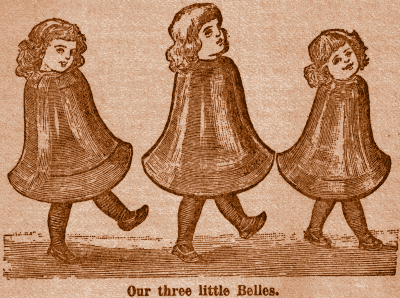
|
A little corner with it's crib.
A little plate all lettered round,
A little doll with flaxen hair.
A little school day after day,
A little muff for wintry weather,
A little while to dance and bow,
A little walk in leafy June,
A little ceremony grave,
|
|
There was a little girl,
|
|
Two little rough-worn, stubbed shoes
Of very homely fabric they,
And yet this little, worn-out pair
This mottled leather, cracked with use,
Search through the wardrobe of the world!
And why? Because they tell of her,
They tell me of her merry laugh;
They tell me that her wavering steps
High hills and swift descents abound;
Sweet little girl! be mine the task
And when my steps shall faltering grow,
|
|
And this was your cradle?
Your baby-day flowed
To hint at an infantine
Ay, here is your cradle,
It is Hope gilds the future—
Is life a poor coil
Then smile as your future
Ay, here is your cradle!
Frederick Locker
|
|
The chill November day was done,
And hopelessly and aimlessly
And shivering on the corner stood
Her dimpled face was stained with tears;
And one hand round her treasures,
"Tell me your street name and number, pet;
"He came and played at Miller's steps;
I've walked about a hundred hours,
"But what's your mother's name?
"But what is strange about the house,
Oh! dear, I ought to be at home,
"And there's a bar between, to keep
The sky grew stormy, people passed,
I spied a ribbon about her neck.
A card with number, street, and name!
And so I wear a little thing
Eliza S. Turner
|
Page 19—Girl Land
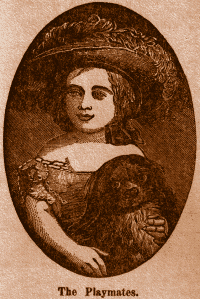
|
There's the pretty girl,
There's the dowdy girl,
There's the tender girl,
There's the lazy girl,
There are many others,
|
|
There is a strange deformity
|
|
Oh, Sarah mine, hark to my song
You know my fond heart beats for you
The day's not far when you'll be mine—
The tender fates shall crown your lot,
With bridal altar draped with flowers
There's nothing I'll not do for you
I must to sleep, Sal, soda you,
|
|
A good girl to have—Sal Vation.
|
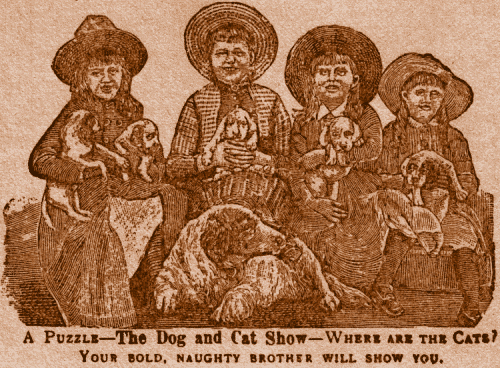
Page 20—Girl Land
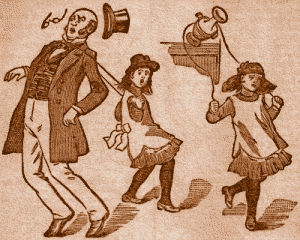
|
Jennie has a jumping-rope
She knocked the vases from the shelf,
Against the wall, against the door
She jumped so high, she jumped so hard,
|
|
Matilda was a pretty girl,
She once her lessons would not learn,
As she advanced to riper years,
She grew a woman, and for life
Duties neglected, warnings spurn'd,
Still on she went from bad to worse,
Afflictions came, and death in view,
Could you have then Matilda seen,
|
|
Little Miss Meddlesome
Out goes the spools spinning
Little Miss Meddlesome
She turns over the ottoman,
But here comes the nurse,
|
|
"Again, Matilda,
Your needles, pins, your thread,
Fie, fie, my child!
I'm now resolv'd
In vain Matilda wept,
Arriv'd at Austere Hall,
"You read, and write,
But very careless,
The little girl
The lady harsh replies,
As thus Matilda sat,
Her hair and dress neglected,
"Here, child," she said,
A polyanthus bright,
Entangled were
She took a thread,
Well-order'd silks
She sigh'd, and melted
A pretty maiden, clean,
"My name is Order,
She took the silks,
Matilda now resumed
She leaves the room,
"Why this is well!
And now amuse yourself,
At all her tasks
With tears and sighs
No longer Lady Rigid
And when the day
"You quit me, child,
And now, my dear,
"From me," Disorder asked,
|
Page 21—Girl Land
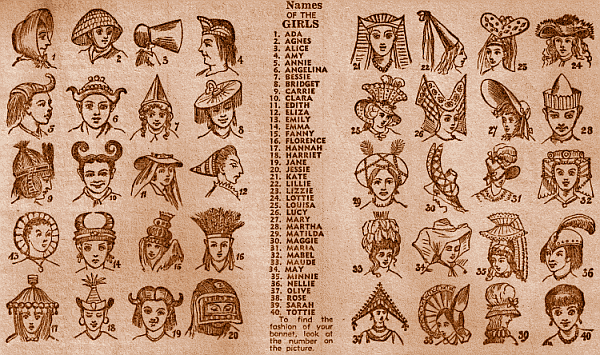
|
Forty little school girls, running, but not flirty;
Thirty little school girls swimming the river Plenty;
Twenty little school girls jumping in velveteen;
Nineteen little school girls going out a-skating;
Eighteen little school girls dancing with the queen;
Seventeen little school girls driving a bullock team;
Sixteen little school girls creeping out unseen;
Fifteen little school girls hopping on the green;
Fourteen little schoolgirls floating down a stream;
Thirteen little school girls leaping out to delve;
Twelve little school girls racing out for leaven;
Eleven little school girls dodging a lion when—
Ten little school girls, all skipping in a line;
Nine little school girls swinging on a gate;
Eight little school girls, trying to fly to heaven;
Seven little school girls tripping out for sticks;
Six little school girls, going for a dive;
Five little school girls, sailing to explore;
Four little school girls steaming on the sea;
Three little school girls, riding on a moo;
Two little school girls, sliding about for fun;
One little school girl, the nicest, last and best, |
| The following is the way that each girl went into Cole's Book Arcade: |
|
Ada ran into it. Agnes ran into it. Alice ran into it. Amy ran into it. Annie ran into it. Angelina ran into it. Bessie ran into it. Bridget ran into it. Carrie ran into it. Clara ran into it. Edith swam into it. Eliza swam into it. Emily swam into it. Emma swam into it. Fanny swam into it. Florence swam into it. Hannah swam into it. Harriet swam into it. Jane swam into it. Jessie swam into it. Kate jumped into it. Lillie skated into it. Lizzie danced into it. Lottie drove into it. Louisa crept into it. Lucy hopped into it. Mary floated into it. Martha leaped into it. Matilda raced into it. Maggie dodged into it. Maria skipped into it. Mabel swung into it. Maude flew into it. May tripped into it. Minnie dived into it. Nellie sailed into it. Olive Steamed into it. Rose rode into it. Sarah slid into it. Tottie walked into it. |
|
N.B.—Any little girl is invited to walk, run, jump, dance, skip,
hop, swim, fly, or come into Cole's Book Arcade in any way she
chooses, the same as the Forty Little School Girls.
|
|
Once there was a funny old monkey—and this old monkey had six young monkeys. There was one white monkey, and one black monkey, and one yellow monkey, and one red monkey, and one blue monkey, and one green monkey; and the white monkey's name was Linda, and the black monkey's name was Eddie, and the yellow monkey's name was Vally, and the red monkey's name was Ruby, and the blue monkey's name was Pearl, and the green Monkey's name was Ivy Diamond. And the white monkey liked apples, and the black monkey liked grapes, and the yellow monkey liked cherries, and the red monkey liked strawberries, and the blue monkey liked oranges, and the green monkey liked nuts, and that's all about these FUNNY MONKEYS. The names of any children can be told in this story instead of Linda, Eddie, Vally, Ruby, Pearl, and Diamond.
|
Page 22—Girl Land
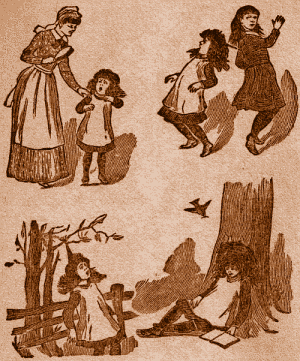
|
There was a girl, named tanglepate,
She cried and made a dreadful fuss,
Her hair stood out around her head
It caught on buttons, hooks, and boughs
And so she fell asleep one day
|
|
I know a very careless girl,
Her skirts she catches on a nail,
'Tis her delight to tear and rend,
|
|
The naughty girl
She pinches the cat,
She worries poor grandma,
At school she forgets
At table she's careless,
|
|
Mopy Maria
She filled the room
She moped and pined
It wasn't her style
If the children came
Her face grew thin;
The winds were high,
|
|
Naughty May will not obey,
If you say do this, or that,
O she is a naughty child!
Some fine day, I don't know when—
Pigs are stubborn things indeed,
And pig-headed folks are they
|
|
Oh! Mary, my mary,
I thought you were pleas'd.
Her bonnet of straw
Suppose (you're my Dolly,
But Dolly's mere wood,
'Tis not for the Dolly
|
|
When I was living down in Wales,
The more she bit the more they bled,
See, here she is: she sadly stands
Her father said, "You naughty thing,
|
|
When little Lizzie came across
She chased the dog, she chased the cat,
She poked the turtles and the frogs
One day she chanced to find a hive
And so she did. As soon as she
|
Page 23—Girl Land
|
"Dear me! what signifies a pin,
So onward tripped the little maid,
Next day a party was to ride
In vain her eager eyes she brings
At last, as hunting on the floor,
There's hardly anything so small,
Ann Taylor
|
|
Oh! she was such a stupid Jane,
If she was set to do a task,
If on an errand told to go,
She did not care for books or toys,
Brought to the parlour nicely drest
Oh! she was such a stupid Jane,
|
|
The awfullest times that ever could be
|
|
Polly was a little girl,
Other little girls and boys
There they'd romp, and have great fun,
What had any one done?
Why are you so cross and glum
Polly loves to have her way;
Such a funny under-lip!
In the house or out-of-doors,
Once, when in the garden she
Then she danced, and then she screamed;
Oh, it swelled, and swelled, and swelled,
Many days she kept her bed;
For the buzzing busy-bee
|
|
Oh, here's a sad picture!
'Tis Emily's portrait:
Her mother implores her,
Her trimmings are torn;
Stockings down, buttons missing;
Her mother does nothing
"All, all is in vain.
A terrible thing
This girl ran quite wild;
A man, who was passing,
She is still standing there;
"Look at this dreadful thing!
|
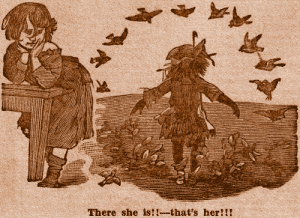
Page 24—Girl Land
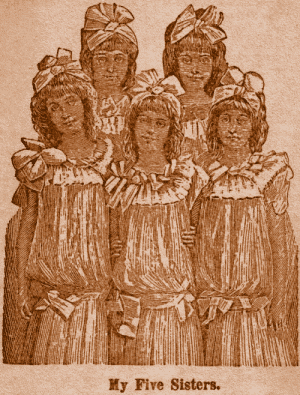
|
Maiden! with the meek, brown eyes,
Thou, whose locks outshine the sun,
Standing, with reluctant feet,
Gazing, with a timid glance,
Deep and still, that gliding stream
Then why pause with indecision,
Seest thou shadows sailing by,
Hearest thou voices on the shore,
O, thou child of many prayers!
Like the swell of some sweet tune,
Childhood is the bough where slumber'd
Gather, then each flower that grows,
Bear a lily in thy hand;
Bear, through sorrow, wrong, and ruth,
Oh! that dew, like balm, shall steal
And that smile, like sunshine, dart
Longfellow
|
|
The girls that are wanted are good girls—
The girls that are fair on the hearthstone,
The girls that are wanted are girls of sense,
The girls that are wanted are girls with hearts,
|
|
Francis, is "unrestrained and free;"
|
|
There's something in the name of Kate
There's deli-Kate, a modest dame,
Communi-Kate's intelligent,
There's intri-Kate, she's so obscure
Prevari-Kate's a surly maid,
There's alter-Kate, a perfect pest;
Then dislo-Kate, is quite a fret,
Equivo-Kate no one will woo—
There's vindi-Kate, she's good and true,
There's rusti-Kate, a country lass,
Of all the maidens you can find,
|
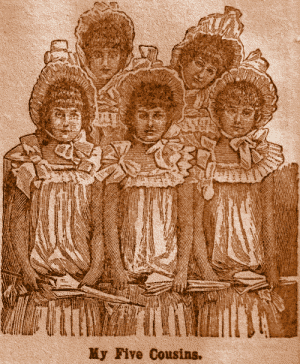
Page 25—Girl Land
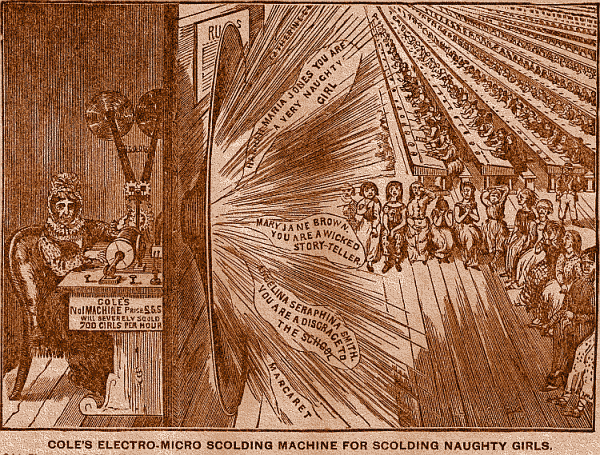
|
Cole's Electro-micro Scolding Machine is a combination of three instruments, the Phonograph, the Microphone, and the Wonderphone. The Phonograph is an instrument that will preserve words for any length of time. Any person can speak, sing, whistle, or scold into a Phonograph, and months or years afterwards by simply turning a handle the same sounds can be reproduced a dozen, a hundred, or a thousand times in the exact voice of the person who spoke them in; so that if a man or a woman, who is a great scold, speak some good, loud, severe scolding into a Phonograph, the mildest teacher can then scold her pupils, or the kindest mother her children, just by turning the handle. The Microphone is an instrument that magnifies sound in the same way as a microscope magnifies objects; a very powerful microphone magnifies the sound of a fly walking into a loud tramping footstep, the tick of a watch into a deafening clatter, and a whisper into a loud shout. Take a Microphone, then properly affix it to the Phonograph described above, and you have a good Scolding Machine; turn the handle, and as the Phonograph gives out the scoldings, the microphone part magnifies them so loudly that they are heard for a considerable distance. The Wonderphone (Cole's own secret) is another remarkable instrument; it will cause sound to travel very distinctly, but frightfully and equally loud, for forty miles in all directions; by attaching this powerful instrument to the combination of the other two, Cole's Electro-micro Scolding Machine is formed—and which is the first Scolding Machine ever invented. If the machine is already charged by having had some scolding spoken, or even whispered into it, give the handle a turn, and forty miles to the east, forty miles to the west, forty to the north, forty to the south, forty up in the sky, and down in the mines forty miles deep, in fact forty miles in every direction, everybody can clearly hear every word being said to the girl being scolded. Suppose for instance, Hannah Maria Smith had done something wrong in school, the schoolmistress could give the handle of the machine a turn, and it would scold her so loudly that her mother, and father, and brothers, and sisters, and uncles, and aunts, and friends, and those she didn't like would all hear her scolded. The machine can be charged on the instant by anyone scolding into it. In fact the whole value of Cole's Scolding Machine lies in its power to repeat out exceedingly loud whatever is spoken into it. If the schoolmistress chooses she can put the scolding into verse, so that all who hear it in the forty miles around, can more easily remember it. The machine that I have before me now, was charged this morning for an aristocratic school and speaks as follows:—Silence!! Attention!!! |
|
Ada Alice Arabella Angelina Andal, Why do you talk for ever, such a tittle-tattling scandal? Betsy Bertha Bridget Belinda Bowing, Will you be quiet and go on with your sewing? Cora Caroline Christina Clarinda Clare, Now do look in the glass at your untidy hair. Dorah Dinah Dorothy Dorinda Dresson, You really must get on with your short drawing lesson. Edith Ellen Evelina Elizabeth Eadle, This makes this day your nineteenth broken needle. Fanny Florence Frederica Florinda Flynn, How cruel of you to prick Jane with a pin. Grace Gertrude Genevieve Georgina Grimble, You careless girl to lose your silver thimble. Hilda Hanna Harriet Henrietta Hawker, You really are a most inveterate talker. Ida Izod Irene Isabella Inching, You spiteful—stop that scratching and pinching. Jane Julia Josephine Jemima Jesson, Sit down at once and learn your music lesson. Kate Kester Katrina Kathleen Kent, You're vulgar, saucy, rude and insolent. Lizzie Letitia Lucretia Lorinda Loeries, You're the champion of the world for telling stories. Maud Mary Martha Matilda Moyes, Sends letters to, and flirts with, naughty boys. Nancy Nelly Ninette Naomi Nations, Shame of you to talk 'gainst other girls' relations. Olive Osberta Orphelia Octavia O'Dyke, Your conduct is outrageous and unladylike. Polly Patience Prudence Paulina Pitt, You really are our champion tell-tale-tit. Quilla Quintina Quinburga Quendrida Quirk, How very, very, dirty you have made your fancy-work. Rose Ruth Rachel Rebecca Ritting, Now stop that crying and get on with your knitting. Sarah Sophia Selina Susannah Stacies, Don't spoil your face by making those grimaces. Tilda Theresa Tabitha Theodora Tapping, You'd gain the prize if one was given for slapping. Una Ursula Urica Urania Urls, You'd gain the prize for teasing little girls. Venus Violet Victoria Veronica Vo-shi, Just learn your task and put away that crochet. Wilmett Walberg Winefride Wilhelmina Wriggling, Now once for all do stop that stupid giggling. Xenodice Xanthippe Xanthisa Xenophona X-cess, You think and talk of nothing else but dress! dress! Yana Yulga Yapeena Yestina Young, Will you behave yourself and just draw in your tongue. And lastly and worst of all, you, Zoe Zora Zillah Zenobia Zeen, How dare you! how dare you!! yes, how dare you!!! Sneer at the boy's new whipping Machine.
|
|
If a schoolmistress chooses to live a hundred or a thousand miles away from her school, she can use the Scolding Machine by means of a Telephone attached thereto. One great advantage of the Electro-micro Scolding Machine is, that after it has been in use a short time the girls will all have been shamed into good behaviour; but the Machine will not become useless, as it can, without a farthing outlay, be turned into a Praising Machine, for it can be made to praise in a gentle voice as well as scold in a harsh one. In fact, as said above it will repeat in exact tones, anything that is recited, preached, sung, whistled, whispered, shouted, scolded or praised into it—and any of which will be heard for forty miles around. Cole can supply Scolding Machines from £5 to £50. A very good one (The Excelsior), price £10, can be charged in one minute, and set going like a musical box, and will sing, whistle, recite, preach, or scold away for a full hour without stopping. Cole would particularly recommend this one to the ladies, it would make a fine ornament for their own table. Final Notice Extraordinary—If the champion male scold of the world, and the champion female scold of the world, will call on Professor Cole, at the Book Arcade, Melbourne, he will give them both good wages, and find them constant employment at charging Scolding Machines. If any wife has got the champion male scold for a husband, she will please to let me know. If any husband has got the champion female scold for a wife, he will please to let me know—£10 bonus for information in each case.
E.W. Cole
|
Page 26—Good Girls
|
An orphan child was Jenny Lee;
In winter time, she often rose
And she would always say to Jane,
"Keep baby quiet in his bed,
"And don't let little Christopher,
"And mind about the fire, child,
"Good-by my precious comforter,
Then Jenny she was quite as proud
She did not stop to waste her time,
If down upon the cottage floor
And when the little babe was cross,
But when they both were safe in bed,
Then open flew the cottage door,
|
|
"Mother has sent me to the well,
"Some afternoon I'll come with you,
"She says, that I am nearly eight,
"So Johnny, do not ask to-day—
|
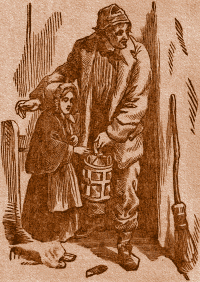
|
Oft I had heard of Lucy Gray;
No mate, no comrade Lucy knew;
You yet may spy the fawn at play,
"To-night will be a stormy night—
"That, father, will I gladly do!
At this the father raised his book
Not blither is the mountain roe;
The storm came on before it's time;
The wretched parents all that night
At day-break on a hill they stood
And, turning homeward, now they cried
Then downwards from the steep hill's edge
And then an open field they crossed—
They followed from the snowy bank
Yet some maintain that to this day
O'er rough and smooth she trips along,
|
|
Mary had a little lamb,
He followed her to school one day—
The teacher therefore turned him out;
At once he ran to her, and laid
"What makes the lamb love Mary so?"
|
Page 27—Girl Land
|
I met a little cottage girl;
She had a rustic, woodland air,
"Sisters and brothers, little maid,
"And where are they? I pray you tell."
"Two of us in the churchyard lie—
"You say that two at Conway dwell,
Then did the little maid reply,
"You run about, my little maid,
"Their graves are green, they may be seen,"
"My stockings there I often knit,
"And often after sunset, sir,
"The first that died was little Jane;
"So in the churchyard she was laid;
"And when the ground was white with snow,
"How many are you then? said I,
"But they are dead; those two are dead;
|
|
Young Lucy Payne lives on the Village Green;
She plies her needles, and she plies them well,
I pass'd one morning by their cottage door;
Hanger had tamed the little wilding thing,
It was her breakfast—all the darling
had;
|
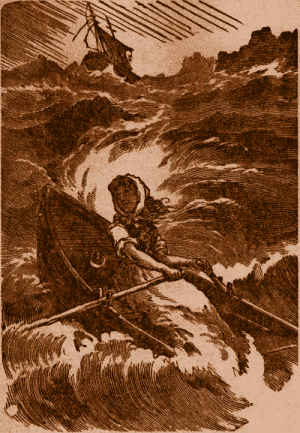
|
"Over the wave, the stormy wave,
"Out with the boat, the gallant boat;
"I have no fear, no maiden fear;
"The wreck we near, the wreck we near,
Hail to the maid, the fearless maid,
|
|
Who is it each day in the week may be seen,
Go visit her cottage, though humble and poor.
|
|
"I will be good, dear mother,"
Oh, many, many, bitter tears
|
|
I have a little sister,
|
Page 28—Ruby Cole And Her Clever Frog

|
She danced like a Fairy,
Oh yes! Oh yes! She did! She Did!
She mooed like a Bullock,
She brayed like a Donkey,
She munched like a Rabbit,
She talked like a Parrot,
She climbed like a Squirrel,
She crept like a Tortoise,
She roared like a Lion,
She croaked like a Raven,
She grinned like a Monkey,
|
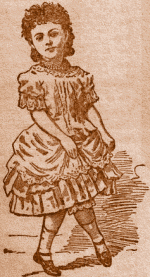
|
Our dear little daughter once went to a children's ball dressed as a
fairy. She was proud of being a fairy, and looked so nice that I put
together the above nursery doggerel to please her, and in honour of
the event, little thinking that she would soon leave this world. It
might be considered better by some to remove this page, but as
children like it I venture to let it stand with this explanation.
E. W. C.
|
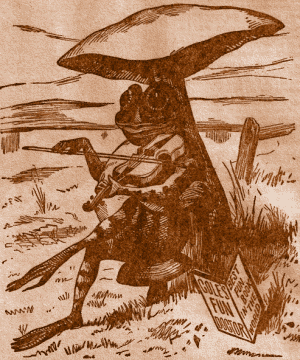
| Sacred to the Memory of our dear LITTLE RUBY, who departed this life March 27th, 1890, aged 8 years. She was intelligent, industrious, affectionate and sociable, and is deeply regretted by all who knew her. |
|
There is no flock, however watched and tended But one dead lamb is there! There is no fireside, howsoever defended But has one vacant chair!
There is no death! what seems so is transition
She is not dead—the child of our
affection—
|
Page 29—Vally Cole And His Clever Dog
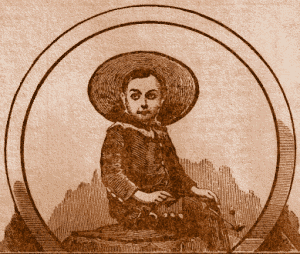
|
Our Vally had a Clever Dog, whose name was EBENEZER. Sometimes this dog was very good, At other times a TEASER.
|
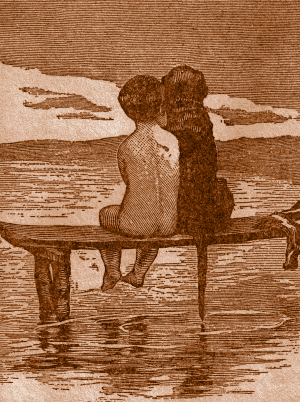
|
One day they went to take a bath, And both sat on a rail; Our Vally hung his legs right down, The dog hung down his tail.
|
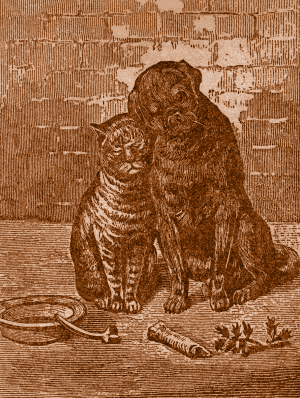
|
This funny Dog one Christmas day, Directly after dinner, Just lean'd his sleepy head against Old Tom, our snoozing sinner.
|
Page 30—Boy's Stories
|
Tommy Trot, a man of law, Sold his bed and lay upon straw; Sold the straw and slept on grass, To buy his wife a looking-glass.
Little Jack Jingle,
I'll tell you a story
Poor old Robinson Crusoe!
"John, come sell thy fiddle,
Jacky, come give me thy fiddle
Jack was a fisherman
The Queen of Hearts,
The King of Hearts
Charley Wag
|
|
Tom, Tom, the piper's son,
Tom, he was a piper's son:
Now Tom with his pipe made such a noise,
|
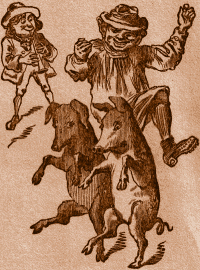
|
Tom with his pipe did play with such skill, That those who heard him could never keep still: Whenever they heard they began for to dance, Even the pigs on their hind legs would after him prance.
As Dolly was milking her cow one day,
He met old Dame Trot with a basket of eggs,
He saw a cross fellow beating an ass,
Tom met the parson on his way,
The mayor then said he would not fail
'Twas quite a treat to see the rout,
The Policeman Grab, who held him fast,
Taffy was a Welshman, Taffy was a thief,
Old King Cole
Peter White will ne'er go right;
|
Page 31—Boy Land
|
This is the house that Jack built.
This is the malt
This is the rat,
This is the cat,
This is the dog,
This is the cow with the crumpled horn,
This is the maiden all forlorn,
This is the man all tattered and torn,
This is the priest all shaven and shorn,
This is the cock that crowed in the morn,
This is the farmer sowing his corn,
|
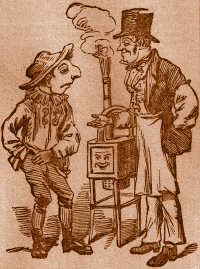
|
Simple Simon met a pieman
Says the pieman to Simple Simon,
Simple Simon went a-fishing
Simple Simon went to look
He went to catch a dicky bird,
Then Simple Simon went-a-hunting,
Simon made a great snowball,
Simple Simon went a-skating
And Simon he would honey eat
|
|
Ten little Niggers going out to dine,
Nine little Niggers crying at his fate,
Eight little Niggers to travelling were given.
Seven little Niggers playing at their tricks,
Six little Niggers playing with a hive,
Five little Niggers went in for law,
Four little Niggers going out to sea,
Three little Niggers walking in the Zoo,
Two little Niggers sitting in the sun,
One little Nigger living all alone,
|
Page 32—Boy Land
|
Once upon a time there lived in Cornwall, England, a lad whose name was Jack, and who was very brave and knowing. At the same time there was a great Giant, twenty feet high and nine feet round, who lived in a cave, on an island near Jack's house. The Giant used to wade to the mainland and steal things to live upon, carrying five or six bullocks at once, and stringing sheep, pigs, and geese around his waist-band; and all the people ran away from him in fear, whenever they saw him coming. Jack determined to destroy this Giant; so he got a pickaxe and shovel, and started in his boat on a dark evening; by the morning he had dug a pit deep and broad, then covering it with sticks and strewing a little mould over, to make it look like plain ground, he blew his horn so loudly that the Giant awoke, and came roaring towards Jack, calling him a villain for disturbing his rest, and declaring he would eat him for breakfast. He had scarcely said this when he fell into the pit. "Oh! Mr. Giant," says Jack, "where are you now? You shall have this for your breakfast." So saying, he struck him on the head so terrible blow with his pickaxe that the Giant fell dead to the bottom. Just at this moment, the Giant's brother ran out roaring vengeance against Jack; but he jumped into his boat and pulled to the opposite shore, with the Giant after him, who caught poor Jack, just as he was landing, tied him down in his boat, and went in search of his provisions. During his absence, Jack contrived to cut a large hole in the bottom of the boat, and placed therein a piece of canvas. After having stolen some oxen, the Giant returned and pushed off the boat, when, having got fairly out to sea, Jack pulled the canvas from the hole, which caused the boat to fill and quickly capsize. The Giant roared and bellowed as he struggled in the water, but was very soon exhausted and drowned, while Jack dexterously swam ashore. One day after this, Jack was sitting by a well fast asleep. A Giant named Blundebore, coming for water, at once saw and caught hold of him, and carried him to his castle. Jack was much frightened at seeing the heaps of bodies and bones strewed about. The Giant then confined him in an upper room over the entrance, and went for another Giant to breakfast off poor Jack. On viewing the room, he saw some strong ropes, and making a noose at one end, he put the other through a pulley which chanced to be over the window, and when the Giants were unfastening the gate he threw the noose over both their heads, and pulling it immediately, he contrived to choke them both. Then releasing three ladies who were confined in the castle, he departed well pleased. About five or six months after, Jack was journeying through Wales, when, losing his way, he could find no place of entertainment, and was about giving up all hopes of obtaining shelter during the night when he came to a gate, and, on knocking, to his utter astonishment it was opened by a Giant, who did not seem so fierce as the others. Jack told him his distress, when the Giant invited him in, and, after giving him a hearty supper, showed him to bed. Jack had scarcely got into bed when he heard the Giant muttering to himself: |
|
"Though you lodge with me this night, You shall not see the morning light; My club shall dash your brains out quite." |
|
"Oh, Mr. Giant, is that your game?" said Jack to himself; "then I
shall try and be even with you." So he jumped out of bed and put a
large lump of wood there instead. In the middle of the night the
Giant went into the room, and thinking it was Jack in the bed, he
belaboured the wood most unmercifully; he then left the room,
laughing to think how he had settled poor Jack. The following morning
Jack went boldly into the Giant's room to thank him for the night's
lodging. The Giant was startled at his appearance, and asked him how
he slept, or if anything had disturbed him in the night? "Oh, no,"
says Jack, "nothing worth speaking about: I believe that a rat gave
me a few slaps with his tail, but, being rather sleepy, I took no
notice of it." The Giant wondered how Jack survived the terrific
blows of his club, yet did not answer a word, but went and brought in
two monstrous bowls of hasty pudding, placed one before Jack, and
began eating the other himself. Determined to be revenged on the
Giant somehow, Jack unbuttoned his leather provision bag inside his
coat, and slyly filling it with hasty pudding, said, "I'll do what
you can't." So saying, he took up a large knife, and ripping up the
bag, let out the hasty pudding. The Giant, determined not to be
outdone, seized hold of the knife, and saying, "I can do that,"
instantly ripped up his belly, and fell down dead on the spot.
After this Jack fought and conquered many giants, married the king's daughter and lived happily.
|
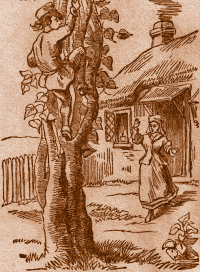
|
At some distance from London, in a small village, lived a widow and her son, whose name was Jack. He was a bold, daring fellow, ready for any adventure which promised fun or amusement. Jack's mother had a cow, of which she was very fond, and which, up to this time, had been their chief support. But as she had for some time past been growing poorer every year, she felt that now she must part with the cow. So she told Jack to take the cow to be sold, and he was to be sure to get a good round sum for her. On the road to market Jack met a butcher, who was carrying in his hat some things which Jack thought to be very pretty. The butcher saw how eagerly Jack eyed his beans, and said, "If you want to sell your cow, my fine fellow, I will give you this whole hatful of beans in exchange for her." Jack was delighted; he seized the hat, and ran back home. Jack's mother was surprised to see him back so soon, and at once asked him for the money. But when Jack said he had sold the cow for a hatful of beans, she was so angry that she opened the window and threw them all out into the garden. When Jack rose up next morning he found that one of the beans had taken root, and had grown up, up, up, until its top was quite lost in the clouds. Jack resolved instantly to mount the Beanstalk. So up, up, up, he went till he had reached the very top. Looking round he saw at a distance a large house. Tired and weary, he crawled towards it and knocked on the door. The door was opened by a timid looking woman who started when she saw him, and besought him to run away as her husband was a cruel Giant who would eat him up if he found him there. But Jack begged so earnestly to be admitted that the woman, who was very kind-hearted, had pity on him, and so she brought him into the kitchen, and set before him on a table some bread, meat, and ale. Jack ate and drank, and soon felt quite refreshed. Presently the woman started and said, "My husband! quick, quick! he comes—he comes!" and opened the door to the oven and bid Jack jump in. The Giant was in a dreadful passion when he came in, and almost killed his wife by a blow which he aimed at her. He then began to sniff and smell—at last he roared out: |
|
"Fee, fa, fi, fo, fum, I smell the blood of an Englishman! Be he alive, or be he dead, I'll grind his bones to make me bread!" |
|
His wife gave him an evasive answer, and proceeded to lay before him
his supper. When the Giant could swallow no more, he called out to
his wife to bring him his hen, which, after being brought, whenever
the Giant said "Lay," the hen laid a golden egg. The Giant soon fell
asleep, and Jack crept out softly and seized the hen, and made off
without disturbing the Giant. Away ran Jack till he came to the
Beanstalk; he was much sooner at the bottom of it now than at the top
in the morning; and running to his mother he told all his adventure.
The hen laid as many golden eggs as Jack liked, and his mother before long had another cow and everything which she desired. A second time Jack climbed the Beanstalk, when he ran away with the Giant's bag of money. A third time Jack climbed the Beanstalk, and again gained admission to the Giant's house. He saw the Giant's wife, and asked her for a night's lodging. She at first said she could not let him into the house, but Jack begged so hard that at last she consented, and gave him some supper and put him to sleep in the copper boiler near the kitchen fireplace, where she thought the Giant would not find him. When the Giant came in, his good nose served him in a moment: for he cried out "I smell fresh meat." Jack laughed at this, but it was no laughing matter; for the Giant looked all around the room, and even put his finger on the lid of the copper, till it seemed as if a stone of a hundredweight had fallen upon the lid. Just then his wife came in with a whole roasted bullock smoking hot, which the Giant sat down and ate for his supper, and then went down into the cellar, and drank about six gallons of Jamaica rum. The Giant now sat down and went to sleep, and Jack tried to run away with his golden harp, an instrument which, when the Giant said "play," played the most beautiful tunes. Now the harp was a fairy, and as soon as he touched it, it called out "Master! Master!" so loud that the Giant awoke, but he was some time before he could understand what was the matter. He tried to run after Jack, but Jack got to the top of the beanstalk first. When he had descended a little way he looked up, and how great was his horror to see the huge hand of the Giant stretched down to seize him by the hair of the head! He slid and scrambled down the Beanstalk, hardly knowing how, and seeing the Giant just putting his feet over the top, he called out, "Quick, mother! A hatchet, a hatchet!" Jack seized it and chopped away at the beanstalk, when down it fell, bringing along with it the Giant. Jack instantly cut off his head. After this Jack and his mother lived very happily, and Jack was a great comfort to her in her old age.
|
Page 33—Boy Land
|
Once upon a time there was a woodman and his wife who had so many children that they did not know how to find food for them. So one night, when they were all in bed, the father told his wife that he thought they had better take them into the forest and lose them there. The youngest child, who was so very small that he was called Hop o' my Thumb, overheard his father, and as he was a very clever boy he made up his mind to find his way home again. So he went down to the brook very early the next morning, and filled his pocket with large smooth pebbles as white as snow. Bye-and-bye the woodman and his wife told the children that they might go with them into the wood to have a good game of play. They were all glad except Hop o' my Thumb who knew what his father intended. So they set out; the woodman and his wife first, then the boys, and last Hop o' my Thumb, who sprinkled pebbles all the way they went. They spent a merry day; but bye-and-bye the parents stole away, and left the children all by themselves. They were very much frightened when they missed their father and mother, and called loudly for them; but when Hop o' my Thumb told them what he had heard, and how they could find their way home by following the track of the pebbles, which marked the way they had come, they set out, and reached home safely, and their father and mother pretended to be very glad to see them back. But soon after they again resolved to lose their children, if possible, in the forest. This time all the boys feared that they should be left behind, and the eldest brother said he would take some peas to sprinkle, to mark the pathway that led home. By-and-bye the cruel parents stole away, and left the little ones in the dark wood. At first they did not care, for they thought that they could easily find their way home; but, alas! when they looked for the line of peas which they had sprinkled, they found they were all gone—the wood-pigeons had eaten them up, and the children were lost in the wood. Holding each-others' hands and crying sadly they walked on to seek a place to sleep in. By-and-bye they came to a giant's castle, where they were taken in, and told that they might sleep in the nursery with the seven baby daughters of the giant, who were lying all in a row in one bed, with gold crowns on their heads. Hop o' my Thumb thought it was strange that the giant should be so kind, as he had been told that the ogres eat children. So in the night he got up softly and took off the little giantesses' crowns and put them on his brothers' heads and his own, and lay down again. It was lucky for him that he did so, for in the night the giant came up in the dark to kill the boys, that they might be ready for the next day's breakfast. He felt the beds, and finding the crowns on the boy's heads took them for his own children, left them and went to the other bed and cut off the heads of his daughters instead. Then he went back to bed. Directly he was gone, Hop o' my Thumb and his brothers got up, stole down stairs, opened the door and fled away from the castle. But they did not go far. Hop o' my Thumb knew that the giant would come after them in his seven-league boots. So they got into a hole in the side of a hill and hid. Very soon after, they saw the giant coming at a great pace in his wonderful boots; but he took such long steps that he passed right over their heads. They were afraid to move out till they had seen him go home again. So they remained quietly where they were. By-and-bye the giant, who had been many miles in an hour, came back tired, and lay down on the hill-side and fell asleep. Then Hop o' my Thumb got out of the hole, and pulled off the giant's seven-league boots, and put them on his own feet. They fitted him exactly, for being fairy boots they would grow large or small just as one liked. He then got his brothers out of the hole, took them in his boots, marched for home, and although it was a great distance, got there in almost no time, but when he arrived at the house his father and mother were not there. He then hastened to make inquiries for them, and found they had been suspected of murdering their children,—who had all disappeared suddenly—that they had owned to leaving them in the wood, and that they were to be put to death for their crime. "We must go and save them," he said. So he took his brothers into the seven-league boots, and set out to the place where their parents were in prison. They arrived only just in time, for the guards were bringing out the woodsman and his wife to put them to death. Hop o' my Thumb took off the boors, and all the children called out, "We are alive! we are alive! Do not kill our mother and father." Then there was great joy. The woodman and his wife were set free, and embraced their children. They had repented their wickedness, and were never unkind and cruel any more; and Hop o' my Thumb kept them all in comfort by going on errands for the king in his seven-league boots.
|
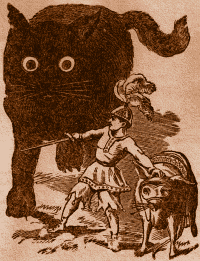
|
In the days of good King Arthur there lived a ploughman and his wife who wished very much to have a son; so the man went to Merlin, the enchanter, and asked him to let him have a child, even, if it were "no bigger than his thumb." "Go home and you will find one," said Merlin; and when the man came back to his house he found his wife nursing a very, very, wee baby, who in four minutes grew to the size of the ploughman's thumb, and never grew any more. The fairy queen came to his christening and named him "Tom Thumb." She then dressed him nicely in a shirt of spider's web, and a doublet and hose of thistledown. One day, while Tom's mother was making a plum-pudding, Tom stood on the edge of the bowl, with a lighted candle in his hand, that she might see to make it properly. Unfortunately, however, while her back was turned, Tom fell into the bowl, and his mother not missing him, stirred him up in the pudding, and put it and him into the pot. Tom no sooner felt the hot water than he danced about like man; the woman was nearly frightened out of her wits to see the pudding come out of the pot and jump about, and she was glad to give it to a tinker who was passing that way. The tinker was delighted with his present; but as he was getting over a style, he happened to sneeze very hard, and Tom called out from the middle of the pudding, "Hallo, Pickens!" which so terrified the tinker that he threw the pudding into the field, and scampered away as fast as he could. The pudding tumbled to pieces in the fall, and Tom, creeping out, went home to his mother, who was in great affliction because she could not find him. A few days afterwards Tom went with his mother into the fields to milk the cows, and for fear he should be blown away by the wind, she tied him to a thistle with a small piece of thread. Very soon after a cow ate up the thistle and swallowed Tom Thumb. His mother was in sad grief again; but Tom scratched and kicked in the cow's throat till she was glad to throw him out of her mouth again. One day Tom Thumb went ploughing with his father, who gave him a whip made of barley straw, to drive the oxen with; but an eagle, flying by, caught him up in his beak, and carried him to the top of a great giant's castle. The giant would have eaten Tom up; but the fairy dwarf scratched and bit his tongue and held on by his teeth till the giant in a passion took him out again and threw him into the sea, when a very large fish swallowed him up directly. The fish was caught soon after and sent as a present to King Arthur, and when the cook opened it there was Tom Thumb inside. He was carried to the king, who was delighted with the little man. The king ordered a little chair to be made, in order that Tom might sit on his table, and also a palace of gold a span high, with a door an inch wide, for little Tom to live in. He also gave him a coach drawn by six small mice. This made the queen angry, because she had no a new coach too; therefore, resolving to ruin Tom, she complained to the king that he had spoken insolently to her. The king sent for him. Tom, to escape his fury, crept into an empty snail shell, and lay there till he was almost starved; when peeping out of the shell he saw a fine butterfly settled on the ground: he now ventured out, and getting on it, the butterfly took wing, and mounted into the air with little Tom on his back. Away he flew from field to field, from tree to tree, till at last he flew to the king's court. The king, queen, and nobles all strove to catch the butterfly but could not. At length poor Tom, having neither bridle or saddle, slipped from his seat and fell into a pool of water, where he was found nearly drowned. The queen vowed he should be beheaded, and while the scaffold was getting ready, he was secured in a mouse-trap; when the cat seeing something stir supposing it to be a mouse, patted the trap about till she broke it, and set Tom at liberty. Sometimes Tom rode out on a mouse for a horse. One day a big black met him along the road, and wanted to kill the mouse. Tom jumped off the mouse's back, drew his sword, and fought the cat, and made her run away. In order to show his courage and please the queen, the new knight undertook a terrible adventure. In one corner of the palace garden there was found a great black spider, of which the lady was very much afraid. Tom undertook to kill this insect; so he took a gold button for a shield, and his sharp needle-sword, and went out to attack the spider; the knights went also, to witness the combat. Tom drew his sword and fought valiantly, but the spider's poisonous breath overcame him. King Arthur and his whole Court went into mourning for little Tom Thumb. They buried him under a rose-bush, and raised a nice white marble monument over his grave.
|
Page 34—Naughty Boys
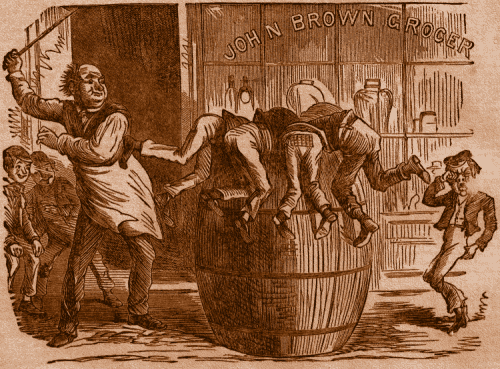
|
Mr. Brown, the grocer, having nearly emptied a cask of sugar in front
of his shop, a number of naughty boys, seeing his back turned,
commenced to steal some. Mr. Brown, spying them through the window,
came out, and the reader can see what happened—A bystander
informs
us that muttered howls of agony arose from the cask, and all the
boys' interest in sugar was at an end.
|
|
I remember, I remember,
I remember how he patted
Grandmamma—a shrewd observer—
While mamma, my form caressing—
I remember, I remember,
I remember Billy Hawkins
To my mother for protection
Pa cried, when he saw my garment,
Then he caught me by the collar,
Grandmamma, while I yet smarted,
I remember, I remember,
And the moral which they taught, I
|
Page 35—Boy Land
|
There was one little Jack,
His friends were much hurt
When to wash he was sent,
The pigs in the dirt
The idle and bad
|
|
Johnny Jones, why do you do it?
Yes, yes! stone flinging.
Someone is watching,
|
|
Dirty, noisy, mischievous Dick,
Her hair he tried to pull up by the roots,
To give him advice was a waste of time,
|
|
A boy looked over a wall,
|
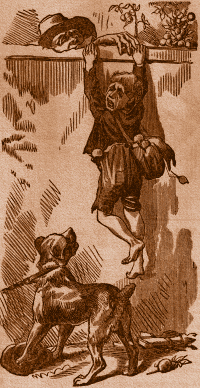
|
The wall he then got over, And up the tree he went; But Chapples, mowing clover, Espied the wicked gent. He let him fill his school-bag— Get over the wall again; Rushed up and played at touch-tag, Which surprised him much, and then:—
Look at the Picture!!!
|
|
Pretty little fingers,
Apt and quick obedient
'T was for play or study,
Picking, poking, soiling
Thus 't was with Robert Chivers,
"Tick, tick" says the Dutch clock.
Who not ask? No! foolish
"Puff, puff," sighs the bellows.
With a knife upripping,
|
|
Listen about a naughty boy
One day when his mamma went out,
But as soon as his mamma was gone,
"No one is by, 't is quickly done,
Then lighted them and drew them out,
|
Page 36
|
Willie was a wicked boy,
Willy was a sulky boy,
If he smelled a smoking tart,
If he saw a poor old dog,
If his pony would not trot,
No one liked that horrid boy,
No one taught him how to skate,
And they shunned him every one,
They all left him to himself,
|
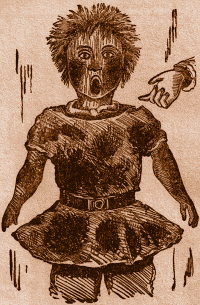
|
This is the Naughty Boy who would go making Mud Pies, and get his nice new clothes all over mud.
He said he would be Good,
|
|
Boys, stop your noise! Girls, stop your jumping and
skipping!
I won't tell you his age, nor the colour of his hair,
If he's sent on a message, such a long time he stops,
If his mother gives him lolly, cake, piece of beef or
mutton,
He's been going to school for years, I can't tell you
how long,
You can't believe a word he says, he tells so many
lies.
He won't play any game without being always cheating,
What school he goes to at present I won't tell,
|
Page 37
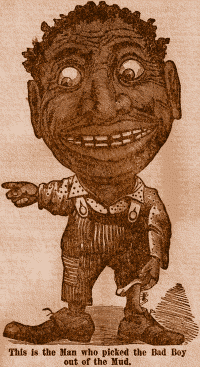
|
(The Boy That Ran Away)
There was a little Chinese Boy,
"I won't go any more to school,
So little Chinkey ran away,
He knew she could not follow him
Now, as he went along he saw
He saw so many gilded toys,
Ah! then he saw such fireworks!
He listened to the music of
But after that he began to think
And sleep was stealing over him,
Little Chinkey Chow-Chow
He was so very worn and cold,
He saw the well was very deep,
He stretched his hand to catch the fish;
Some other boys were playing there
A Great BIG Market Gardener,
The boys began to jeer at him,
One took his wooden shoes away,
When little Chinkey ran away,
He wandered past the painted shops,
Poor Chinkey Chow was very tired,
She said he was a wicked boy,
Now when I see a Chinaman,
But what I still think most about
From Calvert's Australian Toy Books
|
Page 38—Boy Land
|
"Nice child—very nice child," observed an old gentleman, crossing to the other side of the car and addressing the mother of the boy who had just hit him in the eye with a wad of paper. "How old are you, my son?" "None of your business," replied the youngster, taking aim at another passenger. "Fine boy," smiled the old man, as the parent regarded her offspring with pride. "A remarkably fine boy. What is your name, my son?" "Puddin' Tame!" shouted the youngster, with a giggle at his own wit. "I thought so," continued the old man, pleasantly. "If you had given me three guesses at it, that would have been the first one I would have struck on. Now, Puddin', you can blow those things pretty straight, can't you?" "You bet!" squealed the boy, delighted at the compliment. "See me take that old fellow over there!" "No, no!" exclaimed the old gentleman, hastily. "Try it on the old woman I was sitting with. She has boys of her own, and she won't mind." "Can't you hit the lady for the gentleman, Johnny?" asked the fond parent. Johnny cleverly landed the pellet on the end of the old woman's nose. But she did mind it, and rising in her wrath soared down on the small boy like a hawk. She put him over the line, reversed him, ran him backwards, till he didn't know which end of him was front, and finally dropped him into the lap of the scared mother, with a benediction whereof the purport was that she'd be back in a moment to skin him alive. "She didn't seem to like it, Puddin'," smiled the old gentleman, softly. "She's a perfect stranger to me; but I understand she is the matron of an Orphans' Home, and I thought she would like a little fun; but I was mistaken." And the old man smiled sweetly as he went back to his seat. He was sorry for the poor little boy, but he couldn't help it.
|
|
Of all the small boys in our town
One day he slipped away from home
His mother missed him after a while,
For there, upon the cruel ice,
He was her boy, and all the love
She called the neighbours quick to come,
At last their search was given up
They turned to leave the fatal pool,
And so it was—the mother's tears
L'Envoi
|
|
The boy not only preys on my melon-patch and fruit trees, and upon those of my neighbours, but he has an extraordinary aptitude for creating a disturbance in whatever spot he happens to be. Only last Sunday he caused such a terrible commotion in church that the services had to be suspended for several minutes until he could be removed. The interior of the edifice was painted and varnished recently, and I suppose one of the workers must have left a clot of varnish upon the back of Cooley's pew, which is directly across the aisle from mine. Cooley's boy was the only representative of the family at church upon that day, and he amused himself during the earlier portions of the service by kneeling upon the seat and communing with Dr. Jones' boy, who occupied the pew immediately in the rear. Sometimes, when young Cooley would resume a proper position, Jones's boy would stir him up afresh by slyly pulling his hair, whereupon Cooley would wheel about and menace Jones with his fist in a manner which betrayed utter indifference to the proprieties of the place and the occasion, as well as the presence of the congregation. When Cooley finally sank into a condition of repose, he placed his head, most unfortunately, directly against the lump of undried varnish, while he amused himself by reading the commandments and the other scriptural texts upon the wall behind the pulpit. In a few moments he attempted to move, but the varnish had mingled with his hair, and it held him securely. After making one or two desperate but ineffectual efforts to release himself, he became very angry; and supposing that Jones's boy was holding him, he shouted: "Leg go o' my hair! Leg go o' my hair, I tell you!" The clergyman paused just as he was entering upon consideration of "secondly," and the congregation looked around in amazement, in time to perceive young Cooley, with his head against the back of the pew, aiming dreadful blows over his shoulder with his fist at some unseen person behind him. And with every thrust he exclaimed: "I'll smash yer nose after church! I'll go for you, Bill Jones, when I ketch you alone! Leg go o' my hair, I tell you, or I'll knock the stuffin' out o' yer," etc, etc. Meanwhile, Jones's boy sat up at the very end of his pew, far away from Cooley, and looked as solemn as if the sermon had made a deep impression upon him.
Max Adeler
|
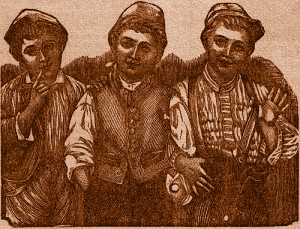
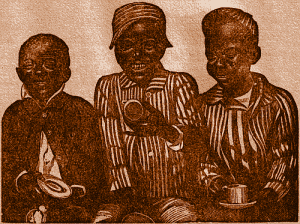
Page 39—Boy Land
|
"Do look at those pigs, as they lay in the straw,"
"I see they are feasting" his father replied,
"But when a great boy, such as you, my dear Dick,
"When plumcake and sugar forever he picks,
|
|
Never be dainty and throw food away;
So don't smell your plate and turn over your food,
There was a young boy, who so dainty became,
"I cannot eat this,"—and, "I do not like
that;"—
The consequence was that he soon became thin;
And his legs grew as slender as little hat-pegs,
And thinner, and thinner, and thinner he grew,
And when he was quite the skeleton grown,
|
|
"To-whit! To-whit! To-whee!
"Not I," said the cow. "Oh, no;
"Coo, coo! said the dove,
"Not I," said the sheep. "Oh, no.
|
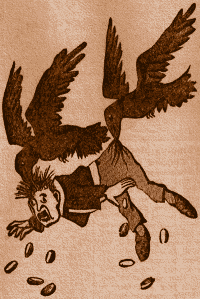
|
"Caw! Caw!" cried the crow, "I should like to know What thief took away A bird's nest to-day."
"Cluck! Cluck!" said the hen,
We all gave her a feather,
"Chirr-a-whirr! Chirr-a-whirr!
"I would not rob a bird,"
"'Tis very cruel too,"
A little boy hung down his head,
But during next week
He robbed a nest up high,
|
|
What! go to see the kittens drowned
Poor kittens! No more pretty play
Poor things! the little child that can
And many a wicked thing he'll do
|
|
What became of tyrannical Pat,
|
|
See here a naughty boy, John Thales,
|
|
Above on a chair, a little boy sat,
|
|
Charley, Charley, stole the barley
|
Page 40—Whipping Machine
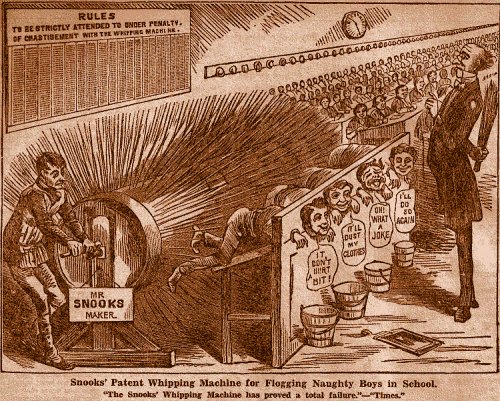
|
"The Snooks' Whipping Machine has proved a total failure."—"Times."
|
|
A year a go I took charge of a school of 1000 boys. They were a very bad lot indeed, and I could do nothing with them. Being of a mild disposition, I attempted to reason with them; but I might as well have reasoned with the pigs. I then thought of punishing them, but that was a big task, and, besides, what mode of punishment should I adopt? In my utmost perplexity I wrote to Professor Wilderspin—a great authority on the management of boys—and he wrote as follows:
"Nearly all boys can be managed by an intelligent
schoolmaster I then wrote to twenty-seven of the principal headmasters in the world, and the following are the replies:—
From the High School of Eton wrote head-master, Mr.
Squeers:
|
|
|
Page 41—Whipping Machine
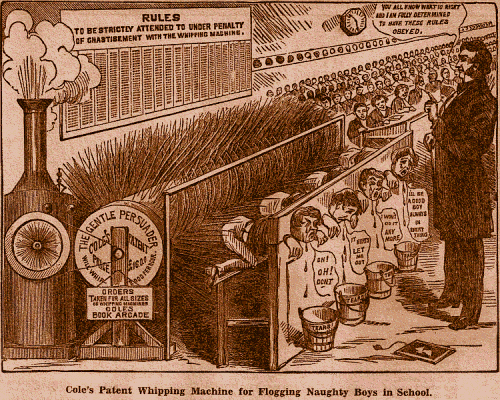
Cole's Patent Whipping Machine for Flogging Naughty Boys in School
|
(To Mr. Cole, Book Arcade, Melbourne)
SIR—Your Patent Flogger is a "keen" |
| I have not had a bad boy remaining now, but before I used your machine they used to be a frightful lot of young scamps. For instance, in my school of 1000, the first day the machine was introduced, 741 were punished for various misdeeds, and 103 for single offences, were flogged as follows:— |
|
John Hawking, for talking William Winning, for grinning George Highing, for crying Edward Daring, for swearing Henry Wheeling, for stealing Peter Bitting, for spitting Robert Hocking, for smoking Frederick Mention, for inattention Joseph Footing, for pea-shooting Luke Jones, for throwing stones Matthew Sauter, for squirting water Nicholas Storms, for upsetting forms Reuben Wrens, for spoiling pens Samuel Jinks, for spilling ink Simon McLeod, for laughing aloud Timothy Stacies, for making faces Victor Bloomers, for taking lunars Vincent James, for calling names Caleb Hales, for telling tales Daniel Padley, for writing badly David Jessons, for cribbing lessons Edmond Gate, for coming late Ezra Lopen, for leaving the door open Edwin Druent, for playing the truant Charles Case, for leaving his place Ernest Jewell, for eating during school Coo Ah Hi, for using a shanghai Francis Berindo, for breaking a window Harold Tate, for breaking his slate Isaac Joys, for making noise Jacob Crook, for tearing his book Christopher Moyes, for teasing other boys Elisha Sewell, for bolting from school Conrad Draper, for throwing chewed paper Ebenezer Good, for telling a falsehood Felix Snooks, for coming without books Cyril Froude, for speaking too loud Elijah Rowe, for speaking too low Gregory Meek, for refusing to speak Hannibal Hartz, for throwing paper darts Horace Poole, for whistling in school Hubert Shore, for slamming the door Jesse Blane, for hiding the cane Jonah Platts, for hiding boys' hats Aaron Esk, for cutting the desk Abner Rule, for sleeping in school Adam Street, for changing his seat Albert Mayne, for splitting the teacher's cane Alexander Tressons, for reading during other lessons Alfred Hoole, for eating lollies in school Ambrose Hooke, for blotting his copy-book Amos Blair, for not combing his hair Andrew Grace, for not washing his face Anthony Sands, for not washing his hands Arnold Cootz, for coming in with dirty boots Benjamin Guess, for coming with untidy dress Clarence Hyneman, for annoying a stray Chinaman Michael McToole, for bringing stones to school Cuthbert Flindow, for climbing through the window Edgar Gasking, for going without asking Eric Grout, for kicking boys' hats about Enoch McKay, for pinching the next boy Gabriel Cook, for tearing a boy's book Hyram Pope, for pulling the bell rope Humphrey Proof, for getting on the roof Jonah Earls, for chasing school-girls Jonathan Spence, for climbing over the fence Phillip Cannister, for sliding down the bannister Lambert Hesk, for sliding on a desk Lawrence Storm, for standing on a form Lazarus Beet, for stamping with his feet Leopold Bate, for swinging on the gate Lewis Lesks, for kicking legs of desks Mark Vine, for overstepping the toe-line Nathan Corder, for not marching in order Norman Hall, for scribbling on the wall James Mace, for hitting a boy in the face Thomas Sayers, for pushing boys down the stairs Oswald Hook, for losing a school-book Ralph Chesson, for not knowing his lesson Sampson Skinner, for eating another boy's dinner Solomon Brook, for scribbling in his book Stephen Platt, for chasing the master's cat Neal M'Kimney, dropping a brick down the chimney Theodore Le Soof, for throwing stones on the roof Valentine Rapp, for turning on the water-tap Walter Hope, for climbing up the bell-rope Joshua Gail, for catching flies on the wall Raymond Esk, for sticking pins in the desk Julian State, for drawing pictures on his slate Gerald Astor, for being impudent to the master Augustus Roff, for not taking his hat off Rupert Keats, for fixing pens in boys' seats Maurice Took, for having a dirty copybook Esau Klaster, for drawing caricatures of the master Paul Bhool, for letting a bird loose in school Jabez Breeding, for not knowing the place at reading Levi Stout, for stopping too long when let out Guy M'Gill, sharpening a knife on the window-sill Duncan Heather, pinning two boys' coat-tails together Ezekiel Black, pinning paper on another boy's back Patrick O'Toole, for bursting a paper-bag in school Eli Teet, for putting cobbler's wax on master's seat
|
Page 42—Dolly Land
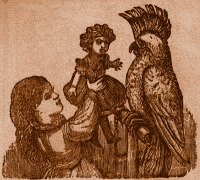
|
My Lady-doll is pretty,
|
|
O sweet, so sweet,
|
|
Shining eyes, very blue,
|
|
Oh dear! what a beautiful doll
Oh pretty new doll, it looks fine!
How kind was my sister to buy
POEMS FOR CHILDREN
|
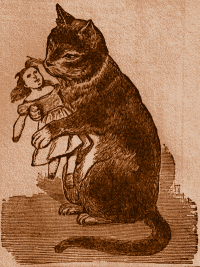
|
Now Puss had a doll
The dolly was petted,
|
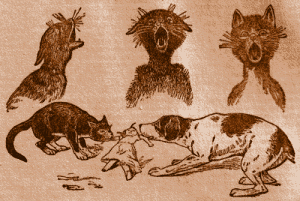
|
And once, I remember,
|
Page 43—Dolly Land
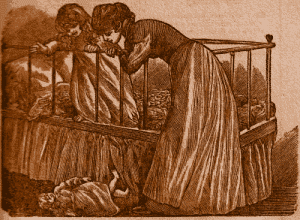
|
'Tis very well to smile—now,
I thought we played together,
"For safe upon my pillow
I felt so sad and lonely
Now, fancy! in the morning
Your pretty curls are tangled,
|
|
I love my dear dolly;
My Uncle John brought her
She has cheeks like red roses,
She cries, and says, "Mam-ma,
You know, I'm her own ma;
No teaching, no training,
|
|
Mamma, do send for Doctor Man,
I thought that she was fast asleep,
Poor dolly! she was just as brave,
But when the doctor mends her arm,
And if she only will get well,
|
|
Little Polly,
Also Polly
One day Polly
Then did Polly
Up ran collie,
|
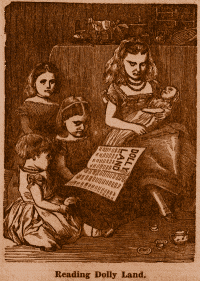
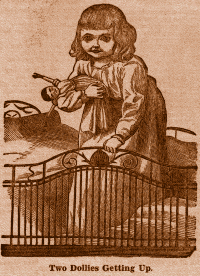
Page 44—Dolly Land
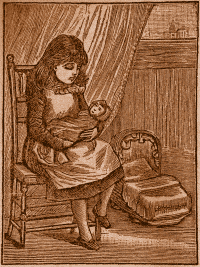
|
Lie down, little Dolly.
The bright sun went down
Mamma says the flowers
Hark! Susan is calling—
|
|
Hushy, baby, my dolly,
|
|
There, got to sleep, Dolly,
There, now it is morning
Jane Taylor
|
|
Sleep, Dolly, sleep.
Mrs Hibbert
|
|
Shut your eyes, my darling!
Don't be frightened, Dolly!
Dolly is so active,
Hush thee now, my dearest,
|
|
I must go home to dolly,
Some dolls are so old,
|
|
Tell me a story
No! not the story
Hush, Dolly darling!
Ah! there is Mary
Good night, dear mother!
If at all restless
|
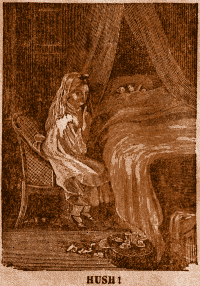
Page 45—Dolly Land
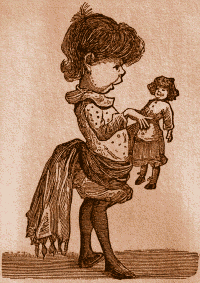
|
The sunflowers hang their heavy heads
"Twice up and down the garden-walks
"The dew will wet her through and through
"I've not been down into the woods
"I wonder where Papa has gone?
Sarah O. Jewett
|
|
Well, Dolly, what are you saying,
I wonder what you think about,
I wonder if you're ever sad,
I wonder if you love me well—
|
|
Darling Dolly's house shall be
It shall have for pictures fair
And it shall have a dome of blue
Darling Dolly's house shall be
|
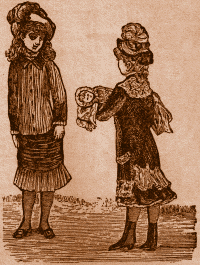
|
"Such a doll! I wouldn't have it,
Off went Nannie, proud lip curling,
|
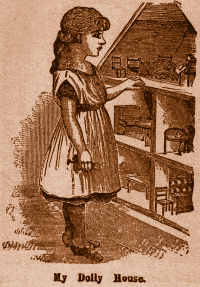
Page 46—Dolly Land
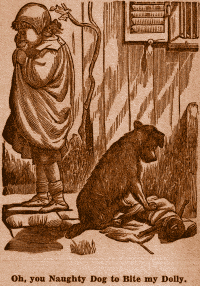
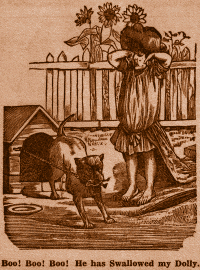
|
Ten little dollies
Nine little dollies
Eight little dollies—
Seven little dollies,
Six little dollies—
Five little dollies,
Four little dollies
Three little dollies,
Two little dollies,
One little dolly,
|
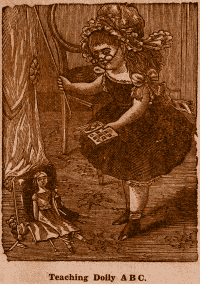
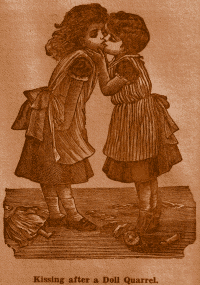
Page 47—Dolly Land
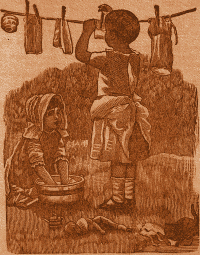
|
On Monday I wash my dollies' clothes,
On Friday I play they're taken ill,
|
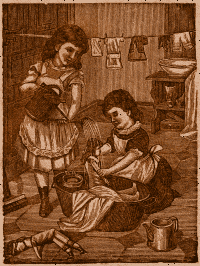
|
Naughty Miss Dolly played out in the mud,
'Tis hard to be mothers and laundresses too,
|
|
I know a little girl who tried,
To find her own small dolly-tub,
And when she found herself alone,
For, what do you think? she tumbled in,
|
|
Miss Mary standing at the tub
|
|
'Tis time Doll Rosy had a bath,
Now soft I'll rub her with a sponge,
There now—oh, my! what have I done? |
|
Come, Dolly, come quick,
A dear little teapot
And I am to use them
|
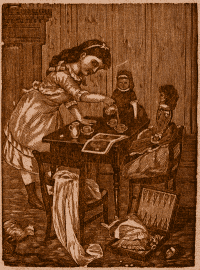
Page 48—Dolly Land
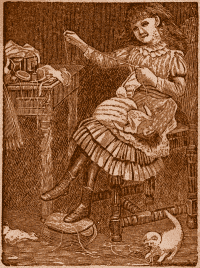
|
Making Dolly's dresses,
Oh, how many stitches!
There! the needle's broken—
Youth's Companion
|
|
Have you ever been down to Dolly Town?
There are very fine houses in Dolly Town,
But the finest sight in Dolly Town
|
|
I have a little doll,
She has pretty blue eyes,
I have a little sofa
My doll can move her arms,
How old is your dolly?
Indeed I cannot tell
E. Follen
|
|
Such a busy little mother!
Such a comfort to her mother,
There are dresses to be altered,
Says the busy little mother,
|
|
I once had a sweet little doll, dears,
But I lost my poor little doll, dears,
Folks say she is terribly changed, dears,
Charles Kingsley
|
|
Oh, Mary, see what the nurse has found,
She says she'll teach me how to make
And thin this piece with purple spots
And "when I've finished it," she says
|
|
I'm but a wooden doll,
Most people laugh at a wooden doll,
When I am dressed in fine long clothes,
Let people laugh—I know I'm wood:
|
|
Come buy my dolls, my pretty dolls:
I've waxen dolls, and china dolls,
Bald head dolls, and dolls with hair,
Laughing dolls, and crying dolls;
Go where you may, you will not find
|
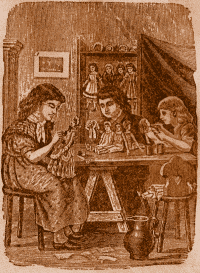
Page 49—Dolly Land
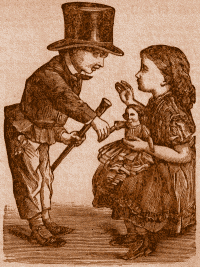
|
Run for the doctor!
In stalks a hat and cane;
He feels her pules, he
Poor mamma sober looks,
But Mary, ere the quarrel
"I'll give her pills, then,
|
|
Two little babies
Both little nurses
O what a pitiful
Over went carriages,
|
|
There once was a sweet tiny maiden,
And this poor little maid, she was crying—
This dolly had been a brave soldier,
She was only a poor tiny maiden,
And the poor, tiny, sorrowful maiden,
|
|
You needn't be trying to comfort me—
And I guess you must think I'm a baby,
My dolly! my own little daughter!
I think you must be crazy—
When my mamma gave me that ribbon—
But I know that she knew it now,
But since the darling is dead,
And papa will make a tombstone,
Margaret Vandegrift
|
|
Dolly, my darling, is dreadfully sick;
Hush! that is the doctor's tap! tap! tap!
Come, doctor, and tell me now just what you think
|
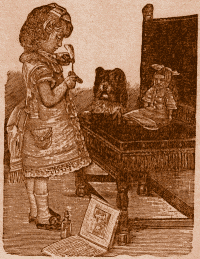
Page 50—Dolly Land
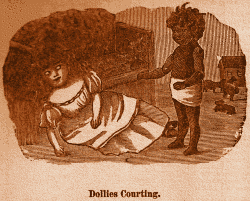
|
See, this is my Christmas dolly,
At first I thought of Marguerite—
And then I mentioned, one by one,
So the next day I got a great big book,
My brother Tom was sitting near,
"Oh! will you Brother Tom?" I cried,
So then, he took her in his arms
And there, before I knew it,
E.C. and J.T. Rook
|
|
Three little girls brought each a doll,
|
|
Whenever I'm tired of reading,
But she will not look nor listen,
For some day some one will buy her,
|
|
My dolly dear,
My dolly dear,
My pretty Poll
You have an eye,
You never eat,
|
|
Your hair is so pretty,
For you can't see the flowers
You've no kind of papa
|
|
My Dolly, Polly Angelina Brown,
My Dolly, Polly, is a precious little pet;
My little brother Charley,
My Dolly's always smiling;
|
|
Come along; come along;
Charley has got his night-gown on.
Sambo has got an old white hat,
Sambo has got a woolly pate,
|
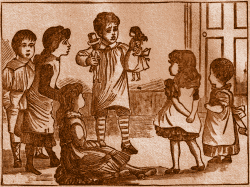
Page 51—Dolly Land
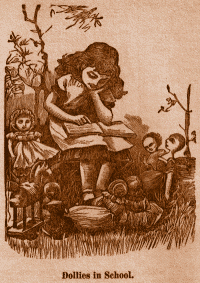
|
I found my old dolls
There was poor little Flossie,
And then, as I raised her,
And next I uncovered
And I kissed her, her face
I kissed her, and laid her
Now, that poor little doll
From losing her sawdust
One big doll was missing,—
Well, well, I am older,
Bertha Gerneaux Davis
|
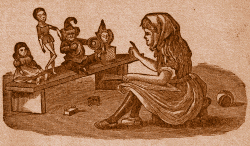
|
This little girl, I'm glad to say,
One doll is large, and one is small,
|
|
With grandma's cap upon her head,
"My dear grandchild, although I am
"Dear Grandmamma, I thank you much,
|
|
Five little dolls
Five little dolls
I don't think grown
I have to cook
|
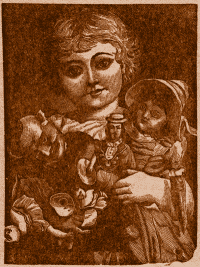
Page 52—Dolly Land
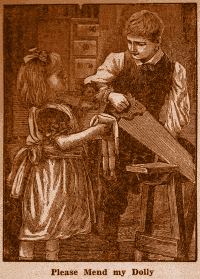
|
I can't help crying! Oh dear! |
The Doll Show (For seven little girls—six with dolls. The seventh to be the judge.) First girl enters, with doll in her arms.
We're going to have a dolly show,
And then we'll have such lots of fun,
My dolly is all ready, Places her doll on a bench or chair, and takes a seat. Second Girl
Oh, such a time as I have had,
But here she is, my infant doll, Places doll next to doll No. 1 and takes a seat. Third Girl—Carrying a handsome French Doll.
My dolly came from Sunny France,
Her feet and hands are very small,
This handsome dress from Paris came, Places her doll by doll No. 2, and takes a seat. Fourth Girl
I hope they've saved a little space
He wears a suit of navy blue— Places it by doll No. 3, and sits down. Fifth Girl—a very small girl holding by the arm a large rag baby with a long dress.
My mamma's writing letters,
She isn't very pretty,
I love my Dolly, 'cause she's good— Places her doll by doll No. 4, and takes a seat. Sixth Girl
They mustn't crowd my baby out,
She's very neat, and nice, and clean,
She's a very handsome lady, Places her doll by doll No. 5, and sits down. First Girl—to the girls
Do not open your mouths, Seventh Girl—Enters carrying a wand. She views each doll in turn with critical eyes, then pointing to the first doll, says—
Number one is very pretty, Points to No. 2
And this cunning little baby, No. 3
Number three—a fine French lady, Points to No. 4
And Master Jack, I like your looks, No. 5
And this old-fashioned baby doll, No. 6
No, no, Miss Dinah, no prize for you, Then turning to the little girls, she continues:
And now, dear anxious mothers,
If you'll call another meeting
So, mothers, now I give these babies Hands each doll to it's owner. Exit all.
|
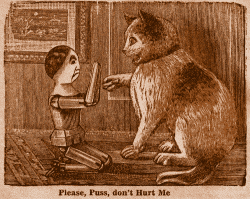
Page 53—Dolly Land
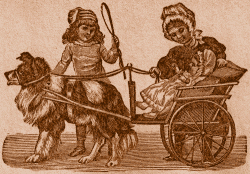
|
All round the world and back again
To Greenland first we sailed away
So off we tripp'd to Canada,
We ran away to Montana,
Then down to California,
The Sandwich Isles we visited,
We crossed the Equatorial Seas,
New Zealand's shores we landed at,
Oh, when we reach Australia—
To buy some tea-pots and some trays,
We took a trip to Chinese land
Then travelling to Hindustan,
And found ourselves in the Khyber Pass,
Across the Red Sea next we sail'd
Across the Desert we rode apace,
An Arab kindly rescued her—
At last we left the Desert drear,
We saw no end of wonders now
Our steamer on the Congo sank—
We said good-bye to Africa,
Thence favouring gales conveyed us far
And now we're safe at home again,
Sabina
|
|
I stood in the semi-darkness
Her dolly demanded attention,
All this with a motherly yearning
The dear little creature had finished
A boy, almost reaching to manhood,
There was one wild scream from the maiden,
But soon, when the screaming was louder
"I wouldn't be such a cry-baby," he said,
"Why don't you get one made of china,
"Oh, my dolly, my dolly is broken,"
"I don't care if it was only plaster;
Ten years from that very evening,
'Twas the old scene of the dolly repeated,
Ah me! how the world is repeated,
Watson
|
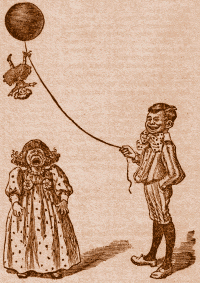
Page 54—Dolly Land
|
Dolly knows what's the matter—
I know well enough that he dropped
Course, I like grandpa's house;
But oh! there's a difference, Dolly,
Nurse says "It's a sweet, lovely morning."
And mother—let's see! she's standing
And up from the pine woods yonder
Did you hear any noise, Dolly!
But if that is you, mother—
|
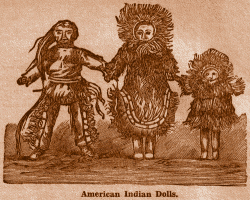
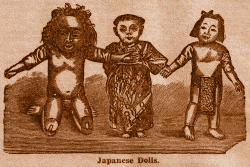
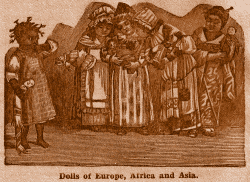
Page 55—A Lady Making Dolls
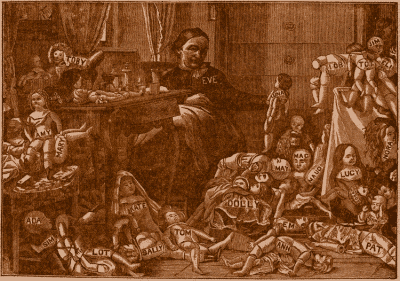
|
|
|
Adam and Madam,
Ruth and Truth,
Abihu and Elihu,
Hubert and Rupert,
Mose and Rose,
Bridget and Midget,
Abisha and Elisha,
Prichard and Richard,
Nicodemus and Polyphemous,
Coralius and Doralius,
Brunius an Junius,
Lubylene and Rubylene,
Ira and Myra,
Barret and Garret,
Josiah and Sophia,
Florence and Laurence,
Lucretia and Venetia,
Dorna and Lorna,
Angelena and Vangelena,
Tunice and Unice,
|
Page 56—Name Land
| The Reading over of these 1000 Names, all different, will give splendid Exercise in Spelling and Pronunciation. |
|
Gomer and Homer, Selah and Telah, Rasman and Tasman, Barak and Sarak, Janet and Nanet, Heavenbella and Sevenbella, Ahaz and Azaz, Antimeg and Antineg, Are all good names for dolls.
Allon and Fallon,
Bedrodach and Nedrodach,
Dovetta and Lovetta,
Coralene and Doralene,
Ben and Glen,
Alfric and Salfric,
Abia, Beriah and Neriah,
Cora, Dora and Flora,
Ivy, Livy and Zivy,
Bruno, Juno and Uno,
Biram, Hiram and Piram,
Larissa, Narissa and Varrissa,
Muric, Uric and Zurich,
Anneline, Fannylene & Nannylene,
Bennet, Jennet and Kennet,
Darion, Marion and Sarion,
Lavinia, Savinia and Vavinia,
Randal, Sandal and Vandal,
Emmeline, Femmeline and Jemmeline,
Lerman, Merman and Zerman,
Boy, Foy, Joy and Moy,
Celia, Delia, Melia and Zelia,
Clara, Lara, Sara and Zara,
Acelius, Adelius, Afelius and Amelius,
Bon, Con, Don and John,
Hatty, Katty, Matty, Natty and Patty,
Dina, Mina, Nina, Vina and Zina,
E. W. Cole
|
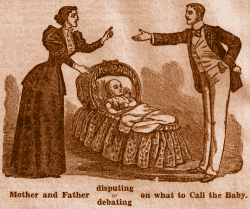
Page 57—Name Land
Three Hundred more Names for Dollies, Doggies, Pussies, and Babies.
|
Abigail and Abihail, Allamlech & Anammelech, Azariah and Hezekiah, Boyetta and Joyetta, Hosea and Josea, Baxter and Dexter, Deleus and Peleus, Borcas and Dorcas, Are all good names for dolls.
Dickylene and Mickylene,
Ducylene and Lucylene,
Elizalene and Erizalene,
Bennyetta and Jennyetta,
Selina and Serena,
Biddylene and Liddylene,
Cornelia and Cordelia,
|
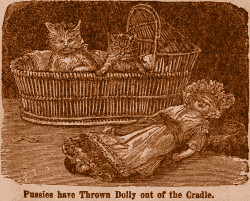
|
Southetta and Louthetta, Melbalena and Selbalena, Lidneylena & Sydneylena, Adelena and Madelena, Mirthelena and Perthalena, Brisbanetta and Lisbonetta, Rasmanetta & Tasmanetta, Lowrylena and Maorilena, Are all good names for dolls.
Dollybel, Mollybel and Pollybel,
Dollyus, Mollyus and Pollyus,
Belus, Helus, Nelus and Zelus,
|
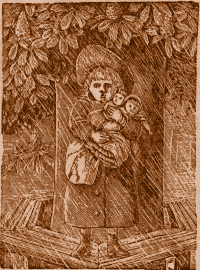
|
Abeletta, Mabeletta & Nabeletta, Lilyetta, Millyetta and Tillyetta, Bonalene, Jonahlene & Monalene, Deolene, Neolene and Leolene, Jimmylene, Simmylene, Timmylene, Ino, Dino, Kino and Mino, Dana, Hana, Jana and Nana, Are all good names for dolls.
Annetta, Fanetta and Nanetta,
Dollian, Mollian and Pollian,
E.W.C.
|
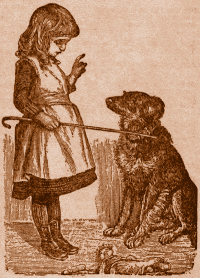
|
P.S. Nebuchadnezzar and Nebuchadrezzar, Wandiligong & Croajingoalong, Are four good names for pussies.
|
Page 58—Temper Land
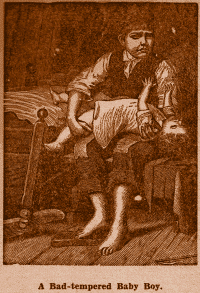
|
Love, come and sit upon my knee,
For this I'm sure, that I love you,
And then at night I lie awake,
An when you're good and do not cry,
But if my little child should grow
And when you saw me pale and thin,
|
|
Two naughty little people
And so upon each other
But oh! their angry hearts grew weary,
Each waited, oh! how sadly!
Then Nellie held her dolly
Then Annie quickly followed
|
|
Whimpy, little Whimpy,
|
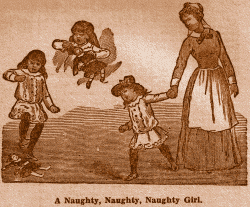
|
Cross Patch, cross Patch,
Milk upset and wasted!
You began the morning
And by your pettish temper,
|
|
Why is Sarah standing there,
Come here my dear and tell me true,
Why then, indeed, I'm grieved to see,
Oh! how much better 'twould appear,
Jane Taylor
|
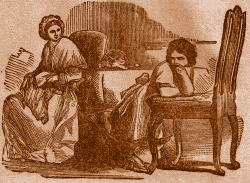
Page 59—Temper Land
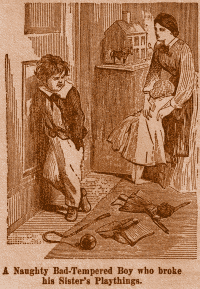
|
A charming present comes from town,
A gift to Emma and to Rose,
They eagerly examin'd all—
At night, their little candles lit,
Thus Rose and Emma pass'd each hour
Till Rose in baby-house would change
"No, no indeed," her sister said,
The quarrel grew to such a height,
"O fie, my Emma! naughty Rose!
Now Betty calls the little girls
But just prepar'd to leave their room,
Mamma appear'd at Betty's call—
"But though I stay, my Emma, you
"Beside my sister's bed I'll sit,
"How silly now seems our dispute,
Adelaide Taylor
|
|
Let dogs delight to bark and bite,
Dr Watts
|
|
Poison-drops of care and sorrow,
Angry words, oh! let them never
Love is much too pure and holy,
Angry words are lightly spoken,
|
|
A little tear and a little smile
The little tear he got the start
But somehow, it was very queer,
|
|
Silly little Mary,
Silly little Mary
Silly little Mary,
Silly little Mary
Mary hears a footstep
I have found you, Mary.
Ah! but love has conquered
Where are sulks and tears now?
|
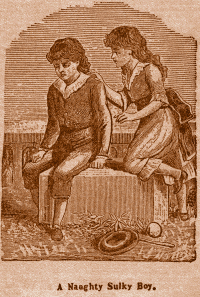
Page 60—Naughtiness Land
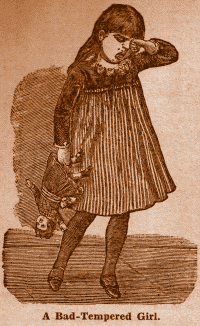
|
Oh! anger is an evil thing
One angry moment often does
It speaks the rude and cruel word
We dread the dog that turns in play,
But how much more we find to blame,
The hand of peace is frank and warm
Shame to the lips that ever seek
Ever remember in thy youth,
Eliza Cook
|
|
Go, go, my naughty girl, and kiss
What! little children scold and fight,
I can't imagine, for my part,
See, see the little tears that run
Go, Mary, wipe her tears away
|
|
"Whatever brawls disturb the street
Dr. Watts
|
|
Little Dick Snappy
His mother once brought him
Little Edward began,
"What's the matter, dear Dick?
"No! I don't like my new toy,"
"Oh no! brother, no—
Then quarrelsome Dick
Then, bursting with spite,
"The string is untied,
"I'm really ashamed,"
|
|
If fretting pays you, fret;
But if it does not pay
|
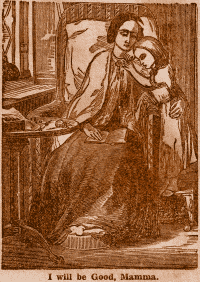
Page 61—Naughtiness Land
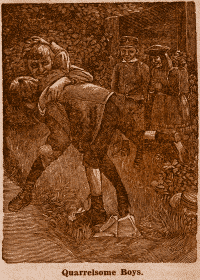
|
Oh, Govern your temper!
Never say it is nature.
Oh, govern your temper!
Never think it is nature—
|
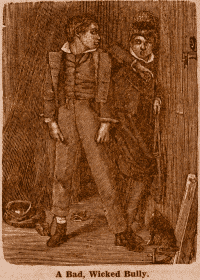
|
I knew a man, and his name was Horner,
He grumbled so much at his wife, that she
One day, as I loitered along the street,
I met him next day, and I met him again,
He laughed a laugh that was good to hear,
And every day, as I move along
|
|
Bad temper, go,
For I will always be kind, and mild,
Temper bad
|
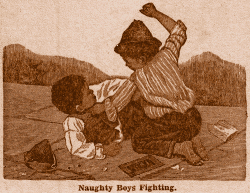
Page 62—Pride Land
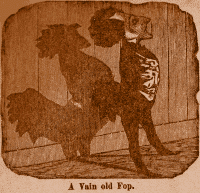
|
Did ever you see such wondrous airs!
Pray, what's the price of your hat my dear?
You're all too fine for us, you know,
So go your way, my Lady Jane,
|
Why is my silly girl so vain,
Is your merry eye so blue
Is your bosom half so fair
When your cheek the brightest glows,
Little flowers that open gay,
|
|
"Oh, dear Mamma, that little girl
Her face is dirty and her frock,
She's playing in the kennel dirt
I go to church, and sit so still,
I read my bible, learn my hymns,
"Ah! hush that boasting tone, my love,
|
|
Hark the rustle of a dress
J. R. Lowell
|
|
Oh! Fanny was so vain a lass,
She'd stand and prink, and fix her hair
Her mother's bonnet she'd put on,
She always liked to wear the best
Each day she grew so fond of dress
If asked to turn the jumping-rope
She didn't dare to take the cat
The very things that gave her joy,
The foolish girl turned up her nose
She never was the least inclined
As this was so, you'll see at once
|
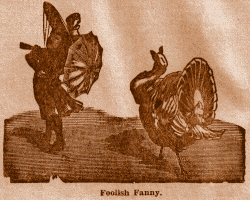
Page 63—Pride Land
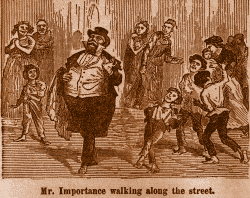
|
Come, come, Mr. Peacock,
Let me tell you, gay bird,
The nightingale certainly
The hawk cannot boast
The dove may be clad
So, you see, Mr. Peacock,
|
|
How proud we are, how fond to shew
The tulip and butterfly
Dr. Watts
|
|
In a frock richly trimm'd
"Ah! how they will all
But, alas! they were all
'Twas Lucy, tho' only
'Tis better to have
T I
|
|
A little cane,
A pointed shoe,
A gorgeous necktie
Arms at right angles,
A languid drawl,
A vacant stare,
|
|
Hark the rustle of a dress
J. R. Lowell
|
|
It surely is not good to see,
She thinks herself a charming girl;
|
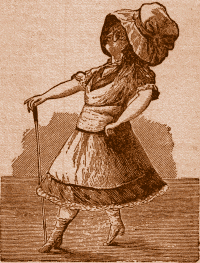
Page 64—Naughtiness Land
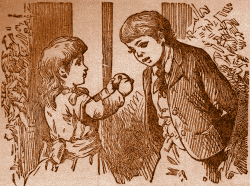
|
Mamma gave our Nelly an apple,
Beside her young Neddie was standing—
Dear Nelly held out the big apple;
And oh! what a bite he gave it!
Poor Nelly looked frightened a moment,
Eva L. Carson, In "St. Nicholas"
|
|
Once, when I was a little boy,
They said I was a naughty boy,
For we are often thankless for
|
|
"Oh! I am so hungry,
"But at home, when mamma
And now a large slice
Her mouth and her tongue
And thus, by not minding
C. Horwood.
|
|
Little Tommy, and Peter, and Archie, and Bob
Said Tommy: "I'll have it." Said peter: "'Tis mine."
"No, no!" shouted Tommy, "I'll have it myself."
Then Tommy he snatched it, and Peter he fought,
Away from the quarrelsome urchins it flew
A lazy old brindle was nipping the grass,
She gave but a bite and a swallow or two—
Sydney Dyer
|
|
"I think I want some pies this morning"
And there he cast his greedy eyes
At last the point was thus decided:
Now Richard never could be pleas'd
"I shan't take any more," said Dick,
Then slowly rising from his seat,
Jane Taylor
|
Page 65—Greediness Land
|
"Oh! I've got a plum cake,
Thus said little George,
But, woeful to tell,
As he grew worse and worse,
And while on his bed
|
|
"Oh! I've got a plum cake,
Thus said little Jack,
With masterly strength
And when it was done,
In his task and his book,
Ann Taylor
|
|
'Twas the voice of the glutton,
|
|
The voice of the glutton
"How sweet is the picking
Oh! let me not be,
Not always a-craving
J. Taylor
|
|
Selfish Edith, not to give
Hear Bessie ask in plaintive tone,
With toys unshared so selfishly;
|
|
Oh! Henry eats like any pig;
She says: "Your sister, little dear,
It's all in vain. He does not care;
Upon the floor, crumbs thickly lie,
He looks, bedaubed with smear and stain,
|
|
Look at the selfish man! see how he locks
|
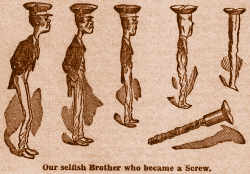
Page 66—Lying Land
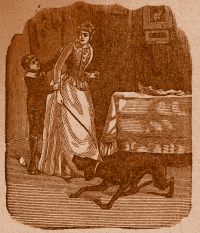
|
Bad Boy having broken a Vase told his Mother that the Dog did it, but
when his Mother was going to beat the poor Innocent Dog he felt sorry,
and told the truth.
|
|
Nellie and Dottie
Don't take your toys there,
The garden is lovely,
Into the drawing-room
Down goes the tall vase,
Cries Nell with her hands raised,
Dot answers, through big tears,
Mamma always says,
So I'll go up and tell her
"That's right!" cries her mother,
Than my children should once break
The vase can be mended,
However much grieved for
|
|
O! 'tis a lovely thing for youth
But liars we can never trust,
|
|
Why should you fear the truth to tell?
So long as you your crime conceal,
|
|
Little Mary one day most loudly did call,
Her mother was busy at work the next day,
That night little Mary, when long gone to bed,
Yet still the child scream'd—now the house fill'd
with smoke.
Adelaide Taylor
|
|
And has my darling told a lie?
He made you eyes and can discern
You thought, because you were alone,
I wish, my dear, you'd always try
Why should you fear to tell me true?
But cheerful, innocent, and gay,
Ann Taylor
|
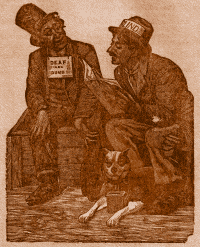
|
The Blind Man reading to the Deaf and Dumb Man after business hours,
and their wicked Dog looking out.
|
Page 67—Laziness Land
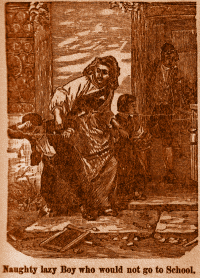
|
Oh, Mary, this will never do!
On no, your work has been forgotten,
See, here are stitches straggling wide,
The little girl who will not sew
|
|
A lazy, lazy, lazy girl!
Lounging here and dawdling there,
But happiest when in sunny weather
Is apt to say, when tired out
|
|
To Jane her aunt a work-bag gave,
And then 'twas furnished quite complete
A little silver thimble, too,
But Jane was very fond of play,
But if at any time she did,
The pretty little bag, indeed,
Her aunt, by chance, came in that day,
The silk, to make her little dress,
With gauze and lace the floor was strewed,
She little thought her aunt to find,
"Well, Jane, and where's your doll, my dear?
So spoke her aunt, and, looking round
"Since," said her aunt, "no work, you do,
But now, with self-conviction, Jane
|
|
When Harry and Dick
Harry thank'd his papa,
There was always some bed
The tulip, the rose,
A neat row of peas
But Richard loved better
Rank weeds and tall nettles
Thus Richard the idle,
Ann Taylor.
|
|
I asked a lad what he was doing;
I asked a lad what he was thinking;
There's nothing great, there's nothing wise,
A thousand naughts are not a feather,
And yet of merit they will boast,
|
Page 68—Laziness Land
|
There was a lazy boy named Sam,
If asked to do a simple task
If on an errand forced to go,
If he was caught out in a storm
This lazy boy would lounge about
Oh, Sam was always late at meals,
In every way, and every day
And so he went from bad to worse—
Men shuddered as they passed him by,
|
|
Abject, stooping, old, and wan,
Then nought too good for him to wear,
See the boy advance in age,
Lamb
|
|
A good for nothing lazy lout,
|
|
I see an old man sitting there,
Old man, why are you sitting so?
Ah, master, in the world so wide,
When I, like you, was young and gay,
And so, instead of being taught
An now that I am old and grey,
But oft I shake my hoary head,
J. T.
|
|
Three travellers wandered along the strand,
"They've left off eating and drinking there;
"Nobody's in a hurry there;
"No bells are rung in the morning there,
"They do not take any papers there;
"No lovers are ever permitted there;
"Electricity has not been heard of there;
"Oh, this world is a truly crazy land;
|
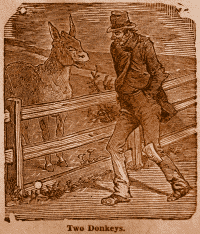
Page 69—Laziness Land
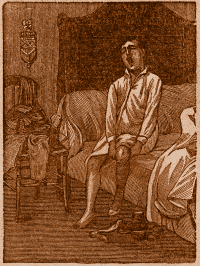
|
Oh! Willie is a lazy boy,
The birds are singing in the trees,
Oh! lazy boys will never grow
|
|
The lazy boy! and what's his name?
He'd rather swing upon a gate,
There, see! he's lounging down the street,
He's lolling now against a post;
Don't ask me what's the urchin's name;
|
|
'Tis the voice of the sluggard;
"A little more sleep
I pass'd by his garden,
I made him a visit,
Said I then to my heart,
Watts
|
|
John Brown is a man
His eldest boy, Dicky,
To see such old shoes
"I've here twenty shillings,
For here lived a chattering
The laughed, for it was
Now what was Dick's wonder
Adelaide Taylor
|
|
How doth the little busy bee
How skilfully she builds her cell;
In works of labour or of skill
In books, or work, or healthful play
Watts
|
|
Dick Dawdle had land
The raps at his door,
He leased to a farmer
Before half the term
"Ten years I've been blest
"Why how," exclaimed Dick,
"I hope you'll excuse me,"
"Well, and what does that mean,
R. S. Sharpe
|
Page 70—Cruelty Land
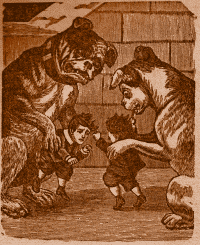
| The Tables turned—Instead of the Bad Boys setting the poor Dogs fighting, the bad Dogs are setting the poor Boys fighting. |
|
Tom sat at the kitchen window
Yes, there he sat in the twilight,
He knew not that his father
But he waited till after dinner,
So catching his son of a sudden,
And did he not roll on the carpet?
"Why, Tom, all this is quite jolly,
"It seems very strange," said his father,
"Hush! hush! while I pull your right leg off,
"Now, Tommy, my boy," said his father,
But hark! from the woodlands the sound of a gun,
Or you, Mr. Butcher, and Fisherman, you
If men would but think of the torture they give
|
|
Turn, turn thy hasty foot aside,
The common Lord of all that move,
The sun, the moon, the stars He made
Let them enjoy their little day,
Gisborne
|
|
Here is cruel Frederick, see!
He kill'd the birds, and broke the chairs,
The trough was full, and faithful Tray
At this, good Tray grew very red,
So Frederick had to go to bed,
|
|
Boys, don't throw stones!
Boys, don't throw stones!
Boys, don't throw stones!
Boys, don't throw stones!
Boys, don't throw stones!
|
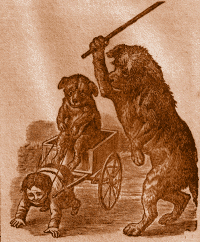
| Instead of the Bad Boys Beating the Poor Dog, the Bad Dogs are beating the poor Boy. |
Page 71—Stealing Land
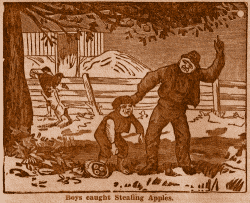
|
"No one will see me,"
"No one will see me,"
There stood in the cupboard,
"Now no one will see me,"
John paused and put back
"And no one will see me,"
Well done, John;
And never forget that,
|
|
A youngster at school,
He was very much shocked,
"You speak very fine,
They spoke, and Tom pondered—
"If this matter depended
His scruples this silenced,
Cowper
|
|
Who steals a pin
When ask'd to go
You must not sin
|
|
In Aesop, we are told, a boy,
He told his mother of the theft,
She praised him for the cunning feat,
But all the time he slyly stole—
The day on which he had to swing
The sheriff gave him leave to tell
He answered, "Call me not your dear."
You add this violence to one
If my mother had only tried
Instead of punishing the feat
I tell you here, both foe and friend,
|
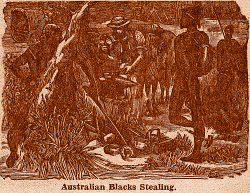
Page 72—Stealing Land
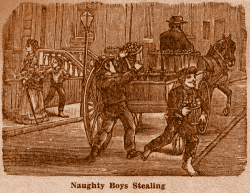
|
As Billy and Tommy
"O brother, look! see
Said Billy to Tommy,
"You are a good boy,
They came to a house,
Bob smil'd, and he laughed,
"Come walk in our garden,
But when in the garden,
"That large ring of iron,
"The warning without,
Cried Tommy, I'll mind
Adelaide
|
|
With honest heart go on your way,
Holte
|
|
On the goods that are not thine,
Pilfer not the smallest thing;
Taste not the forbidden fruit,
Upright heart and honest name
Poor and needy though thou art,
|
|
Why should I deprive my neighbour
'Tis a foolish self-deceiving
Oft we see the young beginner
Theft will not be always hidden,
Guard my heart, O God of heaven,
Watts
|
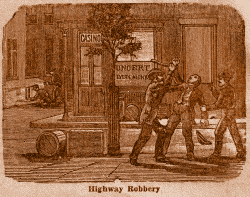
Page 73—Stealing Land
|
The girls were helping in the house,
"Here, Willie, to the grocer's run;
The grocer weigh'd them in his scales,
Young Willie watched, with greedy eyes,
There was a little voice that said,
And what a trifling thing it seem'd,
And as he lay awake that night,
A guilty person cannot rest,
"We have not any turnips, John,
"It is not far—you'll soon be back—
'Tis not the words that parents say,
Now, Willie laid him down in bed,
On Christmas-day they had the pies.
He, step by step, had further gone
His parents did not punish him;
And Willie he was proved a thief,
It was too late! The prison door,
He saw the little, lonely cells
And "Oh!" he said, "my brothers now
And Willie went to sleep that night
And in the court he sees a crowd,
And he beheld that wretched man,
And still the bell went tolling on;
Oh! parents watch your little ones,
Sewell
|
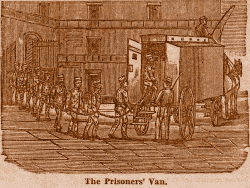
Page 74—Santa Claus Land
|
I have given no Fairy Tales in this Childland. For in this
matter-of-fact age belief in Fairy Tales and all kinds of
wonderful
fictions is fast vanishing. Santa Claus, the "bestest" "goodest"
fairy of all alone remains: and even he is gradually being doubted by
all but the most innocent children, but as he as a personality is
still largely amongst us, I give his popular history culled from many
sources.
|
|
At the top of the earth, which they call the North
Pole,
All wrapped up in furs from his head to his toes,
His cheeks are like roses; his eyes are as bright
He never is idle except when asleep,
On top of his tower with spy-glass in hand,
He peeps into houses whose doors are tight shut;
He knows where the good children live beyond doubt,
For good little children, the gentle and kind,
His work-shop is, oh! such a wonderful place,
There are horses that gallop, and dollies that walk,
There are games for all seasons, the base-ball and
kite,
There are farm-yards in plenty, with fences and trees,
There are gay Noah's Arks, just as full as can be
There are elephants stretching their noses quite long;
Is Santa Claus happy? There's no need to ask,
He's a jolly good fellow, but ever so shy,
When Christmas Eve comes, into bed you must creep,
The baby's wee stockings you must not forget,
There is Tommy, who tended the baby with care,
For dear little Mary, a doll there will be;
Oh, a jolly good sight is this funny old chap
While his deer from the mountains all harnessed with
care,
For old Santa is bundled so close to the chin,
He cracks his long whip, and he whistles a tune,
His steeds speed away on a journey so fleet,
His sleigh is with toys and trinkets well packed,
An army he gives to the boy who is neat,
And if you would please him—dear Bertie and
Jack—;
At Christmas old Santa Claus toils like a Turk,
Then down through the chimneys he'll dart without
noise
And if Frank behaves well, and minds what is said,
On Santa Claus hurries, and works with a will,
Though round as a dumpling, and ever so fat,
I told you his home was up North by the Pole,
When Christmas is over old Santa Claus goes
And there he will labor from morning till night,
He comes like an angel of light from above,
Then let us be glad, so that Christmas may be
|
Page 75—Santa Claus Land
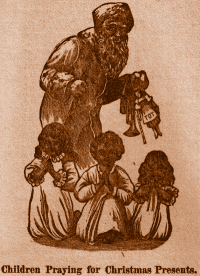
|
'Twas the night before Christmas, when all through the
house
The children were nestled all snug in there beds,
Away to the window I flew like a flash,
When what to my wondering eyes should appear
More rapid than eagles his coursers they came,
As dry leaves that before the wild hurricane fly,
As I drew in my head and was turning around,
He was chubby and plump—a right jolly old
elf—
He spoke not a word, but went straight to his work,
He sprang to his sleigh, to his team gave a whistle,
Clement C. Moore
|
|
Lovely little girls and boys,
Dollies' houses painted red,
Cups and Saucers, Pots and Pans,
Clockwork Mice, and Coloured Marbles
Cows and horses, Chickens, Cats,
Books and coloured pictures, too,
|
|
Dear little Mary,
He has brought me a cup,
The best of all
And when you've wound
And Fido barks
|
|
Dainty little stockings
Curly-pated sleepers
Funny little stockings
Skates, and balls, and trumpets,
Little sleepers waking:
The Nursery
|
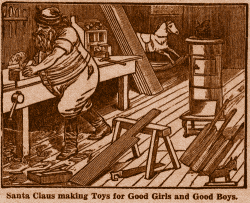
Page 76—Santa Claus Land
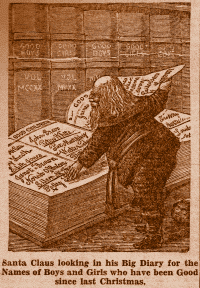
|
When the children have been good,
|
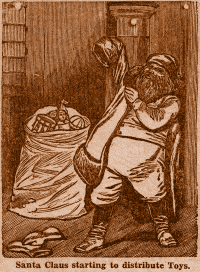
|
Once on a time, in a queer little town,
Alone, the night before Christmas,
Suddenly one of these sparks began
Quick as a flash, it changed to a face,
"Oh! follow me, follow me!" soft he cried,—
"Now tell me, I beg you, dear Santa Claus,
"From my crystal palace, far in the North,
Then seating himself in his reindeer sledge,
But first, such comical presents he left
Away we hurried far to the South,
Soldiers that marched at the word of command,
Crossing the Channel, we made a short call
Straight to America, where by myself,
Many a stocking he filled to the brim,
Caught us and bore us away to the South,
"Christmas is coming!" he whispered to me,
Like a flash he was gone, and I was alone,—
M. M.
|
|
I had told him, Christmas morning,
"But we'll be good, won't we, moder?"
But the kitten, there before me,
Then how Bennie's blue eyes kindled;
"Come back Harney," called he loudly,
Then, as by some sudden impulse,
"I'll be a good girl, Bennie,"
In my dim, fire-lighted chamber
He is sleeping: brown and silken
Annie C. Ketchum
|
Page 77—Santa Claus Land
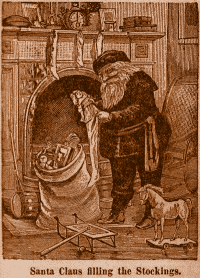
|
Old Santa Claus sat alone in his den,
His queer little cap was tumbled and torn,
He had been busy as busy can be,
There were dolls for the girls, and whips for the
boys,
Of candy too, both twisted and striped,
"I am almost ready," quoth he, quoth he,
So he clapped his specs on his little round nose,
He told them stories all pretty and new,
And Christmas Eve, when all were in bed,
|
|
One Christmas Eve, when Santa Claus
"A merry Christmas, little friend,"
If I should stay awake to night,
And then he filled the stockings up,
"Now, they won't hold another thing,"
"It's not nice to contradict—
"Oh, ho!" laughed Santa, "silly mouse!
And then he took the stocking down
The mousie chuckled to himself,
"Now, if you please, good Santa Claus,
How Santa Claus did laugh and laugh;
|
|
"Our Santa Claus," cried Bettie,
"It was—oh, you can't guess it—
"I'd rather have my baby brother
|
|
Curly heads, so softly pillowed;
Clasping treasures newly garnered,
Christmas-trees of gorgeous beauty,
Angel forms, with smiling faces,
Angel voices, softly thrilling,
Who from dreams like these would waken
|
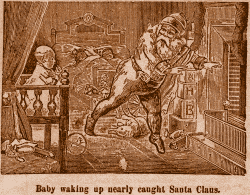
Page 78—Santa Claus Land
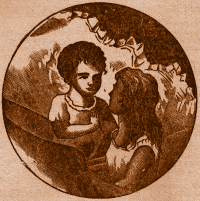
|
'Twas the eve before Christmas; good night had been
said,
For to-night their stern father's command had been
given,
He had told them he thought this delusion a sin;
And this was the reason that two little heads
When Willie's sad face from the blanket did peep,
"For somehow it makes me so sorry because
"But then, I've been thinking, that she used to
pray,—
"Well, why tannot we p'ay, dust as mamma did, den,
And four little knees on the soft carpet pressed,
"You must wait just as still till I say the 'Amen,'
"I want a wax dolly, a tea-set and a ring,
"Don't let hem get fretful and angry again,
"I want he sood div' me a nice little sled,
Their prayers being ended, they raised up their heads,
Eight, nine, and the little French clock had struck
ten
"I was harsh with my darlings," he mentally said,
"But of course they've forgotten their troubles ere
this,
So saying, he softly ascended the stairs,
"Strange, strange! I'd forgotten," he said with a
sigh,
Then he turned to the stairs, and softly went down,
Nor stopped he until he had bought everything,
Then homeward he turned, when his holiday load,
A work-box, well-filled, in the centre was laid,
There were balls, dogs, horses; books pleasing to see;
Now, as the fond father the picture surveyed,
"I've enjoyed more true pleasure than ever before;
So thinking, he gently extinguished the light,
Four little blue eyes out of sleep opened wide,
And they laughed and they cried in their innocent
glee,
"And now," added Annie, in a voice soft and low,
And told, in soft whispers, how Annie had said
"Den we dot up and p'ayed just as well as we tood,
("Well, well, let them think so, dear little elf!
Blind father! who caused your stern heart to relent,
Mrs. Sophia P. Snow
|
Page 79—Santa Claus Land
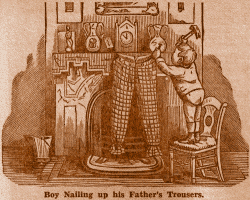
|
It was Christmas-time, as all the world knew;
Budd B. was sent quite early to bed,
Now, good, honest Hans, who worked at the house,
Now, Hans loved "the poy," and petted him too,
This night Hans had promised to wake Budd at four;
On his hands and his knees he crept softly in,
He moved very slowly, and felt near the bed;
"Vat is dat?" he cried out; "von robber I find,
But Hans did not pause—his temper was hot—
"I wanted your stocking," muttered Budd B.;
He was wrapped up with care and taken to bed,
Next morning, when Christmas songs filled all the air,
What was worse, his own stocking hung limp on a chair,
"My pack is elastic when children are kind,
|
|
Again the Christmas holidays have come,
Old Santa Claus comes by at dead of night,
One Christmas-eve the moon shone clear and bright;
|
|
They put me in a square bed, and there they bade me
sleep;
I counted softly, to myself, to ten and ten times ten,
When suddenly the room grew light. I heard a soft, strong
bound,
"Ho! Merry Christmas!" cried a voice; I felt the bed
a-rocking;
St. Nicholas
|
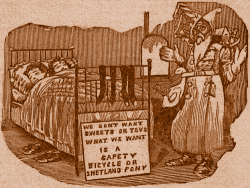
Page 80—Santa Claus Land
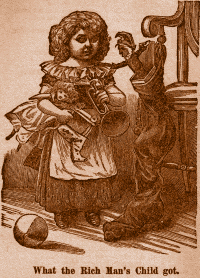
|
Santa Claus is coming to-night, papa;
"Mamma, do find something fresh and quite new,
"Now all go to bed as quick as you please,
Soon came a quick step on the piazza floor,
All covered o'er with little bells tinkling,
Not a word did he say—tired of waiting,
"His furry old hand, twisting and trembling,
Lots of presents quickly bestowing,
Brave little lady! all are now saying,
Yes! she believes it, ever so truly,
Mrs. C. E. Wilbur
|
|
'Tis Christmas day,
She looks around,
So, heaving sighs,
But sleep has fled
Until the light
Then out of bed,
For oh, what joys,
Fred gives a groan,
But bonnie May
Oh, magic sound!
"Our stockings, where?"
May laughs with glee,
With parcels queer,
"Oh, Fred! a dolly!
"A necktie blue!
"May, here's a gun!
"Now that is all.
"What's in the toe,
"I think," said May,
And so say we;
And all his toys
From "The Prize"
|
|
Hang up the baby's stocking:
But I told him all about it,
Ah, what a tiny stocking;
But then, for the baby's Christmas
I know what will do for baby;
And you shall hang it by mine, mother,
"Old Santa Claus, this is a stocking
"But he is a beautiful baby;
"Put in a baby's rattle,
"And mind a coloured ball please,
|
|
A health to good old Santa Claus,
Ho comes from utmost fairyland
Over the quaint old gables,
He steals upon the slumbers
He scatters blessings on his way,
Small feet, before the dawn of day,
A health to brave old Santa Claus,
S. H. Whitman
|
Page 81—Play Land
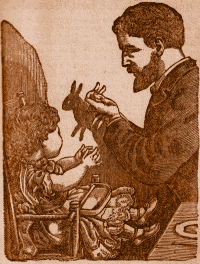
|
The children shout with laughter,
The cottage work is over,
He—smilingly assenting,
|
|
With these three little girls and two
little boys
|
|
Let us laugh and let us sing,
Like the seasons of the year,
Harry will be Winter wild;
Spring and Summer glide away,
Faster! faster! round we go
|
|
Little sister, come away,
On the grassplot let us sit,
But the fruit we will not pick,
Nor will we pluck the pretty flowers
We'll pluck the daisies, white and red,
And much I hope we always may
|
|
I am tired to death of keeping still
I heard Tom calling to me once,
I'd ten times rather run a race,
"Girls are like berries," papa says,
|
|
"We will have a game of hide and seek,
Then the children went to find him;
Just as they got where he was hid,
|
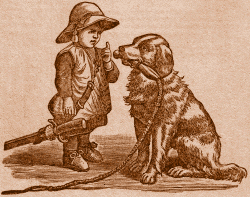
Page 82—Play Land
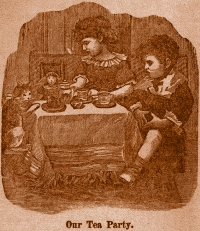
|
Tired of play! tired of play!
The doves have flown to the sheltering eves
Playing? But what has thou done beside,
Whom hast thou pitied and whom forgiven,
Well for thee if thou couldst tell,
If thou hast forgiven a brother's offence,
|
|
Two little boys, all neat and clean,
So quietly they sat them down,
They had just built a famous fort—
|
|
School is closed and tasks are done,
|
|
Sing, sing,
If you have not a horse,
Cry, cry,
You've been riding,
|
|
Come, my children, come away,
Bring the hoop and bring the ball,
|
|
The old school-house is still to day,
But a few short days ago, the lad
His school companions loving him,
But like a dream he's passed away,
True is the grief that brings the tear,
Oh! simple sight on green hill-side,
|
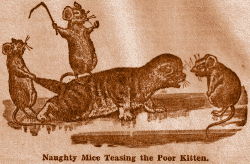
Page 83—Play Land
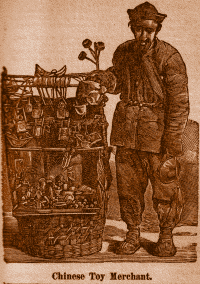
|
Cups and saucers, pots and pans,
Clockwork mice, and colored marbles,
Cows and horses, chickens, cats,
Books with coloured pictures, too,
|
|
"Little Clara, come away,
"I will come, and very soon,
First my bodkin I must place
There's my cotton, there's my thread
|
|
"Ting-a-ling!" Now they
Plenty of customers
Quick little hands
|
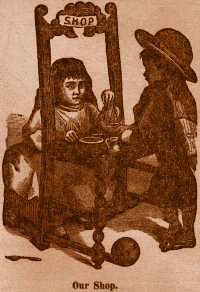
|
He took a stick, he took a cord,
|
|
When the clean white cloth is laid,
Stealing to her mother's side,
On her knees upon the floor,
"Where is Mabel?" father cries,
First he looks behind his chair,
But at last he thinks he knows,
But when he sits down to tea,
When he asks, "Where is my girl's
|
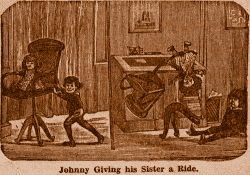
Page 84—Play Land
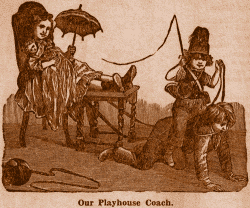
|
Now, Harry, pull the chairs up,
The fire will be a lighthouse,
Now this chair is the stern
Now, sailors, pull that sail up,
Now couldn't we sing something
Take care, you careless sailors,
|
|
Up and down the play-room,
In below the table,
And when brother sees me,
So at hide and seek we play.
|
|
Girls and boys, Come out to play, The sun is shining Away, away.
Into the meadow
Into the hedgerow
Down by the brook
Then home again
For mother dear
For every leaf
Girls and boys,
|
|
Two merry men,
Two little faces,
Four little hands,
For labour is sweet,
|
|
Tell me little ladies,
Susy gets the flour,
Pat it here, and pat it there;
Now we want a shower—
Turn them in, and turn them out,
|
|
I know a little girl,
She has a little doll,
But when her mamma calls her,
|
|
In the hay, in the hay,
In the hat, in the hay,
In the hay, in the hay,
While the haymakers sit
Hark! how the laugh and chat,
Now comes the wagon near,
Now that the sunset ray
Mrs. Hawtrey
|
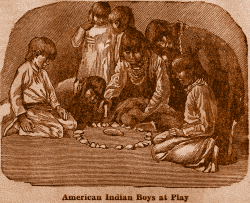
Page 85—Play Land
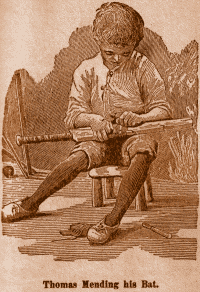
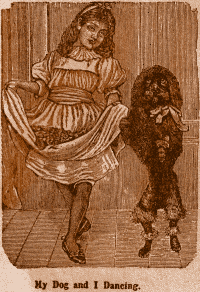
|
"Ho! for a frolic!"
Scarcely had Johnny
"We're cold" said the toe,
Then up spoke an ear;
"Pooh!" said his nose,
Eight little fingers,
But Johnny the stout
Tumbling and jumping,
Soon he forgot them,
Ah! What a frolic!
Often his breathing
"And I'll do the fire,"
|
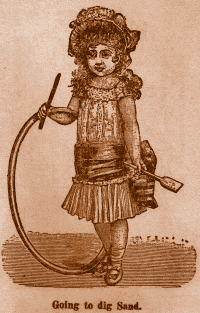
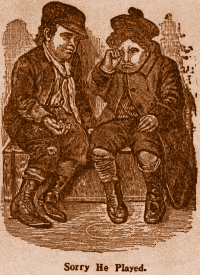
Page 86—Play Land
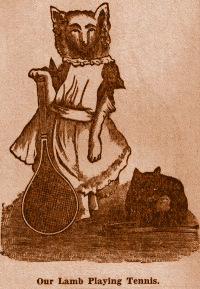
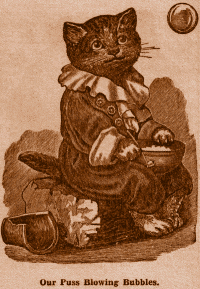
|
Supper is over,
Papa is reading;
Riding on "camels"
There goes the baby
Little he minds it,
Order is nowhere,
Home is their palace;
Only one short hour
Do not be angry
Home will be sweeter
|
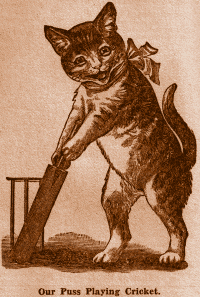
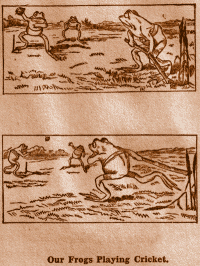
Page 87—Play Land
|
Play-time, play-time, hurrah!
Run, boys! Run, boys! faster!
Football for those who choose—
No lazy ones today;
Hear how it echoes round!
Hullo there! no foul play!
|
|
Why now, my dear boys, this is always the way,
What! are there no games you can take a delight in,
Now what is the reason you never can play
I often have told you before, my dear boys,
So, if any more of these quarrels are heard,
|
|
When the voices of children are heard on the green,
"Then come home my children, the sun is gone down
"No, no, let us play, for it is yet day,
"Well, well, go and play till the light fades away,
W. Blake
|
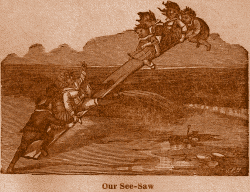
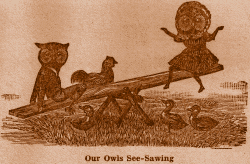
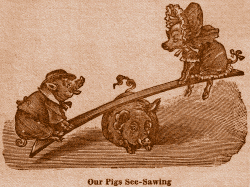
Page 88—Play Land
|
Here we go on the garden swing,
And there's room on the seat for three,
Up to the clustering leaves we go,
And there's room on the seat for three,
|
|
One day it chanced that Miss Maud did meet
"If you can skate and I can skate,
They skated left, and skated right,
And then they did unstrap their skates
|
|
Lessons now at last are over,
Lessons done with cheerful spirit
And if only Tom and Polly
Birds are singing as they're bringing
O'er the ropes so lightly skipping,
And remember, too, that they
|
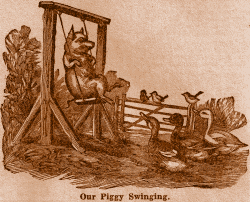
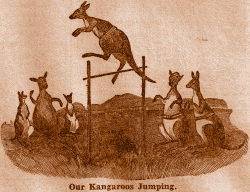
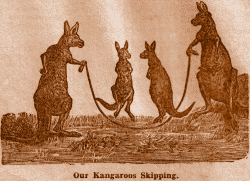
Page 89—Play Land
|
My brother Jack was nine in May,
Jack's in the pouts, and this it is,
Quite cross, a bit of string I beg,
This made him cry with rage and spite:
Aunt Hannah heard the window break,
Well, after many a sad reproach,
The chaise in which poor brother Bill
My uncle's porter, Samuel Hughes,
My father's walls are made of brick,
What a large floor! 'tis like a town!
|
|
He who checks a child with terror,
Give it play, and never fear it;
Would you stop the flowing river,
|
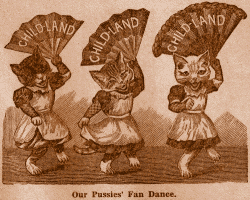
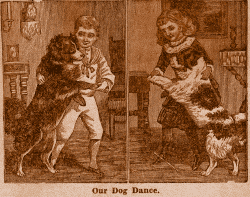
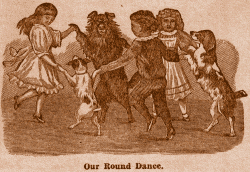
Page 90—Reading Land
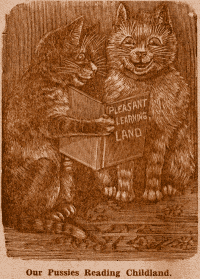
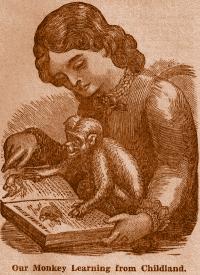
|
"And so you do not like to spell,
"Then bring me all your books again;
"So, as you wish to be a dunce,
"Do you not think you'll blush to own
"Oh, dear mamma," said Mary then,
Jane Taylor
|
|
Mrs Grammar once gave a fine ball
And first little Articles came,
The Adjectives came to announce
The Nouns were indeed on their way,
The Pronouns were hastening fast
Some cried out, "Make way for the Verbs!
The Adverbs attended on the Verbs,
Prepositions came in, by, and
near;
Then, too, with a hip, hip,
hurrah!
But, alas! what misfortunes were nigh!
Help! friends! to the rescue! on you
|
|
Three little words we often see,
Noun's the name of anything,
Adjective tells the kind of noun,
Instead of nouns, the Pronoun stand
Verbs tell us of something being done,
How things are done, the Adverbs tell,
A Preposition stands before
Conjunctions join the nouns together
The Interjection shows surprise,
The whole are called nine parts of speech,
|
|
The poor wretch who digs the mine for bread,
Hannah More
|
Page 91—Reading Land
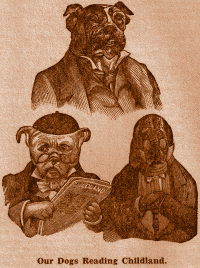
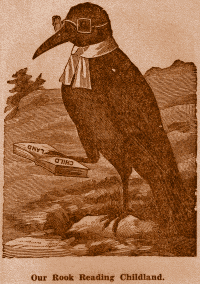
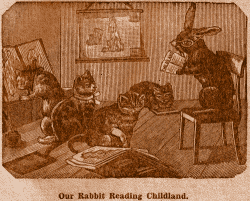
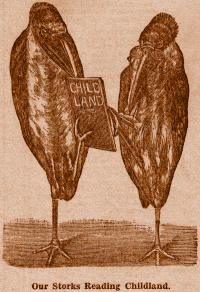
Page 92—Writing Land
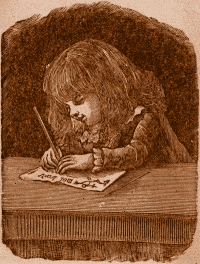
|
A sweet little baby brother
"Why hasn't it got teeth, grandma?"
That afternoon, to the corner,
At last the letter was finished,
"Dear God: The baby you brought us
Eben. E. Rexford
|
|
True ease in writing
Pope
|
|
Hurrah for the postman
For he walks many miles
Red stripes round his blue cap,
|
|
FIRST
Dear Grandmamma—I write to say
I'm coming, too, without mamma,
I'll help you lots about your word—
And maybe I will be so good
Now grandmamma, please don't forget
SECOND
Dear Mamma—Please put on your things,
My grandma's very good to me,
Last night I cried myself to sleep,
Please, mamma, come, for I don't see
And grandma will not care a bit
|
|
Dear Grandmamma, I will try to write
My little rabbit is alive,
I have a dove as white as snow,
The hens are picking off the grass,
I think I'll close my letter now,
|
|
Dear Old Uncle—I dot oor letter;
Dear little baby had a bad colic;
Wind on tomit, felt pooty bad;
I used to sleep all day, and cry all night;
My mamma say, never did see
Baby sends a pooty kiss to his uncles all,
|
|
"Did you ever get a letter?
A stamp was in the corner
Then there came a lot more written,
Don't you s'pose those letter-persons,
For it looked real big and heavy,
Youth's Companion
|
Page 93—Writing Land
|
I'm going to write to papa,
I'll tell him how I miss him,
I'll tell him 'bout my dolly,
For I must not be bothered,
I'll send him lots of kisses,
I want so much to see him,
I'm going to write to papa,
|
|
I gaze upon ye, once again,
I deem'd not there was a power yet,
Ye bring me back mine early dreams—
The loved—the lost—the changed—
Old letters—sad mementoes ye,
They tell me yet of early love,
Time's changes are for deeper things
Look back upon the buried past,
Bend heavenward thine onward course,
|
|
I was sitting in my study,
But I'se tired of the kitty,
"Not now, darling, mamma's busy;
I would paint my darling's portrait,
But the eager face was clouded,
So I parted back the tresses
Then I said: "Now, little letter,
Leaving me, the darling hurried
No one heard the little prattler,
No one heard the front door open,
Down the street the baby hastened,
'Cause this letter's going to papa;
But the clerk in wonder answered,
Fain the clerk would have detained him,
Suddenly the crowd was parted,
No one saw the baby figure,
'Twas too late: a moment only
Rev'rently they raised my darling,
Not a mark left the face disfigured,
|
|
I have got a letter,
My papa sent it to me,
I'd like to send an answer,
|
|
Little girl across the way,
Now what I'd like if you would too,
I don't know anybody yet
When I am big, I tell you what,
|
|
Heaven first taught letters
They live, they speak,
The virgin's wish
Speed the soft intercourse
|
|
Whatever you have to say my friend,
|
|
Letters from home! How musical to the ear
|
Page 94—Writing Land
|
Dear Brother Ben,
But here and there
The sun shone bright
Well, I went out
Behind a pile
And while I stood
But along the edge
I dropped my basket
And when I saw them,
Was fastened tight
"O father! O father!
The pigs had pushed me
And they sniffed at me,
E. W. Denison
|
|
Little pens of metal,
|
|
Blest be that gracious power
Beasts may convey,
But man alone has skill
Tis his also to please,
Crabbe
|
|
Use the pen! there's magic in it,
Many a gem is lost forever
Use the pen! reck not that others
So thy words and thoughts securing
J. E. Carpenter
|
|
Beneath the rule of men entirely great,
Lord Lytton
|
|
Such a little thing—a letter,
When our hearts are sad at parting,
Plans and doings of the absent;
Yet sometimes a single letter
Messengers of joy or sorrow,
Prayer or greeting, were we present,
Who has not some treasured letters,
Touched by neither time nor distance,
|
|
Never be in haste in writing:
P. J. Bailey
|
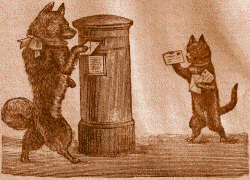
Page 95—Drawing Land
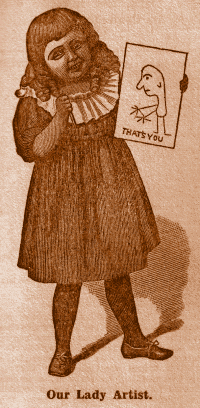
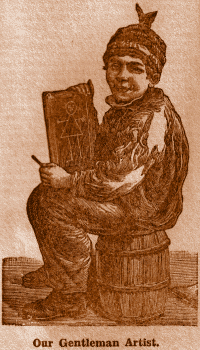

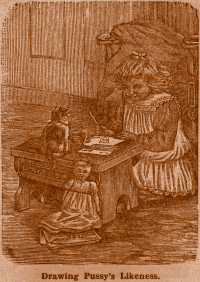
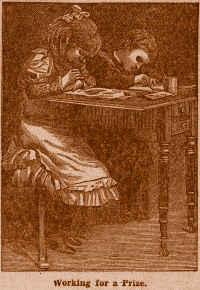
Page 96—Drawing Land
Just cast your beautiful, your sparkling,
your penetrating, your discriminating

Over this page, and read, mark, learn,
and inwardly digest its Contents.

|
THE two greatest educating powers in the ancient world were Pictures
and Poetry—the two greatest educating powers are pictures and
poetry still, and pictures and poetry blended in an interesting
manner is the intended educating feature of this
PLEASANT-LEARNING-LAND, but my object in this place is to speak of
pictures only, as perhaps the greatest of all educating powers, and
to demonstrate that they are not sufficiently used for educational
purposes. Firstly: pictures are in a universal language—when
they
are true to nature every person on the earth can understand them.
Show a picture of a person or a bird, a horse or a house, a ship, a
tree, or a landscape, and everyone knows what is meant, and this is
why most of the peoples of the ancient world conveyed their ideas in
picture language. FLETCHER, in his Cyclopedia of Education,
says:—
"It has long been accepted as an axiom that the best explanation of a
thing is the sight and study of the thing itself, and the next best a
true picture of the thing." DRYDEN, speaking of poetry and painting
says:—
"The poets are confined to narrow space, Many writers, ancient and modern, have taught the great educational power of pictures. HORACE says:—A picture is a poem without words". SYDNEY SMITH says:—"Every good picture is the best of sermons and lectures." O. S. FOWLER says:—"A single picture often conveys more than volumes." W. M. HUNT says:—"From any picture we can learn something." HENRY WARD BEECHER says:—"A picture that teaches any affection or moral sentiment will speak in the language which men understand, without any other education than that of being born and of living." GARRICK, speaking of Hogarth, says:—
"His pictured morals mend the mind, But pictures are not only a means of education, for they bring pleasure, comfort, and education combined. STEELE says:—"Beautiful pictures are the entertainment of pure minds." G. P. PUTMAN says:— "How many an eye and heart have been fascinated by an enchanting picture." CICERO says:—"The eyes are charmed by pictures, and the ears by music." JOHN GILBERT says:—"Pictures are consolers of loneliness; they are a sweet flattery to the soul, they are a relief to the jaded mind; they are windows to the imprisoned thought; they are books, they are histories and sermons, which we can read without the trouble of turning over the leaves." UGO FOSCOLIO says:— "Pictures are the chickweed to the gilded cage, and make up for the want of many other enjoyments to those whose life is mostly passed amid the smoke and din, the bustle and noise of an overcrowded city." PANDOLFINI says:—Many an eye has been surprised into moisture by pictured woe and heroism; and we are mistaken if the glow of pleasure has not lighted in some hearts the flame of high resolve, or warmed into life the seeds of honorable ambition." Many pictures, particularly portraits, by bringing up reminiscences, are a great source of consolation. In millions of houses the most-loved and treasured possession is the photographic album containing the likenesses of dear absent or departed friends. SHEE, writing of the soothing influences of the portrait, says:—
"Mirror divine! which gives the soul to
view, But it is more particularly with pictures as a direct means of education that I have to speak. MR. STEAD holds that in the coming education of the world the magic lantern will play a very great part, for through its aid you can portray any object you wish—pictures of scenery, of buildings, of distant countries, of the microscopic world, and in fact any kind of pictures you choose, in a most beautiful, life-like, interesting, and educational manner. I think and earnestly hope that MR. STEAD'S prediction will be fulfilled. There are two other ways which I think that pictures should be used for educational purposes. Firstly, in books, as in this one, and secondly, on the walls of buildings—outside and inside if you like —but I will speak only of the inside in this paper. Why should not every room of every house be covered with pictures where it is not covered with furniture? In millions of rooms there is a great waste of opportunity. Many times I have thought why do they not have varying patterns of different scenery, etc, in the different rooms of the houses instead of the wall paper, with its uninteresting pattern perpetually repeated. There is no reason why a house of twelve rooms should not represent on its walls twelve different countries, or twelve histories of striking events, etc. Possibly this may take place later on. With respect to hanging pictures everywhere on the walls, it may be objected that it would be too expensive—so it would if they were costly pictures—but really good pictures are produced by the million now so cheaply, that the objection of expense vanishes. The walls can be covered now almost as cheaply with intellectual pictures as with unintellectual wall paper. SIR JOSHUA REYNOLDS says:—"A room hung with pictures, is a room hung with thoughts." JOHN GILBERT says:—"A room with pictures in it, and a room without pictures, differ by nearly as much as a room with windows and a room without windows; for pictures are loopholes of escape to the soul, leading it to other scenes and to other spheres, as it were, through the frame of an exquisite picture, where the fancy for a moment may revel, refreshed and delighted." I was convinced many years ago of the almost criminal waste of wall space, and issued the following doggerel lines, partly from trade and partly from sentimental motives:— |
|
Every cottage, Two-roomed cottage, Should contain full Twenty PICTURES.
Every cottage,
Every cottage,
Every villa,
Every mansion,
Every large school
Walls are made to
Count your PICTURES
PICTURES they are
They'll admire them, |
|
Even in the poorest houses pictures must always be a blessing. Many a
poor man's cheerless home would be made much more comfortable and
endurable if a few shilling's worth of good pictures were posted or
hung round its bare walls. If houses were universally decorated with
true speaking pictures what an immense influence for good it would
bring them. What intellectual and refined tastes it would create and
nurture. One most important thing in selecting pictures to cover the
walls it to always choose good subjects. A poor picture takes up as
much room as a good one, and generally costs as much. Always choose
live speaking pictures that will interest and instruct. There is an
immense multitude of poor, tame, an uninteresting pictures produced
in the world, and which in millions of instances keep out the good
ones. If these poor ones could be kept back or destroyed, and the
best ones only take their place, the world would be better for it.
In choosing materials to build up a bright, happy home, always select
the best—the best books—the best music—the best
pictures. In
conclusion, there is one more suggestion I would make on the picture
question, and I think it is the most important of all; it is that a
good clear map of the world should be hung in every house in the
world, to give every person an idea of the world they live in. For it
is a most deplorable fact that ninety-nine out of every hundred of
the inhabitants, even of the civilized world, have a very poor
conception of the geography and ethnology of the world. And this
should not be, for every person ought to have a clear idea of their
world-fatherland, and of their fellow creatures, and a knowledge of
the map of the world is the first lesson to be learned in that most
desirable direction.
E W COLE, Book Arcade, Melbourne.
|

Page 97—Drawing Land
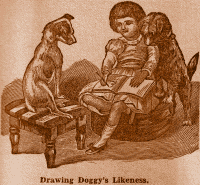
|
See my slate. I dot it new
I tan make you lots of sings,
I tan make an elephant,
An' the smoke a tummin' out;
I tan make a pretty house,
I tan put my hand out flat
Now, then, s'all I make a tree
No, I dess I'll make a man
|
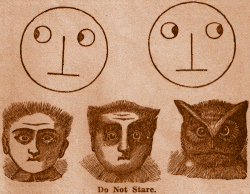
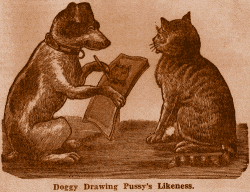
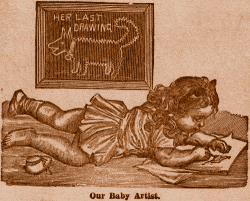
Page 98—Drawing Land
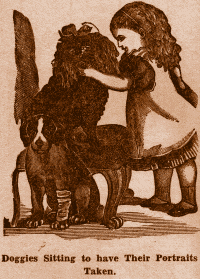
|
Come, here is a slate,
What! cannot you do it?
Now look, I have drawn you
Oh, yes, very pretty!
|
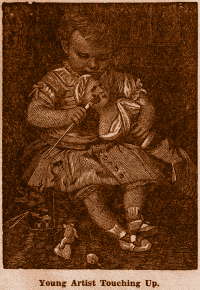
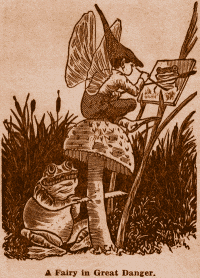
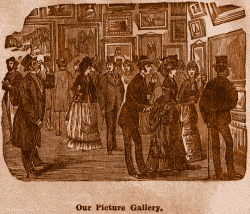
Page 99—Drawing Land

|
Draw a little loaf of bread On a piece of paper white— Make the bread extremely light.
Draw a little loop on top, And a satchel will be found Such as ladies carry round.
Add a pair of little ears; And, if Art is not in fault, There's a bag of extra salt.
Contemplate the great design— Add a flowing tail, and that Makes a perfect pussy cat. |
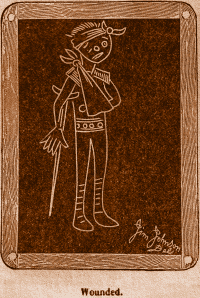
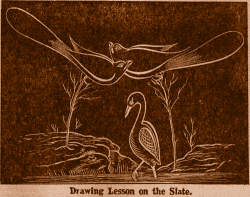
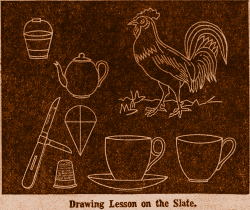
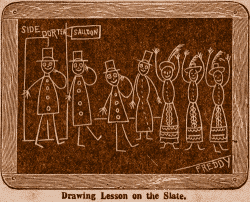
Page 100—Old Men Tales
|
There was an old man who lived in a wood,
"With all my heart," the old woman said,
"But you must milk the Tidy cow,
"And you must mind the speckled hen,
The old woman took a whip in her hand,
But Tidy hinched and Tidy flinched,
"Hi! Tidy! Ho! Tidy! Hi!
He went to feed the little pigs,
He went to mind the speckled hen,
So he swore by the sun, the moon, the stars,
|
|
John Ball shot them all.
John Wyming made the priming,
John Block made the stock,
John Crowder made the powder,
John Puzzle made the muzzle,
John Clint made the flint,
John Patch made the match,
|
|
There was an old man, and though 'tis not common,
|
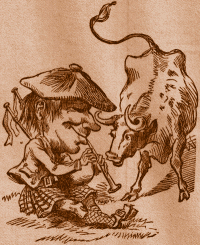
|
There was and old piper who had a cow,
|
|
Poor old John Brown is dead and gone,
|
|
Three wise men of Gotham,
|
|
There was a man and he had nought,
|
|
I had a little wife, the prettiest ever seen,
|
|
There was a crooked man,
|
|
When good King Arthur ruled this land,
|
|
Barney Bodkin broke his nose,
|
|
A man of words and not of deeds,
|
|
There was a man and he was mad,
|
Page 101—Old Men Tales
|
Jack Sprat could eat no fat,
When Jack Sprat was young,
Joan Cole had a hole
Jack Sprat was the bridegroom,
Jack Sprat was wheeling
Jack brought home his Joan,
Jack Sprat took his gun,
The drake was swimming
Jack Sprat to live pretty
Then Joan went to market
Jack Sprat bought a cow,
Joan Sprat went to brewing
Jack Sprat went to market
Jack and Joan went abroad,
Now I've told you the story
Now Jack has got rich,
|
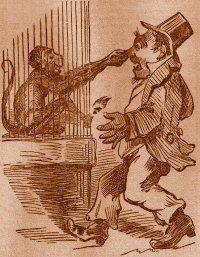
|
There was a cross old man and what do you think,
He teased a poor monkey, who lived in a cage,
|
|
The man in the moon came tumbling down,
|
|
There was a man of Newington,
|
|
Doctor Faustus was a good man,
|
|
If all the would was apple pie,
|
|
Alderman Absolute Always Adjudicated with Astonishing
Ability
Benjamin Bouncer Banged a Brown Bear with a
Blunderbuss,
Christopher Crabstick was Cross, Captious, Cutting, and
Caustic,
Francis Fizgig Ferociously Fought and Frightened a
Fiddler,
Gregory Gimcrack Grinned and Gaped at the Geese and
Ganders
Horatio Headstrong Hurled a Hatchet at the Head of a
Hawk
Isaac Ichabod Inhabited an Isolated and Inhospitable
Indian Island,
Lugubrious Longface Loved Learning and Literary Lore,
Marmaduke Meddlesome Munificently Meted out Mercy to a
Miserable Man
Obadiah Orpheus Opened an Original Overture Outrageously
Oddly,
Quinton Querulous Queerly Questioned a Quibbling and
Querulous Quidnunc,
Reuben Ramble Ran a Ridiculous Rattling Race on a
Railway,
Theodore Thunderbolt Told Terrible and Tremendous Tales
of Travelling,
Valentine Valiana Valorously Vanquished a Vapouring
Villager,
Xenophon Xenocles eXhibited eXtraordinary and
eXcessive eXcitability
Young Yokel, a Youthful Yorkshire Yeoman Yawned at
York,
Zachariah Zany Zealously studied Zoology
|
Page 102—Old Men Tales
|
There was an Old Person of Prague,
There was an Old Man with a gong,
There was an Old Man of the Isles,
There was an Old Person of Dover,
There was an Old Man of Quebec,—
There was an Old Man of Vesuvius,
There was an Old Person of Buda,
There was an Old Man of Marseilles,
There was an Old Man of Coblenz,
There was an Old Person of Gretna,
There was an Old Person of Bangor,
There was an Old Person of Spain,
There was an Old Man of the West,
There was an Old Man in a tree,
There was an Old Man who said, "How,
There was an Old Man of Calcutta,
There was an Old Man of the South,
There was an Old Person of Dutton,
There was an Old Man of some rocks,
There was an Old Person of Rheims,
There was an Old Man with a flute,
There was an Old Man of Berlin,
There was an Old Man of the Hague,
|
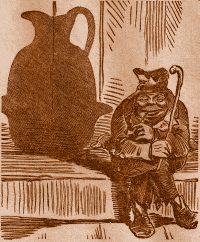
|
A horrid Old Gentleman from Monaghan, Sat down and refused to go on again, Till they gave him a crown for leaving the town, That wretched old humbug of Monaghan.
There was an Old Man if Nepaul,
There was an Old Man of Aoster,
There was an Old Man of the Nile,
There was an Old Person of Rhodes,
There was an Old Man of Cape Horn,
There was an Old Person whose habits
There was an Old Man with a nose,
There was an Old Man of Apulia,
There was an Old Man of Madras,
There was an Old Person of Sparta,
There was an Old Person of Chilli,
There was an Old Man of the East,
There was an Old Man of Peru,
There was an Old Man in a boat,
There was an Old Man of Bohemia,
There was an Old Person of Basing,
There was an Old Man on a hill,
There was an Old Man of Kilkenny,
There was an Old Person of Perth,
A dogmatic Old Fellow of Shoreham,
There was an Old Person of Ischia,
There was an Old Person of Hurst,
|
Page 103—Old Men Tales
|
John Gilpin was a citizen
To-morrow is our wedding-day,
He soon replied—I do admire
Quoth Mrs Gilpin—That's well said;
The morning came, the chaise was brought,
Smack went the whip, round went the wheels,
For saddle-tree scarce reached had he,
'Twas long before the customers
Now, Mistress Gilpin, careful soul,
Then over all, that he might be
But, finding soon a smoother road
So, stooping down, as needs he must,
Away went Gilpin, neck or nought,
Then might people well discern
Away went Gilpin—who but he,
And now as he went bowing down
But still he seemed to carry weight,
And there he threw the wash about
Stop, stop, John Gilpin!—Here's the house—
So, like an arrow, swift he flew,
The Calender, amazed to see
Now, Gilpin had a pleasant wit,
The Calender, right glad to find
He held them up, and in its turn
Said John, It is my wedding-day,
Ah, luckless speech, and bootless boast,
Away went Gilpin, and away
And thus unto the youth she said
But, not performing what he meant,
Six gentlemen upon the road,
And now the turnpike gates again
Now let us sing: Long live the king,
|
Page 104—Song Of The Book Arcade
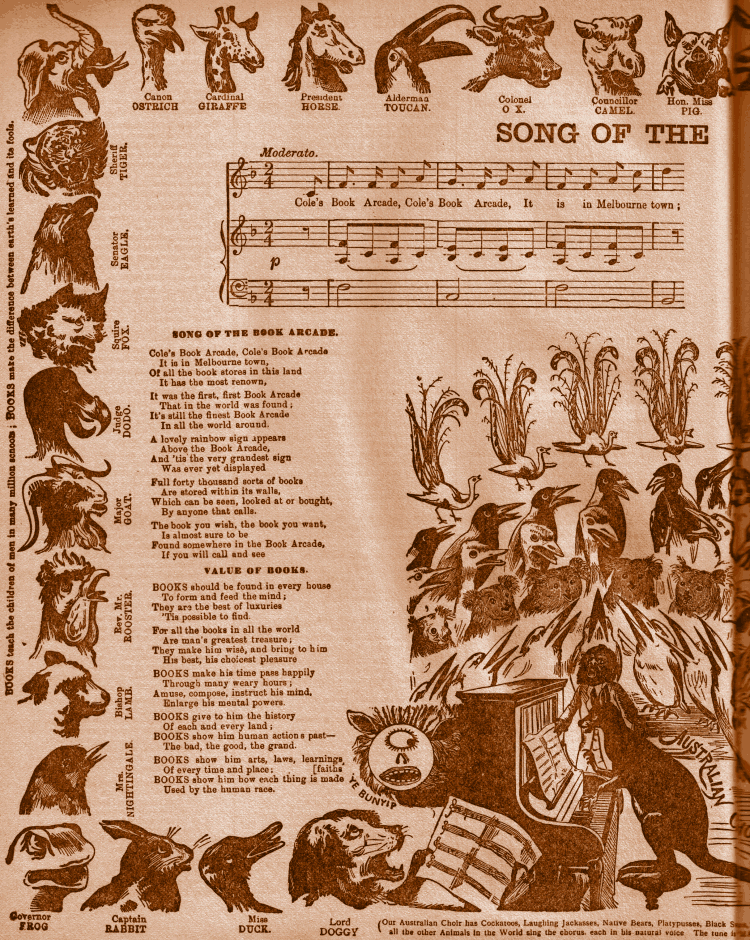
Books teach the children of men in many million schools;
Books make the difference between earth's learned and its
fools.
|
Cole's Book Arcade, Cole's Book Arcade
It was the first, first Book Arcade
A lovely rainbow sign appears
Full forty thousand sorts of books
The book you wish, the book you want, |
|
(Our Australian Choir has Cockatoos, Laughing Jackasses, Native
Bears, Platypusses, Black Swans, Emus, Magpies, Opossums, and Lyre
Birds, also a BUNYIP to sing deep bass, all the other Animals in the
World sing the chorus, each in his natural voice. The tune is "MARY
HAD A LITTLE LAMB.")
|
|
BOOKS should be found in every house
For all the books in all the world
BOOKS make his time pass happily
BOOKS give to him the history
BOOKS show him arts, laws, learnings, faiths
|
Page 105—Value Of Books
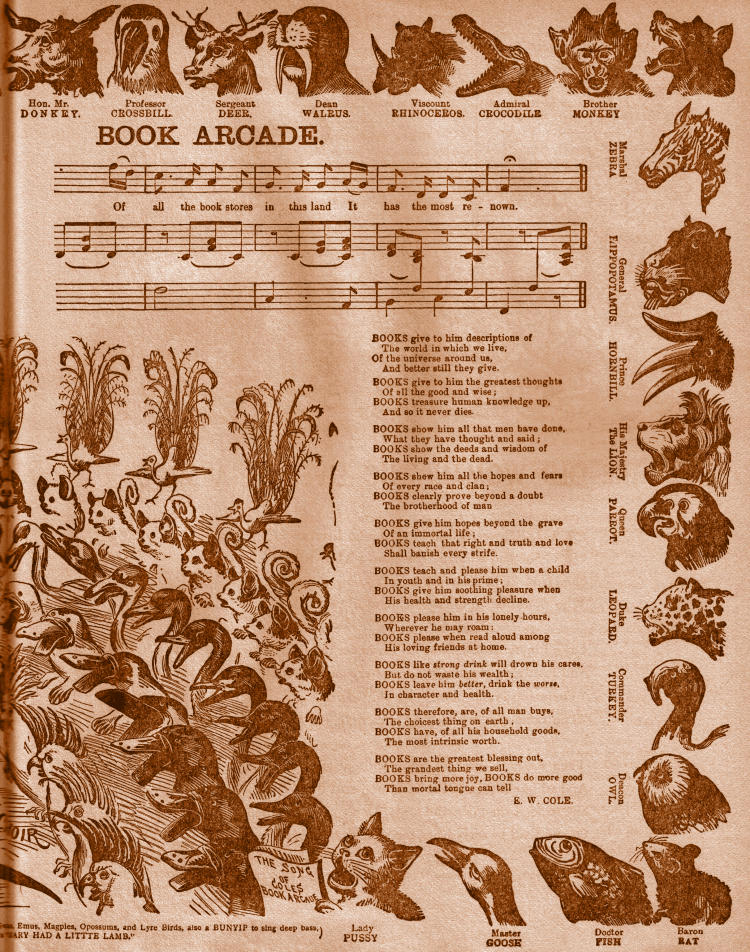
|
BOOKS give to him descriptions of The world in which we live, Of the universe around us, And better still they give.
BOOKS give to him the greatest thoughts
BOOKS show him all that men have done,
BOOKS show him all the hopes and fears
BOOKS give him hopes beyond the grave
BOOKS teach and please him when a child
BOOKS please him in his lonely hours,
BOOKS like strong drink will drown his cares,
BOOKS therefore, are, of all man buys,
BOOKS are the greatest blessing out,
E. W. Cole
|
Page 106—Old Woman Tales
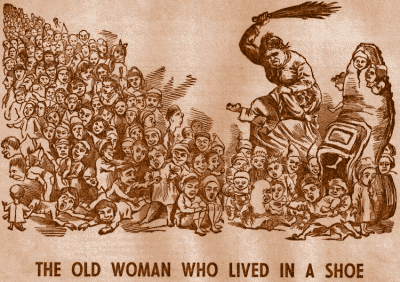
|
There was an old woman who lived in a shoe,
Once ninety little fellows sat down on the floor
"Then she gave the boys broth without any bread,
|
Page 107—Old Woman Tales
|
Old Mother Goose, when
Mother Goose had a house,
She had a son Jack,
She sent him to market;
Jack's goose and her gander
Jack found one morning,
Jack rode to his mother,
Hack sold his gold egg
Then Jack went a-courting
The Jew and the Squire
Then old Mother Goose
She then with her wand
The gold egg in the sea
The Jew got the goose,
Jack's mother came in,
|
|
There was an old woman lived under a hill,
|
|
There was an old woman lived under a hill;
|
|
There was an old woman had three sons;
|
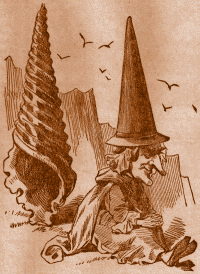
|
A little old woman, as I've heard tell,
Then if for her dinner she had the least wish,
|
|
There was an old woman called Nothing-at-all,
|
|
There was an old woman sat spinning,
|
|
There was an old woman, her name it was Peg;
|
|
At Stepney there lived,
The boys, while she slept,
This old woman went
Having shot him, she tied
She'd nearly reached home,
While locked in her cell,
She considered each plan,
She cut the plum tree
This she set on a stool,
Soon the jailor came in
The old woman reached home,
|
Page 108—Old Woman Tales
|
There was an old person of Smyrna,
There was an old lady of Bute,
There was an old lady of Ryde,
There was an old lady of Parma,
There was an old lady of Troy,
There was an old person of Crete,
There was an old lady of Wales,
There was an old lady of Clare,
There was an old lady of Dorking,
There was an old lady of Russia,
There was an old lady of Norway,
There was an old lady of Chertsey,
There was an old woman of Anerley,
There was an old lady of Welling,
There was an old lady of Turkey,
|
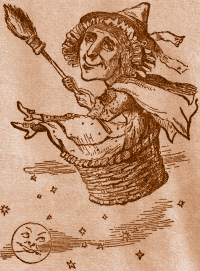
|
There was an old woman went up in a basket,
"Old woman, old woman, old woman," quoth I, |
|
|
|
There was an old woman of Prague, Whose ideas were horribly vague, She built a balloon, To examine the moon, That deluded old woman of Prague.
There was an old woman of Hull,
There was an old lady of Poole,
There was an old lady of Burton,
There was an old lady of Lucca,
There was an old woman of Norwich,
There was an old woman of Leeds,
There was an old woman in Surrey,
There was an old lady whose bonnet
There was an old lady whose nose
There was an old lady whose chin
There was an old lady whose eyes,
There was a young lady of Hexham,
|
Page 109—Strange History of Twenty-Six Funny Women
|
Angelina Armstrong Abruptly Asked an Advertising Agent
About an Alliterating Advertisement Appearing, Announcing An
Astonishing, Admirable, Attractive, Agreeable, Artistic, And Advanced
Australian Arcade.
Bridget Bradshaw Bamboozled the Barber's Beautiful Baby
By Bouncing it into Believing a Bandbox to Be a Big Book.
Clarissa Cox Cautiously Crept & Caught with a Candle
extinguisher a Congregation of Catterwauling Cats Conducting a
Confounded Corroboree.
Dorothy Dwight in the Dark Drew a Decidedly Delightful
Drawing, Depicting a Dictating, Domineering Despot; a Desperate
Despoiling Demogogue; a Disdainful Duchess Dowager; a Dainty, Dressy
Dandy, and a Downright Double-Dealing Dodger.
Eudocia Emul, the Eccentric Epicurian Empress of
Ethiopia, Electrified the East End of Egypt by Eagerly and Easily
Eating, as an Experiment, an Egg, an Eagle, an Emu, and Electrical
Eel, and an Enormous Elephant, larger than the one Exhibited next to
Cole's Book Arcade.
Fanny Fagan's Fine, Flossy, Fashionable Feathers Frequently
Flopped, Flirted, and Flounced Forcibly From Fun.
Georgina Gubbins Gently, Gracefully, Gravely,
Grammatically, Graphically, and Grandiloquently Grumbled
at her Great-Grandmother.
Harriet Hopkins Had an Habitual, Haughty, Harsh, Hasty, Huffy,
Hateful, Hideous, Horrid, Headstrong, Heedless,
Hysterical, Habit of Henpecking Her Husband at Home.
Isabella Ingram Ironically Inquired of the Illustrious
Imperial Indian If Idleness, Ignorance, Impudence,
Intemperance, Intolerance, Inhumanity, and Infamy.
Jemima Jenkins, the Jerusalem Jewess, Judiciously Jotted
Jokes in her Journal in June on her Journey through Judea to
Jericho, beyond Jordan.
Kate Kearney Kidnapped a Knave, a Knight, a Khan, a
Kaiser and a King, and Kindly Kept them upon Ketchup, Kale,
Kidneys, Kingfishes, Kittens and Kangaroos.
Lucy Larkins Lately Let a Lovely, Lonely Lady Look
Leisurely at a Large Live Lobster by the aid of a Lucid Little
Lime-Light, Borrowed from Cole's Book Arcade.
Mary Muggin's Mother Made a Mighty, Monstrous, Mammoth,
Monument of Marmalade jars; Mounted up, and Minutely Minced the Moon
into a Multitude of Magnificent stars.
|
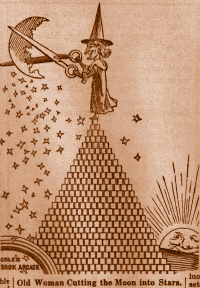
|
Nancy Nuttall was a Nonsensical, Noodlesome, Nincompoopish,
Namby-pamby, Numskulled, Needle-woman; Nevertheless, at
Ninety-Nine she Neatly and Nimbly Nabbed in the Nuptial Noose a
Notable Noble Nabob of Nagpoor. And directly after the marriage Nagged him into sending for books to Cole's Book Arcade.
Olivia Oliphant, of Omeo, ordered an Obstinate Old
Organ-grinding Ostrich to Overwhelm with Oil an Olive, an Onion, an
Orange, an Onion, an Orange, an Ocean, and an Oat.
Papline Potts, a Poor, Penniless Peasant, Prettily,
Pleasantly, Pathetically and Perfectly Played a Piece of music in a
Parlour at a Pleasure-Palace to a Picked, Packed Party of
Particular Personages, consisting of Peers, Peeresses, Princes and
Princesses.
Quintina Quirk Quarrelled with the Queer, Quaint,
Quadroon Queen of Quito, and Quizzingly Questioned her Quivering,
Quaking Quartermaster.
Ruth Robertson's Rich Rival, Regardless of Right, Rhyme,
or Reason, Recently Ran a Rapid, Rattling Race Round a Regiment of
Royal Russian Red Republicans,
Seraphina Susanna Selina Sally Snooks, a Sober, Serious,
Staid, Seraphic, and Sentimental Sailoress, Solicited a
Situation as Superior Saloon Stewardess on the Splendid Spanish
Steamship Salamanca, and Straightway Stipulated with the
Sprightly Supercargo to Slyly and Suddenly Sail Southward at
Sunrise for Six Shillingsworth of Select Stationery to
Cole's Book Arcade.
Theresa Toodles Thatched a Trumpery Tipperary Theatre
Three Thousand and Thirty-Three Times, and Then Took To
Table-Turning and Table-Talking.
Urania Upton was Uncouth, Ungraceful, Unfashionable,
Unladylike, Uninteresting, Unpresentable, and Ugly. She was
Unpoetical, Unmusical, Unlearned, Uncultured, Unimproved,
Uninformed, Unknowing, Unthinking, Unwitty and Unwise. She was
Unlively, Undersized, Unwholesome and Unhealthy. She was Unlovely,
Ungentle, Uncivil, Unsociable, Untameable, and altogether
Unendurable. She was Unkind, Unfeeling, Unloving, Unthankful,
Ungrateful,
Unwilling, Unruly, Unreasonable, Unwomanly, Unworthy, Unmotherly,
Undutious, Unmerciful, Untruthful, Unfair, Unjust and Unprincipled.
She was Unpunctual, Unthrifty, Unskilful, Unready, Unsafe, Unfit,
and totally Unprofitable. She was Unknown, Unnoticed,
Unheeded, Unobeyed, Unloved, Unfriended, Unemployed, Unvalued,
Unpopular, and actually Unpitied. She was Unsuccessful, Unfortunate,
Unlucky, Unpaid, Unshod, Unfed, Unquiet, Unsettled, Uncertain,
Undecided, Unhinged, Uneasy, Upset, Unhappy, and Utterly Useless.
Victoria Vincent Valiantly Vaccinated a Vapouring,
Verbose Varmit of a Vulgar Villainous Vagabond, who Very Verdantly
Ventured on a Versatile, Veteran, Valueless Velocipede to Visit the
Viceroy of Venice, instead of Visiting
Cole's Book Arcade.
Wilhelmina Wilkins Was a Worthy, Witty, Widow
Washerwoman, Who
Washed Woollen Waistcoats, Worsted Waistbands, and
Water-proof
Wrappers With a Washing-Machine, and lived Well upon
Water-gruel;
Whereupon William Watson, a Wide-awake Widowed Waterman,
Wisely Walked With her—Whispered, Winked, Wooed, Won,
Wedded, and Wafted
her across the Wide Waste of Water Waves, and got her a
Weird Waltz.
Xantippe Xman, the eXiled eXqueen of the eXquimaux,
eXceedingly
eXcelled in eXerting an eXquisite eXactness in eXpense in
general; but eXhibited the most eXceptional, eXtensive,
eXtraordinary,
eXcessive, eXtravagant, but eXcusable eXuberance.
Yellena Yellat, the Yellow Yahoo of Yokohama, Yawned
Yesterday at
Yon Yelping Yokel of the Yankee Yeomanry.
Zenobian Zoziman, the Zouave Zemindaress of Zululand, was
no Zany, but rode on a Zanzibar Zebra, resided in a Zing-Zag
Zenana, Zealously studied Zanyism, Zealotism, Zoology,
Zoonomy, Zoophytology, Zoolatry, Zymology, Zincography
|
Page 110—Forty Ways Of Travelling
|
in The World, and a Prize of £1000 offered for a Flying Machine. I have always been a man of one idea at a time, and that one idea I have followed with unwavering determination until success has rewarded my efforts. Now listen to my story:—A short time ago, much desiring to obtain a particular article, I determined to get it if it was possible to do so in this world, and so started on my search journey. I ran into Melbourne and asked
|
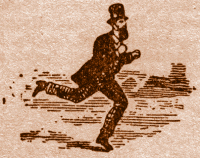
|
His Excellency the GOVERNOR of Victoria if he knew where I could get
it, he said he did not but I might ask the RAJAH of Sarawak. I took
ship to Sarawak, asked the Rajah, he said he did not know, but
referred me to the MIKADO of Japan. I jumped into a boat, pulled
|
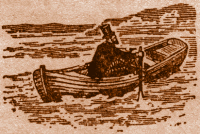
|
to Jedo, asked His Dual Majesty, Lord Paramount of Japan, and head of
the Sintoo Faith, he said he did not know, but perhaps the TYCOON of
Japan did. I got into a jimriksha and was trotted
|
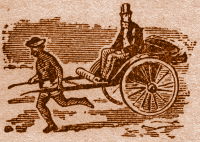
|
away to the house of the unfortunate Tycoon, he said he could not
help me, but referred me to the GREAT CHAM of Tartary. I jumped into
a Chinese junk,
|
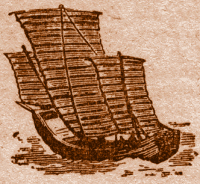
|
bore away to Pekin and saw the Great Cham of the Celestials, "Son of
Heaven," "Brother to the Sun, Moon and Stars," "Father of Mankind,"
"Governor of the World" and head of the Confucian Faith. He
condescendingly said he did not know, but maybe the TIANG of Nankin
could inform me; I took a sailing wheelbarrow to the Centre of Wise
Learning, saw the head
|
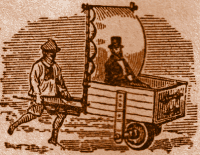
|
of the Taoist Faith, he could not tell me where to get it but perhaps
the GRAND LAMA of Thibet could, I jumped on the back of a Yak, rode
to Lassa,
|
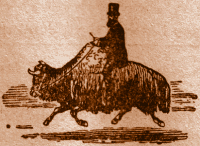
|
interviewed the head of the Buddhist Faith he said he wanted one
himself, but did not know where to get it, go, says he, to the CZAR
of Russia, present my compliments and ask him for one for yourself
and one for me. I took passage in a reindeer sleigh to St.
|
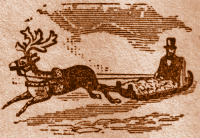
|
Petersburg, saw the CZAR, he referred me to his brother monarch the
KEIZAR of Austria. I jumped on a horse, galloped away to Vienna, saw
the Keizar,
|
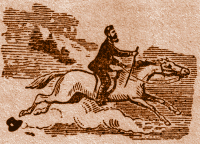
|
he did not know, but I could try the QUEEN of England, I jumped into
an electric train, made for the metropolis
|
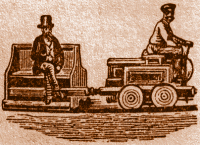
|
of the world, saw Her Royal, Imperial, and Republican Majesty the
"Queen of England," "Empress of India," Sovereign of Canada,
Australia, and forty other countries, the most powerful and beloved
ruler of the finest race of men, and the largest, mightiest, and
grandest Empire the world ever saw. I now said to myself I surely
shall get the article I want from the vast resources of Her Majesty,
but in answer to my query she politely remarked that she did not
think I should get in her dominions, but was almost certain that I
could get it from the CHIEF of the Greenland Esquimeaux, I rose up in
|
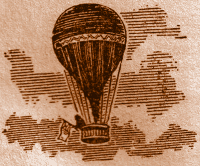
|
a balloon, flew through the air across the Atlantic, saw the Chief,
he could not say, but referred me to the VICEROY of the Dominion, I
jumped on the back of a reindeer, trotted away to Ottawa, saw
|
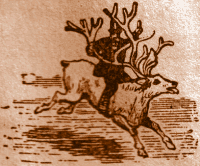
|
the Viceroy, he was positively ignorant on the subject and referred
me to the Mormon PROPHET. Got into an ice ship,
|
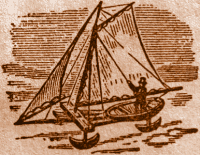
Page 111—Forty Ways Of Travelling
|
slid away over the snow to Utah, saw the Prophet, he had heard of it
but did not know where I should get it, but I might at least ask the
SACHAM of the Flat-Head Indians, I jumped into a dog-sleigh,
scampered away, hailed the
|
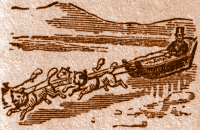
|
Sachem, but he did not know, but perhaps the PRESIDENT of Peru did,
rode on a one-man sedan to the City of Earthquakes,
|
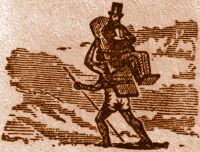
|
saw the President, he did not know, but would I be so good as ask the
EMPEROR of Brazil, I sprang on to the back of a llama, flopped away
to Rio;
|
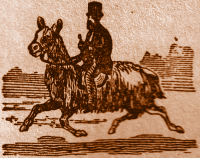
|
the American Emperor said he did not know himself, but surely the
SHEIKH of Timbuctoo ought to tell. I jumped into a canoe, crossed
the Atlantic,
|
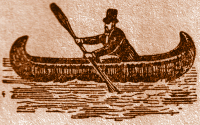
|
reached the Negro city, asked the Sheikh, he said it was like my
impudence asking him, how should he know such a thing? none of the
traditions of the negro continent mentioned it, but if I thought such
a thing existed I had better ask his Sublime Mightiness the SULTAN of
Zanzibar, I jumped on the back of an ostrich, strode away to the
|
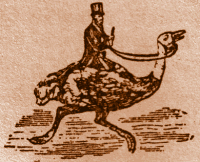
|
Isle of Beauty, saw the Sultan, he shook his head and referred me to
the NEGUS of Abyssinia, I was carried rapidly in a head palenkeen on
the heads of four
|
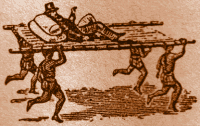
|
negroes to Magdala, spoke to the Negus, he referred me to the KHEDIVE
|
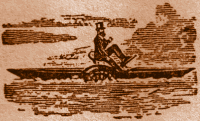
|
of Egypt, I got into a water-velocipede, trod away up the Red Sea to
the city of the Pyramids, saw the Khedive, he referred me to the
SHERIF of Mecca, I at once bestrode a donkey, cantered
|
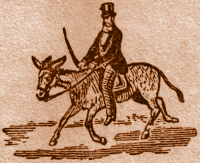
|
away to the Sacred City, asked the custodian of the Precious Tomb of
the Great Prophet, the query nonplussed him, and he desired me to
wait on the IMAUN of Muscat, I mounted a camel,
|
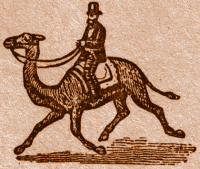
|
ambled across to the hot city of the Imaun, he could not say but
referred me to the RAO of Cutch, I made for Bhooj on a raft, spoke to
the Rao, he
|
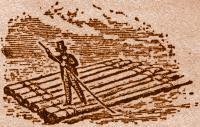
|
had not got one, but referred me to the GUICOWAR of Gujerat and
considerately lent me a pair of ten-feet stilts for the
|
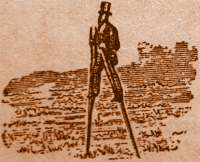
|
journey. I waded from the City of Dismal Swamps and finally reached
Baroda on my stilts, saw the Guicowar, he had never heard of the
article, but referred me to the HIGH PRIEST of the Parsees, I got
into a sedan, was borne
|
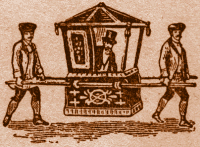
|
to Bombay, saw the head of the Parsee Faith, he had not the article,
did not believe that it existed, as it was not mentioned in any of
the sacred books of the Parsees, but finally referred me to the BIBY
of Canonore, I mounted an Elephant
|
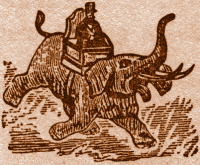
|
stamped down the coast, addressed the Biby, she said it was the first
time she had heard of the article, but the MAHARAJAH of Mysore might
have one. I stepped into a palenkeen
|
Page 112—Forty Ways Of Travelling

|
and four men trotted away to Mysore, the Great Rajah said he had not
got one, perhaps the NIZAM of Hyderabad could assist me. I got into a
horse-sedan, went
|
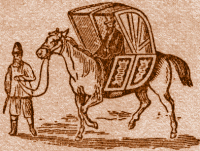
|
to Hyderabad, saw the Nizam, he did not know and suggested the GRAND
MAHUNT of Benares. I got into a horse-palenkeen, made straight for
the
|
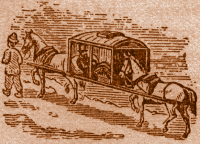
|
City of the Sacred Shrines, saw the head of the Hindoo Faith, he did
not know where it could be got, but had I asked the THACKOOR of
Bhrownnuggar? No!—or the Swat of Ackoond, or the Mudor of
Cassala,
or the Hospodar of Wallachia, or the Aboona of Gondar or the
Patriarch of Constantinople, or the Archbishop of Canterbury? I said
most decidedly not—that I would not waste my time consulting
such
insignificant magnates, then, says he, just you ask the GURO of the
Sikhs. I jumped astride of a Bramah Bull, and
|
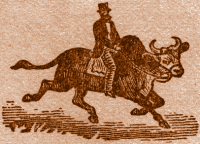
|
trotted away to Amritsar; saw the head of the Sikh Faith, he had not
got the article, had not heard of it, but advised me to apply to the
AMEER of Afghanistan. I got into an ox dooly and at
|
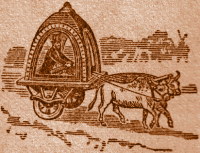
|
length reached Cabul, saw the Ameer, he had not got it, had not seen
it, nor heard of it, did not believe the article existed, but the
KHAN of Bokhara could speak more positively about it. I got into a
Tocan or Hamockeen and was
|
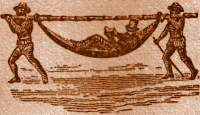
|
carried by two men to Bokhara, interviewed the Khan, he said it was
absurd for the Ameer to send to him, he knew nothing about it, but
the SHAH of Persia probably did. I got into a mule sleigh,
|
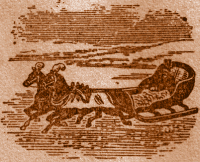
|
glided away to Teheran, enquired of the Shah, could get no
satisfaction, he never heard of it, was I sure there was such an
article in existence? I told him that I wanted to find out, but I
thought there must be somewhere. Oh, then, said he, try the CHIEF
RABBI of Jerusalem. I got into a coach, tore away to
|
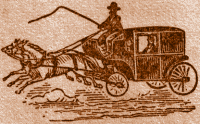
|
the Holy City of the Jews, asked the head of the Jewish Faith, he had
not one, I had better ask the PASHA of Damascus. I jumped astride of
a bicycle,
|
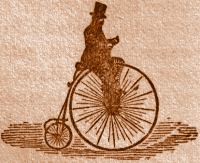
|
trundled away to the oldest city in the world; asked the Pasha, he
could not say, I had better ask the EMIR of the Druses. I creeped up
the Lebanon in a bullock-waggon, saw and asked the
|
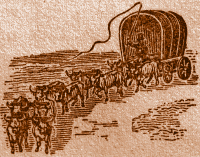
|
head of the Druse Faith, he referred me to the BEY of Tunis. I got on
to a tricycle, rode to Tunis, saw the Bey,
|
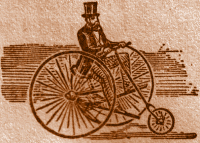
|
he could not tell, perhaps the POPE of Rome could. I jumped into a
ship,
|
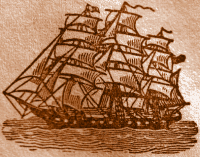
|
made for the Eternal City, asked the head of the Christian Church,
His Holiness could not tell, perhaps the GRAND SEIGNEUR of Turkey
might. I stepped into a railway steam carriage, swept
|
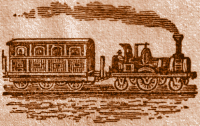
|
around to the Golden Horn; saw His Sublime Mightiness the PADISHAW,
he
|
Page 113—Forty Ways Of Travelling
|
said that he had not got one and never heard of it; but when I
described to him, in clear, concise and glowing terms, the real value
of the article to the whole human race, he said that every person
black or white, or brown, or yellow, or red, or any other colour
whatever, in the world, should have one and that it was the duty of
all Kings and Queens and Emperors, and Sultans, and Czars, and
Keizars, and Khedives and Khans, and Shahs, and Ameers, and Deys, and
Beys, and Great Chams, and Grand Lamas, to see that every one of
their subjects obtained one without delay. I said those were exactly
my sentiments; but where was it to be got. He again graciously
assured me that he did not know, bit I might ask the GRAND MUFTI of
Turkey, the fountain of all human knowledge, and custodian of the
sacred Koran. I tore along in a goat-carriage, interviewed the head
of
|
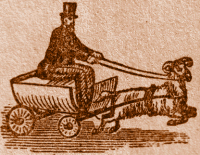
|
the Mahometan Faith; but in answer to my query this Mighty Spiritual
Magnate seemed taken aback; he affirmed that the Koran did not
mention the article, and, therefore, he believed that it could not
exist, but had I made a thorough search for it; had I tried the Dey
of Algiers. I answered no! Had I tried the Doge of Venice—the
Elector of Saxony—the Begum of Oude—the Stadholder of
Holland—
the Peishwa of Poona—the Nabob of Bengal—the Caliph of
Bagdad—
the Inca of Peru, or the great Mogul. I looked at the Grand Mufti in
speechless astonishment; he might as well have asked me if I had
enquired of Pharaoh or Nebuchadnezzer. I shook my head and rushed
from his presence, completely nonplussed, bewildered, frantic. Where
on earth was I to get the article? I had asked, and asked, and asked
again, and was tired of asking. I had travelled fifty thousand miles
by forty different modes of conveyance; consulted in their own
capitals with thirty secular monarchs, governing three-fourths of the
world; and I had with earnest, respectful enquiry approached the
sacerdotal thrones of the spiritual monarchs of the eleven principal
religions of mankind, and yet I could get no tidings of it. What was
I to do? I was now standing in front of the great Mosque at
Constantinople almost frantic with perplexity; some one approached
and handed me a printed announcement. I read it! It sent an
inexpressible thrill through me. I immediately took a steamer
|
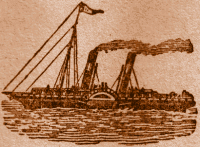
|
for Melbourne, landed there, jumped into a cab, went straight to
Cole's Book
|
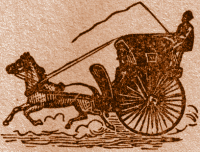
|
Arcade, and saw a drawing of the very article I had ransacked the
world over to obtain, and what do you think it was? It was a FLYING
MACHINE! I wanted a flying machine, Mr. Cole informed me that he had
not got his machine to fly yet, and that in all the world a machine
was not yet invented that would fly, but that, through the active and
progressive ingenuity of the human intellect, such a machine was
certain to be invented in the future, and as an earnest of his strong
conviction he handed me a document, which ran as follows:—
October 31st. 1882
I, the undersigned, firmly believe that as
man has already made
—E. W. Cole
|
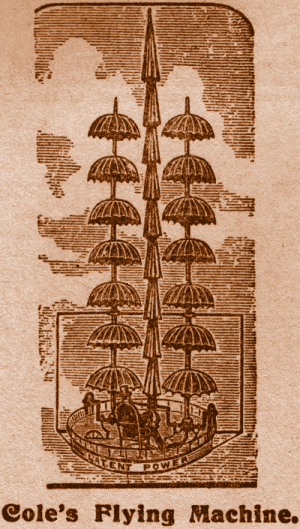
|
A workable flying machine would be the grandest invention of the age. My offer may not bring it about, but suppose a shilling subscription was made throughout the civilised world; say twenty million people gave 1/- each. That would be one million pounds, and offer that as a bonus for a useful flying machine, that bonus, I am sure, would produce the article. The shillings would be well spent, and it would immortalise the twenty million people who put their names down.
|
Page 114—Miss Cole's Aerial Flight in a Flying Machine
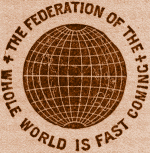
|
My prophecy with regard to flying machines, as may well be seen by
the original statement herewith, was made twenty-eight years before
the French aviator brought his machine to Australia which was on 2nd
November, 1910, or two weeks before his successful flight.
Subsequently Mr. Hammond flew over the city. He remarked: "I was to early for breakfast, and just thirty years too late to claim E. W. Cole's prize of £1,000." I believe that the advance of flying machines will be so rapid that within the next decade they will be used with as much ease and safety as any other means of present locomotion. I will further state that their utility will be so great as to enable China, with her three hundred millions, to succeed in taking correct statistics. And eventually the velocity with which they will fly may materially assist in establishing the peace of the world and the Parliament of Man. My prophecy with regard to flying machines was made in 1868, and the bonus of £1,000 (see previous page) was offered in 1882.
—E. W. Cole
|
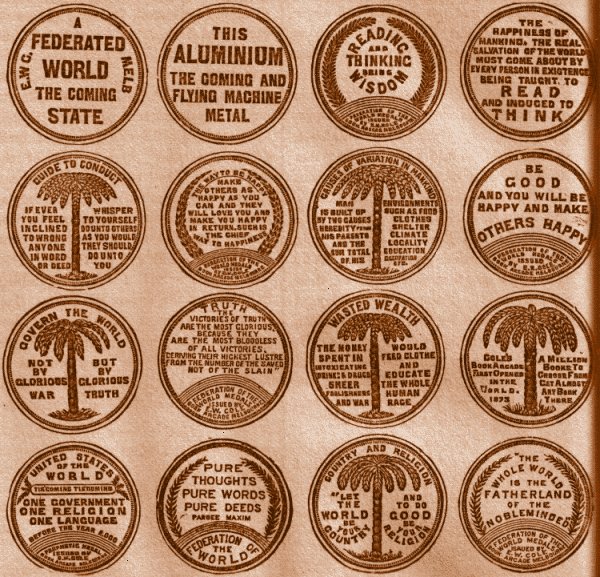
|
The above are facsimiles of 16 of 50 of E. W. Cole's World
Federation Motto-Medals.
|
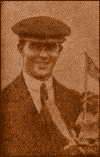
|
The Man Who Flew. Mr. Hawker was born at Brighton, Victoria, on 22nd January, 1889. He went to England in 1911, returning to Victoria in 1914, after three years experience of aviation in England. He just missed the £5000 prize given by the "Daily Mail" for a flight around the British Isles, meeting with an accident off the coast of Ireland.
|
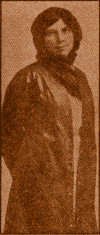
|
|
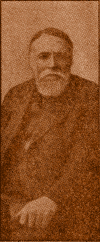
|
|
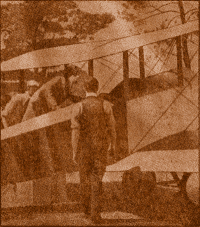
|
|
Page 115—Miss Cole's Aerial Flight in a Flying Machine
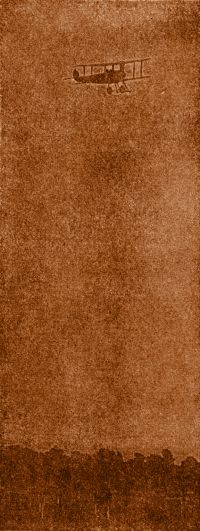
Miss Cole And Mr. Harry Hawker
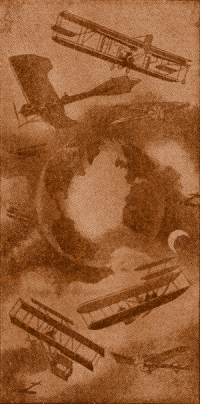
Companions In Space
Our World surrounded by one of the latest Inventions of man—"The
Flying Machine."
|
Passengers Accompany Harry Hawker To The Clouds. It was Mr. E. W. Cole's enthusiasm and belief in the ultimate success of aerial navigation that induced Miss Linda Cole to fly with Mr. Hawker, the daring young aviator, at Elsternwick recently. Miss Cole was perfectly calm and collected when entering the biplane, and showed no signs of "nerviness." During the flight around St. Kilda, Brighton and Sandringham, and across the waters of Hobson's Bay, she conversed freely with Mr. Hawker, and commented on the panoramic views which unfolded themselves below. Miss Cole, having heard that Mr. Hawker had some intention of flying on a non-stop journey from Sydney to Melbourne—a distance of 500 miles—was most anxious to accompany him, provided the Sopwith biplane would carry two persons in addition to the tank of petrol which would, of course, be indispensable. Mr. Hawker, however, says he would not take a passenger should he undertake the journey. Miss Cole is most anxious for another sea flight, as she is of opinion that the power to see through the water to the bottom of the ocean is one of the utmost importance, as it would, in warfare, enable aviators to locate with accuracy mines in harbours and any other submerged dangers. Her most ardent wish is to become a lady aviator, and she is contemplating a trip to Europe to obtain up-to-date instruction in the aerial art. The reason Miss Cole went up was because her father has always taken a great interest in aviation, and many years ago offered substantial prizes to constructors of airships. He has ever evinced great faith in the ultimate triumph of aerial navigation, and she is glad that his dreams are being realised. Miss Cole went up on Friday, on the thirteenth of the month. Friday and the number 13 are considered unlucky; but all big events in her life have been associated with the number 13.
|
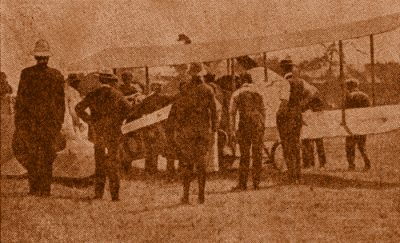
Miss Cole Leaves The Aeroplane
After Having Experienced Her First Trip in the Art of Flying, at
Elsternwick, on Friday, 13th February, 1914.
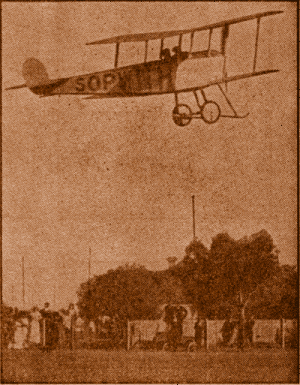
Minister Of Defence (Mr. Millen) Soars Aloft.
Page 116—Various Early Types of Aeroplanes



Page 117—Various Early Types of Aeroplanes



Page 118—Girls Names
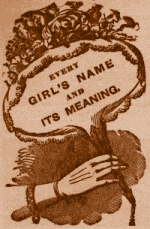
|
Girls' Names in the English Language To the Reader.—I beg to make one very important remark upon this immense variety of girl's names, and that is:—Be sure and preserve the list carefully, as it will serve from which to choose names for your daughters up to the number of 555, without using the same name over again. P.S.—If you should be very, very lucky, and have more than 555 daughters, and want more names, call on Professor Cole, at the Book Arcade, Melbourne, Australia, and he will give you an extra list.
|
|
Abigail, my father's joy
|
Be Sure And Pick A Nice Name For The Baby
Page 119—Boys Names
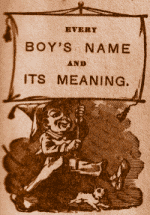
|
Boys' Names in the English Language To the Reader.—I beg to make one very important remark upon this immense variety of boy's names, and that is:—Be sure and preserve the list carefully, as it will serve from which to choose names for your sons up to the number of 555, without using the same name over again. P.S.—If you should be very, very lucky, and have more than 555 sons, and want more names, call on Professor Cole, at the Book Arcade, Melbourne, Australia, and he will give you an extra list.
|
|
Aaron, lofty, inspired
|
Look And See The Meaning Of Your Own Name
Page 120—Game Land
Cole's Game Of Hats And Bonnets
Or Husbands And Wives
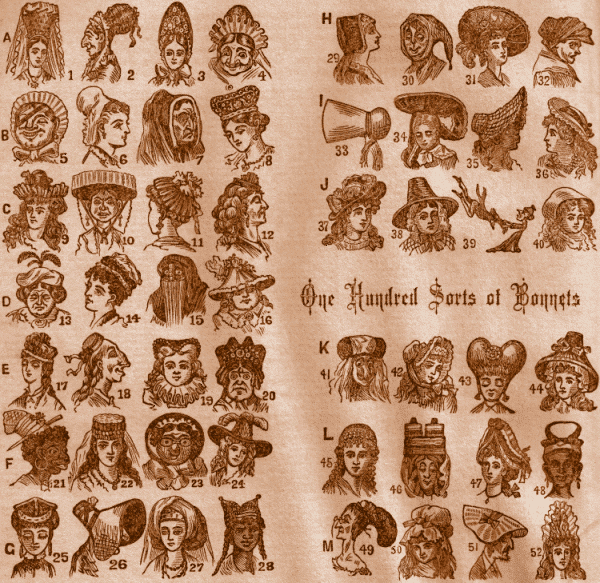
One Hundred Little Ladies
Showing the 24 various modes by which they
came into Cole's Book Arcade
|
One hundred Little ladies, All clever, learned and trained, Half WALKED in-to Cole's Book Arcade, And fifty then remained.
Fifty Thoughtful little ladies,
Forty Pretty ladies,
Thirty Famous ladies,
Twenty Wealthy ladies,
Nineteen Noble ladies,
Eighteen Royal ladies,
Seventeen Grand ladies,
Sixteen Gentle ladies,
Fifteen Modest ladies,
Fourteen Handsome ladies,
Thirteen Lovely ladies,
|
Page 121—Game Land
Cole's Game Of Hats And Bonnets
Or Husbands And Wives
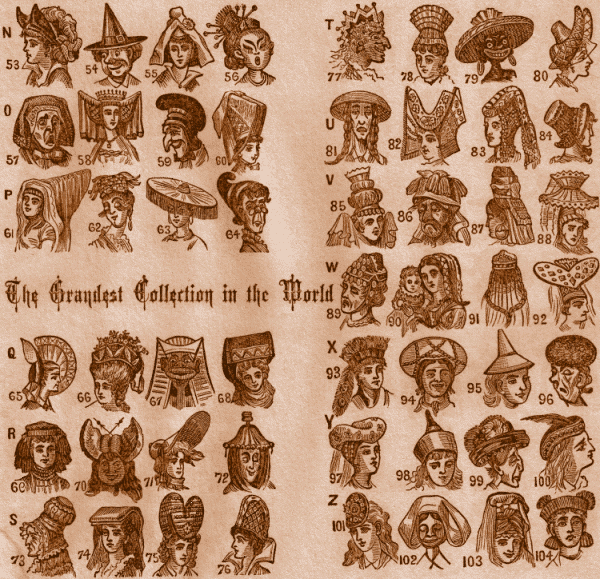
|
Twelve fine Blooming ladies, Flitting out for leaven, One FLITTED in-to Cole's Book Arcade, And then there were eleven.
Eleven Frightened ladies,
Ten most Charming ladies,
Nine most Splendid ladies,
Eight most Superb ladies,
Seven English ladies,
Six fine Irish ladies,
Five fine Scottish ladies,
Four fine Yellow ladies,
Three fine Jet-black ladies,
Two most Comic ladies,
One most Frisky lady,
|
Page 122—Game Land
Cole's Game Of Hats And Bonnets
Or Husbands And Wives
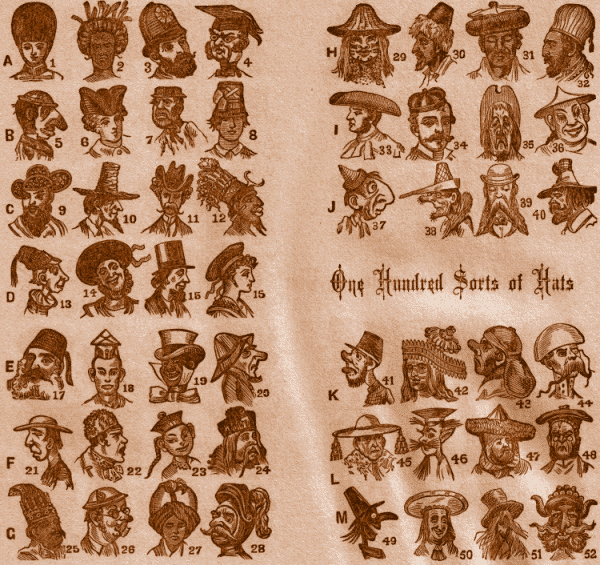
|
Be it known unto all of you that to find your own portrait and the fashion of your hat or bonnet, your Christian name and the Alphabet are used. The Alphabet is divided into four parts for the second letter of each person's name as follows:—The letters A B C D E F belong to No. 1 portrait in each row, and in the case of the first of the letter A include such names as Abigail, Ada, Aaron, Abraham, Adolphus. The letters G H I J K L belong to the second portrait in each row, and in the case of the second portrait, of the letter A include such name as Agnes, Alice, Ahaz, Alfred. The letters M N O P Q R belong to the third portrait of each row, and in the case of the letter A include such names as Amy, Anna, Arabella, Amos, Andrew, Arthur. The letters S T U V W X Y Z belong to the fourth portrait in each row, and in the case of the letter A include such names as Athalia, Augusta, Asa, Augusta. The same rule is followed with each letter of the Alphabet: for instance, the first portrait in the row B belongs to such names as Barbara, Bessie, Bartholomew, Benjamin, and so on throughout the whole collection of portraits. If a woman is looking for her future husband, she must find the number of her own portrait and then the corresponding number amongst the men's, and THAT IS TO BE HER HUSBAND: for instance, if her own portrait is No. 27, No. 27 amongst the men's is the portrait of her future darling. The same rule is to be followed by the men. If a man's portrait is No. 93, No. 93 amongst the ladies' IS TO BE HIS WIFE, his own future angel.
|
Page 123—Game Land
Cole's Game Of Hats And Bonnets
Or Husbands And Wives
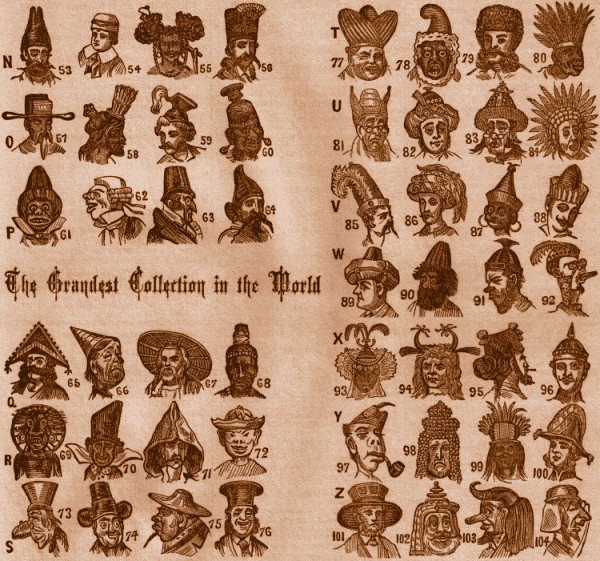
|
If the persons who consult this oracle are single, the sweetheart
that falls to their lot will be their first husband or wife, and if
they are married it will be their second husband or wife, and if they
have been married twice, it will be their third one, and so on up to
144 times of being married; and after that no one will be allowed to
consult this oracle, look at it, speak of it, or even think about it,
such objectionable persons being entirely excluded from its benefits.
Persons who consult this oracle must accept the husband or wife that falls to their lot just the same as if they married them in the usual way, but if dissatisfied on account of ugliness, dress, or any other cause the consulter, by doing penance in the shape of a pilgrimage to a certain place in the exact centre of the world and paying a small sum, can obtain a DIVORCE. The place to which the pilgrimage is to be made is Cole's Book Arcade, Bourke Street, Melbourne, Australia, where they must buy a book of some kind, and that act DIVORCES them at once. Bashful persons need not mention their pilgrimage to the Book Arcade, when they purchase the book, unless they choose. Anyone having obtained a DIVORCE will be allowed to choose out of 9 other portraits. If the number of the portrait that fell to their lot was 8, they can choose any other number ending with 8, as 18, 28, 38, 48, 58, 68, 78, 88 and 98, of if their first number was 65 they can choose from 5, 15, 25, 35, 45, 55, 75, 85, 95 and so on; whatever their number was, they may choose from the corresponding figures throughout the table. If, after making a choice out of the 9 portraits, anyone is still dissatisfied, by making 10 pilgrimages to the Book Arcade, or by buying and giving away 10 copies of this Funny Picture Book, they can claim the indulgence of a GRAND DIVORCE and choose which they like out of the whole 104 portraits. Given under our Royal hand and Seal at the Palace of the Book Arcade, this 21st day of November, 1890.—COLE, REX.
|
Page 124—Riddles And Catches
|
Why are cowardly soldiers like butter?
Why is hot bread like a caterpillar?
Why are ripe potatoes in the ground like
thieves?
Why is an acquitted prisoner like a gun?
Why is a beggar like a barrister?
Why are lawyers like scissors?
Why is a newspaper like an army?
Why is a prosy story-teller like a railway
tunnel?
Why is a dun like a woodcock?
Why is grass like a mouse?
Why is the sun like a good loaf?
Why is a plum-cake like the ocean?
Why are tears like potatoes?
Why is Queen Victoria like a hat?
What is the difference between a steep hill
and a large pill?
What is the difference between a pastry-cook
and a billsticker?
What is the difference between an auction and
seasickness?
Why is a photographic album like a drainer on
a bar counter?
Why is an interesting book like a toper's
nose?
What relation is your uncle's brother to you,
if he is not your uncle?
What is the best throw of the dice?
What tree clothes half the world?—Cotton.
Why is a dog biting his own tail like a good
manager?
Why is a dog's tail like the pith of a
tree?
Why does a dog's tail resemble happiness?
If the Devil lost his tail, where should he
go to find a new one?
What key is hardest to turn?—A donkey.
Why is a whirlpool like a donkey?
|
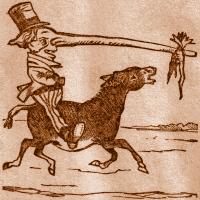
|
What is it that smells most when you go into
a chemist's shop? Your nose.
Why does a donkey prefer thistles to corn?
Why is a lollypop like a horse?
Why is a well-trained horse like a benevolent
man?
I went to a wood and got it, I sat down to
look for it, and brought it home because I could not find
it—
Why is a naughty boy like a postage stamp?
What is the difference between twice
twenty-eight and twice eight and twenty.
What grows less tired the more it works?
What is that which increases the more you
take from it?
Why is a tight boot like an oak-tree?
Who killed one-fourth of the people in the
world?
Why is a retired milkman like the whale that
swallowed Jonah?
Where was Moses when the candle went out?
Why is your ear like a band of music?
Why are book-keepers like chickens?
Why is coffee like an axe with a dull
edge?
Why is a red herring like a mackintosh?
Where are balls and routs supplied gratis?
Why is an omnibus like a medical student?
When has a person got as many heads as there
are days in the year?
What word is shorter for having a syllable
added to it?
If I shoot at three birds on a tree, and kill
one, how many will remain?
What should you keep after you have given it
to another?
Which would travel fastest—a man with
one sack of flour on his back, or a man with two sacks?
Did you ever see a bun dance on a table?
What does your ship weigh before she sets
sail?
What is an old woman like who is in the midst
of a river?
What is the difference between a
school-master and an engine driver?
Who was the first man who went round the
world?
Wanted known to all of the name of Crooks, that Cole's
Book Arcade contains 80,000 sorts of books.
|
Page 125—Riddles And Catches
|
Why is a new-born baby like a gale of
wind?
When is a baby not a baby?
Why is an infant like a diamond?
When is a soldier like a baby?
When is butter like Irish children?
Why is a church-clock like a little boy often
receiving a beating?
Why is a boy like a potato?
Why is the earth like a school
black-board?
Why does a ladies' school, out for a walk,
resemble the notes of a flute?
What tree is a lady's name?—Olive.
When do young ladies eat a musical
instrument?
Why is a four-quart jug like a lady's
side-saddle?
Why is a vain young lady like a confirmed
drunkard?
Why is a flirt like a hollow India-rubber
ball?
What is the difference between a soldier and
a fashionable young lady?
Why does an engine resemble a young lady?
If a bear were to go into a linen-draper's
shop, what would he want?
What is the difference between a bantam cock,
and a dirty housemaid?
What were the first words Adam said to
Eve?
How is it proved that woman was created
before man?
What Christian name is spelt the same way
backwards and forwards?
What is the difference between a person late
for the train and a school-mistress?
What Miss is always making blunders?
What Miss plays more tricks than a
schoolboy?
What miss occasions a great many quarrels?
What is that which ladies look for, and never
wish to find?
What is that which a man nearly always wears
in his sleep, frequently takes off and never puts on
again?
|
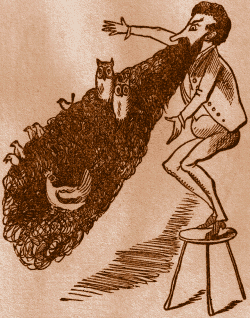
|
Remarked, "It's just as I feared; Four larks and a hen, two owls and a wren, Have all built their nests in my beard."
What is that which has neither flesh nor
bone, and yet has four fingers and a thumb?
Why are ladies' dresses about the waist like
a meeting?
How does a well-fitting bonnet lose its
identity?
What is the sweetest thing in bonnets this
season?
Why is a kiss like a rumour?
What is the difference between an accepted
and rejected lover?
Why are pretty girls like fire-works?
Why are good resolutions like fainting
ladies?
Why are lovers like apples?
Why is first love like a potato?
Which age do most girls wish to attain?
What kind of men do women like best?
What ties two people together, yet touches
one?
Why should a man never marry a woman named
Ellen?
Why is the bridegroom more expensive than the
bride?
Why are ladies like bells?
What money lasts longest when you get it?
Why is matrimony like a besieged city?
Why are some women like facts?
Why are rough seats like domineering
wives?
Why are husband and wife ten, instead of
one?
Why was the Archbishop of Canterbury like the
late Prince Consort?
Why is a nugget of gold found at Bendigo like
the Prince of Wales?
Why are ladies great thieves?
In what month do ladies talk the least?
What is the difference between ladies and
clocks?
Why is an empty room like another full of
married people?
|
|
The commonly received notion that a man may marry his first cousin, but must not marry his second is not true; but it is quite true that Cole's Book Arcade is in Bourke Street, Melbourne, about half-way between Swanston and Elizabeth Sts. The rumour that a Yankee Gentleman had invented a machine to take the noise out of thunder has turned out not to be true; but it is quite true that Cole's Book Arcade is open from nine in the morning to ten at night, every working day in the year. The fact that Cole's Book Arcade contains 80,000 sorts of books is not the cause of the sea being salt—of coca-nuts containing milk— of the growth of big gooseberries, nor of the multitude of great big fibs told annually about a sea-serpent. It is not true that cats will suck the breath of children when they are asleep, but it is quite true that Cole's Book Arcade contains one interesting cat and 80,000 sorts of interesting books. N.B.—The likeness of Cole's Cat can be seen on page 153.
|
Page 126—Riddles And Catches
|
Which is the greatest peer that England ever
produced?
What is the grandest verse in existence?
What is the greatest stand ever made for
civilisation?
What is that which, although black itself,
enlightens the world?
What is that which is full of knowledge, and
yet knows nothing?
What is that which you and every living man
have seen, but can
never see again?
What is that which no man ever did see, which
never was, but
always is to be?
What thing is that that is lower with a head
than without one?
What volume is sure to bring tears to your
eyes?
What is that which has form without
substance, and size without
weight?
Name me and you break me.
What is that which renders life inert, and
yet restores it?
Formed long ago, yet made today,
What is that which flies high, flies low,
wears shoes, and has no feet?
What is that of which the common sort is
best?
What is that which we often return yet never
borrow?
Name that bird which, if you do not, you must
die?
What is that which you cannot hold for ten
minutes although it is "as light as a feather?"
What is that which never was seen, felt, nor
heard, never was and never will be, and yet
has a name?
What is that which Adam never saw, never
possessed, and yet gave
two to each of his children?
What is that we wish for, and when we have
obtained we never know
we have it?
When is it that a person ought not to keep
his temper?
What is yours, and is used by others more
than yourself?
Can a man's pocket be empty when he's got
something in it?
What is better than presence of mind in a
railway accident?
Melbourne, Hotham, Collingwood, Prahran,
Richmond, Emerald Hill,
and Cole's Book Arcade, all begins with an A.
Why is a penny like a black cat at Cole's
Book Arcade?
|
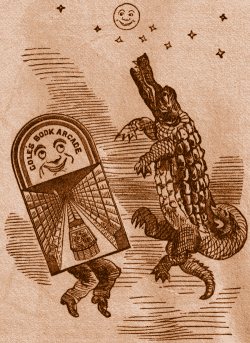
|
Because it can't jump over the moon.
Why is Cole's Book Arcade like a learned
man?
What is that which goes every morning at
eight o'clock from the
Post Office to Cole's Book Arcade, and every
evening at six
o'clock from the Parliament House to Cole's
Book Arcade, without
moving?
How many sides are there to Cole's Book
Arcade?
What are the oldest tops in the world?
Which is the oldest table in the world?
What kind of ship has two mates and no
captain?
What is that which is lengthened by being cut
at both ends?
What is that which one can divide, but cannot
see where it has
been divided?
What is that which gives a cold, cures a
cold, and pays the
doctor?
What is the worst kind of fare for a man to
live on?
What vice is it that the greatest criminals
shun?
What is that which is often found where it is
not?
What is that which we often catch hold of,
and yet never see?
What is that which is often brought to the
table, often cut, but
never eaten?
What is that which is full of holes and yet
holds water?
What window in your house is like the sun?
What word is it of five letters, of which two
being removed one only one will remain?
What is that from which if the whole be taken
some will remain?
What word contains all the vowels in their
proper order?
How would you express in one word having met
a doctor of
medicine?
Why is a nobleman like a book?
Why is the alphabet like the mail?
Why is a book like a tree?
|
|
The idea of a machine to go by perpetual motion is perpetual nonsense. Multitudes of boys and men have wasted much valuable time in trying to find it, but they never can, as it is contrary to natural laws, and therefore impossible; but one certainty of the future is, that a million useful flying machines will flit hither and thither; and one certainty of the present is, that while Cole's Book Arcade contains 80,000 sorts of books, not a single person has yet been able to come to it for a supply in a flying machine.—Laggard inventors, think of this!
N.B.—Cole once invented a flying
machine, but it wouldn't work!
|
Page 127—Riddles And Catches
|
If a man has twenty sick (six) sheep and one
of them dies, how many will remain?
Can a leopard change his spots?
Why does a piebald pony never pay a toll?
Where are you sure to find pity in the worst
of misfortunes?
Where did the witch of Endor live?
What is most like a cat's tail?
What is that which no other animal but a cat
possesses?
What is the colour of a green-plot covered
with snow?
When is a man not a man?
If a stone were thrown at you and fell into
the water, what would
it become?
What is the oldest tree in Australia?
What trees bear the most fruit for the
Market?
Why is a clock not wound up, like a
mile-stone?
What is the easiest thing for a nigger to
do?
How can you make a currant cake without
currants?
Which letters are never out of fashion?
Why is your nose like St. Paul's?
Why do white sheep furnish more wool than the
black ones?
What makes a pair of boots?
What did Adam first plant in his garden?
How can a boy make his jacket last?
She was plump and beautiful, and he was
wildly fond of her; she
hated him, yet woman-like, she strove to
catch him. What was he?
What is the difference between six dozen
dozen and half a dozen dozen?
What is that which a man can put into his
right hand but never into his left?
What is that which a man with two eyes cannot
see with one?
Spell and pronounce the word Pot, without
saying Teapot?
Cautiously start a conversation about coins,
and the ask, "Did
you ever see any of those coins two of which
make eighteen pence?"
Would you rather an elephant killed you or a
gorilla?
|
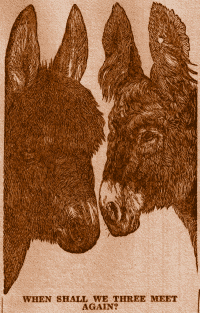
|
There was a donkey on one side of a river and some hay on the
other side. The donkey wanted the hay, but he couldn't swim over
the river, jump over it, nor cross the bridge. How could he
manage it? Do you give up? Yes.
Repeat This With A Friend
"Around the rugged rocks the ragged rascals ran a truly rural race." Repeat this five times quickly without a mistake and see what it will come to?
A room with eight corners had a cat in each corner seven cats
before each cat and a cat on every cat's tail. What was the total
number of cats?
Speaking of persons who have educated themselves, I once knew a
person who educated himself, and guess how the fellow spelt
"Cat." You could not guess in a year?
Why is a cow's tail like a swan's bosom?
When is a horse's head where it's tail should be?
What should a clergyman preach about?
Although I've neither legs not feet,
My sides are firmly laced about,
Repeat This With A Friend
King Charles 1. spoke half-an-hour after his head was cut off.
Every lady in this land
I saw a peacock with fiery tail
Come hither my heart's darling, come sit upon my knee
And deem not that a shadow has fallen across my love;
|
|
To the inhabitants of the World! Will be published shortly by E. W. COLE, if he can see his way clear, a volume containing all that has ever been written, said, or thought by mankind. Price 1s. Also, a second volume, containing all that has NOT been written, said, or thought by mankind. Price 1s. If the work can be successfully be brought out it will be a VERY, VERY, instructive one, and place E. W. COLE at the head of the literary world. To secure a copy of this valuable work Orders should be sent without delay, to COLE'S Book Arcade, Melbourne; or, to the Branch Establishments, at Sydney or Adelaide.
|
Page 128—Ten Picture Puzzles
Ten Picture Puzzles
He or She is Clever Who Discovers Nine of them,
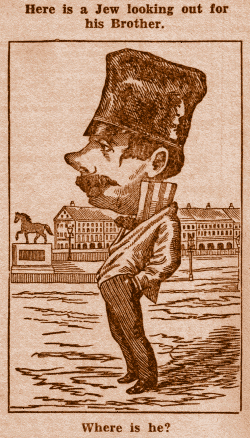
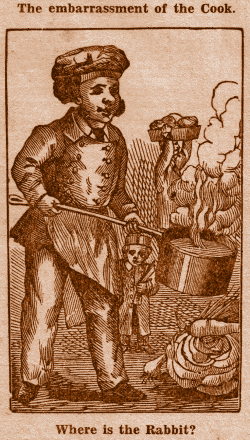
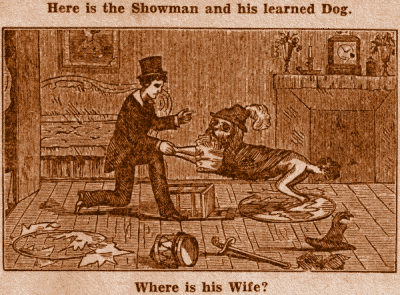
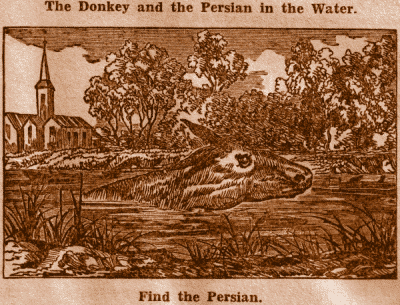
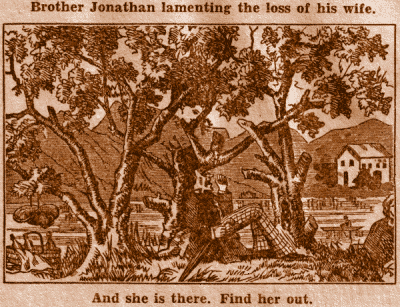
Page 129—Ten Picture Puzzles
Ten Picture Puzzles
and Exceedingly Clever Who Finds Out the Whole Ten
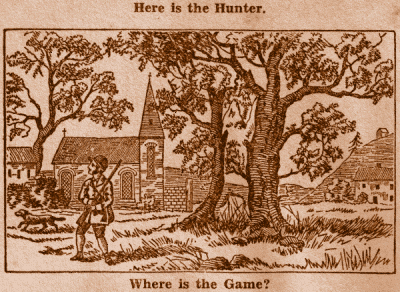
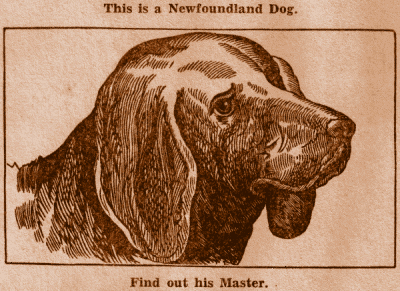
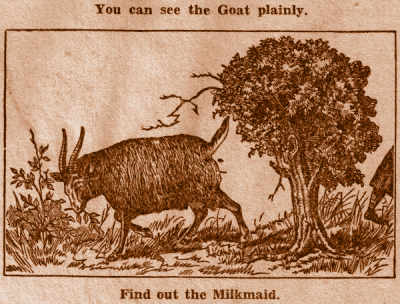
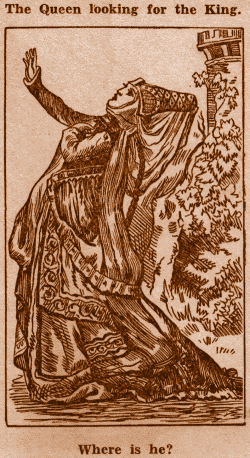
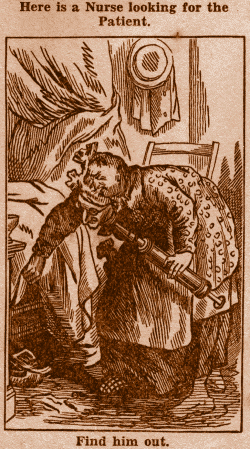
Page 130—Picture Puzzle Land
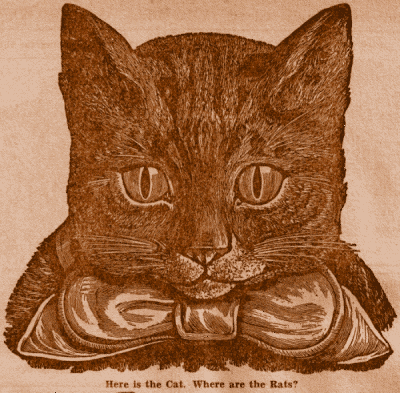
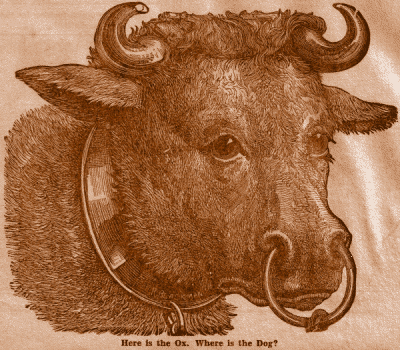
Page 131—Picture Puzzle Land
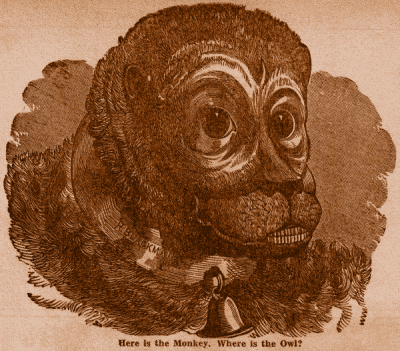
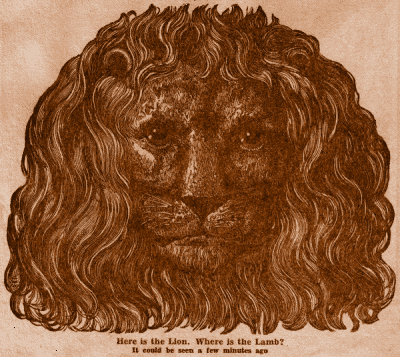
Page 132—Picture Puzzle Land
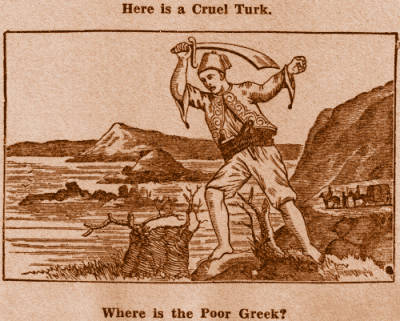
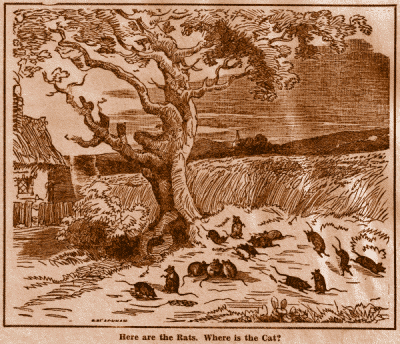
Page 133—Picture Puzzle Land
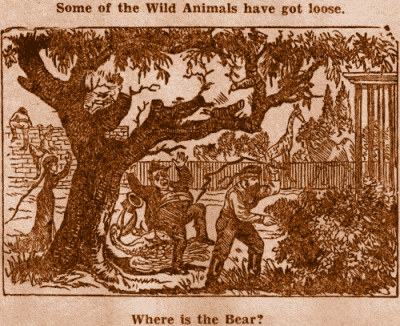
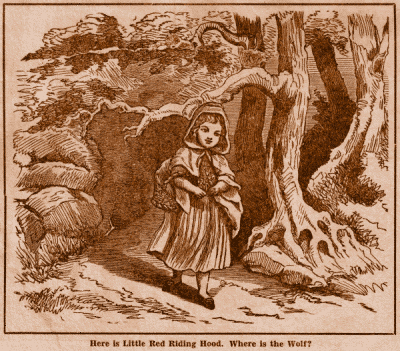
Page 134—Picture Puzzle Land
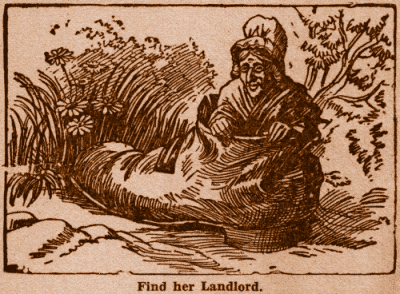
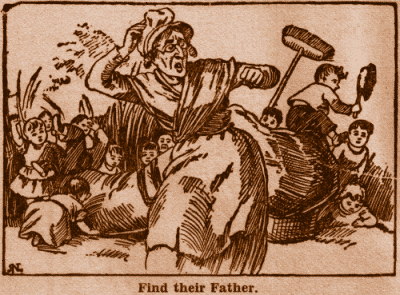
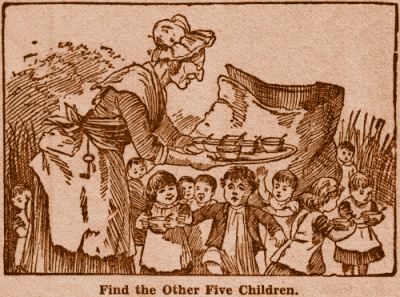
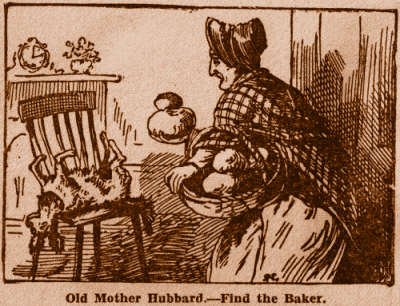
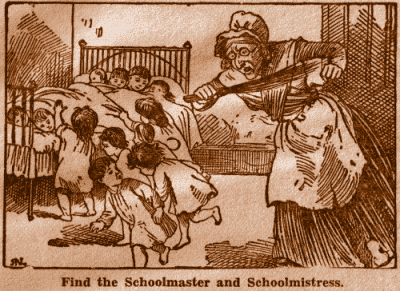
Page 135—Picture Puzzle Land
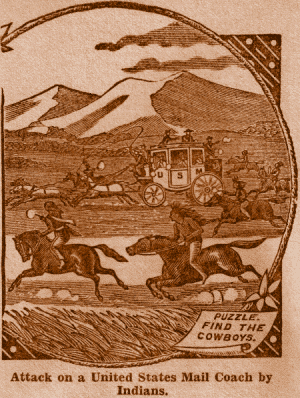
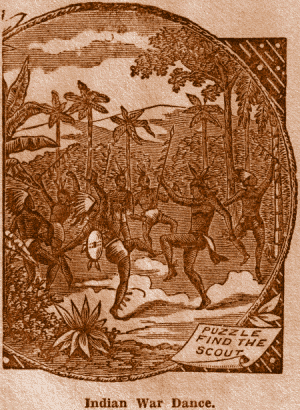
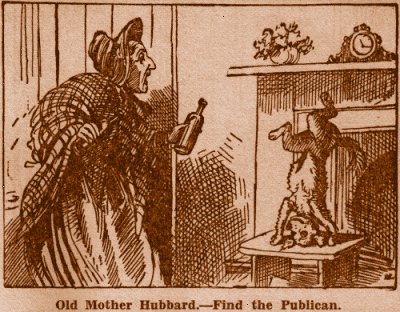
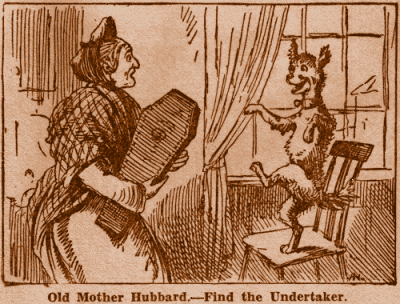
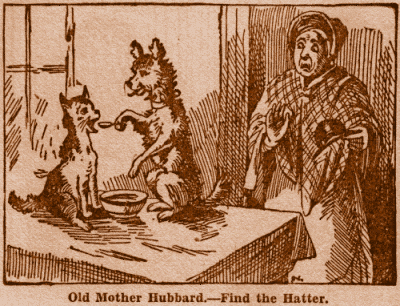
Page 136—Picture Puzzle Land
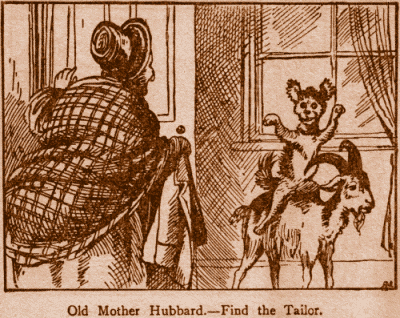
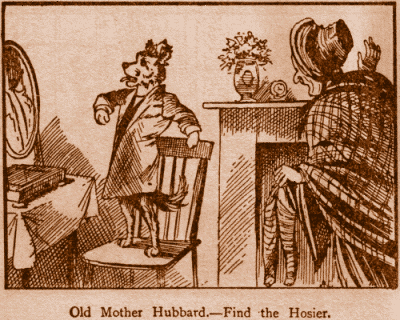
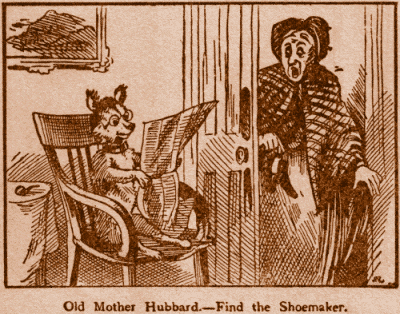
B one day drove a flock of geese,
And met with Farmer A:
Says Farmer A, "How much a piece
For this flock did you pay?"
Says B, "I paid for all I drive
Just six pounds and a crown;
And I'm going to sell them, all but five,
At yonder market town;
When fifteen pence a head I'll charge
Above what they cost me,
And thus obtain a sum as large
As I gave for all you see."
|
How many geese did B buy? How much did he give for each? and What
price did he ask?
He bought 25 geese at 5s each, and meant to ask 6s 3d each.
|
|
Oft sought in the country, much prized in the town? Like a king, above all, I can boast of a crown; If not found in the palace, I grace the chateau; Both the peer and the peasant my usefulness know. When I've not seen six months I am said to be old; Though exalted by nobles, I'm bought and I'm sold. Though ne'er in a sermon, I take part in all chat; Yet I'm ne'er found in this, but I'm always in that. I'm seen in most colours, am brown, black, or white, But am rarely found red and, when good, I am light; In demand with both sexes, selected with care, I'm prized by most men and add grace to the fair. Of no use to my owner when kept in his sight, I attend him by day, and oft serve him by night; As his slave I am passive; yet, strange it may sound, To keep me in order, I'm frequently bound. My fetters are silken; I'm useless at home, Though a constant companion whenever you roam; And, though no enchantment within me doth dwell, Pray tell me my name—for in that lies a spell!
A Hat.
The Letter A.
The Letter I.
|
Page 137—Picture Puzzle Land
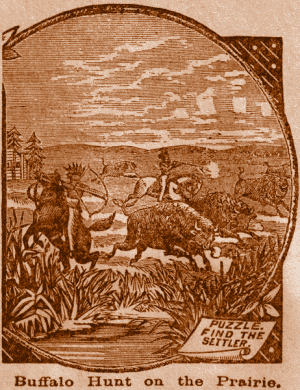
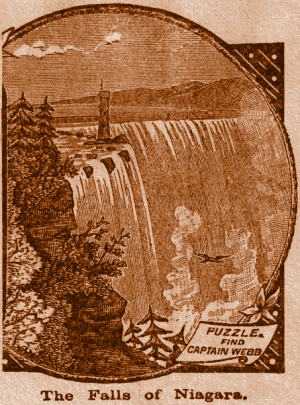
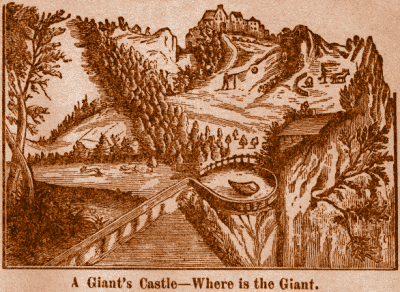
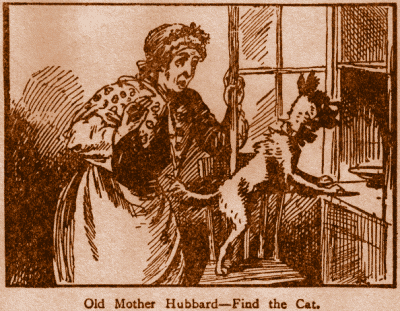
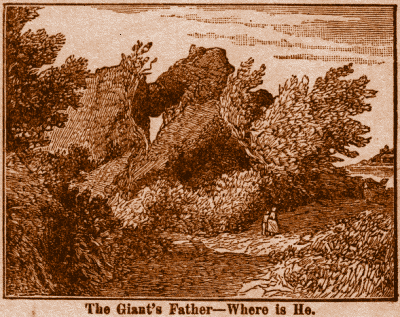
Page 138—Picture Puzzle Land
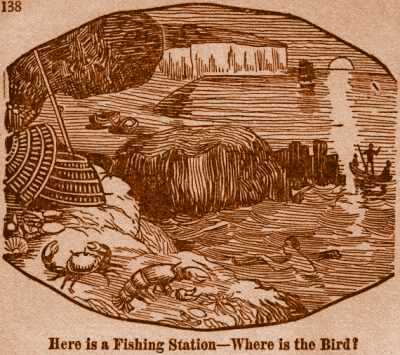
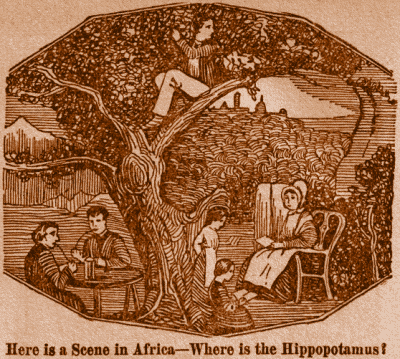
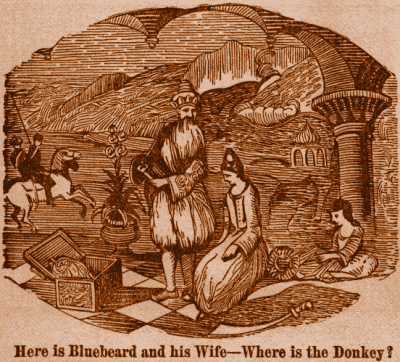
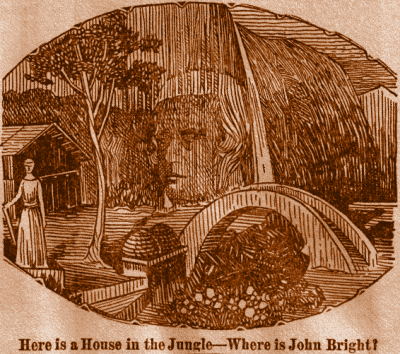
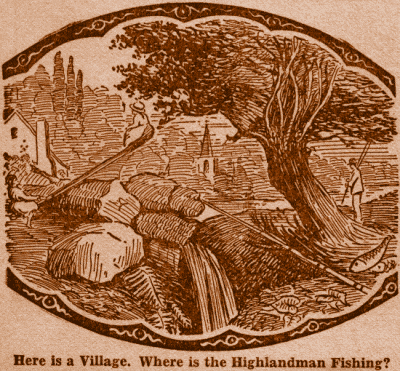
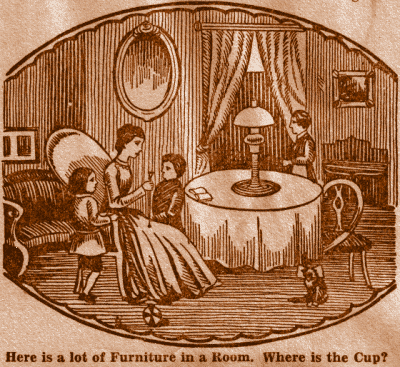
Page 139—Picture Puzzle Land
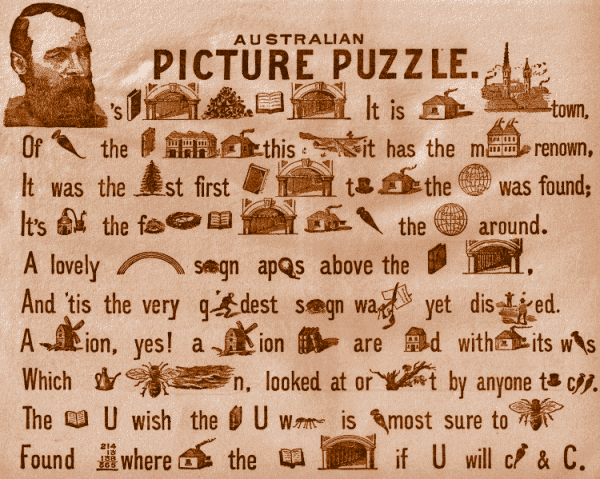
Page 140—Picture Puzzle Land
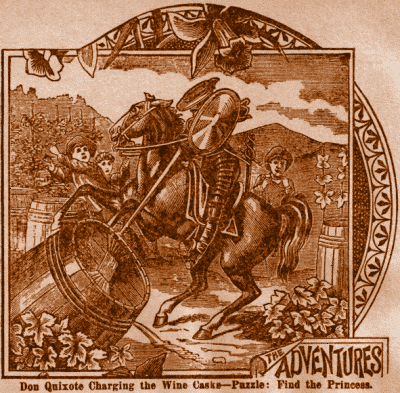
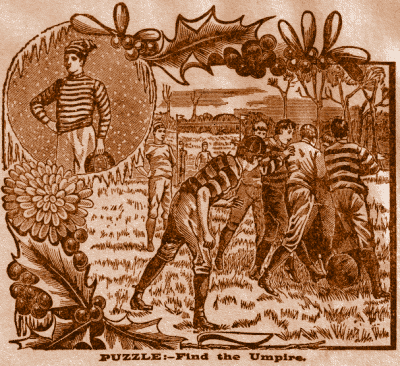
Page 141—Picture Puzzle Land
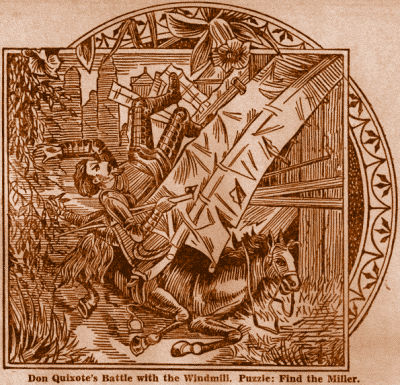
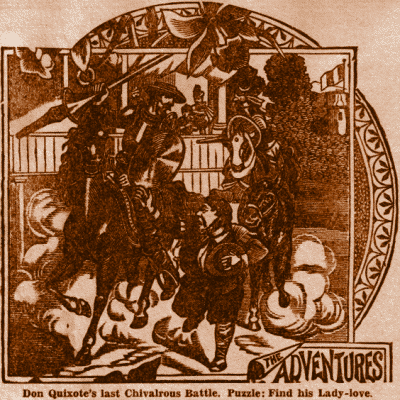
Page 142—Picture Puzzle Land
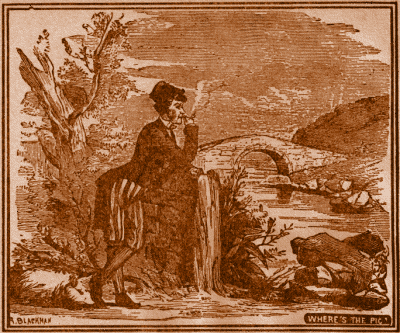
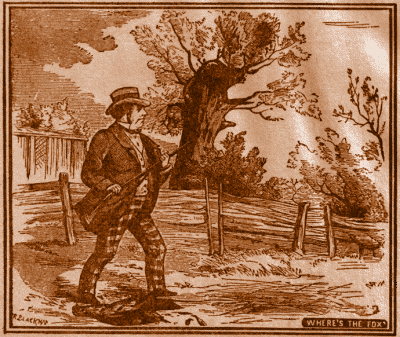
Page 143—Picture Puzzle Land
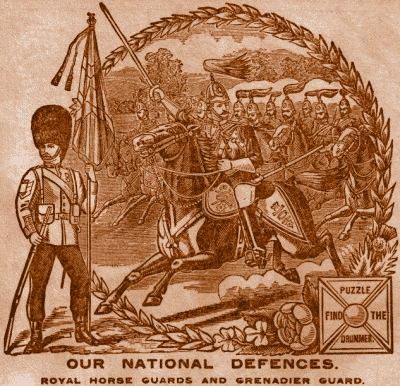
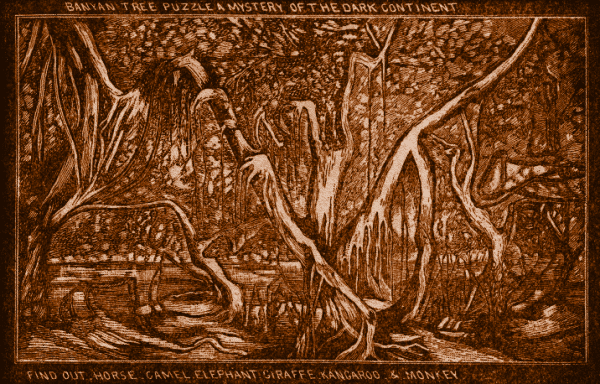
Page 144—Shadows On The Wall
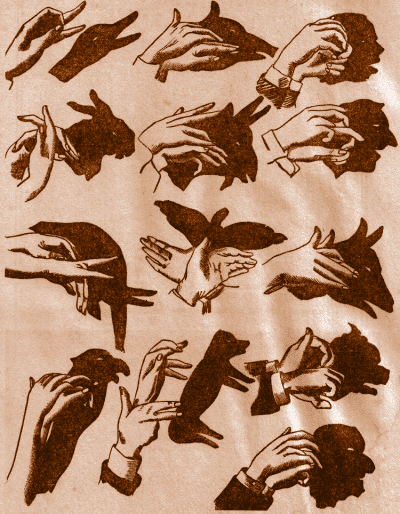
|
This game is a kind of Magic Lantern Exhibition. It is very
Interesting, always pleases the children, and is very easily learnt,
and for amusing poor, sick children it is invaluable.
|
Page 145—The Deaf And Dumb Alphabet
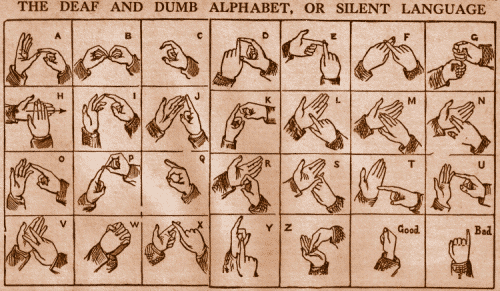
|
The Alphabet of HAND-SIGNS is a great blessing to deaf and dumb
persons, enabling them to converse almost as efficiently as others
can by the organs of speech. It is also extensively used throughout
the world as a useful accomplishment by those who are not deaf and
dumb, and besides it has this recommendation:—It is the most
easily
learnt language in the world.
|
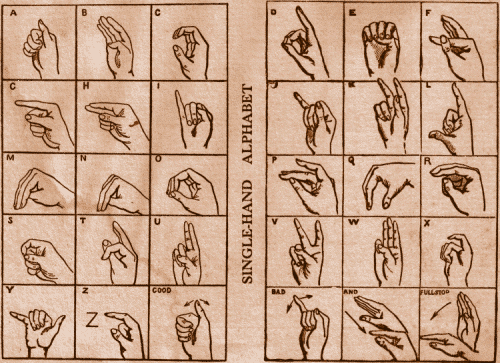
Page 146—Language Of Flowers
|
The language of flowers in pre-eminently the language of refined and modest Courtship; millions have conveyed a message by presenting a flower which they dare not have uttered in their mother tongue. In some countries this "LANGUAGE OF LOVE" is extremely common in the words of the poet:
They tell the tale of Affection in Flowers." |
|
Abatina, Fickleness Abecedary, Volubility Acacia, Friendship Acacia, Rose, Elegance Acacia, Yellow, Secret Love Acanthus, The Fine Arts Acalia, Temperance Achillea Millefolia, War Achimenes, Such worth is rare Aconite, Misanthropy Adonis, Flos, Sad memories Agnus Castos, Coldness Agrimony, Thankfulness Almond (common), Indiscreet Almond (flowering), Hope Almond, Laurel, Perfidy Allspice, Compassion Aloe, Affliction Amaranth (Globe), Immortal Amaranth (Cockscomb), Foppery Amaryllis, Splendid Beauty Ambrosia, Love returned American Elm, Patriotism American Linden, Matrimony Amethyst, Admiration Andromeda, Self-sacrifice Anemone (Garden) Forsaken Angelica, Inspiration Angrec, Royalty Apricot Blossom, Doubt Apple, Temptation Apple Blossom, Preference Apple, Thorn, Deceitful Character Arbor Vitae, Live for me Arum (Wake Robin), Zeal Ash, Mountain, Prudence Ash Tree, Grandeur Aspen Tree, Lamentation Asphodel, My Regrets Follow Auricula, Painting Auricula (Scarlet) Avarice Austurtium, Splendour Azalea, Temperance Bachelor's Buttons, Celibacy Balm, Sympathy Balm (Gentle), Pleasantry Balm of Gilead, Cure Balsam, Yellow, Impatience Barberry, Sharpness of temper Basil, Hatred Bay Berry, Instruction Bay Leaf, I change but in death Bay Tree, Glory Bay Wreath, Reward of merit Bearded Crepis, Protection Beech Tree, Prosperity Bee Orchis, Industry Bee Ophrys, Error Begonia, Deformity Belladonna, Silence. Hush! Bell Flower (White) Gratitude Betony, Surprise Bilberry, Treachery Bindweed, Great Insinuation Bindweed, Small, Humility Birch, Meekness Bittersweet, Truth Blackthorn, Difficulty Bladder Nut Tree, Amusement Bluebell, Sorrowful Regret Bonus Henricus, Goodness Borage, Bluntness Box Tree, Stoicism Bramble, Lowliness Broom, Neatness Buckbean, Calm repose Buglos, Falsehood Bulrush, Indiscretion Bundle of Reeds, Music Burdock, Touch me not Bur, You weary me Buttercup, Childishness Butterfly Orchis, Gaiety Butterfly Weed, Let me go Cabbage, Profit. Gain Cacalia, Adulation Cactus, Warmth Calycanthus, Benevolence Camellia, Red, Excellence Camellia, White, Loveliness Camomile, Energy in adversity Carnation, Striped, Refusal Carnation, Deep Red, Poor me Cardamine, Paternal error Candytuft, Indifference Canary Grass, Perseverance Campanula, Aspiring Carnation, Yellow, Disdain Cardinal Flower, Distinction Catchfly, Selene, False love Catchfly, Red, Youthful love Catchfly, White, Betrayed Cattleya, Mature charms Cedar, Strength Cedar of Lebanon, Incorruptible Cedar Leaf, I live for thee Celandine, Joys to come Centaury, Bluebottle, Felicity Champignon, Suspicion Cherry Tree, Good education Chestnut Tree, Do me justice Chinese Primrose, Lasting love Chickweed, Rendezvous Chicory, Frugality China Aster, Afterthought China Aster, Double, I agree China Aster, Single, I will think if it Chrysanthemum, Red, I love Chrysanthemum, White, Truth Chrysanthemum, Yellow, Slighted Love Cineraria, Always delightful Cinquefoil, Maternal Affection Circaea, Spell Cictus, Popular favour Citron, Ill-natured beauty Clematis, Mental beauty Clematis, Evergreen, Poverty Clianthus, Worldliness Clotbur, Rudeness Clover, Four-leaved, Be mine Clover, Red, Industry Clover, White, Think of me Cloves, Dignity Cobaea, Gossip Columbine, Folly Columbine, Red, Fearful Convolvulus, Bonds Convolvulus, Blue, Repose Convolvulus, Pink, Hopeless Coreopsis, Always Cheerful Coriander, Hidden worth Corn, Riches Corn Bottle, Delicacy Corn Cockle, Gentility Cornel Tree, Duration Coronella, Success to you Cosmelia, Charm of a blush Cowslip, Winning grace Crab (Blossom), Ill-nature Cranberry, Cure headache Cress, Stability Crocus, Cheerfulness Crocus, Saffron, Mirth Crown Imperial, Power Crowsbill, Envy Crowfoot, Ingratitude Cuckoo Plant, Ardour Cudweed, Remembrance Cuscuta, Meanness Cyclamen, Diffidence Cypress, Death Daffodil, Yellow, Regard Dahlia, Instability Daisy, Innocence Daisy, Michaelmas, Farewell Daisy, Variegated, Beauty Daisy, Wild, Will think of it Dandelion, Love's oracle Daphne, Glory Dew Plant, A serenade Dianthus, Make haste Dipteracanthus, Fortitude Diplademia, You are too bold Dittany, Pink, Birth Dittany, White, Passion Dock, Patience Dodder of Thyme, Baseness Dogsbane, Falsehood Dogwood, Durability Dragon Plant, Snare Dragonwort, Horror Dried Flax, Usefulness Ebony, Blackness Echites, Be Warned in Time Elder, Zeal Elm, Dignity Endive, Frugality Escholzia, Do Not Refuse Me Eupatorium, Delay Evergreen Thorn, Solace Fern, Flowering, Magic Fern, Sincerity Fever Root, Delay Fig, Argument Fig Marigold, Idleness Fig Tree, Prolific Filbert, Reconciliation Fir, Time Fir, Birch, Elevation Flax, I Feel Your Kindness Fleur-de-lis, I burn Fleur-de-Luce, Fire Fly Orchis, Error Flytrap, Deceit Fools Parsley, Silliness Forget-me-not, Forget-me-not Foxglove, Insincerity Foxtail, Grass, Sporting Frog Ophrys, Disgust Fumitory, Spleen Fuchsia, Scarlet, Taste Furze, Love for all Seasons Garden Chervil, Sincerity Gardenia, Refinement Geranium, Dark, Melancholy Geranium, Horse-show Leaf, Stupidity Geranium, Ivy, Bridal Favour Geranium, Lemon, Unexpected Meeting Geranium, Nutmeg, Expected Meeting Geranium, Oak-leaved, True Friendship Geranium, Variegated, Ingenuity Geranium, Rose-scented, Preference Geranium, Scarlet, Comforting, Kindness Geranium, Silver-leaved, Recall Geranium, Wild, Steadfast Piety Gladioli, Ready Armed Glory Flower, Glorious Beauty Goat's Rue, Reason Golden Rod, Encouragement Goosefoot, Goodness Gooseberry, Anticipation Gourd, Extent, Bulk Grape, Wild, Rural Felicity Grass, Utility Hand Flower Tree, Warning Harebell, Submission Hawkweed, Quicksightedness Hawthorn, Hope Hazel, Reconciliation Heart's-ease, Thought Heath, Solitude Helenium, Tears Heliotrope, I Turn to Thee Hellebore, Scandal Hemlock, You will be my death Hemp, Fate Henbane, Imperfection Hepatica, Confidence Hibiscus, Delicate Beauty Holly, Foresight Holy Herb, Enchantment Hollyhock, Fecundity Honesty, Honesty Honey Flower, Love, Sweet Honeysuckle, Affection Hop, Injustice Horehound, Fire Hornbeam, Ornament Horse, Chestnut, Luxury Hortensia, You are Cold Houseleek, Vivacity Houstonia, Content Humble Plant, Despondency Hyacinth, Sport, Game, Play Hyacinth, Purple, Adversity Hyacinth, Blue, Constancy Hydrangea, A Boaster Hyssop, Cleanliness Iceland Moss, Health Ice Plant, You Freeze Me Imbricata, Uprightness Imperial Montague, Power Indian Cress, Warlike Trophy Indian Jasmine, Attachment Iris, Common, Message Iris, German, Flame Ivy, Marriage Jacob's Ladder, Come Down Jasmine, White, Amiability Jasmine, Cape, Too Happy Jasmine, Carolina, Separation Jasmine, Spanish, Sensuality Jasmine, Yellow, Grace Judas Tree, Betrayal Juniper, Succour Justicia, Perfection Kennedia, Mental Beauty Kingcups, Desire of Riches Laburnum, Pensive Beauty Lady's Slipper, Win Me Lagerstroemia, Eloquence Lantana, Rigour Larch, Audacity Larkspur, Lightness, Levity Larkspur, Double, Happiness Larkspur, Pink, Fickleness Larkspur, Purple, Haughtiness Laurel, Glory Laurel, Common, Perfidy Laurel, Ground, Perseverance Laurel, Mountain, Ambition Lavender, Distrust Leaves, Dead, Sadness Lemon, Zest Lemon Blossom, Fidelity Lettuce, Cold-heartedness Lichen, Dejection Lilac, Field, Humility Lilac, White, Innocence Lily, Day, Coquetry Lily, Imperial, Majesty Lily, White, Purity Lily, Yellow, Falsehood Linden, Conjugal Love Lint, I feel my obligations Liverwort, Confidence Lobelia, Malevolence Locust, True, Elegance London, Pride, Frivolity Lote Tree, Concord Lotus, Eloquence Lotus Flower, Estranged Love Lotus Leaf, Recantation Love in a Mist, Perplexity Love Lies Bleeding, Desertion Lucurn, Life Lupine, Voraciousness Madder, Calumny Magnolia, Love of Nature Maiden Hair, Secrecy Mallow, Wildness Mallow, Marsh, Beneficence Marrow, Syrian, Persuasion Manchineal Tree, Duplicity Mandrake, Rarity Maple, Reserve Marianthus, Hope for Better Marigold, Grief, Chagrin Marigold, French, Jealousy Marigold and Cyprus, Despair Marjoram, Blushes Marvel of Peru, Timidity Meadow Lychnis, Wit Meadowsweet, Uselessness Mercury, Goodness Mesembryanthemum, Idleness Mezereon, I Desire to Please Mignonette, You are Good Milfoil, War Milkwort, Hermitage Mint, Virtue Mistletoe, I Surmount Mock Orange, Counterfeit Monkshood, Deadly Foe Near Moonwort, Forgetfulness Morning Glory, Affectation Moschatel, Weakness Moss, Maternal Love Mosses, Ennui Motherwort, Concealed Love Moving Plant, Agitation Mulberry, White, Wisdom Mushroom, I Can't Trust You Musk Plant, Weakness Myrobalan, Privation Myrrh, Gladness Myrtle, Love Narcissus, Egotism Nasturtium, Patriotism Nemophila, Success Nettle, Stinging, You Spiteful Nettle Burning Slander Nettle Tree, Conceit Night Convolvulus, Night Nightshade, Dark Thoughts Oak (Live), Liberty Oak Leaves (Dead) Bravery Oats, Harmony Oleander, Beware Olive, Peace Orange Blossoms, Purity Orange Flowers, Chastity Orange Tree, Generosity Orchis, Common, a Beauty Osier, Frankness Osmunda, Dreams Ox-eye, Patience Palm, Victory Pansy, I think of you Parsley, Festivity, Feasting Passion Flower, Superstition Pea, Common, Respect Pea, Everlasting, A meeting Peach, Matchess Charms Peach Blossom, Your Captive Pear, Affection Pear Tree, Comfort Pennyroyal, Flee away Peony, Shame, Bashfulness Peppermint, Warm Feeling Periwinkle, Early Friendship Persicaria, Restoration Peruvian Heliotrope, Devotion Petunia, Keep your Promise Pheasant's Eye, Remembrance Phlox, Unanimity Pigeon Berry, Indifference Pimpernel, Change Pine, Black, Pity Pine-apple, You are perfect Pine, Pitch, Philosophy Pink, Boldness Pink, Indian, Always lovely Pink, Indian, S. Aversion Pink, Mountain, Aspiring Pink, Red, Single, Pure Love Pink, Variegated, Refusal Pink, White, Ingeniousness Pink, Yellow, Disdain Plantain, What Man's Footstep Plane Tree, Genius Plum, Indian, Privation Plum Tree, Fidelity Plum, Wild, Independence Polyanthus, Pride of Riches Polyanthus, Crimson, Mystery Pomegranate, Foolishness Pomegranate, Flower, Elegance Poor Robin, Compensation Poplar, Black, Courage Poplar, White, Time Poppy, Red, Consolation Poppy, Scarlet, Fantastic Folly Poppy, White, Sleep—My Bane Potato, Benevolence Prickly Pear, Satire Pride of China, Dissension Primrose, Early Youth Primrose, Evening, Inconstance Primrose, Red, Unpatronized Privet, Prohibition Purple Clover, Provident Pyrus Japonica, Fairies' Fire Quaking Grass, Agitation Quamoclit, Busybody Queen's Rocket, Fashion Quince, Temptation Ragged Robin, Wit Ranunculus, Are Charming Ranunculus, Wild, Ingratitude Raspberry, Remorse Ray-Grass, Vice Reed, Complaisance Reed, Split, Indiscretion Rhododendron, Danger Rhubarb, Advice Rocket, Rivalry Rose, Love Rose, Australian, All that is Lovely Rose, Bridal, Happy Love Rose, Burgundy, Unconscious Beauty Rose, Cabbage, Ambassador of Love Rose, Campion, Deserve my Love Rose, Carolina, Love is dangerous Rose, China, Beauty Unfading Rose, Daily, I Aspire to thy Smile Rose, Damask, Beautiful Complexion Rose, Deep Red, Bashful Modesty Rose, Dog, Pleasure and Pain Rose, Guelder, Age Rose, Hundred-Leaved, Pride, Dignity Rose, Japan, Beauty only Rose, Maiden Blush, Show me Love Rose, Multiflora, Grace Rose, Moss, Superior Merit Rose, Mundi, Variety, Uncertain Rose, Musk, Capricious Beauty Rose, Musk, Cluster, Charming Rose, Thornless, Happy Union Rose, Unique, Call me not beautiful Rose, White, I am Worthy of You Rose, White, Withered, Infidelity Rose, Xmas, Relieve my anxiety Rose, Yellow, Jealousy Rose, York and Lancaster, War Rose, White & Red together, Unity Roses, Crown of, Reward of Rosebud, Red, Pure & Lovely Rosebud, White, Girlhood Rosebud, Moss, Confession of love Rosemary, You ever Revive Rudbeckia, Justice Rue, Scorn, Despite Rush, Docility Rye-grass, Changeable Saffron, Shun Excess Sage, Domestic Virtue Sainfoin, Agitation St. John's Wort, Animosity Salvia, Blue, Wisdom Salvia, Red, Energy Saxifrage, Mossy, Affection Scabious, Unfortunate Love Scabious, Sweet, Widowhood Scarlet Lychnis, Brilliant Eye Shinus, Religious Enthusiasm Sensitive Plant, Sensitiveness Senvy, Indifference Shamrock, Light-heartedness Snakesfoot, Horror Snapdragon, "No." Snowball, Bound Snowdrop, Hope Sorrel, Wild, Wit Ill-timed Sorrel, Wood, Joy Sothernwood, Jest, Bantering Spearmint, Warm, Sentiment Speedwell, Female Fidelity Speedwell, Spiked, Semblance Spider, Ophrys, Adroitness Spiderwort, Esteem, not Love Star of Bethehem, Guidance Starwort, Afterthought Stock, Lasting Beauty Stock, Ten-week, Promptness Stonecrop, Peace Straw, Broken, Quarrel Straw, Whole, Union Strawberry Blossom Perfect Strawberry Tree, Esteem, not Love Sultan, Lilac, I Forgive You Sultan, White, Sweetness Sultan, Yellow, Contempt Sumach, Venice, Intellectual Sunflower, Dwarf, Adoration Sunflower, Tall, Haughtiness Swallow-wort, Cure Heartache Sweet Basil, Good Wishes Sweetbrier, I wound, but love Sweet Flag, Yellow, Fitness Sweet Pea, Delicate Pleasures Sweet Sultan, Felicity Sweet William, Gallantry Sycamore, Curiosity Syringa, Memory Tamarisk, Crime Tansy, I war against you Teasel, Misanthropy Thistle, Common, Austerity Thistle, Fuller's, Misanthropy Thistle, Scotch, Retaliation Thorns, Branch of, Severity Thrift, Mutual Sensibility Throatwort, Neglected Beauty Thyme, Activity Toothwort, Secret Love Traveller's Joy, Safety Tree of Life, Old Age Trefoil, Revenge Tremella Nestoc, Resistance Trillium Pictum, Modest Beauty Truffle Surprise Trumpet, Flower, Fame Tuberose, Dangerous Pleasure Tulip, Red, Declaration of Love Tulip, Tree, Fame Tulip, Variegated, Beautiful Love Tulip, Yellow, Hopeless Love Turnip, Charity Valerian, I Wish to Please Valerian, Greek, Rupture Venus's Car, Fly with Me Venus's Looking Glass, Flattery Venus's Trap, Artifice Verbena, Pink, Family Union Verbena, Purple, I Weep for You Verbena, Scarlet, Unite Against Evil Verbena, Sweet-scented, Sensibility Verbena, White, Pray for Me Vernal Grass, Poor but Happy Veronica, Fidelity Veronica, Speciosa, I Dare Not Vetch, Shyness Vine, Intoxication Violet, Blue, Faithfulness Violet, Dame, Watchfulness Violet, Purple, Ever in My Mind Violet, White, Modesty Violet, Yellow, rural happiness Virginia Creeper, I cling to you Virgin's Bower Filial Love Viscaria oculata, dance with me Volkamenia, may you be happy Walnut, Intellect Wall-flower, Fidelity Water Lily, Purity of Heart Water Melon, Bulkiness Wax Plant, Susceptibility Wheat Stalks, Riches Whin, Anger Whortleberry, Treason Willow, creeping, Love forsaken Willow, Water, Freedom Willow, Weeping, Mourning Willow Herb, Pretension Woodbine, Fraternal Love Wormwood, Absence Xanthium, Pertinacity Yew, Sorrow
|
|
Flowers smell the sweetest and look the loveliest of all earthly
things, and most men and woman throughout the World dearly love them,
and hope to dwell beyond the grave where "Everlasting Spring abides,
and NEVER WITHERING FLOWERS".
|
Page 147—Kindness To Animals
|
Thousands of pathetic tales could be told of the sufferings of poor dumb animals and the sympathy of some kind human souls for them. The following one is from the Secretary of a Humane Society:— The wife of a small country farmer wrote to me: "I can't bear sending the cattle to market. I always keep out of the way, for every animal on the place knows me, and they look at me so sadly, and, knowing what they're going to, I feel sometimes that I'd rather give the whole thing up, than go on rearing them to be knocked about and killed. "I went to the market once myself to see a young beast being sold, but I'll never go again. I had fed it with my own hands every day, till it was like a child. I went to the market-town by train, and the young bullock was driven by road. I walked a little way out to meet it, and at last met it coming tramping along, and the drover told me he had had the greatest difficulty to get it along the last few miles; it had become so tired. You see it had not had much exercise, as when you are fattening things, it does not do to let them run about too much, or they'll 'run all the meat off their bones' again, as the saying is. "When I went to Smithfield, I was ready to faint as I saw the men shouting and swearing, and slashing away with thick sticks. The poor things were so confused and knocked about that they didn't know what to do, and I went up to the man who seemed to be in charge of the pens that our auctioneer was going to sell from, and asked him if he would be kind to my poor bullock when it came. He only cursed it an laughed a mocking laugh, and said, 'Oh, yes, ---- it, I'll be gentle with it. You wait, missis, and see! Do you think I'm here to coddle any ---- beasts? If you do, you're ---- well mistaken.' "I couldn't bear to see what would happen. I couldn't stand it, so I went away, and then the men (dealers) simply stood and talked, and haggled with the farmers; and the drovers shouted and yelled, and hooted, and knocked the things about, and hit them on the nose and over the eyes, and poked and prodded them with sharp pointed sticks; and the dogs yapped and barked, and I never heard a single word of pity, or saw a sign of pity for the poor, tired, bruised, panting, and terrified creatures. "It was a terribly hot day, and I wandered about the town all the afternoon, able to think of little else than of my poor bullock, and of what had become of it, when, as I was going to the station to my train, I met three or four cattle coming driven along. Suddenly one of them caught sight of me, and in spite of all the men could do came rushing up towards me. It was my poor bullock; but, oh, so terribly altered. I should hardly have known it. "It seemed beside itself with joy to see me, and stood by me lowing so pitifully, as much as to say, 'Oh, I'm so glad I've found you! I know I'm safe now, and you won't let these awful men carry me off again'. "At last they managed to get it to move on by flogging it savagely, and, heart-sick and conscience-smitten, I went to the station; and when I got the money that it was sold for it seemed to me like 'the price of blood.' But what can I do? "I suppose the proper thing is to get hardened and to think nothing about it, like other people; but it is so dreadful that I can never go to market to see another of my poor beasts sold."
Miss Frances Power Cobbe gave herself, heart and soul, to the defence of the animals, not because she loved them more than human beings but because she could not bear to see the men acting so wickedly towards them, nor to hear the groans of the helpless victims. In the account of her life, written by herself, she says: "It is not the four legs nor the silky or shaggy coat of a dog which should prevent us from discerning his inner nature of thought and love; limited thought, it is true, but an unlimited love. That he is dumb, is to me only another claim (as it would be in a human child) on my consideration... Another dog, whom I sent away at one year old to live in the country, was returned to me eight years afterwards old and diseased. The poor beast knew me again after a few moments' eager examination, and uttered an actual scream of joy when I called her by name, exhibiting every token of tender affection for me ever afterwards." In her books entitled "Dogs whom I Have Met," she says: "The dog who really loves his master delights in mere propinquity, likes to lie down on the floor resting against his feet, better than on a cushion a yard away, and after a warm interchange of caresses for two or three minutes asks no more, and subsides into perfect contentment. That a short tender touch of the dog's tongue to hand or face corresponds exactly, as an expression of his feelings, to our kisses of affection, there can be no sort of doubt. All dogs kiss the people they love." Tennyson, when on a visit to Miss Cobbe, bade her go bravely on as she had begun, and "fight the good fight," by which he meant the warfare against cruelty in which she was engaged. After his death it was sad to hear the wail of three dogs, a collie, a Scotch terrier, and a Russian wolf-hound, constant companions and friends of the poet. Thousands of dogs have pined, and died of grief, for their loved masters.
The following is a pathetic narrative entitled "El Moro." A Cadiz letter says: "Notice had been posted on all the public places that on a certain day the bull called 'El Moro' would be introduced into the arena, and that, when he should have been goaded to the utmost fury, a young girl would appear and reduce the animal to quiet subjection. The people of Cadiz had heard of 'El Moro' as the most magnificent bull ever brought into the city, and it soon became known that the girl just advertised was a peasant girl of Espara, who had petted the bull, and fed it and cared for it during the years of it's growth. On the appointed day the vast amphitheatre was filled with an anxious, eager crowd. Several bulls had been killed and dragged away, and then the flourish of trumpets announced the coming of the hero of the day. With a deep, terrific roar, 'El Moro' entered upon the scene. He was truly magnificent; a bovine monarch, black and glossy, with eyes of fire, dilating nostrils, and wicked-looking horns. The picadores attacked him warily, hurling their banderillos (small, dart-like javelins ornamented with ribbons, and intended to jade and infuriate). The bull had killed three horses offhand, and had received eight banderillos in his neck and shoulders, when, upon a given signal, the picadores and matadores suddenly withdrew leaving the infuriated beast alone in his wild paroxysm of wrath. Presently a soft musical note, like the piping of a lark, was heard, and directly afterwards a girl of not more than fifteen years of age, an the tasteful garb of an Andalusian peasant, and with a pretty face, sprang lightly into the arena, approaching the bull fearlessly, at the same time calling his name—'Moro! Moro! Va voy!' At the first sound of the sweet voice the animal ceased his fury, and turned towards the place whence it came, and, when he saw the girl, he plainly manifested pleasure. She came to his head, and put forth her hand, which he licked with his tongue. Then she sang a low, sweet song, at the same time caressing the animal by patting him on the forehead, and, while she sang, the suffering monarch kneeled at her feet. Then she stooped and gently removed the cruel banderillos, after which, with her arms around 'El Moro's' neck, she led him towards the gate of the torril."
|
Page 148—Funny Australian Natives
|
|
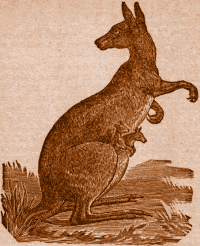
|
The Kangaroo is the largest native animal in Australia. He is about 5 feet high when he sits up, he has a head somewhat like a rabbit's, his hands or fore feet are small but his hind feet are large, and he has a very thick tail. He can kick and tear with his sharp hind claws in a very dangerous manner. He frequently kills dogs with his claws, but, when he is chased by dogs, if he is near water he makes for it and often drowns the dogs if they come into the water after him. He leaps or hops about 15 feet at a time and goes very fast. The mother carries her young in a pouch, as seen in the picture, and when the baby kangaroos are frightened they run at once into their mother's pouch for safety, like any other babies running to their mother.
|
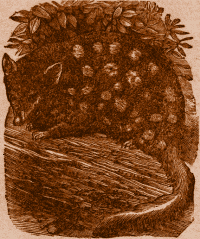
|
It is a wild Cat, generally brown or black with many large and small white spots on it. It lives on small animals, including birds and their eggs, and is a great pest to farmers, killing their poultry.
|
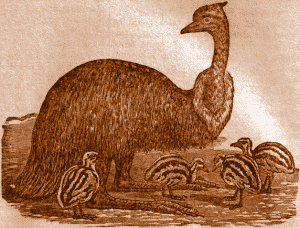
|
The Emu lives upon vegetable food such as fruits, roots, and grass. It has a great curiosity and is easily tamed. It is very inoffensive except when violently attacked; then it kicks like a horse. It is said that its kick will break a man's leg. Its flesh is eaten by the natives and is said to look and taste like beef. It can run very fast. It lays from 6 to 12 dark green coloured eggs and its young are pretty little striped things as in the above picture. It is, next to the Ostrich, the largest bird in the world, being 5 or 6 feet high, its colour is a mixture of grey and brown, and its voice has a low booming sound. It is generally coupled with the Kangaroo in the Australian Arms.
|
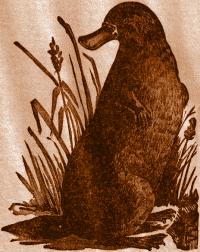
|
The Platypus is sometimes called the Water Mole. It is, perhaps, the most wonderful animal in the world in its combination, being part bird, part beast, part fish. It has a bill like a duck; five toes with claws and webbed feet; it is covered with thick glossy fur like a seal; it has cheek pouches like a monkey to keep it's food in; it lays two eggs, its voice resembles that of a young puppy, and the young platypuses play like puppies; it lives in rivers and makes burrows often 20 or 30 feet long; it feeds upon water insects, shell fish, etc.
|
Page 149—Funny Australian Natives
Funny Australian Natives
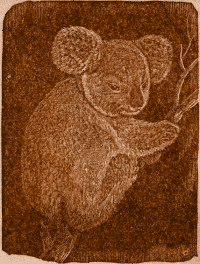
|
The Australian Native Bear is a dear little harmless fellow, and is easily tamed. He lives in the gum trees, feeds upon gum leaves, and loves his mother who carries him on her back and is very fond of him. He has a thick fluffy coat, big bushy ears, and no tail. He cries like a child if he misses his mother. The cry very pathetically if they are wounded, which they frequently are in the bush, by cruel wicked boys and men who think it is sport to shoot at the poor harmless creatures.
|
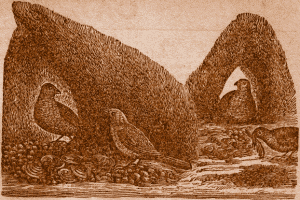
|
The Australian Bower Bird is an extensive builder; it not only builds its nest in a tree but it builds a palace on the ground in the shape of a bower hut, furnishes it with nick-nacks such as shells, bones, pieces of mineral, metals, bright parrots' feathers and other trifles. What the English magpie would steal and hide away the Bower Bird openly decorates his pavilion with. Often several birds collect together and play like children, running in, out, and around their wonderful bower-palace as shown in our picture.
|
|
The Australian Lyre Bird is a most beautiful creature, said to be a variety of the Bird of Paradise. It runs very quickly, and springs very high, and calls very loudly. It lays but one egg a year and, consequently, only has one baby per annum. It is a great mimic. Mr. Metcalfe in his "Australian Zoology", describing it, says: "It is a consummate mimic and ventriloquist. It imitates to perfection the notes of all other birds, the united voices of a flock of parrakeets, the barking of dogs, the sawing of timber and the clink of the woodman's axe. This it has earned for itself the title of the Australian Mocking Bird."
|
|
The Kangaroo says, whenever I jump,
The Emu can give a nasty kick;
I'm but a funny wild, little, spotted Native Cat,
Common people call me simply Mr. PLATYPUS,
I'm bit a little Native Bear, and am so happy and
bright,
The clever Bower Bird builds his nest up a tree,
Here we see a pretty bird, of its voice you will never
tire,
(By a Company of Three Particularly Poor
Poets.)
|
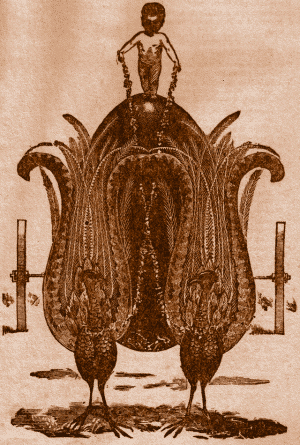
Page 150—Pussy Land
|
|
|
Ding dong dell, pussy's in the well!
|
|
A cat came fiddling out of a barn,
|
|
Pussy-cat, pussy-cat, where have you been?
|
|
Pussy-Cat lives in the servant's hall,
|
|
Hie, hie, says Anthony, puss in the pantry
|
|
Do look at the cat! why, what is she at?
|
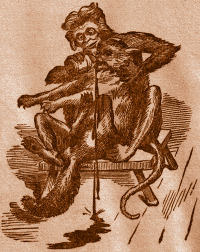
|
Says Mr. Monkey, giving a wink;
So, suiting the action to word,
The Puss she didn't like ink at all!
|
|
Sing, sing, what shall I sing?
|
|
Poor Puss, dear, lovely pretty puss,
Grateful for every sup of milk,
See, how she cleans her sleeky skin!
|
|
Mary had a little cat,
When Mary went to take a walk,
Once, when Mary was at school,
Poor Mary's face was wet with tears,
|
|
I love little Pussy, her coat is so warm;
|
Page 151—Pussy Land
|
Dame Trot once went to a neighbouring fair.
Each dear little paw was as black as a sloe,
Dame Trot hurried home with this beautiful cat;
"Oh, what a strange cat!" thought poor little Dame
Trot,
Next morning when little Dame Trot came downstairs,
The tea stood to draw, and the toast was done brown;
Now Spot, the old house-dog, looked on in amaze,
Poor little Dame Trot had no money to spare,
The rats and the mice, who wished Pussy to please,
If Puss had a weakness, I need but confess
So one day when Dame Trot had gone out to dine,
Now Spot, who to welcome his mistress desired,
"Oh, puss!" said Dame Trot, "what a very sad mess!
|
|
A little dog said, and he looked very wise,
The duck was good-natured, and she ran away;
|
|
I like little pussy, her coat is so warm,
|
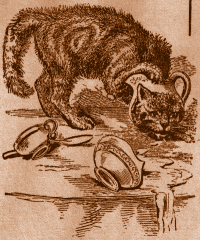
|
Ho! Master, Mistress, Mary, run,
|
|
Diddledy, diddledy, dumpty,
|
|
Pussy Cat Mole
|
|
Three little kittens they lost their mittens,
The three little kittens had need of mittens:
The three little kittens, in seeking their mittens,
The three little kittens they found their mittens,
The three little kittens put on their mittens,
The three little kittens they washed their mittens,
The three little kittens put off their mittens,
|
|
Come, Pussy, will you learn to read?
Here's a pretty picture, see
Come, A B C, an easy task,
No, no, your lesson is not done,
|
Page 152—Pussy Land
|
Old Daddy Hubbard
Daddy went to the fish shop
Daddy went to the carpenter's
Daddy went to the miller's
Daddy went to a meadow
Daddy went to the crockery shop
Daddy went to the dairy
Daddy went to the brewer's
Daddy went for some water,
Daddy went to the ironmonger's
Daddy went to the photographer's
Daddy went to the garden
Daddy went to the grocer's
Daddy went to the draper's
Daddy went to the stable
Daddy went to the confectioner's
Daddy went to get clothes
Daddy took Cole's balloon
|
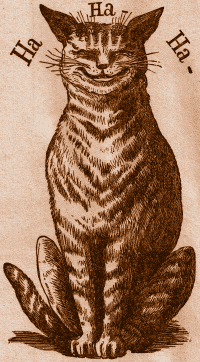
|
Daddy went to the store To get Puss a herring, And when he came back She kept loving and purring
Daddy went to the furrier's
Daddy went to the baker's
Daddy went to the dressmaker's
Daddy went to the jeweller's
Daddy went to Cole's Book Arcade
Daddy went to Cole's Book Arcade
Daddy went to Cole's Book Arcade
Daddy went to Cole's Book Arcade
Daddy went to Cole's Book Arcade
Daddy went to Cole's Book Arcade
Daddy went to Cole's Book Arcade
Daddy went to Cole's Book Arcade
Daddy went to the doctor's
Daddy went to the auction sale |
| This was a very wise, knowing Puss; she could read and write, and liked books very, very much, and didn't want to die and be buried, and leave all the mice, and milk, and sausages, and nice books; so she made haste and got better, and when |
|
Daddy went to the cemetery To dig her a grave, Puss rushed off at once Into Cole's Book Arcade. |
And that is the present residence of Miss Puss.
Page 153—Pussy Land
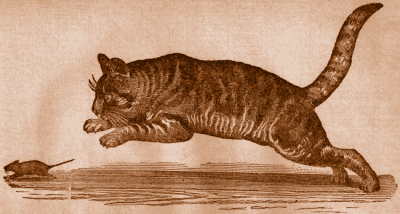
|
Or, Our Happy Family.
Once there was a little mouse,
When she came in 'twas nearly dark,
Ponto smelt, and sniff'd, and bark'd and scratch'd,
Mousey stayed there a month, as she thought it was
better,
Now one day as Ponto came into the house,
So the poor little mouse came out of the grate,
But one rainy night as Miss Mousey sat still,
The very same night as they lay on the mat,
They had just got rid of the bat and the rat,
He raced after mousey, around, in and out,
He squeezed her back hard and frighten'd her so,
Tom let her go once, but caught her afresh,
But as luck should now have it, our Ponto came in,
Says Ponto to Puss, "The mouse is my friend,
Says Pussy to Ponto, "I pray you don't fret;
So the nice little mouse, the dog and the cat,
|
Page 154—Pussy Land
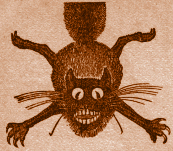
|
Mrs. Puss stayed at home, minded and played with young Master John Puss, Miss Mary Puss, and Baby Puss, while Mr. Puss went out to get them something to eat. He went into a barn, tied a piece of cheese to the tip of his tail, and put it through a hole in a door, thinking that he would catch a rat that way. Some very knowing rats on the other side of the door got a piece of string, tied it to his tail, pulled all together, and made Mr. Puss me-ow very loud, and he found that instead of his catching a rat, the rats had caught him. Mrs. Puss, finding that Mr. Puss did not come home, put little John Puss and Mary Puss to bed without any supper, and then sang little deaf Baby Puss off to sleep by means of the ear trumpet. The rats ate their supper off Mr. Puss's tail, and then let him go. You see what a fine long tail he had when he put it through the hole to catch rats in that foolish manner; and look at his short tail now, in the corner of the page.
|
|
|
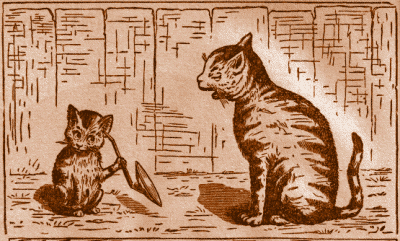
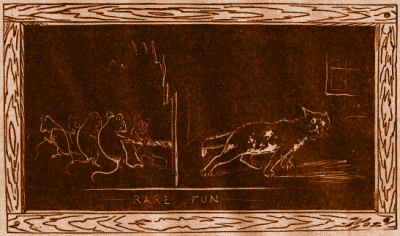
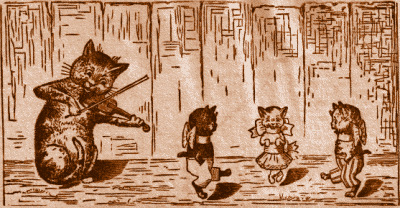
Page 155—More Pussy Land
|
Once upon a time there was a miller who had three sons. When he was dying he left each of them a legacy. To his eldest son he left his mill; to his second his ass; and to his youngest his cat. The poor boy was very sad when he found that he had nothing belonging to him but a cat; but, to his great surprise, puss jumped on the table and said in a friendly manner: "Do not be sad, my dear master, only buy me a pair of boots and a bag and I'll provide for you and myself." So the miller's son, who had a shilling or two in his pocket, bought a smart little pair of boots and a bag, and gave them to puss, who put some bran and sow-thistles into his bag, opened the mouth of it, and lay down in a rabbit warren. A foolish young rabbit jumped into it; puss drew the string and soon killed it. He went immediately to the palace with it. He found the king and queen sitting on the throne, and, bowing low, he laid the rabbit at the king's feet, saying: "Please, your majesty, my master, the Marquis de Carabas, has sent you a rabbit from his warren, as a mark of respect." "I am much obliged to the Marquis," said the king, and he ordered the rabbit to be taken to the cook, and a piece of money to be given to the cat. During two or three months the cat continued to carry game every now and then to the king, which was supposed to be the produce of his master's sport. One day when he happened to hear the king was going to take a drive on the banks of the river, in company with his daughter, who was the most beautiful princess in the world, puss desired the master to go and bathe in the river at the spot that he should point out, and leave the rest to him. The Marquis of Carabas did as his cat advised him. Just as he was bathing the king came past, when the cat bawled out as loud as he could—"Help! help! or the Marquis of Carabas will be drowned!" On hearing this, the king looked out of the carriage window, and recognising the cat, ordered his bodyguards to fly to the assistance of my Lord Marquis of Carabas. As the poor Marquis was being fished out of the river, the cat informed his majesty that, while his master was bathing, some robbers had stolen his clothes. The king immediately ordered the gentlemen of his wardrobe to fetch one of his most sumptuous dresses. No sooner had this been done and the Marquis suitably attired, then he looked to such advantage that the king took him to be a very fine gentleman; while the princess was so struck with his appearance, that at once she became head and ears in love with him. The king insisted that the Marquis should get into the carriage. The cat, highly delighted at the turn thinks were taking, now ran on before, and having reached a meadow where there were some peasants, he thus accosted them; "I say, good folks, if you do not tell the king that this field belongs to the Marquis of Carabas, you shall all be chopped as fine as mince-meat." The king did not fail to inquire of the peasants to whom the meadow belonged? "To the Marquis of Carabas, please your majesty," said they in a breath. And the cat kept running on before the carriage, and repeating the same instructions to all the labourers he met with, so that the king was astonished at the vast possessions of the Marquis of Carabas. At length the cat reached a magnificent castle belonging to a giant who was immensely rich. The cat having inquired what sort of person the giant might be, and what he was able to do, sent in a message to request leave to speak with him. The giant received him civilly. "I have been told," said the cat, "that you have the power of transforming yourself into all sorts of animals." "So I have," replied the giant, "and to prove the truth of what I say you shall see me become a lion." When the cat beheld a lion standing before him, and saw the monster quietly light his pipe, he was seized with such a panic that he clambered up to the roof. After a time, the cat perceiving that the giant had returned to his natural shape, came down again. "And do you possess the power of assuming the shape of the smallest animals likewise?" "You shall see;" and the giant immediately assumed the shape of a mouse, when the cat pounced upon him and ate him up. By this time the king had reached the gates of the Giant's magnificent castle, and expressed a wish to enter so splendid a building. The cat ran out to meet the king, saying—"Your majesty is welcome to the Marquis of Carabas's castle." The king was so delighted with the Marquis of Carabas, that he accepted him as a son-in-law, and that very same day he was married to the princess. The cat became a great lord, and ever after hunted mice only for his own amusement. |
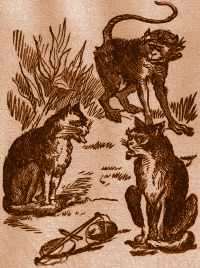
|
Two hungry cats having stolen some cheese, could not agree between themselves how to divide their booty; therefore they went to the law, and a cunning monkey was to decide their case. "Let us see," said the judge (with as arch a look as could be); "ay, ay, this slice truly outweighs the other;" and with this he bit off a large piece, on order, as he told them, to make a fair balance. The other scale had now become too heavy, which gave this upright judge a pretence to make free with a second mouthful. "Hold, hold!" cried the two cats; give each of us our share of what is left and we will be content. "If you are content," said the monkey, "justice is not; the law, my friends, must have it's course." Upon this he nibbled first one piece and then the other, till the poor cats, seeing their cheese in a fair way to be all eaten up, most humbly begged him not to put himself to any further trouble, to give them what still remained. "Ha! ha! ha! not so fast, I beseech you, good ladies," said the monkey; "we owe justice to ourselves as well as to you: and what remains is due to me as the lawyer." Upon this he crammed the whole into his mouth at once, and very gravely broke up the court. This fable teaches us that it is better to put up with a trifling loss, than to run the risk of losing all we have by going to the law.
|
|
There was once a Lord Mayor of London, whose name was Sir Richard Whittington. He rose to that office from being a poor orphan, living in a distant village. Dick was a sharp boy, and was always picking up knowledge from some of the villagers. Dick heard of the great City of London; he often heard it said that the streets were paved all over with gold. One day seeing a waggon and team of horses on the road to London; he took courage and asked the waggoner to let him walk by his side. Having gained permission, they set off together. When Dick got to London, he was very eager to see the fine streets paved all over with gold, but the poor boy saw nothing but dirt instead of gold, so he crouched down at the door of one Mr. Fitzwarren, a great merchant. Here he was soon found by an ill-tempered cook, who ordered him to go about his business. But just at this moment Mr. Fitzwarren himself came home, and finding that the poor boy was willing to work, he took him into his house, and said that he should be kept to do what dirty work he was able for the cook. The cook was always scolding him from morning till night, and was very cruel to him. Poor Dick had another hardship. His bed was places in a garret where there were great numbers of rats and mice, which ran over his face, and made a great noise. Dick at last bought a cat which was famous for being an excellent mouser. Soon after this, the merchant, who had a ship ready to sail, asked his servants if they would send any goods abroad. All the servants mentioned something they were willing to venture but poor Whittington, who said he had nothing but a cat which was his companion. "Fetch thy cat, boy," said Mr. Fitzwarren, "and let her go." Dick hesitated for some time; at last he brought poor Puss, and delivered her to the captain with tears in his eyes. The cook continued to be so cruel to him that the unhappy fellow determined to leave his place. He accordingly packed up his few things, and travelled as far as Holloway, and there sat down on a stone. While he was there musing, Bow-bells began to ring; and it seemed to him that their sound said:
Lord Mayor of London." So back went Dick, and got into the house before the cook came down stairs. The ship with Dick's cat on board happened to be driven by contrary winds on a part of the coast of Barbary, inhabited by Moors, who showed great eagerness to purchase the things with which the ship was laden. The captain seeing this, took patterns of the choicest articles he had to the King of the Moors. While he was showing them to him, dinner was brought in, and at once lots of rats and mice came in and ate up all the dainties. The captain was astonished when the King told him that this often happened. The captain rushed off at once to the ship, and brought Puss to the palace. The second dinner had been brought in, and, as usual, in came the rats and mice; Pussy at the sight of them sprang out of the captain's arms and killed lots of them, and the rest ran off to their holes. The King was greatly pleased with the wonderful Puss, and gave two sackfuls of gold for the cat, and the captain at once sailed for London. When Mr. Fitzwarren heard the news, he ordered Dick Whittington to be called, and showed him all the riches which the captain had brought in exchange for his cat. Dick was now a rich man, and soon after married the merchant's daughter, at the very church whose bells seemed to call him back to London. He grew richer and richer, became Sheriff, and at length Lord Mayor of London.
|
Page 156—More Pussy Land
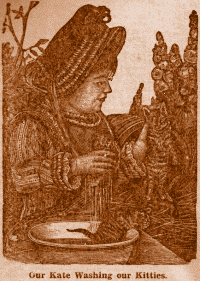
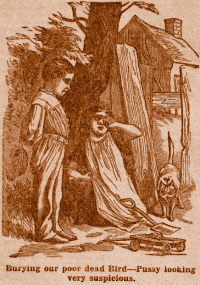
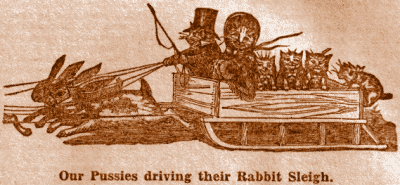
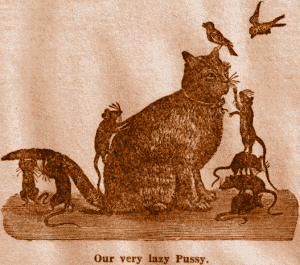
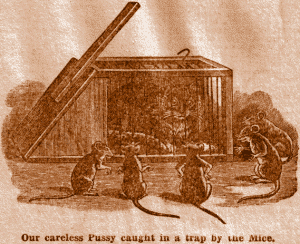
Page 157—More Pussy Land
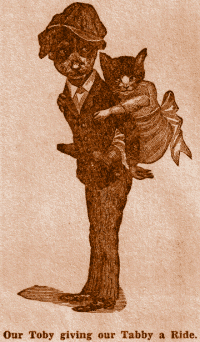
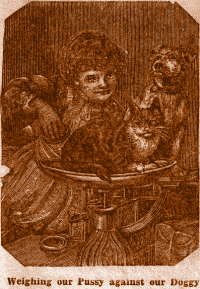
|
My little white kitten's
My little white kitten
But night has come down,
What ugly grey marks
If little good children
|
|
Pretty little Kitty
Pretty little Kitty
Pretty little Kitty
|
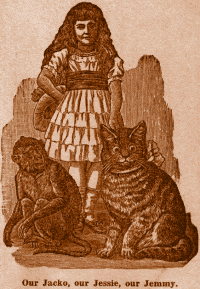
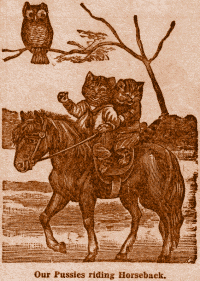
Page 158—More Pussy Land
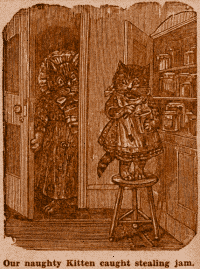
|
"Oh, for shame,
"With a spoon
"If she comes
"She will send you
|
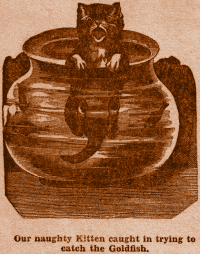
|
I love little Pussy,
I'll not pull her tail,
She'll be gentle with me,
She shall sit by my side,
It's true, if I tease her,
|
|
"I wonder," says puss,
'Tis the queerest thing
No! No! On the whole
I'll just step up
I'll play with the animal,
No! I thank I had better
For I'll get into trouble,
Rev. A. Taylor
|
|
Three little pussies,
Five little pussies
Dear little pussies,
|
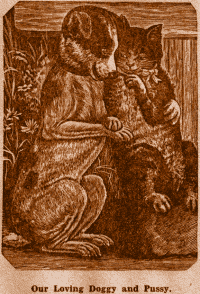
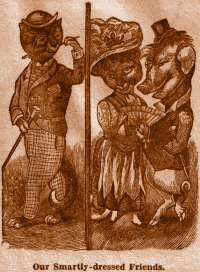
Page 159—More Pussy Land
|
You are a naughty pussy-cat;
An hour ago, as you can tell,
For you, my puss, I'll never care,
What, crying? Then I must cry too,
And though I'm sure you broke his leg,
Robert Mack
|
|
Tabby was a kitten,
Jumping on the table
Wondered what was in it;
Cream was very low down;
Then into the cream-jug
This is how we found her,
Tabby was a kitten,
|
|
Don't hurt the poor old cat,
She, for years, has kept the house
True, she now is getting old,
Poor old puss! 'Twould be a shame
|
|
I'm a rich little kitten:
I keep my own carriage,
My turn-out is stylish,
And often I notice
That a rich little kitten
|
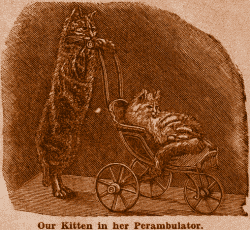
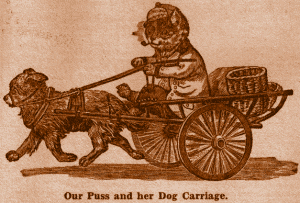
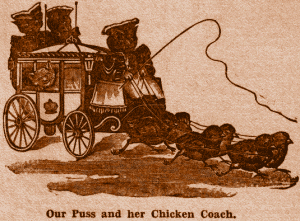
Page 160—More Pussy Land
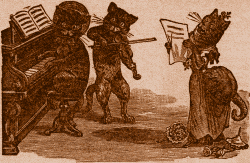
|
Don't talk to me of parties, Nan;
The play-house blinds are all pulled down
But boys are all so horrid!
I've had her all the summer.
I shooed the dog away,
A cunning little dot she was,
Such comfort she has been to me
But oh, last week I missed her!
I found her lying yesterday
I can't go to your party, Nannie,
Sydney Dayre
|
|
A monkey, being fond of nuts,
"Dear pussy, you are just the one
"Twas no use for poor puss to speak,
He put some nuts into her paw,
The monkey having feasted well
And what a fuss you make about
"Now let me give you this advice,
Mrs. W. Taylor
|
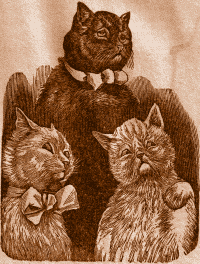
Page 161—More Pussy Land
|
I wish you could just see my cat:
Her eyes are a beautiful green,
She loves to lie stretched in the sun
My kitty has two sets of claws,
I cannot thin what I should do,
I call her my bundle of fur:
|
|
Dear kitten, do lie still, I say,
There, only see! you've torn my frock,
Nay, do not scold your little cat,
But if your pussy understood
|
|
Kitty, Kitty, go to sleep,
Hurry Kitty for to see
And while I rock you in my chair,
Mamma makes me bend my knee,
And then you can't say any words,
M. E. S.
|
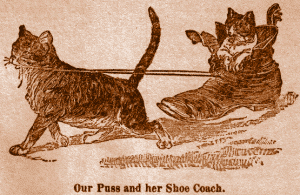
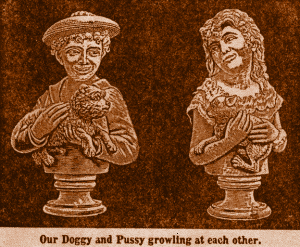
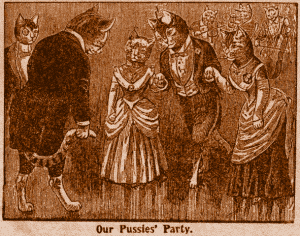
Page 162—Doggy Land
Old Mother Hubbard and Her Dog
|
Old Mother Hubbard Went to the cupboard To get her poor Dog a bone; But when she got there The cupboard was bare, And so the poor Dog had none.
She went to the baker's
She went to the joiner's
She took a clean dish
She went to the ale-house
She went to the hatter's
She went to the barber's
She went to the fruiterer's
She went to the tailor's,
She went to the seamstress
She went to the hosier's
She went to the cobbler's
She went to the hotel
|
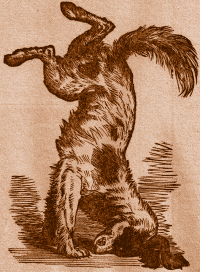
|
She went to the tavern For white wine and red, But when she came back The Dog stood on his head.
The dame made a curtsey,
This wonderful Dog
She went to Cole's Book Arcade
She went to Cole's Book Arcade
She went to Cole's Book Arcade
She went to Cole's Book Arcade
She went to Cole's Book Arcade
She went to Cole's Book Arcade
She went to Cole's Book Arcade
She went to Cole's Book Arcade
She went to Cole's Book Arcade
She went to Cole's Book Arcade
She went to Cole's Book Arcade
|
|
I have been blamed for printing and distributing "Mother Hubbard." My answer is:—"Old Mother Hubbard" has done more towards the education of young children than perhaps any piece of reading in existence. Amongst the hundreds of millions of English speaking people in all parts of the earth, there are very few but can repeat a part or the whole of "Mother Hubbard," and I have seen it somewhat asserted that it is to be found in almost every home in the civilised world. Its rude style of poetry tells nothing against it. The child knows nothing of correct metre: as long as there is a jingling rhyme it is satisfied. The dog is the domestic animal in millions of families, and in numberless cases is actually a more loved companion then brothers and sisters. A simple rhyme, therefore, about this attached, playful, and constant companion is sure to fascinate the young, and it has fascinated more than a thousand millions of the little dears. I firmly believe that it would produce grand results if a pretty illustrated edition of the principal nursery rhymes were made a text-book in infant schools. You may try, and try, and try again, to drive an ordinary dry school-book lesson into the infant mind, and make very little progress—it is up-hill work. But take an illustrated edition of a nursery rhyme, say the "Death of Cock Robin," or "Mother Hubbard," and call the little one to you, begin to teach it—how eagerly, how intently does it begin to learn now! What animation in its little eyes! What music in its little, joyous, interested voice! It learns this lesson ten times as fast as the other one, and gives you ten times the pleasure in teaching it, and this kind of teaching gradually and insensibly leads the child into a love of learning: it interests and sets the young inquiring mind at work. We all know how much easier it is to do a work we are interested in than a work we are not. It is just so with the child, and for that reason I would commence to teach the infant mind with that which pleased it best, and so gradually create a love for reading. For years I have allowed numbers of little children, of their own accord, to stand and read nursery rhymes to themselves, and to teach other youths to read interesting and instructive fiction, gratis, in the Book Arcade; and I hold that, by its enticingly creating a love for reading, which will lead to something higher, time is one of the best and most effective schools in the country.
—E. W. Cole
|
Page 163—Doggy Land
|
Bow, wow, wow, whose dog art tho?
|
|
There was an Old Man of Leghorn,
|
|
The cat sat asleep by the side of the fire,
|
|
Hark, hark, the dogs do bark,
|
|
Poor dog Bright
|
|
I had a little dog, and his name was Blue Bell,
|
|
I had a little Dog, and they called him buff,
|
|
Ding, dong, darrow,
|
|
Thievish dog Fan, to yell aloud began,
|
|
Old Tray and rough Growler are having a fight,
|
|
I will not hurt my little dog,
Poor little thing, how very good,
Then I will never hurt my dog,
|
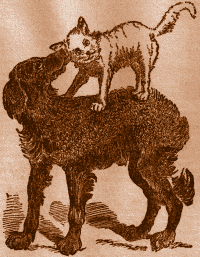
|
Our Pussy she is white,
Our Pussy she is little,
Our Pussy she is young,
Our Pussy she is good,
|
|
Foolish Edward runs away,
|
|
No, naughty Growler, get away,
Poor Growler! do not make him go,
Poor growler! if he could but speak,
Upon his back he lets you ride,
And all your little tricks he'll bear,
|
|
Good Dog Tray
|
|
See, here is poor old Tray;
Oh! how I love you, Tray,
'Tis true that I give you bits
For faithful, true, and kind
|
|
"Come hither, little puppy dog,
"No, no!" replied the puppy dog,
|
Page 164—Goat Land
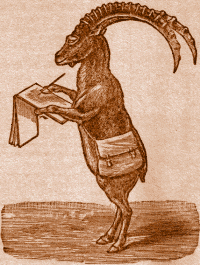
|
O'Grady lived in shanty row,
Ould Missis Casey stood wan day
Pat Doolan's woife hung out the wash,
They had a party at McCune's,
O'Hoolerhan brought home a keg
Will S. Hays
|
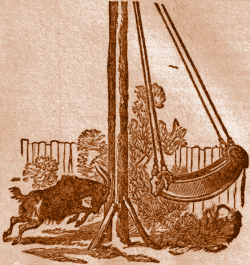
|
A little story with a moral
A vicious goat, one day, had found
Its shape was odd—no hoofs were seen,
Though but a harmless ornament
With stamp of foot and angry glance
A sounding thump! It backward swung,
The swing, as with kindling wrath,
Then came a dull and muffled sound,
J. T. Throwbridge
|
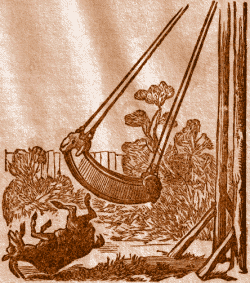
Page 165—Monkey Land
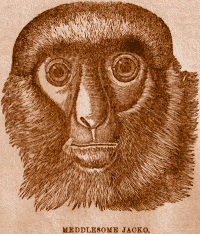
The Adventures of Meddlesome "Jacko"
|
These pictures we hope Will our little folks please, And also to each one This moral convey: "Be contented and happy, Whatever your lot, And don't try, as some do, To have your own way."
Master Jacko, you see,
For one day he said,
After some little time
He entered, and as he
Next he went to the kitchen,
To the dining-room the
Quoth Jacko, "the house
In the corner the rogue
Pinched, scalded, and stung,
|
|
A little monkey,
From many a prisoned
Into the place
Safe in a basket
A week of bliss,
So fate had ordered,
They brought into
The moment that
They took him back
Poor little thing!
|
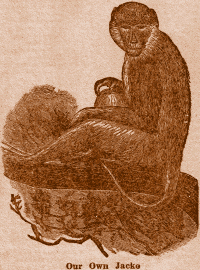
Page 166—Gee Gee Land
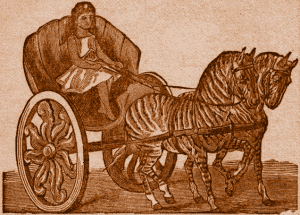
|
The horse, the brave.
Behold him free
Who wonders not
His nostrils are wide
He owns the lion's
The Arab is wise
A song for the steed,
Whatever his place—
Eliza Cook
|
|
I've a tale to relate.
He stood in a room,
"Come, gee up, old Dobbin.
With spur, and with whip,
|
|
Oh, Brownie, our pony,
So sure is his foot,
We haste to his stable
We pat his rough coat,
|
|
No one deserves to have a horse
If ever it should be my lot—
He soon would learn my voice to know
I'd teach my horse a steady pace.
Should he grow aged, I would still
For should he get too weak to be
|
|
Oh! thank you, good Dobbin,
The howling wind blew,
The sun it was setting
Now go to the stable,
|
|
Up the hill, whip me not;
|
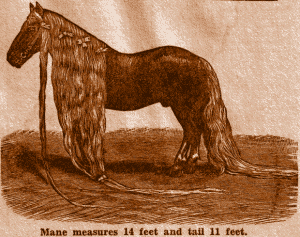
Page 167—Gee Gee Land
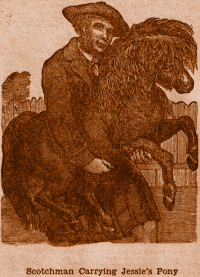
|
'Tis Sabbath-day, the poor man walks
The father is a man of joy,
But, looking to a field at hand,
Poor skinny beasts, that go all week
But now let loose to roam athwart
Lolling across each other's necks,
|
|
who has Sentenced him to Die
And hast thou sealed my doom, sweet master, say?
For much it glads me to behold this place—
For oh! to think of what we have enjoyed,
Thrice ten years have danced on down along,
Ah! years sweet smiling, now for ever flown,
And hast thou fixed my doom, sweet master, say?
But oh! Kind Nature, take thy victim's life!
|
|
Come, my beauty; come, my dessert darling!
Thou shalt have thy share of dates, my beauty!
Bend thy forehead, now, to take my kisses!
Let the Sultan bring his broadest horses,
We have seen Damascus, O my beauty!
|
|
Pity the sorrows of a poor cab horse,
When the cold winds of dreary winter rage,
Though worn and weary with useful life,
His legs are stiff, his shoulders rubbed and sore,
Ye kindly hearts that spare the whip, and stroke,
He has not many friends to plead his cause;
|
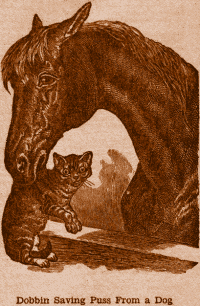
Page 168—Gee Gee Land
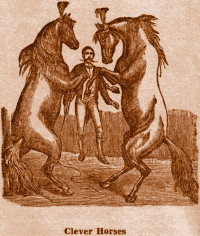
|
Home from his journey Farmer John
"You haven't a rib!" says Farmer John:
"For after all," says Farmer John,
"I've found out this," says Farmer John,
And a happy man is Farmer John,
|
|
A horse, long us'd to bit and bridle,
He panted from his utmost soul,
But yet he ne'er had got at large,
Dobbin, with expectation swelling,
At length he ventured from his station,
And here he stood awhile debating,
At last, unchecked by bit or rein,
But when dark nights began t'appear,
The grass felt damp and raw,
The night was dark, the country hilly,
As soon as day began to dawn,
"If this" (thought he) "is all I get,
'Twas long ere Dobbin could decide
At last his struggling pride gave way,
So off he set, with look profound,
Now Dobbin, after his disaster,
Jane Taylor
|
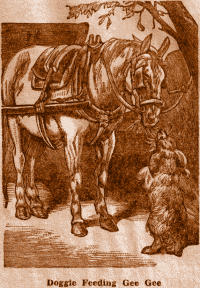
Page 169—Donkey Land
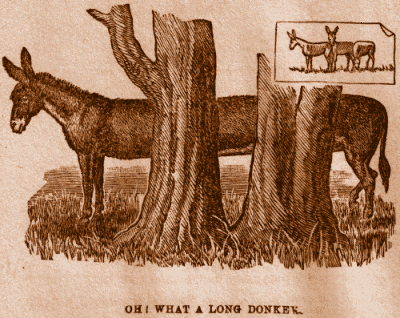
|
No wonder the Cottager
He knows the Cottager's
He knows the road
So he trudges along,
S. V. Dodds
|
|
Poor Donkey! I'll give him
'Tis true, now and then
No, no, my good donkey!
|
|
Up and down on Neddy's back,
Little sisters side by side,
|
|
Old Jack was as sleek
And indeed he might well
Joe groomed him and fed him,
One day Jack was wandering
Joe soothed and caressed him
"Poor Jack did they pelt him—
And Jack nestled down
S. W. P.
|
|
"Please, Mr Donkey, Sing a song,"
|
|
The Ass, when treated well by man,
To market he will carry peas,
He drinks no water but what's clean;
|
|
Down in this ditch poor donkey lies,
No shelter had he for his head,
In this green ditch he often stray'd
Each market-day he jogg'd along
A tuft of grass, a thistle green,
And as for sport, the sober soul
But all his sport, and dainties too,
He felt his feeble limbs grow cold,
Poor donkey! travellers passing by,
Anne Taylor
|
Page 170—Moo Moo Land
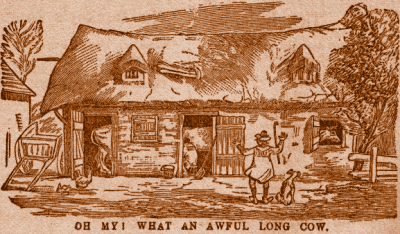
|
Beside a green meadow
A cow, quite oppress'd
But soon a brown ass,
"Take a seat," cried the cow,
When a few of these compliments
Then, with a deep sigh,
"Now what is the reason
"I've no will of my own,
"But ma'am," said the ass,
"Why, sir, I was only
Ass waited a moment,
"That you're of great service
"And then a warm cover
The cow, upon this,
Jane Taylor
|
|
Come, children, listen to me now,
When milkmaids milk her morn and night
The curdled milk they press and squeeze,
And when she's dead, her flesh is good,
Her skin, with lime and bark together,
The shoemaker cuts it with his knife
The hair that grows upon her back
And, last of all, if cut with care,
|
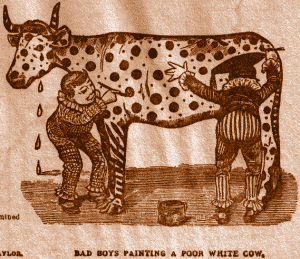
Page 171—Moo Moo Land
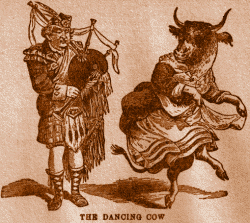
|
"Mooly cow, mooly cow,
"Mooly cow, mooly cow,
"Mooly cow, mooly cow,
"Mooly cow, mooly cow,
|
|
To the yard, by the barn,
Now the little calf Spot,
Said the horse (dapple gray),
Then out spoke the cow,
"Why, of course we all knew
Just that moment, the calf,
Then each one shook his head,
"For a wonder, last night,
The each hoof of them
Phoebe Cary
|
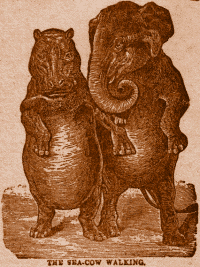
Page 172—Baa Baa Land
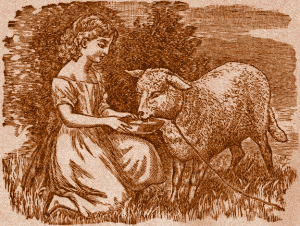
|
Storm upon the mountain,
Down the glen the shepherd
Up the glen he races,
Struggling, panting, sobbing,
Oh! the happy faces,
T. Westwood
|
|
The dew was falling fast,
Nor sheep nor kine were near;
"What ails thee, young one; what?
"What is it thou would'st seek?
"Rest little young one, rest;
"He took thee in his arms,
"Thou know'st that thrice a day
"Here, then, thou need'st not dread
Wordsworth
|
|
Mother, let's go and see the lambs;
Ah, there they are. You pretty things!
What pretty little heads you've got,
Come here, my little lambkin, come,
Just put your hand upon its back,
Easy Poetry
|
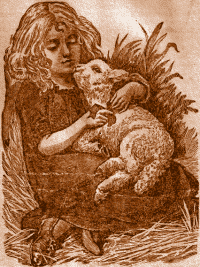
Page 173—Baa Baa Land
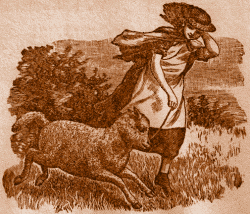
|
Once on a time, a shepherd lived
Now, it was on a cold March day,
He placed it by the warm fireside,
It followed them where'er they went,
They patted it upon its head,
Now, this kind shepherd was as ill,
"What shall we do, what can we do?
"Oh, do not sell my white pet lamb,"
The doctor at that very time
"And never in the morning light
It lies beside my bed at night,
But a small piece of bread."
You have a kind and gentle heart,
And so the white pet lamb was saved,
And with its head upon her lap
Thomas Miller
|
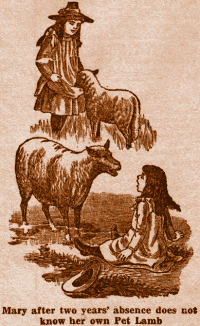
Page 174—Piggy Land
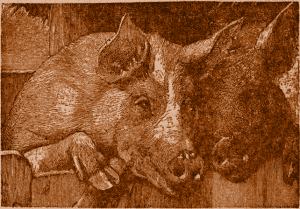
|
The pig, he is a gentleman,
The pig, he is a gentleman,
The pig he, is a gentleman,
He eats, and drinks, and sleeps all day
E. W. Cole
|
|
"Do look at those pigs, as they lie in the straw,"
"I see they are feasting," his father replied,
"But when a great boy, such as you my dear Dick,
"When plumcake and sugar for ever he picks,
J. T.
|
|
Five lit-tle fingers
Ring-tail, that stead-y
Young Smil-er, the next,
Num-ber three was young Long-snout
And poor lit-tle Grun-ter—
Young Squeak-er cried, "Wee, wee, wee,"
Oh, these five lit-tle pigs,
|
|
It happened one day,
But a perverse little brother,
Then away he ran fast
She ran to the side
"Oh, mother, dear mother;"
|
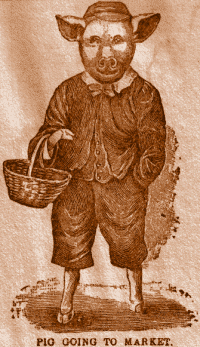
Page 175—Piggy Land
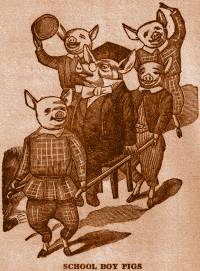
|
Three naughty pigs,
Out in the garden
Out in the garden
One naughty pig
To naughty pigs
Three naughty pigs,
For, in their noses,
|
|
Little Biddy O'Toole, on her three-legged stool,
|
|
It was the stalwart butcher man
And oh! it was the gentle pig
They took him then those wicked men,
And round and round an oaken beam
Now say thy prayers, thou sinful man
For if its sprite should walk by night
It was the savage butcher then
It was the butcher's youngest son,
All young and ignorant was he,
"Oh! father, father, list to me;
It was the naughty butcher then
"Oh! Nathan, Nathan, what's a pig,
It was the butcher's daughter then,
And thus she spoke in thrilling tone—
Then did her wicked father's lips
Ye need not weep, ye gentle ones,
The bright sun folded on his breast,
He slept, and troops of murdered pigs
The clock struck twelve; the dead hath heard;
One quiver of the hempen cord—
And straight towards the sleeper's house
Back flew the bolt, uprose the latch,
Two hoofs upon the sanded floor,
"Now wake, now wake, thou butcher man!
Untwisted every winding coil;
"Thou com'st with me, thou butcher man!"
And open, open, swung the door,
Fast fled the darkness of the night,
Straight, straight towards that oaken beam,
O. W. Holmes
|
Page 176—Piggy Land
|
Little Dame Crump,
"Dear me!" cried the Dame,
So she washed her face clean,
Having purchased the pig,
Piggie ran till they came
She went to the mill,
At last when the end
With a handful of peas
|
|
Old Madam Grumph, the pig, had got
A red-tiled roofing covers in
There stands the trough, they keep it fill'd
They like to see what she's about,
The pigs, that run about the yard,
One autumn day, when she awoke
"Humph," said the dame, "now let me see
"Eight—That's a nice round family;
"What's to be done with those dead things,
"What's that, old Grumphy?" said a pig,
"I wish you'd mind your own affairs,"
"I hope you slept well," said the pig,
"I thought I told you once before
"Squeak," said the bitten pig, "sque-e-ak,
They grumbled and they grunted loud,
Dame Grumph was standing by her pigs,
"These lovely creatures," said old Grumph,
"Indeed," ex-claim'd the peeping pig,
"They're of a most dis-tin-guished race;
"They never shall as-so-ci-ate
"Begging your pardon, ma'am
"If you and I were bacon, ma'am
"Give me your comfortable sty,
Aunt Effie's Rhymes
|
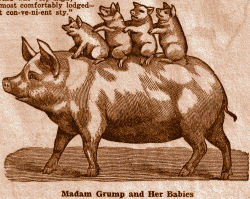
Page 177—Piggy Land
|
Once an old woman was sweeping her house, and found a crooked sixpence, and went to market to buy a pig. As she was coming home she came to a stile, and the pig would not get over it: so she went a little farther and met a dog, and said to the dog:— |
|
"Dog, dog, bite pig; Piggy won't get over the stile, And I shan't get home to-night." But the dog would not. |
| She went a little farther and met a stick, and said: |
|
"Stick, stick, beat dog; dog won't bite pig, Piggy won't get over the stile, And I shan't get home to-night." But the stick would not. |
| She went a little farther and met a fire, and said: |
|
"Fire, fire, burn stick; stick won't beat dog, Dog won't bite pig, Piggy won't get over the stile, And I shan't get home to-night." But the fire would not. |
| She went a little farther and met some water, and said: |
|
"Water, water, quench fire, Fire won't burn stick, Stick won't beat dog, dog won't bite pig, Piggy won't get over the stile, And I shan't get home to-night." But the water would not. |
| She went a little farther and met an ox, and said: |
|
"Ox, ox, drink water, Water won't quench fire, fire won't burn stick, Stick won't beat dog, dog won't bite pig, Piggy won't get over the stile, And I shan't get home to-night." But the ox would not. |
| She went a little farther and met a butcher, and said: |
|
"Butcher, butcher, kill ox, Ox won't drink water, Water won't quench fire, fire won't burn stick, Stick won't beat dog, dog won't bite pig, Piggy won't get over the stile, And I shan't get home to-night." But the butcher would not. |
| She went a little farther and met a rope, and said: |
|
"Rope, rope, hang butcher. Butcher won't kill ox, ox won't drink water, Water won't quench fire, fire won't burn stick, Stick won't beat dog, dog won't bite pig, Piggy won't get over the stile, And I shan't get home to-night." But the butcher would not. |
| She went a little farther and met a rat, and said: |
|
"Rat, rat, gnaw rope; Rope won't hang butcher, Butcher won't kill ox, ox won't drink water, Water won't quench fire, fire won't burn stick, Stick won't beat dog, dog won't bite pig, Piggy won't get over the stile, And I shan't get home to-night." But the rat would not. |
| She went a little farther and met a cat, and said: |
|
"Cat, cat, kill rat; rat won't gnaw rope, Rope won't hang butcher, Butcher won't kill ox, ox won't drink water, Water won't quench fire, fire won't burn stick, Stick won't beat dog, dog won't bite pig, Piggy won't get over the stile, And I shan't get home to-night." |
| But the cat said to her, "If you will go to yonder cow, and fetch me a saucer of milk, I will kill the rat." So away went the old woman to the cow, and said: |
|
"Cow, cow, give me some milk, cat won't kill rat, Rat won't gnaw rope, rope won't hang butcher, Butcher won't kill ox, ox won't drink water, Water won't quench fire, fire won't burn stick, Stick won't beat dog, dog won't bite pig, Piggy won't get over the stile, And I shan't get home to-night." |
|
But the cow said to her, "If you will go to yonder haymakers and
fetch me a wisp of hay, I'll give you the milk."
So away the old woman went to the haymakers and said: |
|
"Haymakers, give me a wisp of hay; Cow won't give me milk, cat won't kill rat, Rat won't gnaw rope, rope won't hang butcher, Butcher won't kill ox, ox won't drink water, Water won't quench fire, fire won't burn stick, Stick won't beat dog, dog won't bite pig, Piggy won't get over the stile, And I shan't get home to-night." |
|
But the haymakers said to her, "If you will go and fetch
us a
bucket of water, we'll give you the hay." So away the old
woman
went; but she found the bucket was full of holes. So she
covered
the bottom with pebbles, and then filled the bucket with
water,
and away she went back with it to the haymakers; and they
gave her
a wisp of hay. As soon as the cow had eaten the hay, she gave the old woman the milk; and away she went with it in a saucer to the cat. As soon as the cat had drank the milk, the cat began to kill the rat, the rat began to gnaw the rope, the rope began to hang the butcher, the butcher began to kill the ox, the ox began to drink the water, the water began to quench the fire, the fire began to burn the stick, the stick began to beat the dog, the dog began to bite to pig, the pig in a great fright jumped over the stile, and so the old woman got home that night in time to boil some apple dumplings for her husband's supper.
|
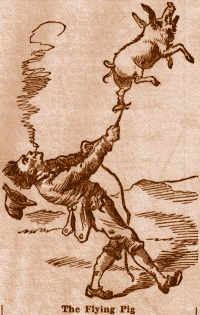
|
Dickery, dickery dare,
|
|
Once there was an old pig, who had three little pigs, and sent them out to seek their fortune. The first one went and built a house with straw, and soon after a wolf came and knocked at the door and said, "Little pig, let me come in." But the little pig said, "No, no by the hair of my chin." The wolf then said, "I'll huff, and I'll puff, and I'll blow your house in." So he huffed, and he puffed, and blew the house in, and ate up the little pig. The next little pig built a house with sticks, and the old wolf came along and called out, "Little pig, let me come in." And the little pig answered, "No, no, by the hair of my chin." "Then," says the wolf, "I'll huff, and I'll puff, and I'll blow your house in." So he huffed and he puffed, and blew the house down, and ate up the little pig also. The third little pig built a house with bricks. Just after along came the old wolf, and said, "Little pig, let me come in." The little pig said, "No, no, by the hair of my chin." "Then I'll huff and I'll puff, and I'll blow your house down." Well, he huffed and he puffed, and he huffed and he puffed, and he puffed and he huffed; but he could not get the house down. When he found he could not, with all his huffing and puffing, blow the house down, he said "Little pig, I know where there is a nice field of turnips." "Where?" said the little pig. "Oh, in Mr. Smith's home field, and if you will be ready to-morrow morning I will call for you, and we will go together, and get some for dinner." "Very well," said the little pig, "I will be ready. What time do you mean to go?" "Oh, at six o'clock." Well, the little pig got up at five, and got the turnips before the wolf came, which he did about six, and said, "Little pig, are you ready?" The little pig said, "Ready; I've been and come back again and got a nice potful for dinner." The wolf felt very angry at this, but thought that he would be up to the little pig somehow or other, so he said, "Little pig, I know where there is a nice apple tree." "Where?" said the little pig. "Down at Merry Garden," replied the wolf, "and if you will not deceive me I will come for you at five o'clock to-morrow, and we will go together and get some apples." Well, the pig bustled up the next morning at four o'clock, and went off for the apples, hoping to get back before the wolf came; but he had further to go, and had to climb the tree, so that just as he was coming down from it he saw the wolf coming, which, as you may suppose, frightened him very much. When the wolf came up he said, "Little pig, what; are you here before me? Are they nice apples?" "Yes, very," said the little pig, "I will throw you down one." And he threw it so far that, while the wolf was gone to pick it up, the little pig jumped down and ran home. The next day the wolf came again, and said "Little pig, there is a fair at Shanklin this afternoon, will you go?" Oh, yes," said the pig, "I will go: what time shall you be ready?" "At three," said the wolf. So the little pig went off before the time as usual, got to the fair, and bought a butter-churn, which he was going home with, when he saw the wolf coming. Then he could not tell what to do. So he got into the churn to hide, and by doing so turned it around, and it rolled down the hill with the pig in it, which frightened the wolf so much that he ran home without going to the fair. He went to the little pig's house and told him how frightened he had been by a great round thing which came down the hill past him. Then the little pig said "Ha! I frightened you, then. I had been to the fair and bought a butter-churn, and when I saw you I got into it and rolled down the hill." Then the wolf was very angry indeed, and declared he would eat up the little pig, and that he would get down the chimney after him. When the little pig saw what he was about, he hung onto the pot full of water, and made up a blazing fire, and just as the wolf was coming down, took off the cover, and in fell the wolf; so the little pig put on the cover again in an instant, boiled him up, and ate him for supper, and lived happy ever afterwards.
|
Page 178—Rabbit Land
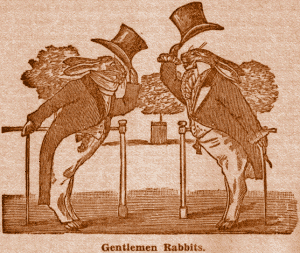
|
Among the sand-hills,
They live in burrows
The mother rabbits
The tender young ones
And when they are older,
They play and nibble
|
|
A pert little rabbit,
"Now, dear," said his mother,
So what did he do?
He shook his long ears,
'Twas not very long
"I'll dig myself a nice den
So bunny soon dug him
But evening drew on,
"For really this hay,
"I wish I had some
"Ah, well! I feel sleepy,
Meanwhile an old fox
When morning had come,
"I think I had better
Away then he ran,
And, oh! such a breakfast
B. R. McKean
|
|
I have a little Bunny
And then the next thing that I do,
I feed him in the morning
Then when it's nearly bed-time
Robert Mack
|
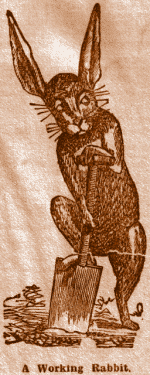
Page 179—Hare Land
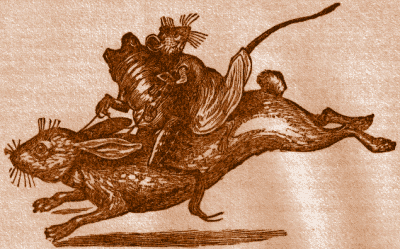
|
Beyond the palings of the park
She slept until the daylight came,
She stroked her whiskers with her paws,
The Field-Mouse rustled in the grass,
She frisked and gambolled with delight,
What was it, then, that made her start,
Tally-ho!-hoy tally-ho!
So off she set with a spring and a bound,
Aunt Effie
|
|
Thoughtless little Peter,
Thoughtful little Peter,
|
|
Here lies whom hound did ne'er pursue,
Old Tiney, surliest of his kind,
Though duly from my hand he took
On twigs of hawthorn he regaled,
A Turkey carpet was his lawn,
His frisking was at evening hours
Eight years and five round-rolling moons
I kept him for his humour's sake,
But now, beneath this walnut shade,
He, still more aged, feels the shocks
William Cowper
|
|
All on the bare and bleak hillside,
Though we had hunted puss all day,
There to the earth she humbly crept,
And there, while frozen fell the dew,
Loud hungry hounds of subtle ken,
Onwards she strains, on, as they tear
One moment's check, to left, to right,
What use her fine small wits to rack!
"For pity's sake, kind huntsman, stop!
With shuddering start and stifled scream,
|
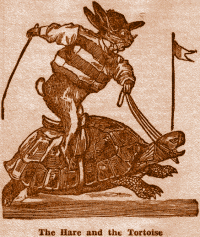
Page 180—Rat Land
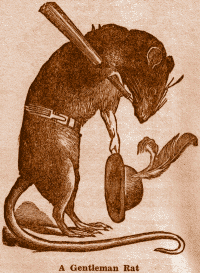
|
—or— The Vanished Children
Hamelin Town's in Brunswick
Rats!
At last the people in a body |
| The mayor and Town Councillors were greatly perplexed what to do, when there entered a strange-looking piper, and offered to charm away all the rats for a thousand guilders. The council joyfully agreed to this, and at once:— |
|
Into the street the Piper swept, Smiling first a little smile, As if he knew what magic slept In his quiet pipe the while: Then, like a musical adept, To blow the pipe his lips he wrinkled, And green and blue his sharp eyes twinkled Like a candle flame where salt is sprinkled; And ere three shrill notes the pipe uttered, You heard as if an army muttered; And the muttering grew to a grumbling; And out of the houses the rats came tumbling.
Great rats, small rats, lean rats, brawny rats,
You should have heard the Hamelin people |
| The mayor and Councillors abused the Piper, refused to pay him the thousand guilders, and offered him fifty and a drink, he refused to take less than they had offered, and said: |
|
"Folks who put me in a passion May find me pipe to another fashion," "How?" cried the Mayor, "d'ye think I'll brook Being worse treated than a crook? Insulted by a lazy ribald With idle pipe and vesture piebald? You threaten us, fellow? Do your worst, Blow your pipe there till you burst!" Once more he stept into the street: And to his lips again Laid his long pipe of smooth straight cane; And ere he blew three notes (such sweet Soft notes as yet musicians cunning Never gave the enraptured air), There was a rustling, that seemed like a bustling Of merry crowds pustling, at pitching and hustling, Small feet were pattering, wooden shoes clattering, Little hands clapping, and little tongues chattering, And like fowls in a farmyard when barley is scattering, Out came the children running, All the little boys and girls, With rosy cheeks and flaxen curls, And sparkling eyes and teeth like pearls, Tripping and skipping, ran merrily after The wonderful music with shouting laughter.
The Mayor was dumb, and the Council stood
"He never can cross that mighty top!
And in after years, if you would blame |
Page 181—Rat Land
|
And everything was strange and new; The sparrows were brighter than peacocks here, And their dogs outran our fellow deer, And honey-bees had lost their stings; And horses were born with eagles' wings, And just as I became assured My lame foot would be speedily cured, The music stopped, and I stood still, And found myself outside the Hill, Left alone against my will, To go now limping as before, And never hear of that country more!" Alas, alas for Hamelin! There came into many a burgher's pate A text which says, that Heaven's Gate Opens to the Rich at as easy rate As the needle's eye takes a camel in!
The mayor sent East, West, North and South,
Browning
|
|
The summer and autumn had been so wet
Every day the starving poor
At last Bishop Hatto appointed a day
Rejoiced such tidings good to hear,
Then when he saw it could hold no more,
"A rare and excellent bonfire!" quoth he,
So then to his palace returned he,
In the morning as he entered the hall,
As he looked, there came a man from his farm,
Another came running presently,
"I'll go to my tower on the Rhine," quoth he,
Bishop Hatto fearfully hastened away,
He laid him down, and closed his eyes.
He listened, and looked—it was only the cat;
For they have swum over the river so deep,
They are not to be told by the dozen or score—
Down on his knees the Bishop fell,
And in at the windows, and in at the door,
They have whetted their teeth against the stones,
R. Southey
|
|
He was a rat, and she was a rat,
He had a tail, and she had a tail,
He smelt the cheese, and she smelt the cheese,
So he ventured out, and she ventured out,
|
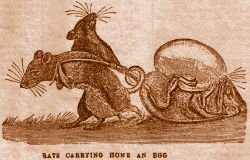
Page 182—Mousey Land
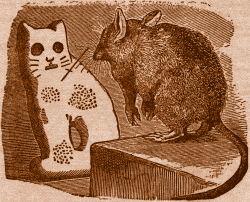
|
A baby-girl, on Christmas night
But on the stairway she let fall
Now in the moonlit midnight time,
She stood still in her cruel fright
Poor mousie dared not, could not stir!
A cat like this!" the poor mouse said.
Then sprang upon it with a squeal
That's what cats are made of,
And then she stood upon her head
|
|
The mice are in their holes,
They climb up on the shelves,
But if they hear the cat,
|
|
Three Mice went into
Says Pussy, "You are
|
|
I am sitting by the fireside,
He flies along the mantelpiece
And now he's nibbling at some cake
Run, mousey, run! I hear the cat,
Run, mousey, run! I hear Jane's foot,
|
|
I'm only a poor little mouse, ma'am!
No mischief at all I intend, ma'am!
My wife lives in there in the crack, ma'am!
I never was given to strife, ma'am!
In your eyes I see mercy I'm sure, ma'am!
|
|
In a crack, near the cupboard,
But one day the young mouse,
"Oh mother," said she,
"The floor is of wood,
"And then they have made
"But the best of all is,
"Ah, child," said the mother,
"Thus they've caught and killed scores,
|
Page 183—Mousey Land
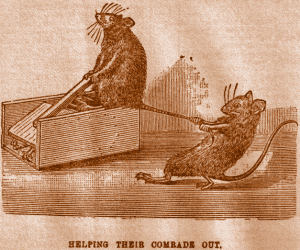
|
One Summer day the sun shone bright,
But close at hand, a shady path,
Suddenly, just beside my chair,
I turned my head; there, on the path,
Softly she crept across the path,
And back and forth from side to side,
She never wearied in her work,
Dear mother mouse! My verse has told
Francis E. Cooke
|
|
A poor little mouse
It was in a store
As soon as young Johnny
Poor mouse! how it squeak'd
Ann Taylor
|
|
A little mouse crept out one day,
He skipped about with bead-bright eyes
He found some jelly cake so nice,
He curl'd himself upon the floor,
The mouse who had not left a crumb,
She opened wide the little house,
She tumbled back upon the ground,
At last he tumbled down the stair,
|
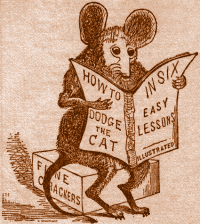
Page 184—Froggy Land
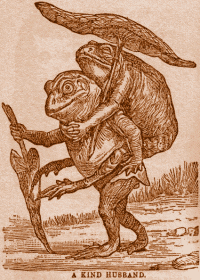
|
In a tank at the foot of the hill
Now it fell out one bright day,
Then Mother frog showed her grief
But the naughty little froggies,
Then a duck, which had lazily swum
So Mr. and Mrs. Frog,
"Early Days"
|
|
There was a Frog
He had not wed
But one fine day,
He raised his hat,
When he was drest
His smile was bland,
"If she'll agree
When he went by,
And from her nook,
At last so blue
He passed the door,
She answered "Yes,"
The wedding-day
And never yet
And, after all,
|
|
Twenty froggies went to school,
Master Bullfrog, grave and stern,
Twenty froggies grew up fast;
|
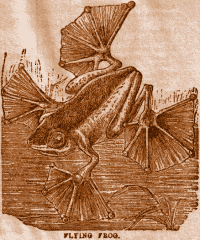
Page 185—Froggy Land
|
Once upon a time a Cat and Mouse were playing together, when, quite by accident, the cat bit off the Mouse's tail. It was very strange that the Cat did not bite off the Mouse's head. But this Mouse was a good Mouse, and never stole any cheese; and so the Cat only bit off her tail. Mousey was very much vexed to see that her tail was gone, so she said to Pussy—
"Oh, dear Pussy! do give me my tail again."
So she frisked and jumped, and then she ran
"Please, Cow, give me some milk. I want to give Pussy
milk, and Pussy will give me my own tail again."
So she frisked and jumped, and then she ran
"Please, Mr. Farmer, give me some hay; I want to give the
Cow hay The Cow will give me some milk; I will give Pussy milk;
and Pussy will give me my own tail again."
So she frisked and jumped, and then she ran
"Please, Mr. Baker, give me some bread; I want to give
the Farmer bread. The Farmer will give me some hay; I will give the
Cow hay, the Cow will give me some milk; I will give Pussy milk;
and Pussy will give me my own tail again."
So she frisked and jumped, and then she ran
"Please, Mr. Butcher, give me some meat. I want to give
the Baker meat. The Baker will give me some bread; I will give the
Farmer bread. The Farmer will give me some hay; I will give the
Cow hay, the Cow will give me some milk; I will give Pussy milk;
and Pussy will give me my own tail again."
Then the Butcher gave the Mouse some meat, and the Mouse
gave the Baker the meat, and the Baker gave the Mouse some bread,
and the Mouse gave the Farmer the bread, and the Farmer gave the
Mouse some hay, and the Mouse gave the Cow the hay, and the
Cow gave the Mouse some milk, and the Mouse gave Pussy the
milk, and then Pussy gave poor little Mousey her own tail again.
So she frisked and jumped, and away she ran
|
|
There was an Old Person of Ewell,
|
|
Some little mice sat in a barn to spin,
|
|
Hickory, diccory dock,
|
|
A Frog he would a-wooing go,
"Pray, Mr. Rat, will you go with me,
|
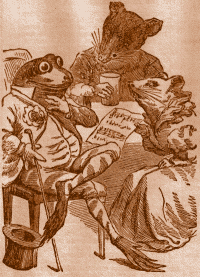
|
"Pray, Mrs. Mouse, are you within?" "Oh, yes, kind sirs, I'm sitting to spin." "Pray, Mrs. Mouse, Will you give us some beer? For Froggy and I are fond of good cheer."
"Pray, Mr. Frog, will you give us a song—
"Since you have a cold, Mr. Frog," Mousey said,
The cat she seized the rat by the crown;
|
|
The Little priest of Felton,
|
|
Three blind mice! three blind mice!
|
|
Three little dogs were basking in the cinders;
|
|
In a crack near the cupboard, with dainties provided,
But one day the young mouse, which was given to roam,
"O mother," said she, "The good folks of this house,
"The floor is of wood, and the walls are of wires,
"And then they have made such nice holes in the wall,
"But the best of all is, they've provided, as well,
"Ah, child," said the mother, "believe, I entreat,
"Thus they've caught and killed scores, and I never could
learn,
|
Page 186—Mixed Animal Land
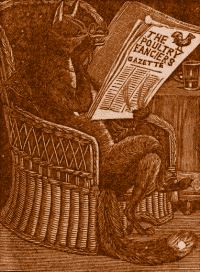
|
The fox and the cat as they travelled one day,
Whilst thus they proceeded, a wolf from the wood,
"In vain, wretched victim, for mercy you bleat;
"What a wretch!" says the cat—"'tis the vilest of
brutes;
Well, onward they marched, and they moralised still.
A spider that sat in her web on the wall,
|
|
A fox was trotting one day,
Eager he tried to snatch the fruit,
He curl'd his nose and said, "Dear me!
'Tis thus we often wish thro' life,
|
|
A fox walked round a toyman's shop
The mask was beautiful and fair,
He turned it round with much surprise,
"And cheeks and lips, extremely pretty;
Thus, to some boy or maiden pretty;
|
|
In a dairy a crow,
A fox who lived by,
She was cunning he knew,
"'Tis a very fine day,"
Sly Reynard, not tired,
Believe me I long
Jane Taylor
|
|
(A Hindoo Fable)
It was six men of Indostan
The FIRST approached the Elephant,
The SECOND feeling of the tusk,
The THIRD approached the animal,
The FOURTH reached out his eager hand,
The FIFTH, who chanced to touch the ear,
The SIXTH no sooner had begun
And so these men of Indostan
|
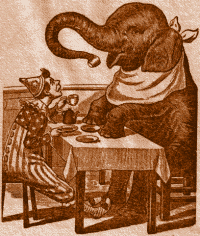
Page 187—Mixed Animal Land
|
Sly little, cowering, timorous beastie!
I'm truly sorry man's dominion
Sometimes, I doubt not, thou dost thieve;
R. Burns
|
|
I am an honest toad,
When the rain patters down,
And now a catch a fly,
And this is all I do,
Oh! naughty folks they be
|
|
In a summer's night I take my flight
When I get my fill, I wipe my bill,
On the chamber wall about I crawl,
|
|
A Nightingale, that all day long
Cowper
|
|
Beneath this hedge, or near the stream,
Disputes have been, and still prevail,
But this is sure—the hand of might
Perhaps indulgent Nature meant,
Cowper
|
|
Happy insect! what can be
Cowley
|
|
Warm and buoyant, in his oily mail,
Darwin
|
|
A wasp met a bee that was just buzzing by,
"My back shines as bright, and as yellow as gold
"Ah! Cousin," the bee said, "'tis all very true,
"You have a fine shape and a delicate wing,
"My coat is quite homely and plain, as you see,
From this little story let people beware,
|
|
I bring my little doggies milk;
|
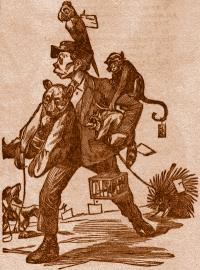
Page 188—Squirrel Land
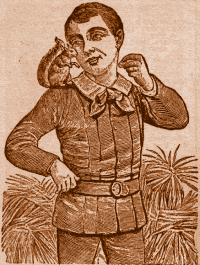
|
I'm a merry, merry squirrel,
Up and down I run and frisk,
Through all the summer long
When winter comes with snow
Norman Macleod
|
|
One little white duck,
One little white duck
One little black duck
One little what duck
Merry little brown eyes
I thank that other duck
One white lady-duck,
A. L.
|
|
The pretty red squirrel
His food is the young
Then up again like
And then he grows pettish,
|
|
The mountain and the squirrel
R. W. Emerson
|
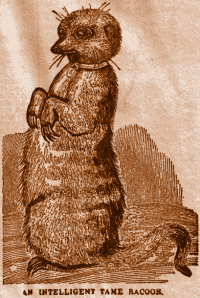
Page 189—Wonderful Bird Nests
|
|
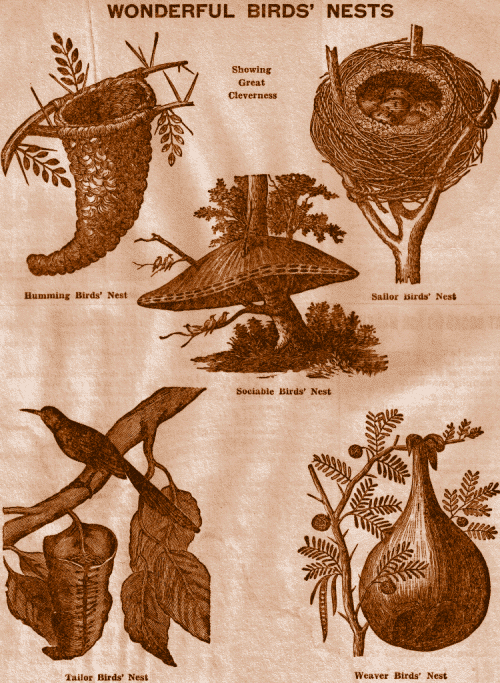
Page 190—Cole's Poems On Books
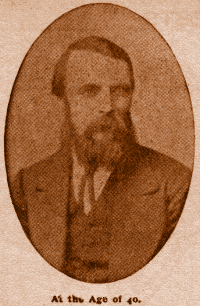
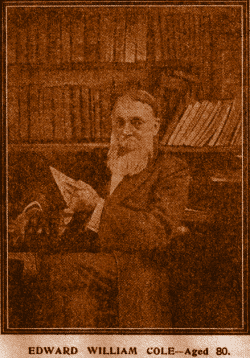
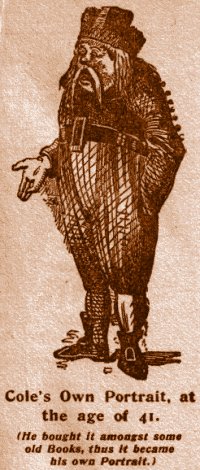
|
Books should be found in every house,
For all good books throughout the world
Books make his time pass happily,
Books teach the boys and girls of earth
Books teach earth's teeming artisans
Books teach schoolmasters, clergymen,
Books thus, by print, and pictures, bring The whole world into view, And show what all men think about, And everything they do.
Books give to man the history
Books show him human arts and laws
Books give the best and greatest thoughts
Books show men all that men have done,
Books show that mankind's leading faiths,
Books show that virtue, goodness, love,
Books show the joys, griefs, hopes and fears,
Books thus will cause the flag of peace
Books give the reader vast delight,
Books show narcotics, toxicants,
Books, like strong drink, will drowns man's cares
Books teach and please him when a child,
Books teach, from their beginning, of
Books give us hope beyond the grave,
Books therefore are, of all we own,
Books are the greatest blessing brought,
|
Page 191—Comic Advertiser

|
(Or Fun Doctor's Assistant)
"The physician tells us of the physical benefits of laughing. There is not the remotest corner or little inlet of the minute blood-vessels of the human body that does not feel some wavelet from the convulsion occasioned by good hearty laughter. The life principle, or the central man, is shaken to the innermost depths, sending new tided of life and strength to the surface, thus materially tending to insure good health to persons who indulge therein. The blood moves more rapidly, and conveys a different impression to all the organs of the body, as it visits them on that particular mystic journey when the man is laughing, from what it does at other times. For this reason every good, hearty laugh in which a person indulges lengthens his life, conveying as it does a new and distinct stimulus to the vital forces."
physic, and whoever invents or discovers a new supply deserves the name of public benefactor." |
|
Man warnt made tew mourn, man waz made tew laff. He iz the onla creeter or thing that God made tew laff out loud. It iz true he knows how to mourn, do duz animills know how, the birds kan tell their sorrows, and the flowers kan hang their pretty heds. Man was made tew smile, tew laff, to haw! tew throw up his hat, and sing halleluger. Man was made tew praze God, and he can't dew it by mourning. Awl the mourning there iz in this wurld was introduced bi man; man warnt made tew mourn any more than he was made to crawl. Tharfore i sa tew awl men and women, stop crying and go tew laffing, you will last longer, and git fatter, and stand just as good a chanse tew git tew heaven with a smile on your countenance as yu will with yure face leaking at every pore.—Josh Billings
"From a wife who don't |
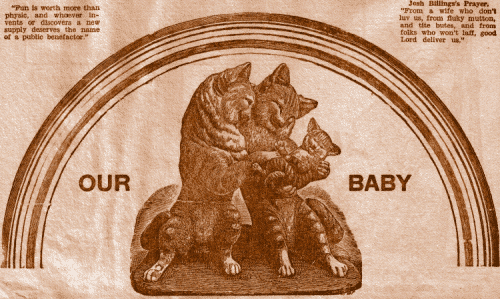
Page 192—Comic Advertiser
|
|

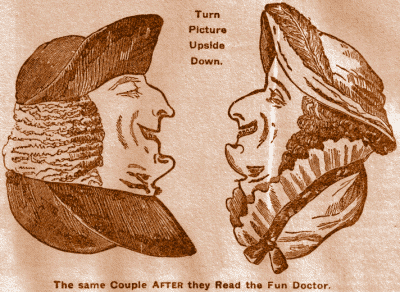
|
Dear Sir—Many years ago it was my misfortune to be jilted in love by a cruel-hearted woman. I pined away, and fell into a bad state of health, and was advised by my friends to take some physic. I never took a single dose except somebody told me that it was exactly what I wanted to make me well—but it all did me no good. I only got worse until I came across the right thing, which I will presently describe. I find, in looking over my paid bills, the following are the kinds and quantities of physic I have used during my illness:— Holloway's Pills, 227 boxes; Cockle's Pills, 121 boxes, Beecham's Pills, 80 boxes; Parr's Life Pills, 76 boxes, Blue Pills, 849 boxes. One friend advised me to give up Pills and take some good old-fashioned physic. I took of Jalap, 37 pounds; Caster Oil; 180 bottles, Salts and Senna, 800 doses; Rhubarb and Magnesia, 300 doses; Brimstone and Treacle, 800 doses—but this did me no good. Another friend advised me to take some world-fames patent medicines, so I took of Eno's Fruit Salt 190 bottles, Warner's Safe Cure, 200 bottles; Townsend's Sarsaparilla, 120 bottles; Hop Bitters, 180 bottles; Dandelion Ale, two hogsheads. I took Hayter's Nerve Tonic, Hayter's Blood purifier, Hayter's Invigorator, and Hayter's Pick-Me-Up, of each 100 bottles; and Wolfe's Schnapps, 630 bottles— but I felt no better. Another friend came along, and said for my complaint it was no use taking medicines internally, and I must use the "Rub On Remedies," so I rubbed on Holloway's Ointment, 241 boxes; Davis's Pain Killer, 70 bottles; Moulton's Pain Paint, 60 bottles; St. Jacob's oil, Weston's Wizard Oil, and Croton Oil, of each 100 bottles: and of Eucalyptus Oil, 900 quart bottles—but I felt no better. Another friend advised the Herb Cure, so I took strong decoctions of Chamomile, Pennyroyal, Peppermint, Rue, Tansy, Quassia, Horehound, Wormwood, Aconite, Belladonna, Hemlock, Nux Vomica, Lungwort, Liverwort, Moonwort, Sneezewort, and Snakeweed—altogether I took about 1700 quarts of these horrid decoctions—but I felt no better. Another friend told me my stomach was out of order, and required cleansing, so I took of Ipecacuanha Wine 139 quarts—but this did not cure me. Another friend said all diseases come from insects, and I had insects in me, and must take special medicine for them, so I took of Keating's insecticide 730 packets—but got no better. Another friend advised me to try Homoeopathy. I took 111 tubes of pilules and 80 bottles of tinctures—but they did me no good. Another friend advised me to try the water cure. I took cold baths, warm baths, tepid baths, and Turkish baths in hundreds, and drank about twenty hogsheads of mineral waters—but it did me no good. Another friend advised the Acid Cure, so I took Acetic Acid, Muriatic Acid, Nitric Acid, Sulphuric Acid, Oxalic Acid, and Prussic Acid, of each about twenty quarts—but got no better. Another friend advised Soothing Medicines, so I took over 400 of Steedman's Soothing powders, and 130 bottles of Mother Winslow's Soothing Syrup—but I was still irritable and nervous. My last course of medicine consisted of Steel Drops, Balm of Gilead, Turpentine, Chloroform, Cod Liver Oil, Assafoetida, Spanish Flies, and Cayenne Pepper—about fifteen pounds of each—but it all did me no good. I simply got worse and worse, and was reduced to a mere shadow of skin and bone, but, as luck would have it, another friend came along—a true friend this time—and suggested Cole's FUN DOCTOR. I got it, and was well and stout in a Week, at a cost of 1s 6d.
Sworn at Temple Court, and Signed in Everlasting
Gratitude,
|
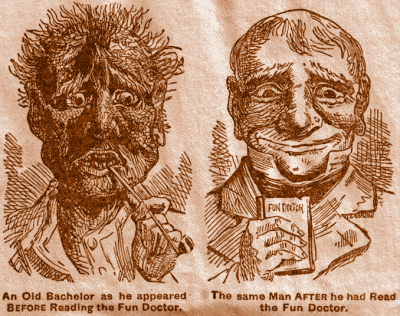
Page 193—Comic Advertiser
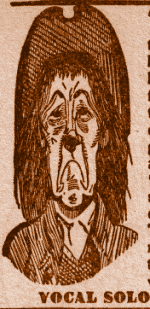
|
A man on a train was heard to groan so frightfully that the
passengers took pity on him, and one of them gave him a drink out of
a whisky flask. "Do you feel better?" asked the giver. "I do," said
he who had groaned. "What ailed you anyway?" "Ailed me?" "Yes; what
made you groan so?" "Groan! Great Land o'Goshen! I was singing!" The
generous man will never quite cease to regret the loss of that drink
of whisky.
|
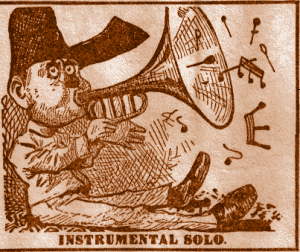
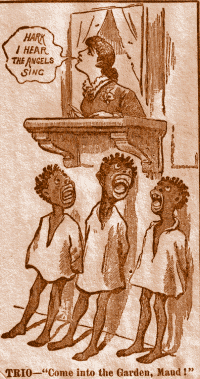
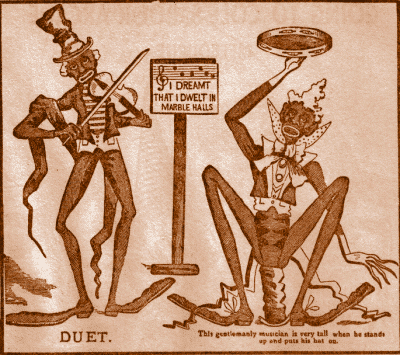
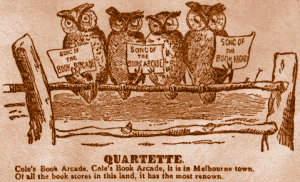
|
Cole's Book Arcade. Cole's Book Arcade, it is in Melbourne town, Of all the book stores in this land, it has the most renown.
|
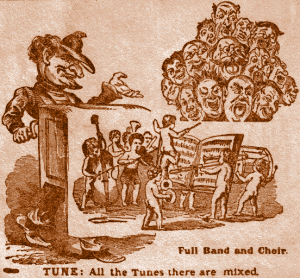
|
TUNE: All the Tunes there are mixed.
|
Page 194—Comic Advertiser
|
|
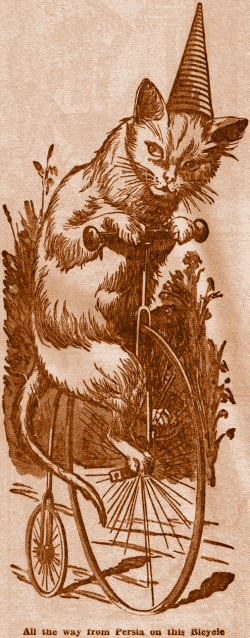
|
All the way from Persia on this bicycle.
|
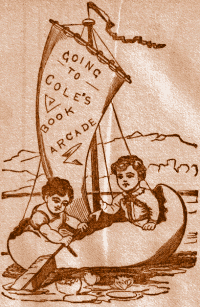
|
Why are these two nice children like thousands of
knowledge-loving individuals? Because they frequently visit Cole's Book Arcade.
|
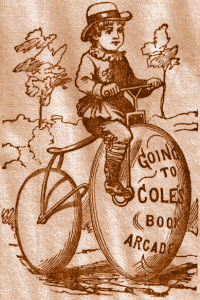
|
Guess where this young gentleman is going? To Cole's book arcade. Right. You're a Witch.
|
Page 195—Comic Advertiser
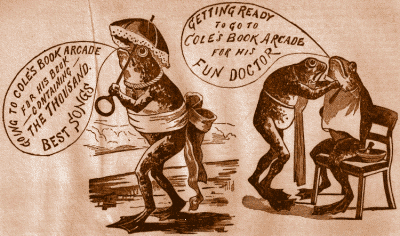
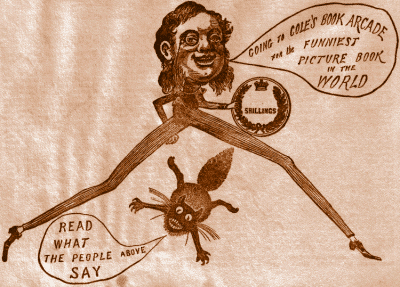
Page 196—Wonderful Sea Serpent
|
The world-renowned sea-serpent has been specially chartered to bring a fresh supply of books every week from England to Cole's Book Arcade, Melbourne; and also to show upon the coils of his body 2000 rainbows, being so many copies of that establishment. The sea-serpent, upon being communicated with, demanded a heavy price for his services, but Mr. Cole agreed to his terms, as he considered that 2000 of his rainbow signs travelling round the world on the sides of the famous sea-serpent would be a good advertisement for the Book Arcade.
|
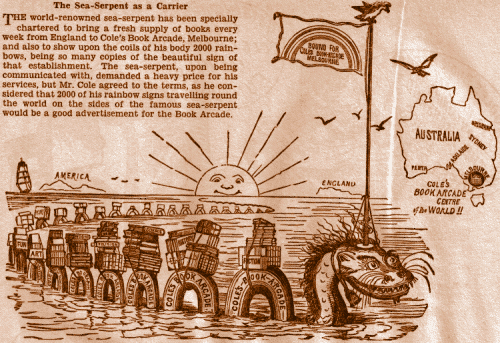
|
John Smith, the sea-serpent, was born in a swamp near Sydney, about 5000 years ago. He was hatched by a female Bunyip from an immense three cornered egg, which is supposed to have fallen out of the moon, and he is the only sea-serpent that ever existed. He never had relations, and is the only being in the world of whom the verse is true. He never had a father. He never had a mother. He never had a sister. He never had a brother. He also never had a wife. He is of a very shy disposition, and many fascinating mermaids have made love to him, and practiced all their well-known wiles upon him—but in vain: he is a bachelor still. Like some other animals mentioned in history, he thinks and talks like a man. He is exceedingly intelligent, and seems to have as much sense as 20,000 ordinary men or 21,000 women. He can sing with a voice of tremendous compass, from the sweet piping of a nightingale down to far below the deepest tones of the largest organ, or the noise made by discharges of artillery. Sometimes when he sings it shakes the ground for miles around, and if at sea causes a storm. His favourite songs are "A Life on the Ocean Wave," "What are the Wild Waves Saying," "Down by the Deep Sad Sea," and such like. He plays all the musical instruments in the world. His whistle can be heard a distance of 100 miles, his shout 50 miles, and his whisper 10 miles. Of course, in an active life of 5000 years, a life almost as long as some Hindoo patriarchs, he has seen and heard, and done, many astonishing things. He relates that he once rescued a travelling menagerie at sea, he swallowed the whole lot of animals, and the woman in charge of them, let them roam about inside of him and enjoy themselves, and then landed them safely on dry land at the end of 48 hours. He says that he was in Arabia, and saw that remarkable occurrence of the moon coming down and going into Mahomet's sleeves, and there and then he objected to the whole proceeding. The sea-serpent is 15 miles long and 50 feet in diameter, his skin is of a horny nature, but harder than steel, and about 5 feet thick. He travels at the rate of 200 miles per hour, and can carry 120 times as much as the "Great Eastern." If he was coming up to the Queen's Wharf, Melbourne, when his head was at the wharf, his body would reach right down the River Yarra out in the Bay past Williamstown, and the Traffic would have to be stopped in the river whilst he was unloading. The sea-serpent is rather a large eater. Since he reached full growth, namely, for the last 4000 years, he has swallowed a whole whale every morning for breakfast except once. The reason of his going without his breakfast that once is explained in the following manner:— The reader will remember the account of Jonah and the Whale in the Talmud. It states that when Jonah was in the whale's belly, it went out of the Mediterranean right around Africa into the Red Sea, and that Jonah looked out through the eyes of the whale and saw the place where the children of Israel crossed the Red Sea. The sea-serpent states that he can corroborate this piece of history, as he happened to be after that very whale for breakfast when he saw Jonah looking out through its eyes. He says he did not swallow that whale, as he had found that the whales which he had previously swallowed with prophets inside of them did not agree with him, and consequently he had to go that morning without his breakfast, the first time in 4000 years. Those who want any further information about the famous sea-serpent can acquire it at Cole's Book Arcade, Melbourne, or come and interview and question the sea-serpent himself when he arrives. P.S.—Some people don't believe in the existence of the sea-serpent, but if he did not exist how could we have got his likeness and his history? That's a question for the unbelievers to answer.
|
Page 197—Funny and Foolish Dress Land
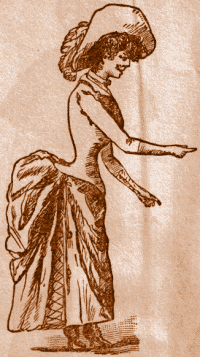
|
A Servant Girl dressed in four absurdities of fashion—a Tight
Corset, Tight High-heeled Boots, a Bustle Improver, and
Fifteen-button Gloves.
She appears very conceited, but with her tight-lacing must feel very uncomfortable and unwell, and wall sensible people must feel that she is very silly, and with her absurd boots her feet must pain her almost as much as the Chinese woman's shown above [right] pained her when first compressed.
|
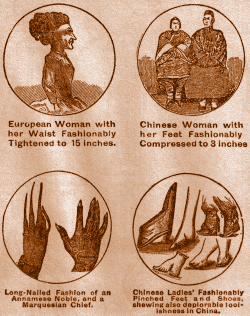
|
European Woman with her Waist Fashionably Tightened to 15 inches.
Chinese Woman with her Feet Fashionably Compressed to 3 inches.
Long-Nailed Fashion of an Annamese Noble, and a Marquesian Chief.
Chinese Ladies' Fashionable Pinched Feet and Shoes, shewing also
deplorable foolishness in China.
|
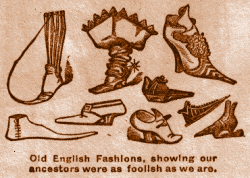
|
Old English Fashions, showing our ancestors were as foolish as we
are.
|
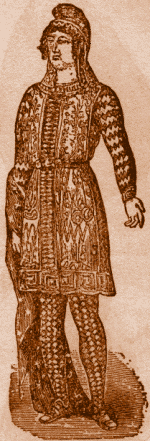
|
Costume of an Ancient Greek Youth, very easy, elegant and suitable
for a Lady's Reform Dress.
This is a much more sensible dress than the one opposite it [servant
girl] and the two below it—look at them.
|
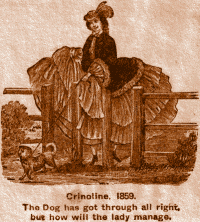
Crinoline, 1859.
The Dog has got through all right,
but how will the lady manage.
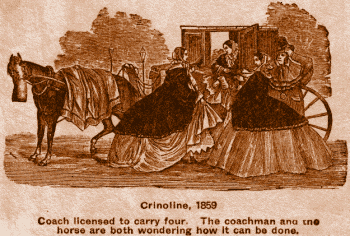
Crinoline, 1859.
Coach licensed to carry four. The coachman and the
horse are both wondering how it can be done.
Page 198—Funny and Foolish Dress Land
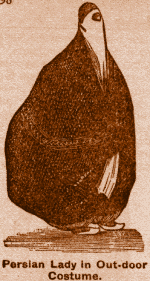
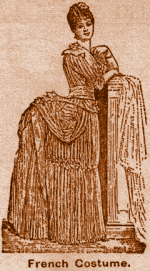
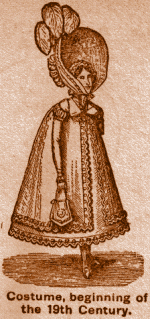
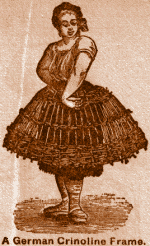
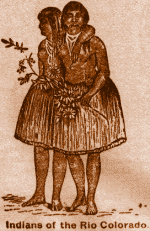
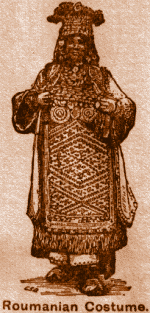
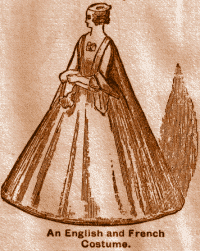
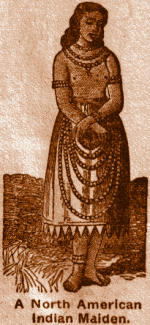
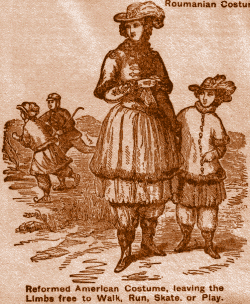
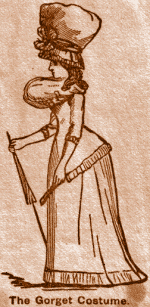
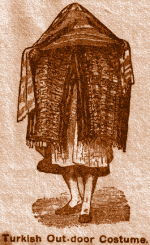
Page 199—Funny, Foolish, and Useful Fashions
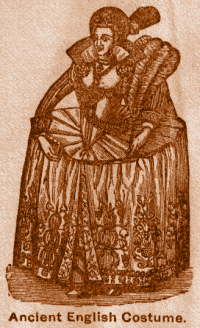
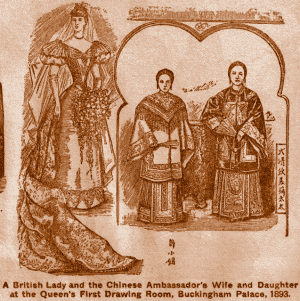
|
at the Queen's First Drawing Room, Buckingham Palace, 1893. The Chinese ladies are dressed more rationally, but the have such fashionably small feet that they have to lean against the table to enable them to stand with safety. The European lady and the Asiatic ladies are each alike martyrs to foolish fashion, one with the waist and the other with the feet.
|
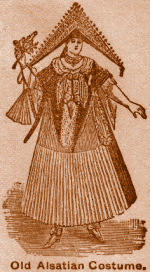
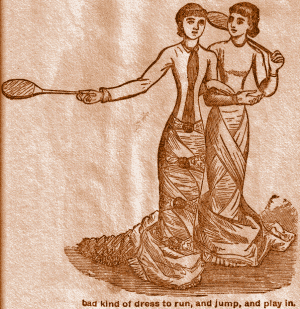
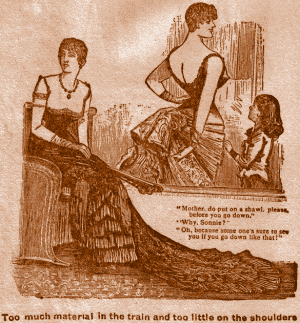
|
"Mother, do put on a shawl, please, before you go
down." "Why, Sonnie?" "Oh, because some one's is sure to see you if you go down like that!"
|
Page 200—Useful Fashions
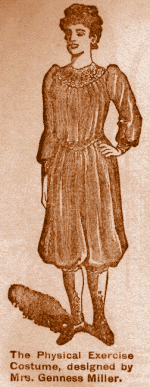
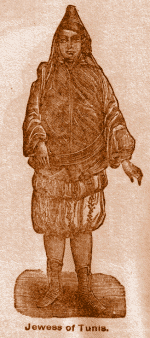
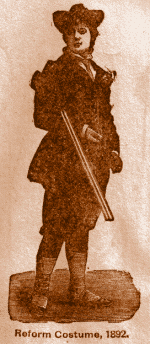
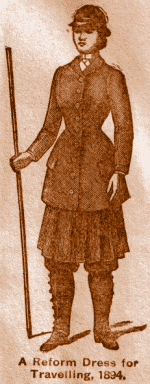
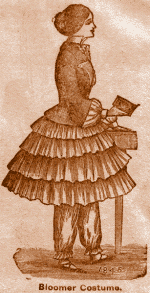
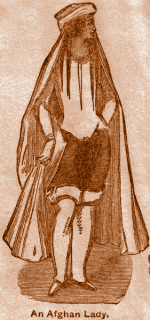
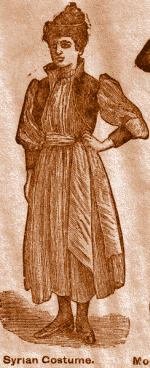
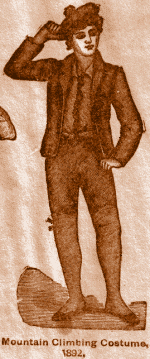
Page 201—Funny, Foolish, and Useful Fashions
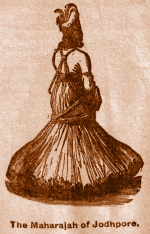
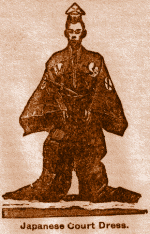
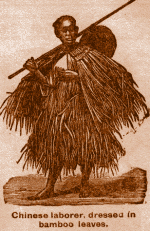
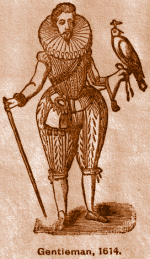
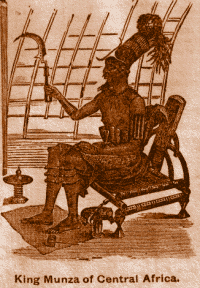
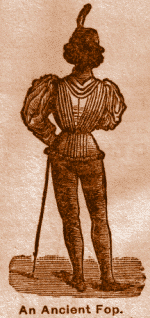
Ashamed to show his face. A few
frivolous fops and other foolish
men still wear corsets.
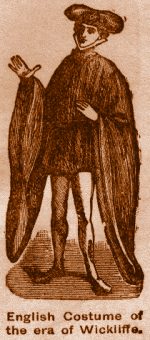
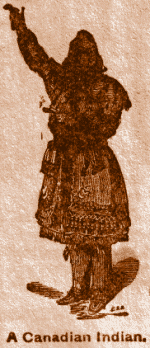
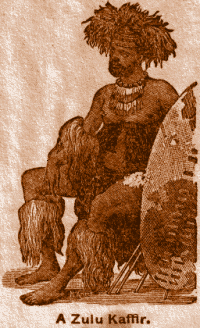
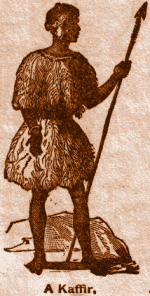
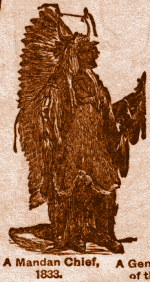
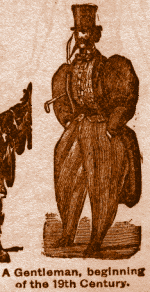
Page 202—Boy Smoking
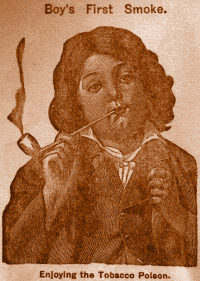
Boy's First Smoke.
Enjoying the Tobacco Poison.
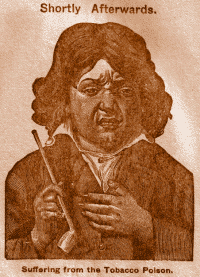
Shortly Afterwards.
Suffering from the Tobacco Poison.
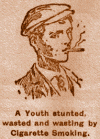
A Youth stunted,
wasted and wasting by
Cigarette Smoking.
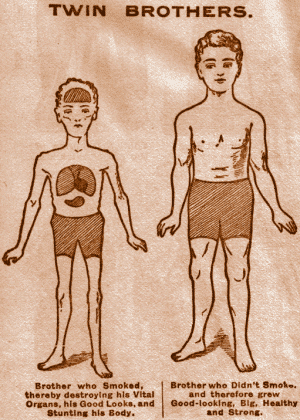
Twin Brothers.
Brother who Smoked,
thereby destroying his Vital
Organs, his Good Looks, and
Stunting his Body.
Brother who Didn't Smoke,
and therefore grew
Good-Looking, Big, Healthy
and Strong.
Multitudes of Employers, both in England and America,
will
not employ Boy Smokers, and publicly announce the
same.
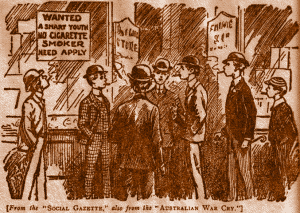
[From the "Social Gazette," also from the "Australian War Cry."]
|
The following statements show some of the large establishments that
are closed against cigarette smokers in America:—
"Swift & Co. (Packing House, Chicago), and other
Chicago business
|
Page 203—Smoking Land
|
Montgomery, Ward and Co., the universal providers, say,
"We will not employ cigarette users."
"Morgan and Wright Tyre company, large employers,
announce, "No
"At John Wanamakers.—The application blank to be
filled out by
"Heath and Milligan, Chicago, bar cigarette users."
"Carson, Pirie and Scott, Chicago, bar cigarette smokers
as
Ayer's Sarsparilla Company, Lovell, employs hundreds of
boys.
"I've got a boy for you, sir." Glad of it; who is he?"
asked the
"The Lehigh Valley Railroad bars cigarette smokers."
"The Chicago, Rock Island, and Pacific Railroad bars
cigarette
"The New York, New Haven, and Hartford Railroad bars
employes who
"The Central Railroad, Georgia, forbids cigarette
smoking."
"The Union Pacific Railroad forbids cigarette
smoking."
The following is a public notice: "The Western Union
Telegraph
A Telephone Company.—Order: "You are directed to
serve notice
"In the United States Weather Bureau.—'Chief of
United States
|
|
Smoking soothes and comforts millions of the worried and the weary, and brings much pleasure to the habitual smoker, but it always more or less injures the health of the smoker and sometimes kills him. The vast majority of the medical fraternity condemn smoking, especially by the young.
Smoking injures multitudes of boys in many respects. The following organs, fluids, functions, etc., of the body, especially of the young, are frequently more or less affected by the use of tobacco:—The blood, the heart, the nerves, the brain, the liver, the lungs, the stomach, the throat, the saliva, the taste, the voice, the eyes, the ears, the nose, the mouth, the tongue, the palate, the pancreas, the lips, the teeth, the bones, the skin. Medical men and observing experts affirm many diseases are caused or accelerated by the use of tobacco, among which are the following:— Heart disease, consumption, cancer, ulceration, asthma, bronchitis, neuralgia, paralysis, palsy, apoplexy, indigestion, dysentery, diarrhoea, constipation, sleeplessness, melancholia, delirium tremens, insanity.
Smoking frequently leads to prolonged suffering.
Tobacco using is an unclean habit, and offensive habit,
an enslaving habit, often it is an intensely selfish habit. A third of the recruits for the Army are disqualified through smoking. The following Governments have passes laws against juvenile smoking: Germany, Switzerland, Norway, Japan, Canada, Nova Scotia, New Brunswick, Prince Edward Island, British Columbia, the North West Territories, Cape Colony, New South Wales, Victoria, South Australia, Tasmania, and about 48 of the States and Territories out of 53; and so terrible and deplorable an effect has juvenile smoking upon the race that most other Governments are considering the advisability of passing laws against it. The insidious influence of cigarette smoking by boys is shown in these examples of handwriting, taken from a London Country Council health report. The first was written by a boy when he was a victim of the habit; the second is the same boy's writing when he had given it up, ten months later.
|
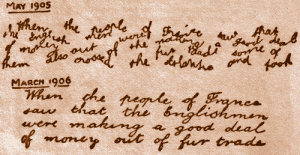
Page 204—Narcotics and Intoxicants
|
In most parts of the word man has found out some way of stimulating, soothing, or deadening his animal system by means of plants or drugs. Hundreds of these stimulating, intoxicating, soothing, and stupefying substances have been discovered and used in various countries, chief amongst which may be mentioned— Opium, Tobacco, Indian Hemp, Betel Nut, and Alcohol; and others are used in a less degree, such as Coca, Kola Nut, Thorn Apple, Cocculus Indicus, Intoxicating Toadstool, Deadly Nightshade, Henbane, Rhododendron, Azalea, Emetic Holly, Bearded Darnel, etc. The first five among those human pleasers and human destroyers are—
1. Alcohol, now drank in the shape of spirits, wine,
beer, or some These five narcotising and intoxicating poisons are used, more or less, by half the people in the world, giving some considerable pleasure at times, but destroying, more or less, the health of all who use them, and gradually stunting the form and otherwise undermining the well-being of the entire human race. Chemistry also produces many things which are taken in the same way and for the same purpose, such as Laudanum, Morphia, Cocaine, Chloral, Chloroform, Ether, &c., and many so-called patent medicines. These all tend to form habits which soothe and please for a time, but they all damage or destroy in the end. The great bulk of easy-going, unreflecting people have no idea what an amount of mischief and misery the habit of using these things inflict upon poor humanity. |
|
Books show narcotics, toxicants, Of each and every kind; Insidious destroyers all, Of body and of mind.
|
|
These four pages show at a glance the effects of the three most
fascinating and seductive Drugs in the world—Tobacco, Opium, and
Alcohol, and which physically, mentally, and morally injure or ruin
the greatest number of mankind.
|
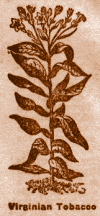
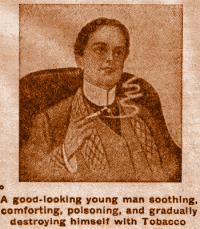
A good-looking young man soothing,
comforting, poisoning, and gradually
destroying himself with Tobacco.
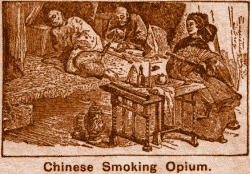
Chinese Smoking Opium.

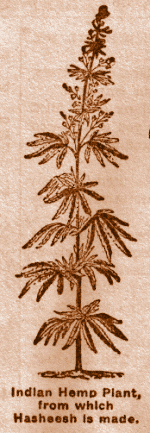
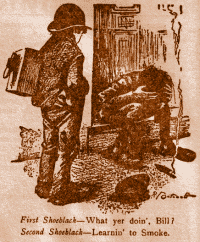
|
First Shoeblack—What yer doin', Bill? Second Shoeblack—Learnin' to Smoke.
|
|
Probably the best use a man can make of his leisure time is to read good books and to follow their advice, and the worst use he can make of it is to indulge in intoxicating liquor, and to go where that will lead or take him. It is said that "Dipsomania," "Alcoholism," or the "Craving-for-Drink" disease can be cured in most persons by certain remedies an proper management, and the time has come now when the lovers of human progress everywhere feel that this fearful curse must be grappled with, and, if possible, stamped out like the smallpox, or any other terrible disease. One writer sums up the evils of drinking as follows:— |
|
"It injures the health. It shortens life. It originates hereditary disease. It ruins the character of thousands. It destroys the peace of families and of individuals. It causes husbands and wives to neglect each other, their children, and their homes. It makes wives widows, and children orphans. It bereaves parents of their children. It reduces families to penury. It hinders the amelioration of the poorer classes of society. It makes time hard and trade bad. It is a cause of quarrels, robberies, and murders. It is a cause of suicide. It fills our prisons. It fills our poorhouses. It fills our hospitals. It fills our madhouses."
|
|
Books, like strong drink, will drown a
man's cares But do not waste his wealth, Books leave him better, drink the worse, In character and health.
|
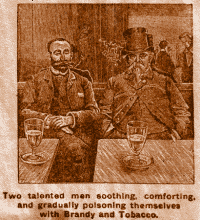
Two talented men soothing, comforting,
and gradually poisoning themselves
with Brandy and Tobacco.
Page 205—Pipes of the World
|
|
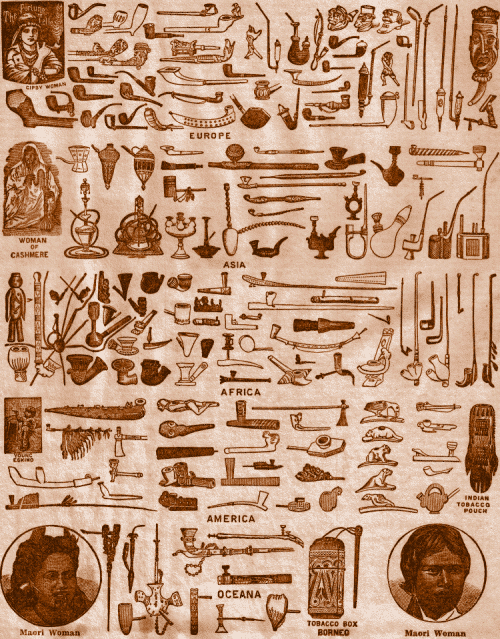
Page 206—The Supreme Being
|
Go to the top of a mountain so that you can see 50 miles in all directions; you then observe a space 100 miles in diameter. Now the world contains 25,000 such areas as that. Our world is amazingly vast, but our sun is a million times as large; yet we see rolling in space thousands as large as our own, which probably have accompanying worlds. And again, beyond this the telescope and astral-photography reveal to us that to the right, and to the left, before and behind, above and below, and to every point of the heavens, and at immense distances, millions and millions again of enormous stellar bodies exist, roll, revolve and travel through space. Multitudes of these suns and worlds around us in every direction are at such immense distances that a person travelling with the speed of light, namely, 200,000 miles, or 8 times round our earth, in a second, world take 1000,000 years to reach them. Nor can we imagine an end to this stupendous universe, or an end to space, for is we try to do so the question immediately occurs, what is still outside and beyond that? And so on to incomprehensible and overwhelming infinitude. And these many millions of suns and worlds and systems and all their parts are clearly working together, like the most exquisitely designed clockwork. Look at the marvellous mechanism of the human brain, the human eye, the human hand, the human heart, and in fact the whole human structure and composition; they all prove the truth of the affirmation that man is "fearfully and wonderfully made." Nay further, examine carefully every object in existence, however stupendously large or, as shown by the microscope, infinitesimally small, and they each and all appear equally perfect for their purpose. Can we see all this, and think on it, and not imagine a Designer and Controller of infinite attributes? It always appeared to me that there must be in this vast, illimitable, and beautiful universe, myriads of beings, superior to our weak mortal selves, and at the head of all and over all, an immortal Being of infinite perfections, which thinking men in all countries and ages have called GOD. And shall not we, immortal souls, increase in knowledge and wisdom, and as the ages roll on, more and more perceive and understand this mighty universe and its Author? I firmly believe we shall, and that as yet we are only beginning to live and think and understand and appreciate. The Supreme Being was believed in, praised and worshipped by all the ancient peoples, and is now believed in, praised and worshipped by the vast majority of the people of the world—it is true under different names, but still it is the same idea—a Being without beginning and without end—Infinite in Wisdom—Infinite in Goodness —Infinite in Power—Infinite in Action and, at all times, everywhere and present.
E. W. Cole
|
|
God extends from eternity to
eternity.—Aristotle.
Nothing is more ancient than God, for He was never
created; nothing
Nature herself has imprinted on the minds of all the idea
of a God;
There is one God; Him the Christians, Him the Jews, Him
all the
Amid so much war, contest, and variety of opinion, you
will find
If we suppose a God, to Him there can be nothing mean and
nothing
What land or what see will man find without God? Into
what part of
Thine, O Lord, is the greatness, and the power, and the
glory, and
He is God, the Great, the Mighty, the Tremendous, the
Merciful, the
|
|
"Aeolian and Doric—Ilos. Arabic—Allah. Armorian—Teuti. Assyrian —Eleah. Celtic and Gallic—Diu. Chaldaic—Eilah. Chinese—Prussa. Coromandel—Brama. Cretan—Thios. Danish and Swedish—Gut. Dutch— Godt. English and Old Saxon—God. Finch—Jumala. Flemish—Goed. French—Dieu. German and Swiss—Gott. Greek—Theos. Hebrew— Elohim, Eloha. Hindostanee—Rain. Irish—Dia. Italian—Dio. Japanese—Goezur. Lapp—Jubinal. Latin—Deus. Low Breton—Done. Low Latin—Diex. Madagascar—Zannar. Malay—Alla. Modern Egyptian —Teun. Norwegian—Gud. Olalu Tongue—Deu. Old Egyptian—Teut. Old German—Diet. Pannonian—Istu. Persian—Siie. Peruvian— Puchecammae. Pollaacca—Bung. Portuguese—Deos. Provencal—Diou. Runic—As. Slav—Buch. Spanish—Dios. Syriac and Turkish—Alah. Tartar—Magatal. Teutonic—Goth. Zemblain—Fetiza."
|
|
Father of ALL! in every age, |
|
The Supreme Being whom we call God, is a necessary,
self-existent, eternal, immense, omnipotent, omniscient, and best Being; and therefore also a Being who is and ought to be esteemed most sacred of holy.—N. Grew.
What an immense workman is God! in miniature as well as
in the
Nothing is easier than to say the
word—universe, and yet it
The whole evolution of times and ages, from everlasting
to
|
|
Who taught the bird to build her nest, Of wool and hay and moss? Who taught her how to weave it best, And lay the twigs across? Who taught the busy bee to fly Among the sweetest flowers— And lay her store of honey by, To eat in winter hours? Who taught the little ants the way Their narrow holes to bore, And through the pleasant summer's day To gather up their store? |
|
There's not a tint that paints the rose, Or decks the lily fair, Or marks the humblest flower that grows But God has placed it there. There's not of grass a simple blade, Or leaf of lowliest mien, Where heav'nly skill is not displayed, And heav'nly goodness seen. There's not a star whose twinkling light Illumes the distant earth, And cheers the solemn gleam of night, But mercy gave it birth. There's not a cloud whose dews distil Upon the parching clod, And clothe with verdure vale and hill, That is not sent by God. There's not a place on earth's vast round, In ocean deep, or air, Where skill and wisdom are not found, For God is everywhere. Around, beneath, below, above, Wherever space extends, There Heaven displays its boundless love, And power with mercy blends.—Wallace.
|
|
I dimly guess from blessings known,
I know not what the future hath
I know not where His islands lift
|
Back Cover
|
COLE'S BOOK ARCADE, Melbourne, Australia. |
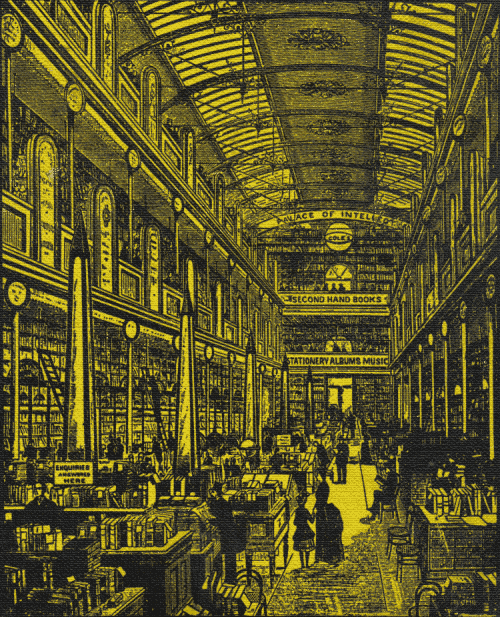
|
Every sightseer in the City of Melbourne should visit COLE'S BOOK ARCADE. It is entirely an Australian institution, being the first of its kind opened anywhere, and at the present time unequalled in any city of the world. It is 3 stories high, 600 feet deep, and an average width of 45 feet, with frontages to Bourke and Collins Sts., the two main arteries of Melbourne; its public walkways are half a mile long, its galleries are supported on brass pillars, while hundreds of rainbows (the trade mark) decorate the interior and exterior of the establishment. There are 100 mirrors tastefully placed throughout the building. The present Arcade was opened on Cup Day, 1883, and has been visited every day (except Sundays), year in, year out, by an average of 5000 people, so that during the first 35 years of its existence, more than 50 million visits were paid to it.
|
|
There are several miles of shelving and 3,000 cedar drawers. The plan of book-drawers greatly facilitates the minute classification so that one can find with ease any book wanted on any subject. There are two Retail Departments of Books, one in Bourke Street, and one in Collins Street, and a large Wholesale one of three stories between the two. The Second-hand Book Department is 150 feet by 40. There are many other departments including New and Second-hand Music, Stationary, Fancy Goods, Artist's Materials, Toys, Art, Glass, and China-ware, Tea Salon, Circulating Library, Printing Works, etc. Free music recitals are given every afternoon and evening. Intellectual, well-behaved people collect and friends meet and feel happy in the Palace of Intellect.
|